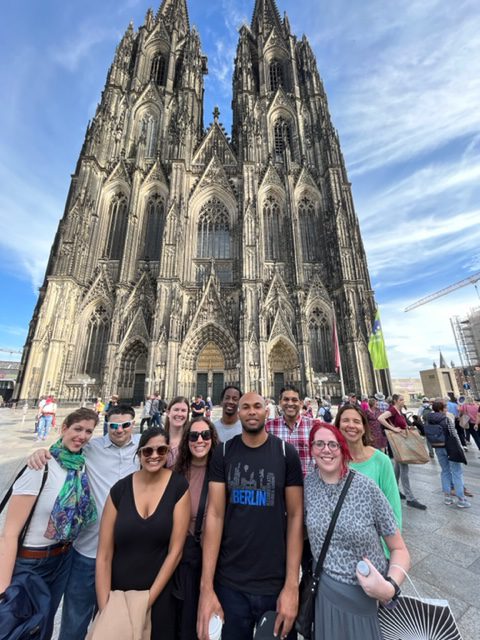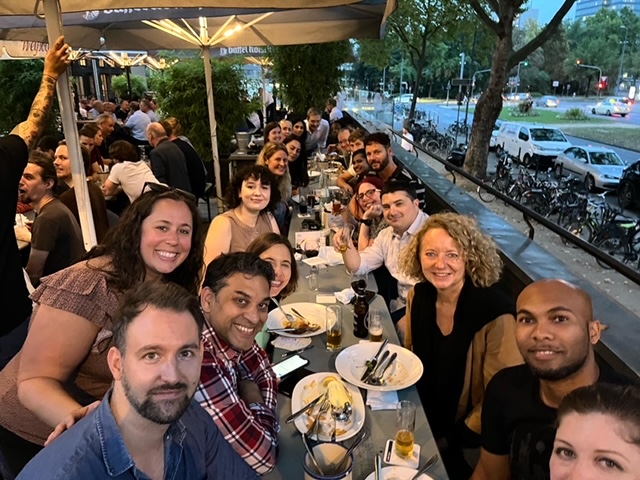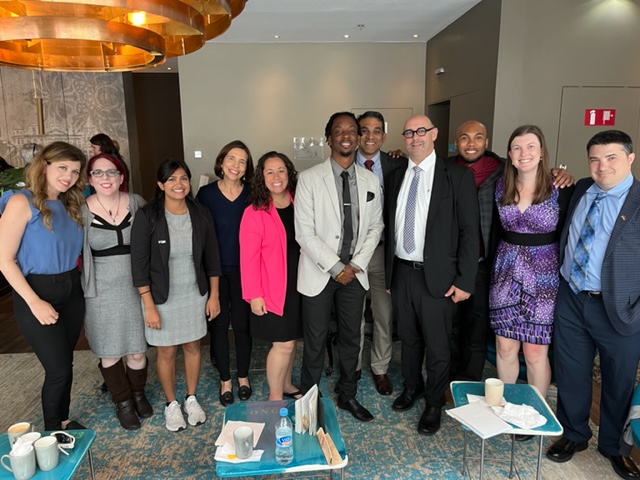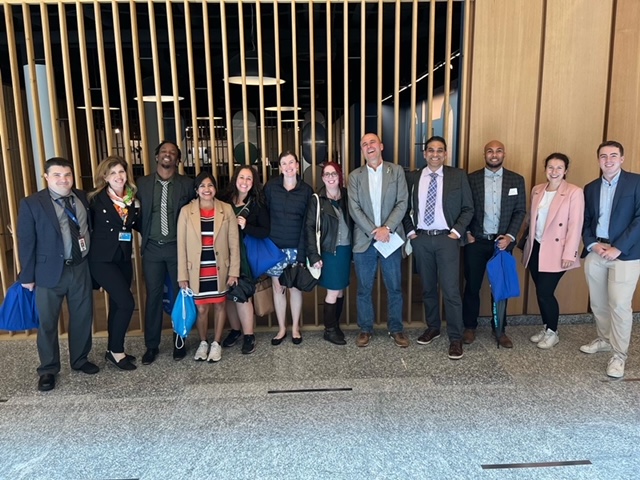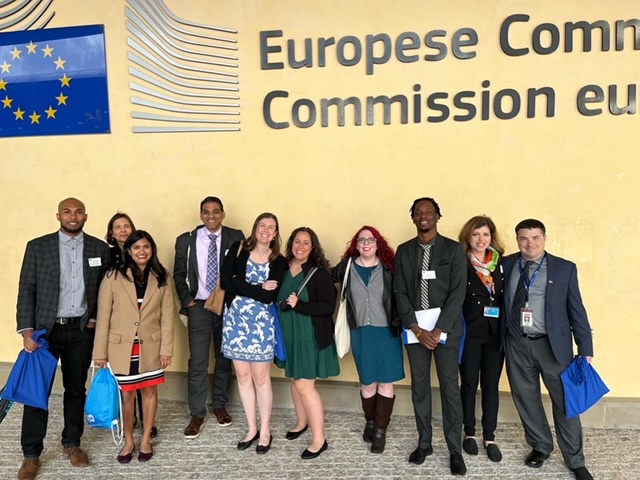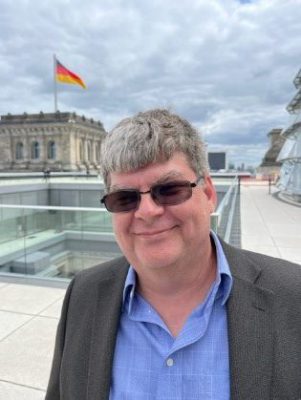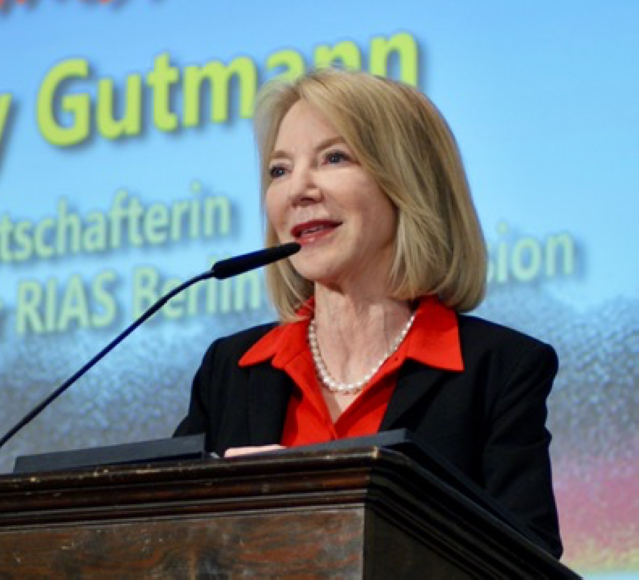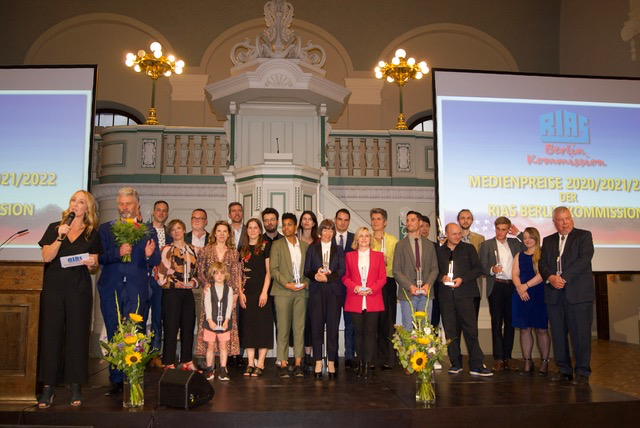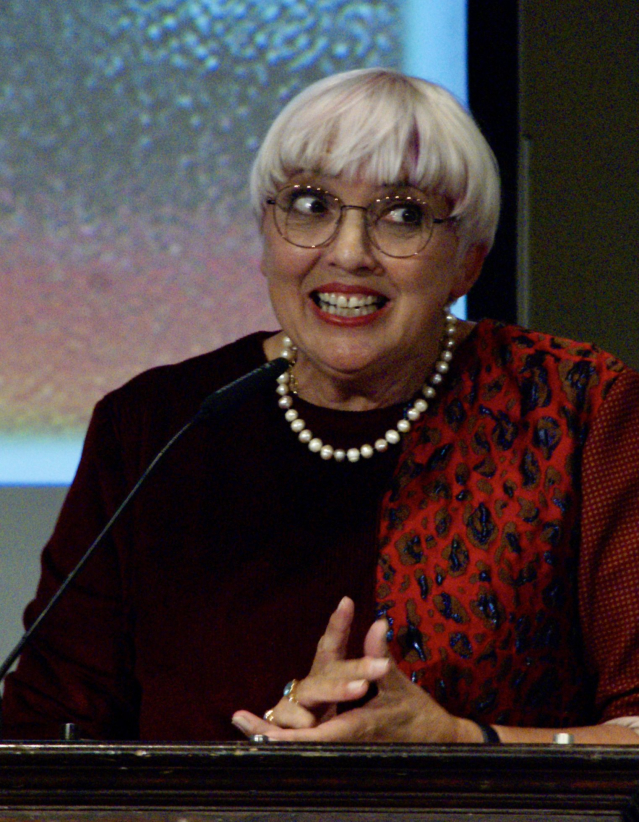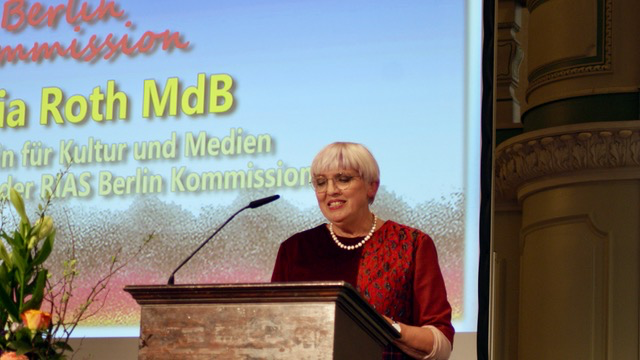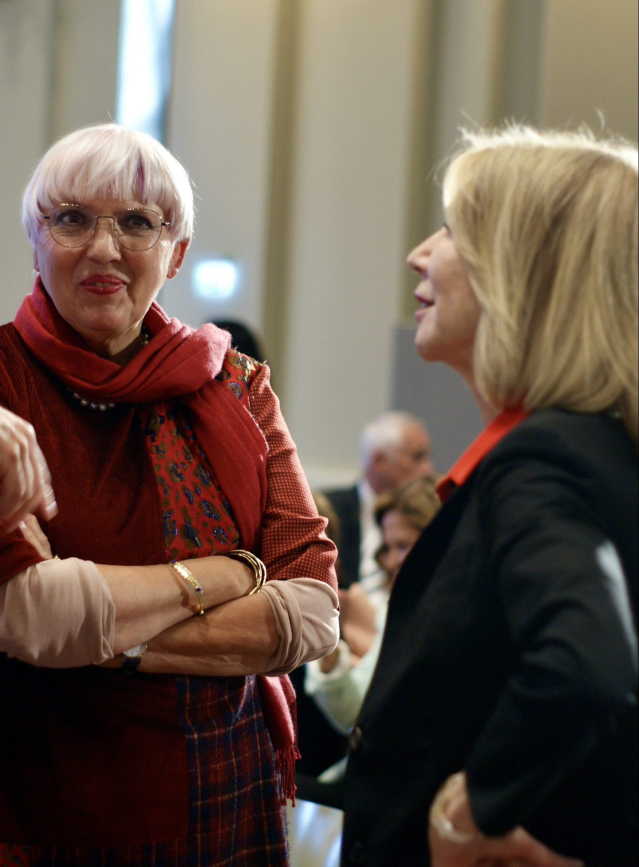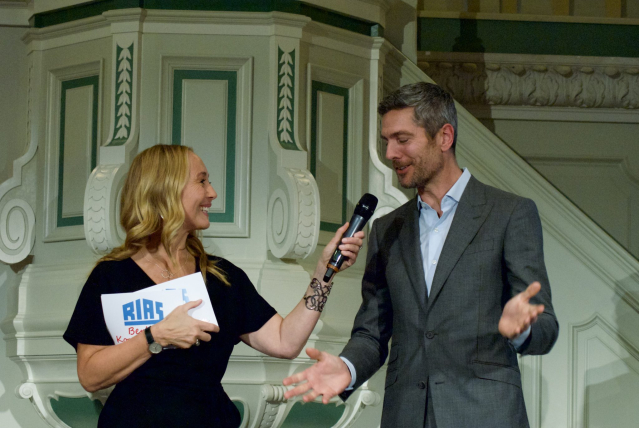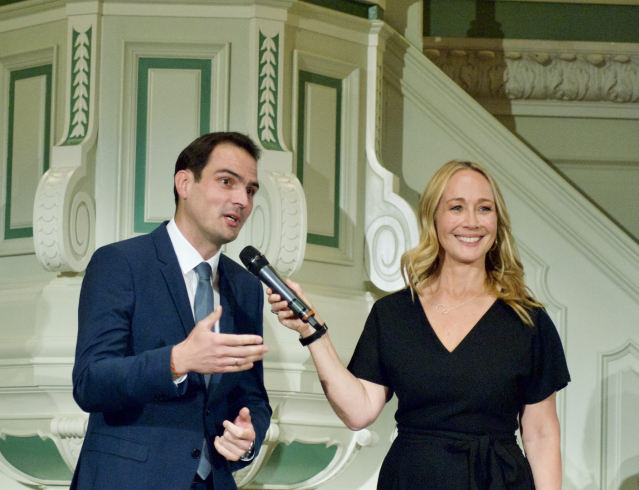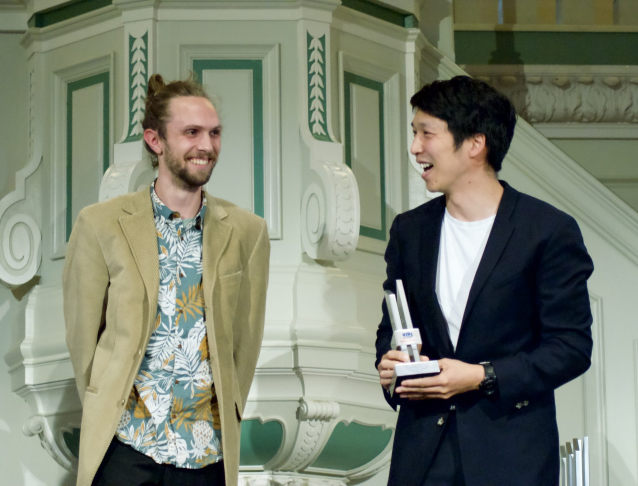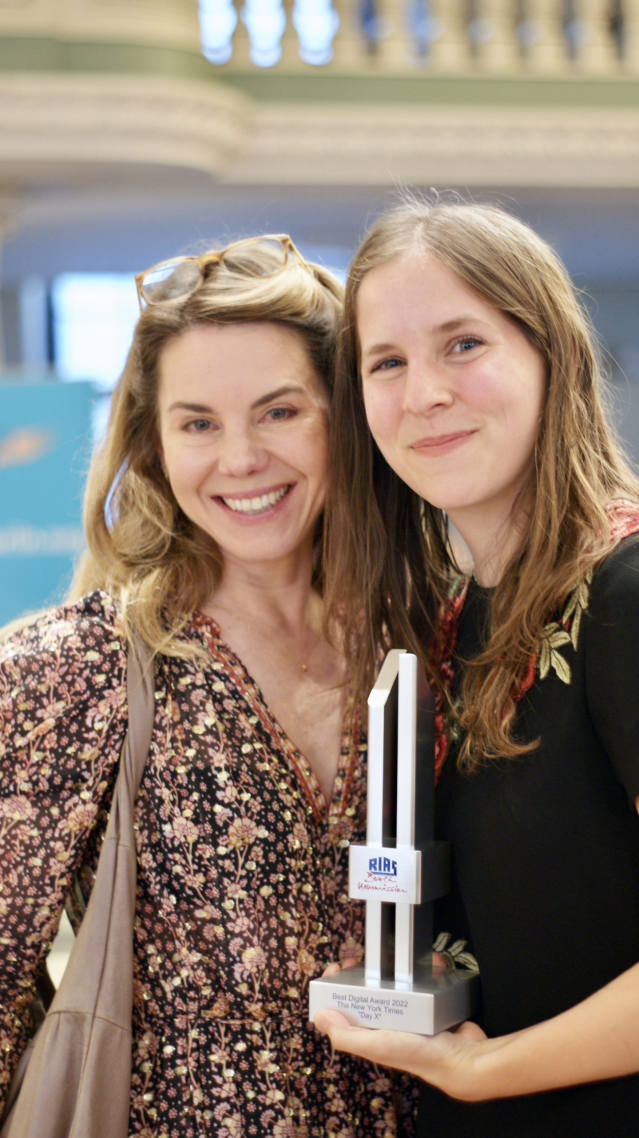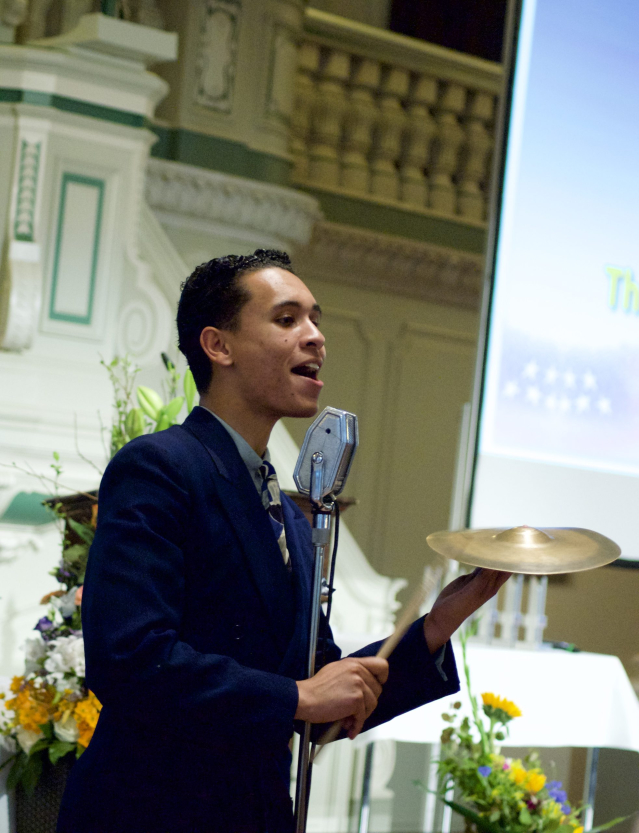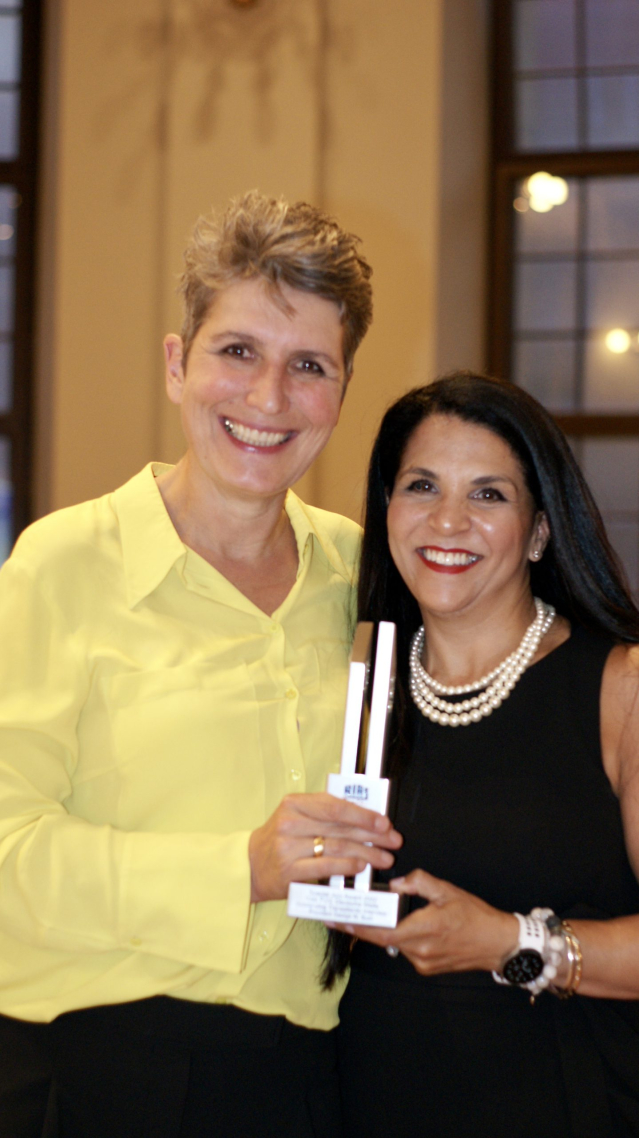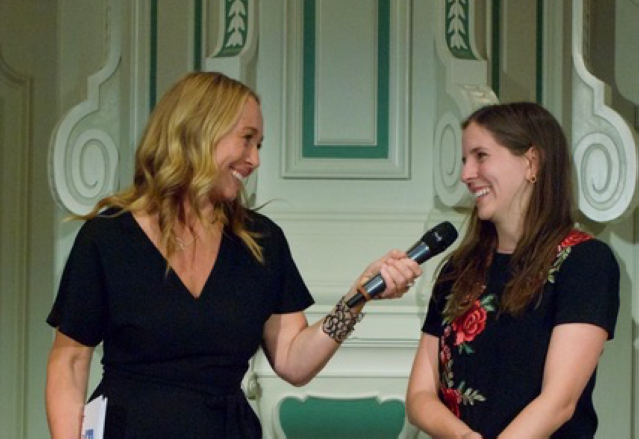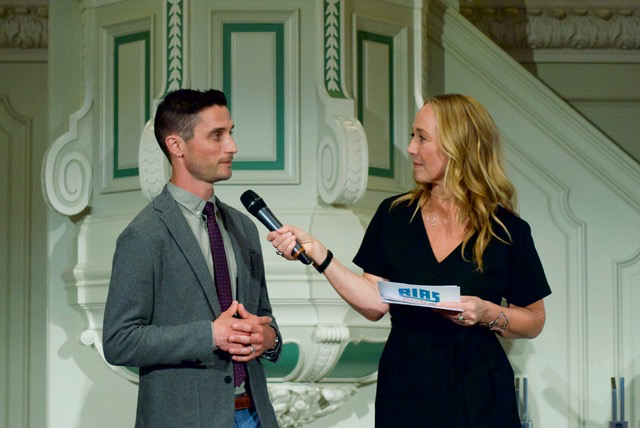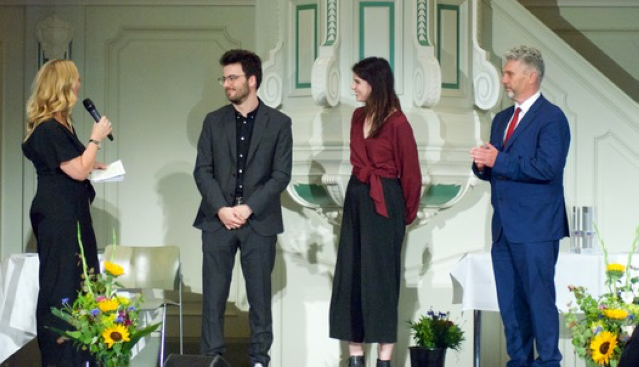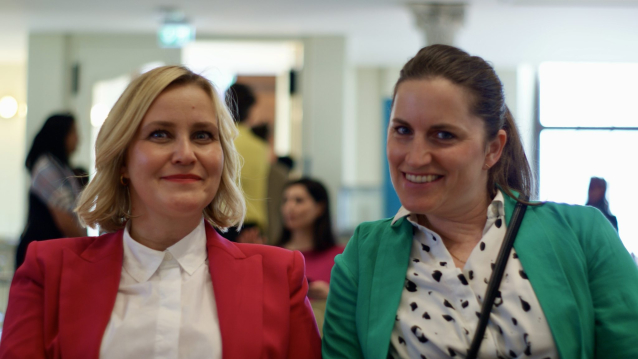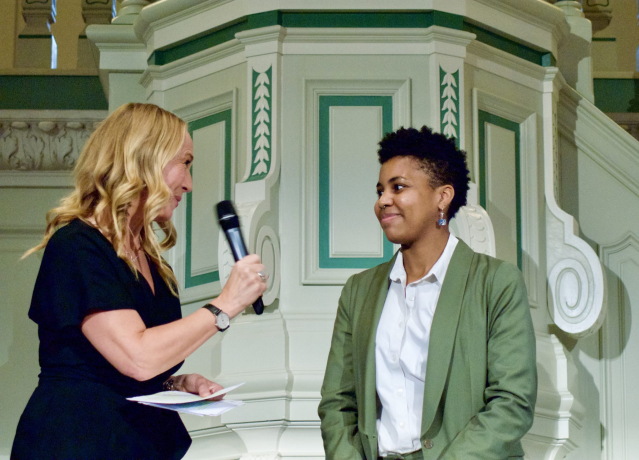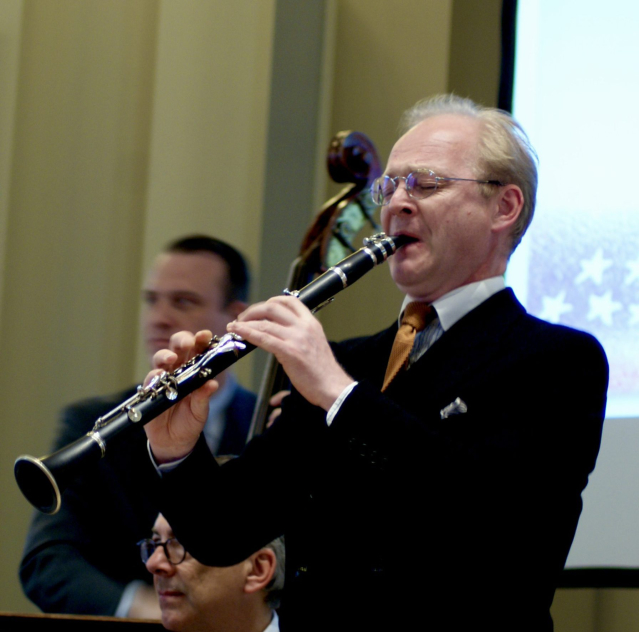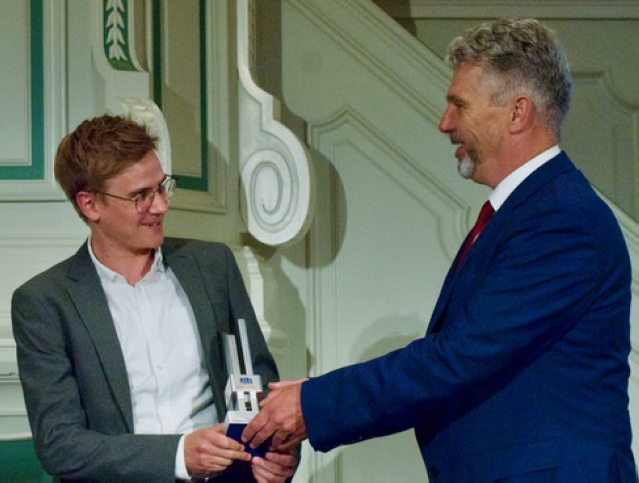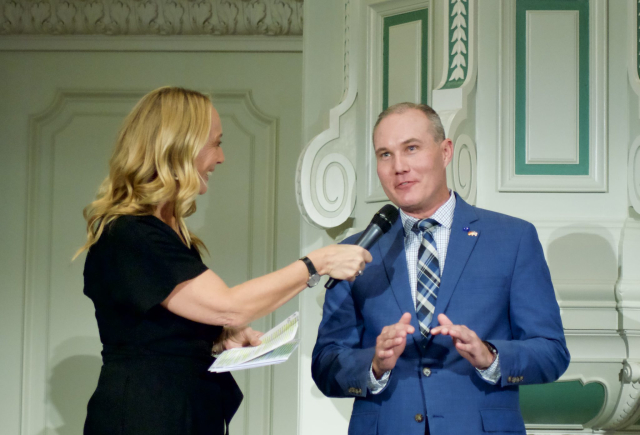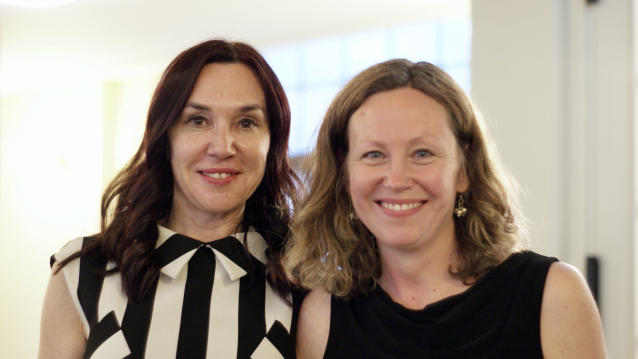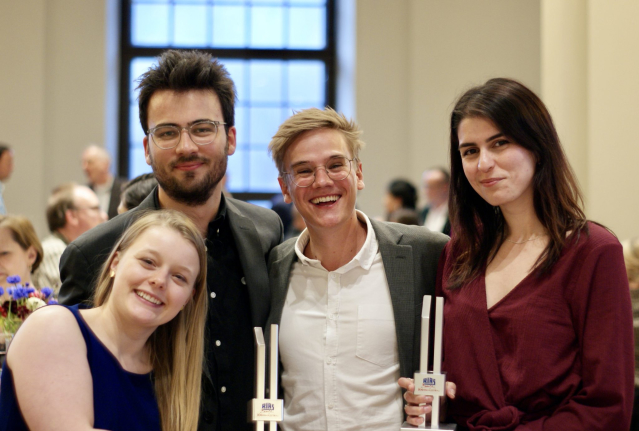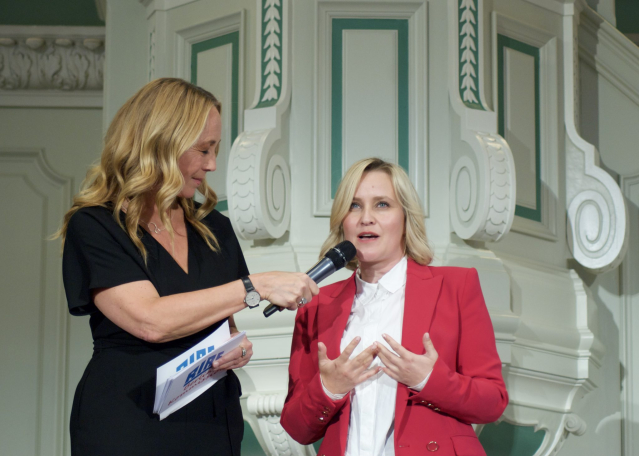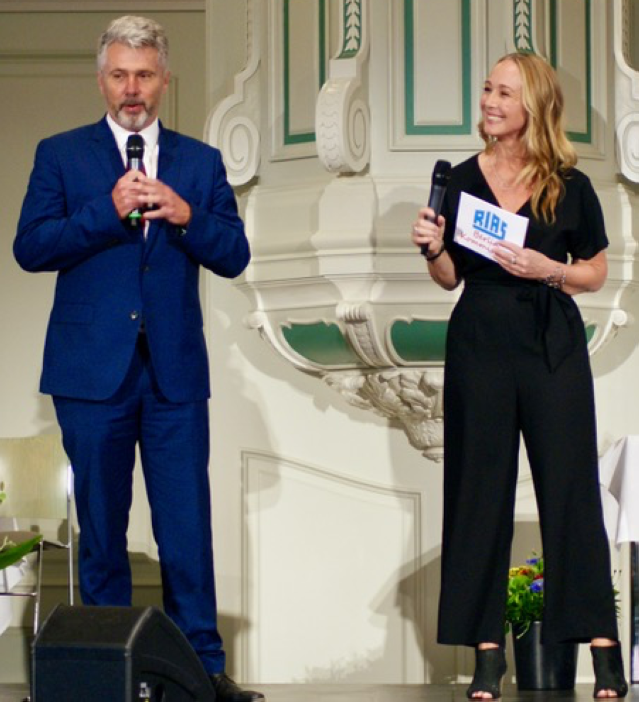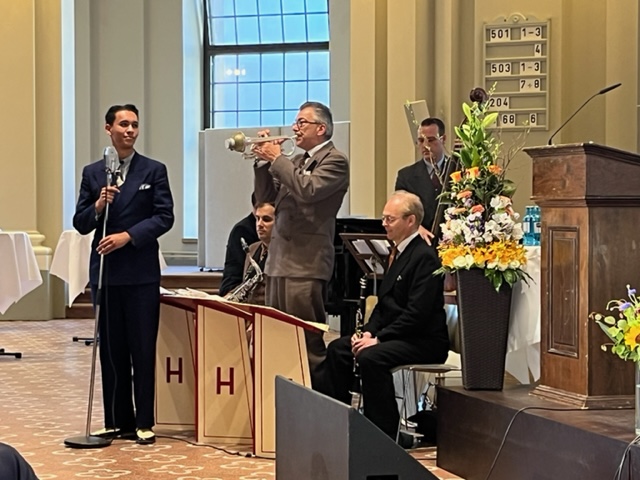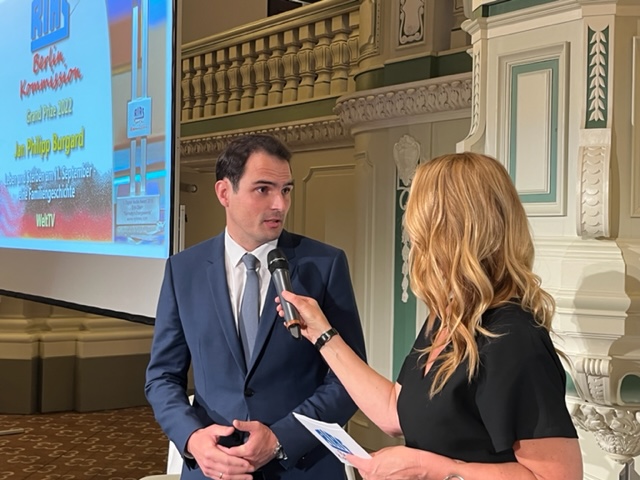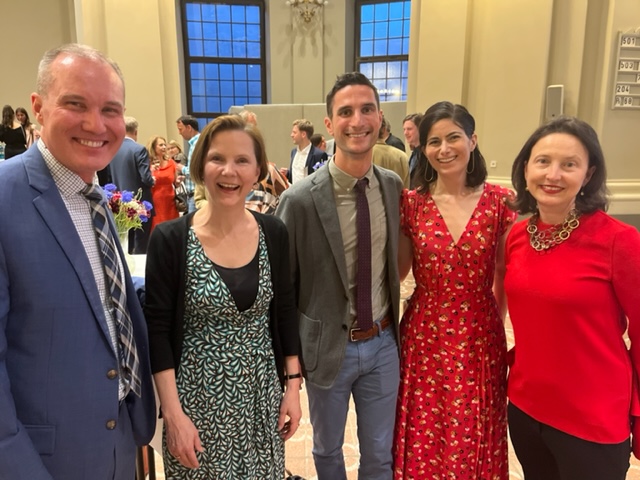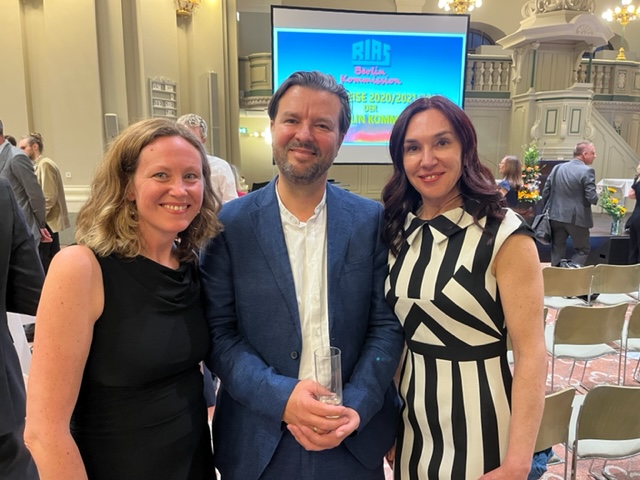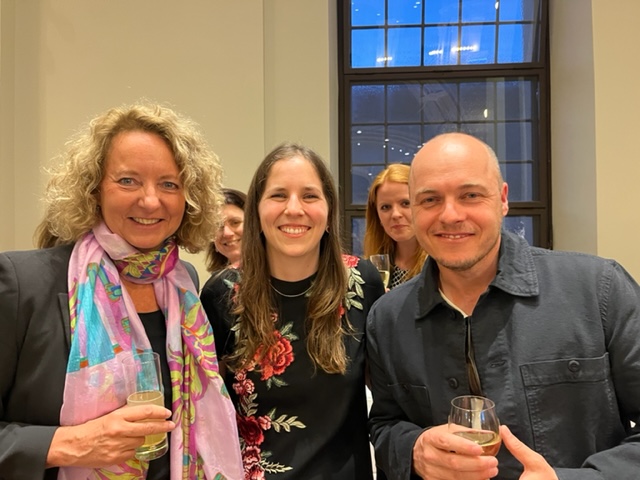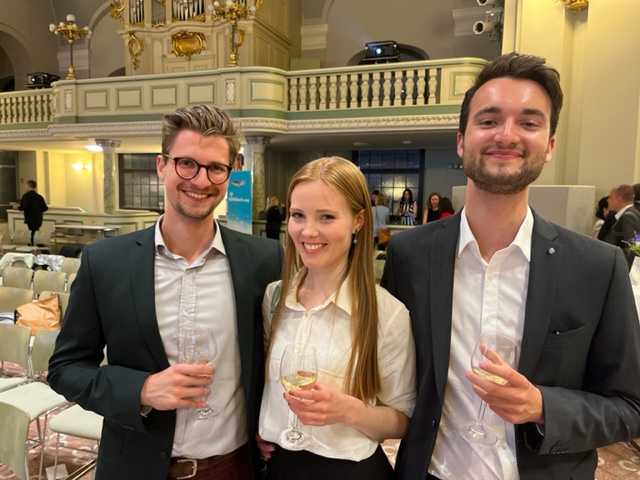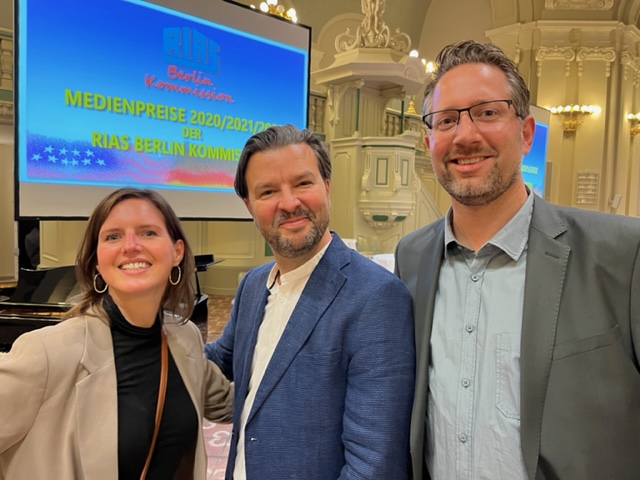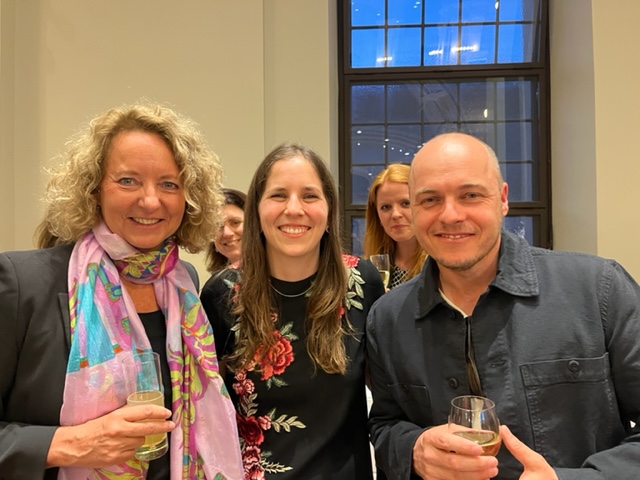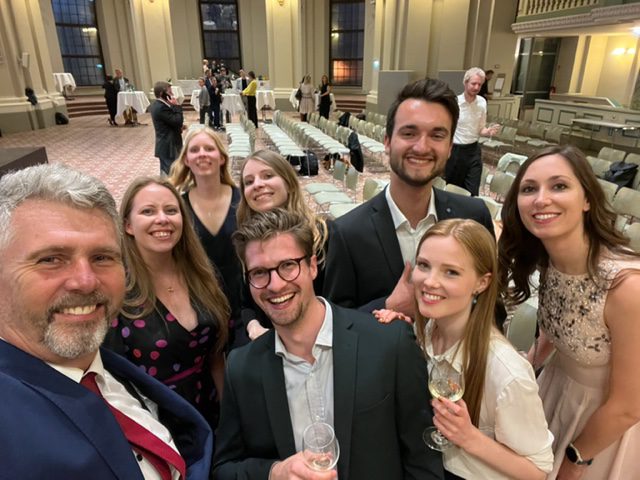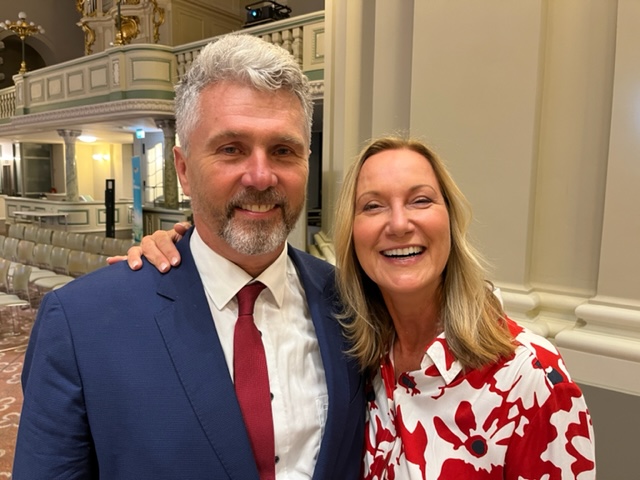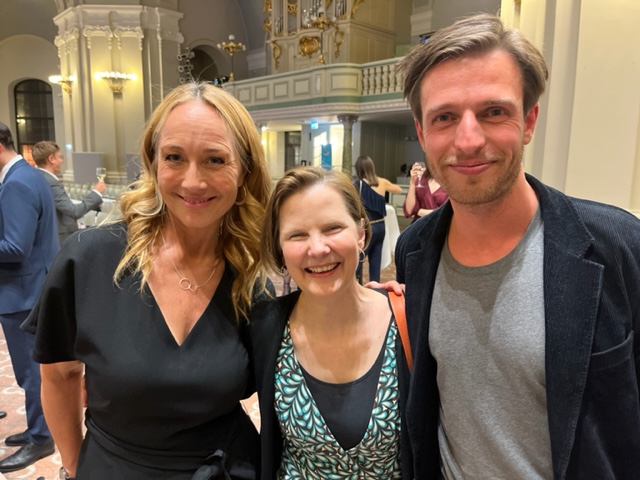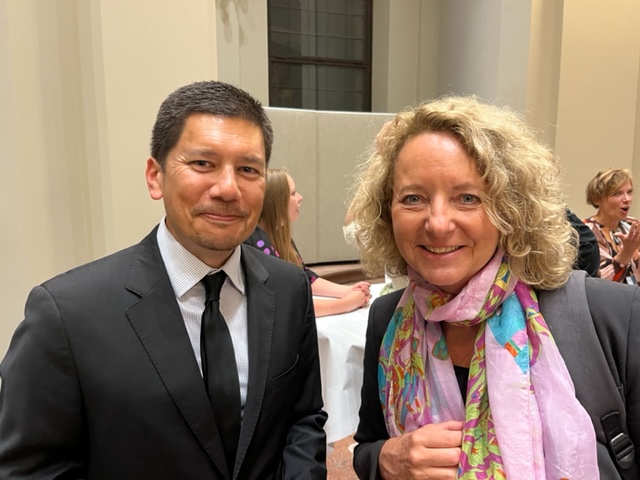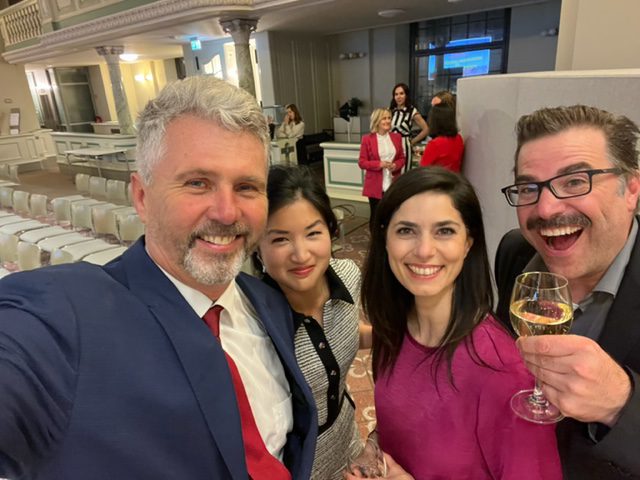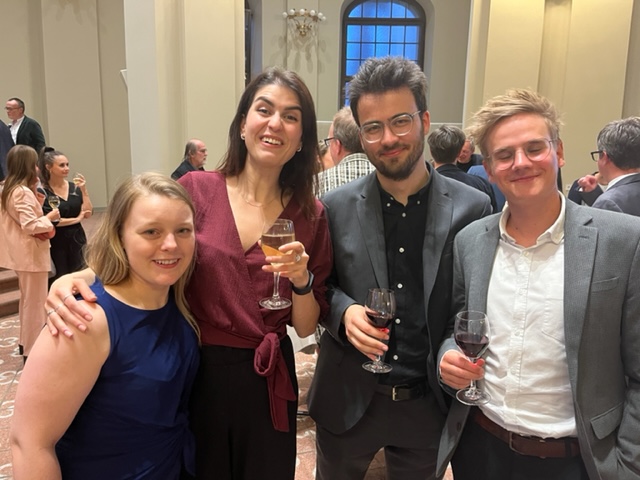News & Events
December 6, 2022
Martin Richter is RIAS Alumnus of the Year 2022
Martin Richter, senior producer and reporter at Phoenix TV in Bonn, was honored by the RIAS Berlin Commission as Alumnus of the Year 2022 for his efforts to bring American and German journalists together. Richter participated in a RIAS program in the U.S. for the first time in 2018 and has put his heart and soul into co-leading the Cologne alumni chapter for the past four years. He has helped organize two groups of 30 and 42 German RIAS alumni for a week-long program to New York in 2021 and Washington DC in October 2022.
He has also been a guest speaker for American journalism groups in Germany for many years, recruiting German journalists for RIAS programs and helping to increase the number of applications from Germany for the RIAS Media Prize.
How does it feel to be selected 2022 Alumnus of the Year?
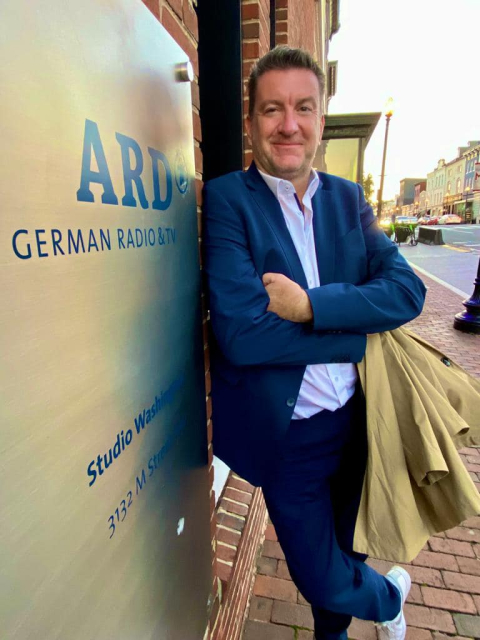 Being RIAS Alumnus of the Year 2022 is really a very great honor for me and makes me extremely happy. The award is a confirmation of my work and my commitment to RIAS, which I enjoy very much. Above all, I am pleased about the many positive feedbacks from RIAS alumni about my election – the feedback is very motivating for the future.
Being RIAS Alumnus of the Year 2022 is really a very great honor for me and makes me extremely happy. The award is a confirmation of my work and my commitment to RIAS, which I enjoy very much. Above all, I am pleased about the many positive feedbacks from RIAS alumni about my election – the feedback is very motivating for the future.
Why are you so interested in voluntarily being involved so extensively in the RIAS Alumni Network?
I really enjoy working for RIAS because I greatly appreciate the spirit behind RIAS and its network. The cohesion, the lived idea of the transatlantic bridge and the exchange with the American colleagues is a great enrichment – professionally and privately.
Doesn’t all this take an awful lot of time?
No, above all, it gives me great pleasure to work for RIAS. I like to take the time for it. I always enjoy organizing/coordinating the Cologne chapter, and I see the time for that as a benefit. Meeting the alumni from Germany and America as well as the new participants of the programs is always an enrichment and a “reward” for the time invested.
Wasn’t it difficult to organize the alumni programs in 2021 and 2022? How difficult was it to nominate the 10 candidates from the 150-strong Cologne alumni chapter?
The selection of participants for the alumni trips is never easy, as there are always more alumni applying than there are places available. What matters most to us is whether, how and in what form the applicants get involved in the chapter work and that they donate to RIAS. Diversity is also an important aspect for us, as well as a good mix of participants from private and public broadcasters. We will suggest possible participants and Erik Kirschbaum will make the final selection. Los Angeles 2023 will certainly be a special trip – we already have a lot of applicants.
Are you satisfied with the alumni programs have unfolded?
The experiences I had in New York in 2021 and Washington DC in 2022 thanks to RIAS were really great. The appointments on site, the meetings with journalists, politicians and experts in US politics are just fantastic in this diversity. To be so close to politics, to journalists reporting from the USA, is unique and valuable in this form. Whether professionally or privately: every RIAS trip is a view over the edge of one’s nose and a broadening of one’s personal horizon!
What could be done better?
I think we have to be careful that RIAS offers these and other trips within the possibilities of the participants. Especially young colleagues or single parents are not in such a good financial position that they can easily afford the program. This should not become an obstacle to applying. RIAS should keep this in mind. Also, the size of the group (e.g., the alumni group) should not exceed what is feasible. The effort of organizing and implementing the trips on site should not be underestimated.
What was the difference between your first trip in 2018 and the Alumni Program?
My first trip with RIAS to the US in 2018 was a super program with a really great group. To this day, I still keep in touch with most of that group and reuniting at the alumni trips is always a great pleasure. The experiences in the USA weld us together. In 2018, we were all still “new” to the different experiences in the US. On the alumni trips, there are many experienced participants who contribute even more with their knowledge and experience. This is always exciting to observe and experience. You can always feel the deep RIAS connection and it is one of the core characteristics of each group.
How can the RIAS Alumni network be strengthened?
I think we are already a very strong and large network! It’s incredible what Erik Krschbaum has done in this regard! In the meantime, we also have RIAS chapters in Southern Germany and Hesse and the cohesion is really great.
How does all this work in Cologne?
Since I’ve been RIAS Chapter Leader Cologne, the number of members in our chapter has grown steadily. In 2022 we are at about 150 people on our mailing list- that’s great! At our chapter meetings there are usually 20-30 members present, which is great and every time a very good exchange among each other. But the whole thing is expandable. The pandemic has slowed down our work for RIAS a lot, but I am in good spirits for 2023. Of course, I would like to see even more active members who contribute to the chapter work with ideas and suggestions. In this regard, the annual alumni program is a good approach – you can qualify yourself through dedicated cooperation.
Does the Alumni Network have any advantages for you personally?
100%. In 2018, I was in the USA as a live reporter for my channel phoenix on the occasion of the midterms. Shortly before, I had completed the RIAS program in New York, Washington DC and in Tulsa, Oklahoma. Through RIAS I got important contacts in the USA, which were valuable for my work and still are today. Some contacts even turned into friendships – what better way to talk about a network?
Why do you do so much for RIAS?
Because RIAS itself has enabled me to do so much and continues to do so today. I want many colleagues (young and old) to have the same experience and benefit from the great RIAS spirit. It is a transatlantic network that is second to none.
What do you like most about RIAS? What do you like least?
The cohesion, the spirit of RIAS and the exchange with German and American colleagues. as a network across the Atlantic and back is unique in this form. I would like to see even more alumni getting involved and contributing to further strengthen and expand the RIAS network. “Spread the news” is an important component of this – many Kolleg:inenn still know far too little about the opportunities RIAS offers. I would also like to see the participants of the programs see RIAS as more than just a stop on their resume and give something back to RIAS – not just a donation.
November 28, 2022
Enter the RIAS Berlin Media Prize competition, win a trip to Berlin
Journalists in the United States and Germany are invited and encouraged to submit entries for the $10,000 RIAS Media Prize competition. It’s a truly transatlantic competition with American and German radio, TV and digital journalists putting up their best work on issues that touch upon transatlantic issues broadcast in 2022 — anything from political campaigns in the USA from a German perspective, the impact of the climate crisis on both countries or how the United States reopened its borders for EU citizens at the end of the Corona pandemic.

The 2023 winners in the radio, TV and digital categories are invited to take part in the gala awards ceremony in Berlin in June. RIAS alumni who worked on a story during their fellowships or shortly thereafter are also encouraged to submit their work for a special “fellow award” category. The independent jury will review all entries submitted by January 31, 2023 in February and the winners will be announced right afterwards. The winning entries will receive $1,000 in prize money while one grand prize winner selected by the jury will receive $5,000. Some of the recent winning entries have included Bill Whitaker from CBS News “60 Minutes”, and Clare Toenskoetter from The New York Times’ podcast The Daily
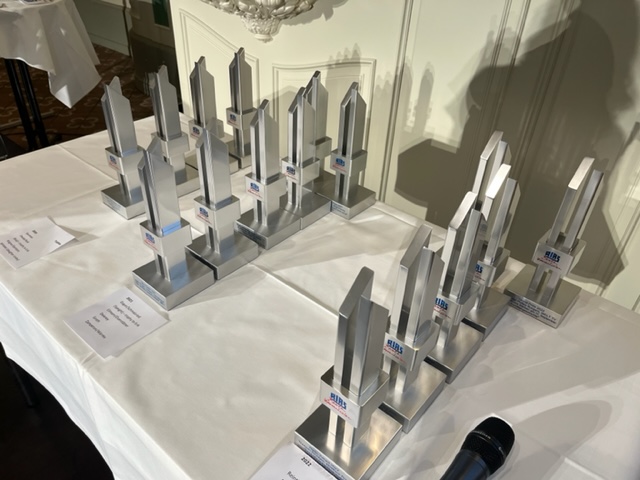
Here is a link with more information on how to submit your entries. Also, please encourage other journalists you may know to apply — or whose work you may have seen or heard.
Ideally entries submitted will:
- go beyond daily and routine reporting
- promote dialogue on similarities and differences between the two countries
- stand out thematically and/or in their execution
- take on new questions in a creative way
- critically examine and make diversity of social reality clear
- contain interesting ideas for transatlantic debate
- encourage reflection on problems and solutions
- question clichés about Germans or Americans
- describe trends in everyday life of general interest
- contribute to mutual curiosity and understanding
- strengthen democratic and societal values
Please write to info@riasberlin.org for further information.
November 23, 2022
RIAS Berlin Commission 2022 fundraising drive
Dear RIAS alumni members and friends of RIAS,
Thanks to your continued support, the RIAS Berlin Commission has had a record-breaking year in 2022 with seven exchange programs and 114 participants. Alongside our two standard programs to the USA for German journalists and two standard programs to Germany for American journalists, we also had two student programs in a busy year capped by an alumni program for Germans to the Washington DC and Pennsylvania. Thanks to all the alumni who shared their time and contacts to help make all of these programs so outstanding.
We are hoping to have eight programs in 2023, including a one-week alumni program to Munich and Cologne for 30 American alumni (September 16-24) along with a one-week alumni program for 30 German alumni to Los Angeles (October 15-21). Please let us and your local chapter leaders know if you are interested in taking part in an alumni program.
With our programs now back in full swing after two difficult years slowed by Covid 19, we are renewing our appeal for donations from alumni and friends of RIAS. We are hoping that you might also be able to help with even a modest contribution. We use your tax-deductible donations entirely for added spots on the programs and will continue to devote donations to that good cause.
Click the link on the top right “Make a Donation” for tax-deductible donations
Or on the RTDNA homepage: https://rtdna.networkforgood.com
(Click on the red ‘Support Journalism’ on the banner near the top of the page and then enter the amount you would like to donate. Then support RIAS Berlin Commission by scrolling down and choosing ‘The RIAS Program’ as the recipient of your donation)
We also really appreciate your spreading the word about the RIAS Media Prize and encouraging journalists in the USA and Germany to enter their work into the competition. We are planning to have the annual awards ceremony in Berlin in early June along with an alumni party celebration the following evening and hope you can join us. Here is more information about the RIAS Media Prize: https://riasberlin.org/wp-content/uploads/2022/11/RIAS-Call_MediaPrize_2023__Flyer.pdf
We also have two new alumni in the USA who are helping to coordinate our programs. Michael Gargiulo in New York gargiulo@riasberlin.org and Pam Ortega in Oklahoma ortega@riasberlin.org Please reach out to Pam or Michael if you are interested in the alumni programs, have any questions or suggestions. Thanks again for your support and we look forward to seeing you.
November 16, 2022
RIAS Berlin Commission plans 8 programs in 2023
The RIAS Berlin Commission is planing to operate a total of eight exchange programs for broadcast journalists in the United States and Germany in 2023 for a total of about 130 journalists. There will be four programs to Germany for American journalists (in June, July, and two in September) and four programs to the United States for German journalists (in March, April, and two in October).
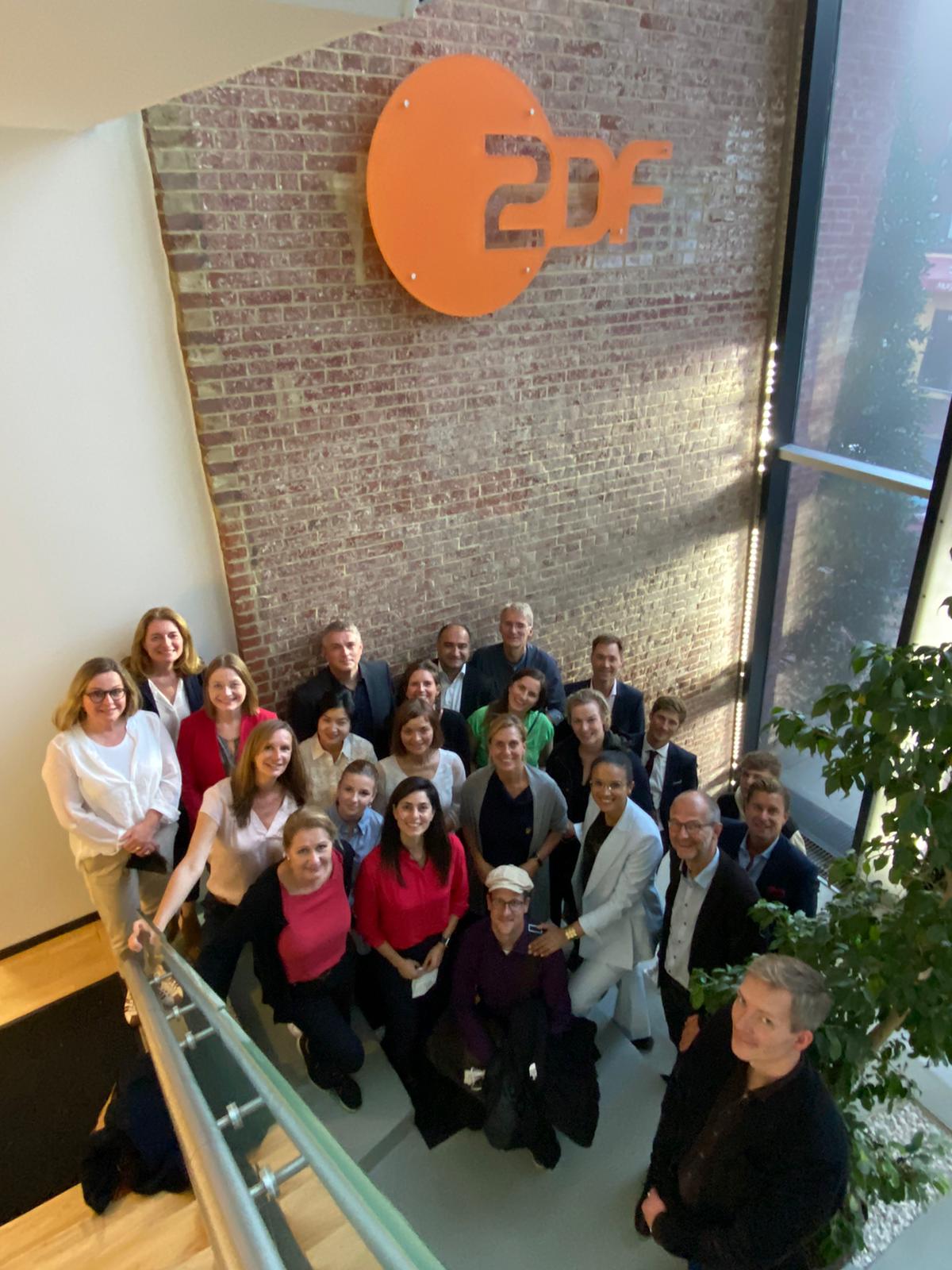 Along with the two standard programs to Germany and the United States, the RIAS Berlin Commission is planning to run two three-week-long European Recovery Program (ERP)-funded programs for students — one to the United States in March/April and one to Germany in June/July. The RBK is also planning two major alumni programs for American alumni to Munich and Cologne in September and for German alumni to Los Angeles in October.
Along with the two standard programs to Germany and the United States, the RIAS Berlin Commission is planning to run two three-week-long European Recovery Program (ERP)-funded programs for students — one to the United States in March/April and one to Germany in June/July. The RBK is also planning two major alumni programs for American alumni to Munich and Cologne in September and for German alumni to Los Angeles in October.
Here is more information about the eight 2023 programs in chronological order:
Standard Spring Program USA for Germans – March 5-March 18
Washington March 5-9; Pennsylvania March 10-11; New York March 12-18.
ERP Student Program USA for German students – March 17-April 7
New York City March 17-March 26; Individual programs at universities in Oklahoma, Illinois, Indiana, New Mexico, Arizona – March 16–April 7
Standard June Program Germany for Americans – June 4-June 17
Berlin June 4-10; Hamburg June 10-12; Cologne June 12-14; Brussels June 14-17.
ERP Student Program Germany for USA students June 18-July 8
Berlin June 18-July 8; one day to Leipzig June 23, two-day Hamburg June 28/29; two-day Cologne July 5/6.
Standard September Fall Program Germany for Americans Sept 3-16
Berlin September 3-9; Hamburg September 9-11; Cologne September 11-13, Brussels September 13-16.
Germany short/alumni program for Americans Sept 16-24
Cologne September 16-19; Munich September 19-24
Standard Fall Program USA for 10 Germans Oct 2-Oct 20
Washington-Oct 2-7; New York-Oct 7-15; individual stations Oct 15-20
USA short/alumni program for 30 Germans Oct 15-Oct 21
Los Angeles – Oct 15-21
November 4, 2022
Impressions of Journalists from Germany on USA Program – Oct 23-29
Here are the thumbnail impressions that a group of 42 German journalists had recently on their one-week long RIAS Berlin Commission fellowship to Washington DC and Pennsylvania. They met US and German journalists such as Wolf Blitzer, Jeff Mason, Elmar Thevessen, Gudrun Engel, Ines Pohl, Christopher Wittich and Roland Nelles, politicians, think tank experts, fact tanks like Pew Research, immigration experts and political analysts, Americans in the Amish community and a local congressman in Pennsylvania Lloyd Smucker from the 11 Congressional district to learn more about the United States just a week or so before the midterm elections.
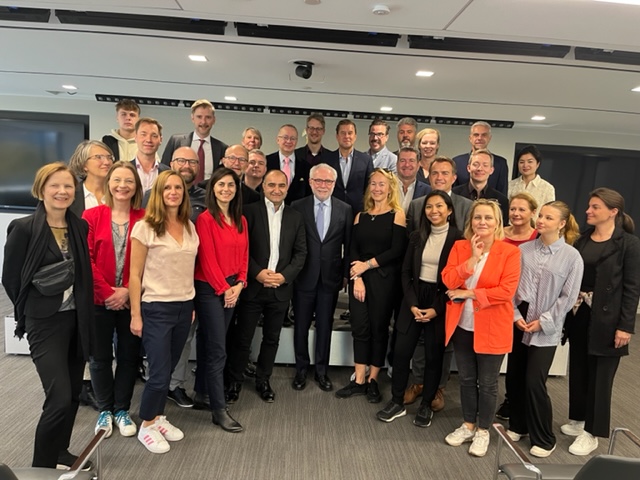
Dilek Üsük, Berlin: I’m still overwhelmed by how great this Alumni trip to Washington DC was. You can read as many newspapers as you want and watch as many news-programs on TV, that won’t give you the insights and valuable experiences one can get from the talks and meetings with so many interesting and inspiring journalists, politicians and analysts – especially when it takes place two weeks before the midterm elections. All these talks and discussions about politics and US-society were so enriching, having such a great impact on me that it is very hard to pick a highlight. But some speakers were really outstanding: CNN anchor Wolf Blitzer, whose parents survived the Shoa. And Diego Sanchez, who talked on immigrant issues, touched me very deeply as a child of Turkish migrants. Also very interesting: Talking to Republican-Congressman Smucker, who has very strong opinions. All in all I went back home with my mind full of so many new thoughts and impressions, for which I’m very grateful. This trip was amazing also because of this incredible group. I met so many interesting, funny and lovely people. I want to compliment RIAS for putting this diverse group together, which worked out great. RIAS, your work is terrific, thank you so much for this wonderful trip.
Charlotte Maihoff, Cologne: What a great experience! A week of meeting with journalists, politicians, committed people, asking questions, discussing, learning more about the US and the politically exciting times just before the midterms. All this while teaming up with smart, warm-hearted colleagues from Germany. Could it be better? Especially exciting: The Amish of Pennsylvania talking about their lifestyle and visiting the White House Press Room, plus watching the President’s helicopter taking off from the green lawn in front of the building. Many thanks to the wonderful team of RIAS for this enriching week. See you all soon!
Isabelle Körner, Cologne: Democracy is the government of the people, by the people and for the people. This is how Abraham Lincoln described it in his famous Gettysburg address in November 1863. Lincoln served as the 16th President of the United States and the Gettysburg Battle is considered to have been the deadliest battle during the American Civil War. The weekend before the RIAS Alumni Program began, I visited the battlefields. Coming back to the US capital, I had many questions on my mind: How likely is another civil war in the US and what would it look like? What role could the current economic challenges play for the political future of the country? Will former US-President Donald Trump run again in the election 2024? During the Alumni week, I was able to talk to many experts about these questions. The agenda and the opportunities were amazing! I cannot thank RIAS enough for enabling me to go to Washington DC just before the midterms. I have gained a much better and much more balanced understanding of the current political, social and economic developments in the country. Last, but not least: It was an honor to spend this week with so many other RIAS alumni. I am very thankful for their insights as well as inspirations and I am grateful for the new friends I have made on this wonderful trip.
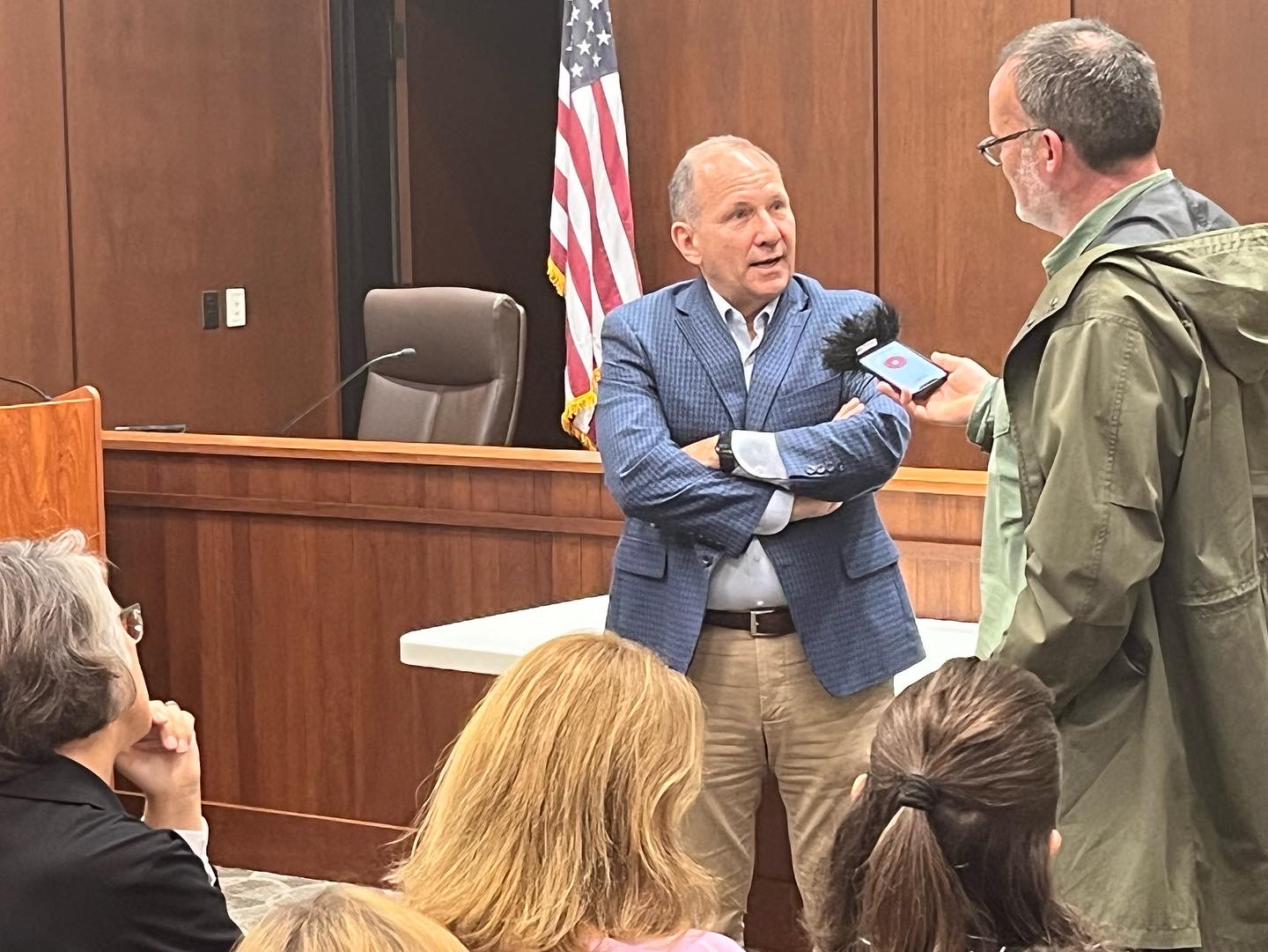
Martin Richter, Cologne: What a great experience! Thank you RIAS for unforgettable days and meetings during our one week in Washington DC. We met so many great colleagues from German TV and radio stations – fantastic! We had a wonderful time getting to know colleagues from other German stations and discussing American politics and the upcoming midterms with politicians, journalists and political strategists. The one day trip to Pennsylvania, meeting Amish people and meeting CNN Legend Wolf Blitzer at the Hudson Institute were my personal highlights! I had the best time ever thanks to RIAS.
Michael Kolz, Berlin: 23 years after my RIAS debut, I am thrilled that exactly this spirit, which already made it so incomparable back then, still prevails, in the participants and the program. Outstanding guest speakers, incredibly inspiring colleagues and a trip lovingly arranged by Erik and his team made for unforgettable moments in Washington DC. What a Rock’n’Roll week – Well done RIAS!!! I am returning home with a smile on my face and looking forward to more adventures with all of my new friends.
Annette Yang, Hamburg: Midterms in Washington: A week full of insights. Inspiring people on stage and behind the scenes. Legendary CNN anchor Wolf Blitzer, White House reporter Jeff Mason, Amish father Ben and many more shared their personal stories: What a treat! A lively and lovely group of journalists was ready to give it all – day and night. Brain food as it’s best: Thank you RIAS for having me!
Kristian Wiegand, Bonn: The USA and its diversity, the people in all their facets and a political discussion that is no longer just conducted objectively. These were just a few lasting impressions of this alumni trip. Meetings with Congressman Smucker and the Amish community in Pennsylvania have given me insight that cannot be read about in books or newspapers. A look at Wolf Blitzer’s own and family history was another immersive experience of this tour. But what I enjoyed the most is the exchange between German and American alumni. Not only did I meet new colleagues there, I also made new friends. 1000 thanks to Erik and the chapter leaders who made such a trip possible
Thielko Griess, Cologne: Obviously he exuded a lot of confidence: We met Congressman Smucker, a Republican from the rural Lancaster, Pennsylvania, region, in his “home territory.” He doesn’t need to worry about his reelection victory in the midterms. I had prepared myself a bit for him, the politician and thus responsible for decisions. It was important to me to test him with a few questions on some of the points he made. How about the bona fides of the election denier who wants to be governor of the state on the Republican ticket? How about the false claim that rural Lancaster is plagued by crime? The candidate realized he wasn’t “getting away” with every claim and faltered a bit. This too, a journalistic encounter with a politician is one of the memories of that week that will remain. Of the many other meetings that I would like to describe as impressive was the one with Wolf Blitzer. Of his family history, which is deeply und inseparably interwoven with the Holocaust, survival and emigration of his parents I was not aware in that detail. It was visible that sharing his thoughts and analysis, including the state of the political culture in the States nowadays, was important to him and us. Then, our very first meeting on Monday at PEW Research was of great importance to me: Figures, statistics and analysis, performed at highest academic level gave a very good basis to build the many impressions and insights on. I would like to express my deep gratitude to RIAS and everyone who took part in organizing everything so greatly. Apart from learning so much about various topics, it was a pleasure to be part of this group of fantastic people, each and every one being open-minded, curious and full of energy. We grew together as a group, and our understanding grew as well. I enjoyed every minute of it.
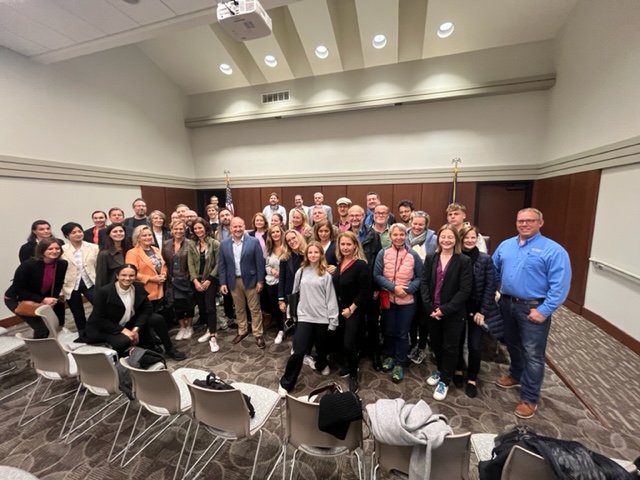
Gabriele von Moltke, Berlin: “The United States has not been this divided since 1850.” This assessment of the current political situation from last week sticks in my mind. We had the opportunity to experience firsthand the political climate just before the midterms on this RIAS alumni trip to Washington DC. The RIAS team assembled an impressive group of experts, journalists and politicians to share their views with us. Just a few examples: The researchers at Pew surprised me with insight on the impact of religion on voting. The colleagues at NBC, NPR and Reuters shared their analysis and pre-election stress with us. Julius van de Laar introduced us to US campaigning. All our talks gave us highly differentiated insights into the upcoming elections and the divided constituency. What an awesome, jam-packed week! A first class networking event! Thank you RIAS for making it all possible
Vladimir Balzer, Berlin:What a week! Not only me, but dozens of other great journalists from all kinds of TV and Radio newsrooms in Germany were heard saying that. Well, it’s exactly what it was. Coming not only very close to President Biden and almost being able to ask him a question right on the White House grounds (I did prepare one!), but also meeting great American colleagues from the RIAS network, NBC, AP, NPR, Reuters, you name it – and learning from them, exchanging, strengthen transatlantic ties between journalists. And what do journalists need? Reliable information! Well, that’s exactly what we’ve got. The Pew Research Center, which calls itself fact tank, provided us with an impressive set of figures to understanding how heavily the political scene in the US is changing and what role – for example – religion plays (or not)- This Washington week shed a bright light on the political sphere days before the crucial midterm elections – including the rare opportunity to ask for one and a half hour a Pennsylvania congressman from the GOP about his ambivalent relation to Trumpism. And not only that – we had the chance of meeting representatives of conservative think tanks such as Hudson and American Main Street Initiative which gave insights in the way of thinking of a political movement as successful as never before. I had the feeling they were all impressed by this bunch of well prepared and curious media people from Germany. What can I say? The RIAS background helps in many ways. And it is so great to see the alumni network growing and carrying the RIAS idea even further. If I would be asked, what meeting has been the most impressive on a personal level? I can say: there were many, but if I had to choose, maybe it’s hearing about the story of Diego Sanchez, the leading figure of the President’s Alliance on Higher Education and Immigration. He, coming from Argentina, lived through his juvenile life as an undocumented individual in the US. He is now a citizen but will always remember the times when for years he felt isolated, even in high school. He fights now for an easier way to become an US citizen, and he says this country needs it. But he also knows: this issue is not decisive for the midterms. Even though him hoping this will change, he’s not confident about it. But giving up is just not an option. He is an American guy; he wouldn’t give up. Why should he?
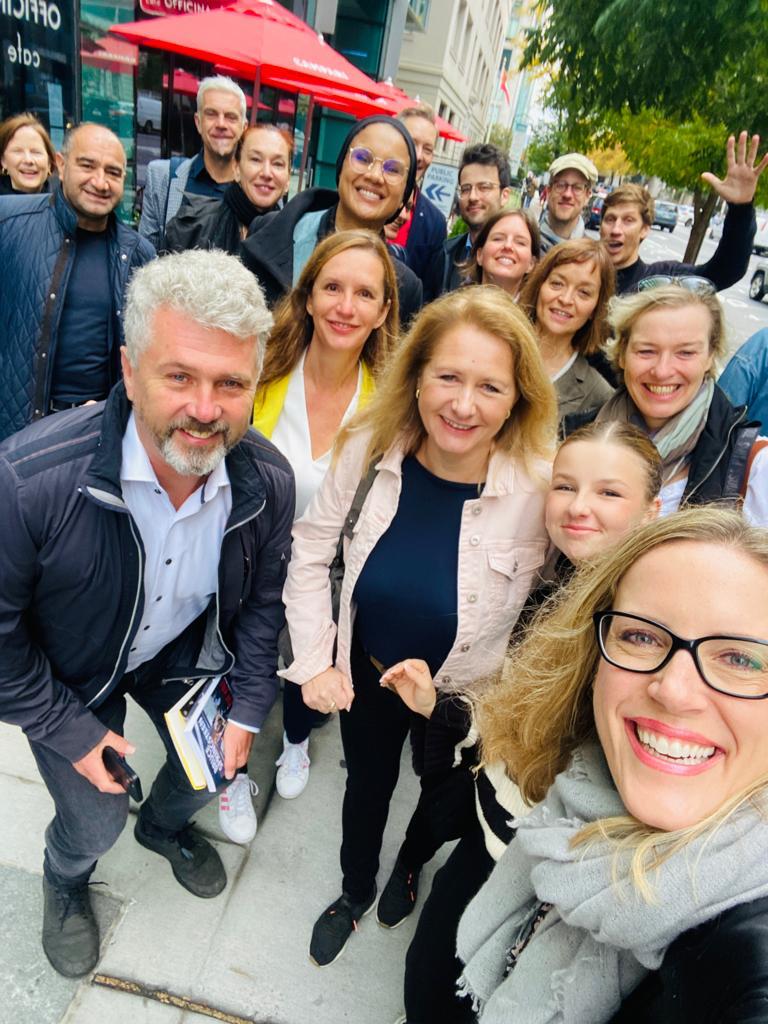
Catherine Martens, Brussels: Put over 40 people, their thoughts, and diverse professional horizons in one room, add excellent speakers, testimonies and expertise and you get an extraordinarily inspiring week of politics and razor-sharp analysis. Be it Pew Research, be it first-hand insights by campaigners, actively running congressmen, be it to be part of a bunch of people in a bus or be it the great opportunity to enter historic ground in the White House Press Room – to me, RIAS is more than the sum of those who take part, it is the curiosity and openness of each and everyone to learn more and to seek for exchange with others. Across borders and beyond professional positions, this outstanding alumni week broadens my transatlantic comprehension on human level with inspiring minds, thanks to RIAS amazing and tireless efforts to bring it all together
Nina Lammers, Berlin: After meeting with correspondents, experts on US politics presenting their different political views, congressman Smucker, a member of the Amish community and an activist fighting for the rights of migrants without documents, I gained an understanding of the midterms and the current situation in the US that I would have never been able to get without the RIAS program. Sharing impressions, thoughts and experiences with dozens of fellow RIAS alumni made the experience even more special and unforgettable. I am full of joy and gratitude looking back at the Alumni week in Washington. Thanks to the wonderful RIAS team for the opportunity to be part of the network and for organizing a great program.
Philipp Jahn, Cologne: What a week! Packed with smart thoughts, profound encounters and unforgettable moments. Experts at Pew, Hudson and Brookings, a Republican congressman in the midst of his re-election campaign, an immigration activist who until recently lived undocumented in the U.S. for more than 20 years, plus the outside perspective of German foreign correspondents and the German Embassy – such a wide range of insights, that I now feel more than well prepared to cover the midterm elections. Thanks to Erik and the entire RIAS team for putting together this dense and inspiring program – a week of RIAS at its very best! I never expected the wonderful “Klassenfahrt” feeling of my first RIAS tour eight years ago to be repeated. But indeed, it has been repeated, even with such a large group. For me, what’s special about the RIAS network: it’s not just about making professional contacts that might be helpful someday – it’s the friendships that are formed, both on the other side of the Atlantic and back home in Germany. I am more than grateful to be part of it.
Susan Falkenstein, Munich: 1.5 meters separate US President Joe Biden and me in the White House park. He approaches us in his familiar, leisurely jogging stride, smiling and wearing sunglasses. With Joe and me is only a crowd of other international press people, who almost seem to be part of the White House inventory. They have a small, worn-out press center near the Oval Office. Biden appears to not be answering any questions. But that is usually the case, my American colleagues tell me. Instead, he goes directly to his helicopter, salutes and climbs in. The helicopter with Joe Biden on board, named Marine One takes off a little later, followed by two more helicopters. Just described was my biggest moment of this RIAS trip. Unforgettable! An astonishing moment was the talk with Julius van de Laar about campaigning and gathering votes in the US. Julius has already knocked on the doors of potential voters himself during Obama’s campaign. He told us that campaign teams go far to collect and analyze as much voter data as possible: What did the person vote for last time, what did they buy from Amazon, what car do they drive? In Germany, that would be unthinkable. Elmar Theveßen from ZDF provided an eye-opening moment. He explained that it is currently difficult to place topics from the US in broadcasts in Germany because domestic issues are dominating the news. This RIAS week in Washington was filled with many more enriching, unique moments, appointments, meetings, and fun with the other alumni. #Rooftop with a US-Capitol view. See you all very soon! Thank you so much to everyone of the RIAS Commission who made this possible!
Andreas Franz, Leipzig: A permanently engaging and stimulating week of insight and exchange of views and opinions. The RIAS Alumni Week in DC was an intense ride through current American politics. Giving us the chance to get new perspectives on the main political discussions taking place. From a congressmen struggling with Trumpism and struggling with answers to our questions but knowing he can’t do without the support of Trump‘s followers to another in-depth talk at the conservative Hudson Institute to the iconic CNN colleague Wolf Blitzer to another highlight at the end of the week at NPR. Just to name a few. It’s impossible to highlight one highlight, so many were organized by Erik and his great crew. RIAS stands for exceptional transatlantic “mingling”. And for that you have to convene a great group of colleagues well prepared, interested and grabbing the opportunity for first-hand information every minute of this week. It was a pleasure and a privilege to be part of it all.
Wiebke Keuneke, Berlin: Returning home from the alumni trip to Washington D.C. in October 2022, I realized the RIAS program works on so many levels. First of all it provides the visiting journalists with in depth insights of the current political discussions. Secondly it strengthens the German-American relationships among journalists on a very personal level, which seems even more important in these difficult times where media has been under attack. Another aspect that was very enriching to me was the diversity of the alumni group. It was amazing to meet so many colleagues aka new friends from every kind of German media and be able to network – and of course – mingle from dawn till dusk till dawn. Some of my personal highlights during this week were visiting WAMU and learning about how they are financed, fangirling around CNN anchor Wolf Blitzer and learning about his personal background, listening to – and reflecting on – very strong opinions and ideas of CATO, a conservative think tank, and last but certainly not least having the chance to talk to Diego Sanchez about immigration. An appointment that was a perfect combination of a personal, emotional story combined with insights of how human rights activist and lawyer Sanchez works to get things done on a political level. “I thrive in chaos” – is how he says it. Finally I would like to thank everyone for this week that not only affected my brain, soul, heart and feet but also left me inspired and above all grateful!
Bjorn Heckmann, Cologne: „Hate won‘t make America great!“- is written on the poster, held by a retired chemist standing in front of the White House. He tells me that he comes here several times a week to inspire people to talk and listen to each other. Exactly this is more important than ever as the states appear to be so divided and discussions and conflicts have become more and more aggressive. The RIAS program is a great opportunity to understand what is happening, the way both sides think and act. It is extremely helpful to promote the mutual understanding and celebrate these important values: talking to each other and – listening.The discussions with Amish people in Pennsylvania, a Republican congressman and of course with Wolf Blitzer are only some of my personal highlights during this week. Thank you so much, RIAS, for this amazing time, the priceless insights and the wonderful people we had the privilege to meet!
Pia Bierschbach, Düsseldorf: What a fantastic week! I‘ve never expected a trip like this. All my expectations have been exceeded. The inspiring and interesting talks with expats, journalists, politicians, and Amish people – awesome! Now my mind is charged with new amazing thoughts and deeper knowledge. Talking to Roland Nelles (Der Spiegel) had a great impact on me. Reporting about presidents who are so different from each other. Two presidential terms, two worlds. The most precious moment for me: Being at White House area and getting the chance to see President Biden in his daily work. It was unique. I still cannot believe it. Additionally, new colleagues turned into friends. That was RIAS at its best. I am very grateful for all of this.
Petra Gute, Berlin: E pluribus unum – the USA: a democracy crisis in the making?!? My RIAS-midterms-Alumni trip started off with a chat with my Afghan Uber-driver Nisar on my way from Dulles Airport to the city. He mentioned he used to always vote for the Democrats but for the upcoming midterms would vote Republican because of President Biden’s Afghanistan policies. My Washington-trip ended with a conversation with my black Uber-driver Erica. While winding our way through the Washington-Marathon she explained she won’t vote at all, because this country just has become “too crazy”. In between these two conversations was an intense week packed with so many fascinating, inspiring, and sometimes even horrifying (the words “civil war” were uttered way too many times) inside views into this amazing , diverse and divided country . I learned so much about the Democrats and Republicans in these midterm elections, so much about the impact of religion on American voters, about immigration, and the regular (sometimes life threatening) work of my American journalist colleagues and the German TV correspondents. I realized that politics and journalism in the U.S is more and more a question of opinions and not of facts. The most touching meetings were the short but deep dive into the history and presence of the Amish community in Lancaster County/Pennsylvania; the talk with Julius van de Laar; the university journalism class with Brandon Benavides at Georgetown University; the talk on immigration with Diego Sanchez and his very personal experiences as an undocumented immigrant in the U.S.; – and of course the meeting with legendary CNN-anchor Wolf Blitzer telling us about his search for his roots as the son of Polish Holocaust-survivors. Thank you Erik Kirschbaum and the whole RIAS-Berlin-Commission-team for putting together this fascinating week. A week we experienced with more than 40 “bright and brilliant” journalists from all over Germany, becoming close friends in these few days. A week not only of learning but also of discussing, eating and even dancing together and especially mingling with the American journalist colleagues. By now I consider RIAS-Alumni Tiffany Zeno or Michael Gargiulo friends for life. I have been a RIAS Fellow now for 22 years (my first Fellow trip was for the U.S. presidential election Al Gore/ George W. Bush in the RIAS Fellow Autumn program 2000). So much has changed in the U.S. in these past 22 years. But being a RIAS Fellow (and, together with my RIAS-friends Anja Heyde and Vladimir Balzer, being a Berlin chapter leader) was and is a life-changing experience for me and one of the greatest honors. We, the RIAS alumni will do everything in our power to keep the RIAS-Alumni-network alive and kicking for years to come
Gesine Dornblüth, Berlin: Super group, super questions – each meeting ended far too quickly. If I thought already on Tuesday that the trip to Pennsylvania with the Amish and Congressman Smucker was the highlight of the week, it was topped day after day by meeting CNN anchor and son of Holocaust survivors Wolf Blitzer and by Julius von der Laar’s incredible insights into campaign methods. Plus, I got key insights around the US support for Ukraine, which is very important for my daily coverage of Russia’s war. And all of this in an incredibly open and warm group of so many wonderful colleagues. Thank you, RIAS Berlin, for making this possible!
Zlatin Nikov, Saarbrücken: Thanks to Erik and the whole RIAS team for making this experience possible. Rarely have I received so much important input on the state of the USA in such a short time. From fellow producers at National Public Radio to representatives of the Amish people in Pennsylvania to the visit to the White House – each will be well remembered. At the same time, it was very helpful to meet so many fellow journalists from all over Germany who are all passionate about the U.S. in their own way and with whom one could exchange impressions. I feel humbled to have been part of this amazing experience and am looking forward to seeing you all again soon.
Dominik Lauck, Hamburg: Where else can you meet Amish people, who live without cars and internet, a Congressman in the final sprint of his campaign and a transvestite in a high heel race on one day? Only the RIAS Alumni program can do that – it was mind-blowing. The week in Washington helped me to understand, why so many Republicans still support Donald Trump – despite his role during the Capitol riot in 2021. I’m concerned about the rising prices in Washington – 10 Dollars for a beer! As WNBC anchor Michael Garguilo (btw: his knowledge about European football is very impressive!) told us, many journalists have to commute for two hours or have to work a second job to pay their bills. And no wonder that you see so many homeless people living in tents in the heart of Washington… Thanks Erik and the entire RIAS team that you gave me the opportunity to get so many new insights and different perspectives into the life of Americans. I’m grateful to be part of RIAS and happy that I found new friends among the other RIAS fellows.
Daniel Pokraka, Berlin: Eight days ago I wondered if it was really a good decision to take part in another RIAS week in DC, right before the midterms, like 2018. Could I really experience something new and have a good time again? Hell yeah! Meeting Amish in Pennsylvania, discussing with politicians, learning about views that seem so unfamiliar and are yet so important. And above all: networking with German and American journalists, even making new friends. We’re all RIAS. And I’m grateful to be a part of it.
Mirja Fiedler, Berlin: NPR anchors, a Reuters White House correspondent and a Republican Congressman two weeks before the midterm elections – in the powerhouse Washington, DC and rural Pennsylvania – including exclusive insights into the oldest Amish community in the USA and a diplomat’s life at the German embassy. Political scientists, lobbyists and journalists from both sides of the Atlantic. AP, NBC and CNN legend Wolf Blitzer as well as Spiegel, RTL, ZDF and ARD correspondents on top of a great group of German RIAS alumni mingling with their U.S. counterparts. The biggest RIAS alumni program so far was intensive, incredible and inspiring. Time flew by during those seven days, but this amazing experience with fantastic impressions is going to last for a lifetime.
Nadine Gries, Hamburg: “Great economic report today, ADP report. Things are looking good!” just a few words President Biden said walking by the reporters before heading to the helicopter. Words that he might hope will have an impact on voters decision, because as prices are soaring and the mid-terms looming, he has to set the tune on the inflation issue. And we’ve learned, in the end many Americans vote with their wallets. Well, at least it had an impact on me at that moment, since standing there in the back of the White House, being part of that whole scene still feels kind of surreal and special to me. It might be the most special moment within a RIAS-week full of great experiences and inspiring talks with experts, journalists and politicans. For example the talk with Congressman Lloyd Smucker (a Republican, who is running again), the analysis of Dr. E. Mecclellan (Prof. of Political Science) or all the views and insights of German embassy spokesman Martin Jungius. Hearing their thoughts and views on issues like US economy, the state of democracy or Ukraine aid while facing an increasingly divided American nation was very interesting, different and in some parts worrying. But that is what democracy is about, to endure and accept other opinions and lifestyle. Therefore I want to highlight our excursion to the Amish community in Pennsilvania. They, from what we’ve learned, get baptised twice in life and consciously and freely decide to live a very plain, withdrawn and life full of faith, without cars or other luxuries. This being said, we kept complaining about the “6-dollar-made by inflation”-Cappuccino each morning. That makes the actual issues even more perceptible. Thanks to RIAS, we really got the full insight scoop of how America thinks and feels right now. On top of that intensive, mind broadening input, I got to know 41 other smart and inspiring RIAS Alumni fellows from all over Germany sharing all these memories with me. Not one of them I would’ve liked to miss! We experienced a week of a lifetime we will never forget, keep in our hearts and therefore spread the RIAS spirit further on. After this D.C. 2022 Alumni trip, I am more confident and proud than ever of being a RIAS Alumni and Hamburg Chapter leader. With all we’ve been hearing during that week this journalistic network gives me hope, that there will always be a bridge keeping up the dialogue and friendship between our two nations and keeping our democracies strong. Thank you, Erik, thank you, RIAS Berlin Commission!
Sylvia Warnke, Berlin: When I did my first RIAS trip (yes, it was still in the last century), I got to know the internet for the first time. And yes, we all know what became of it worldwide. This time I was able to marvel at a supermarket of the future, without queuing at the checkout, just walking in and out. I am sure that in a few years we will also be shopping like this. Politically, I’m not so sure if we want to adapt all the developments that we saw during the intensive alumni week in Washington D.C. But it was great to get so many insights and perspectives on a country that faces exciting voting decisions now in the midterms and then in two years in the presidential elections. Thanks to Erik and his team for the unforgettable moments. And thanks also to the curious colleagues who got the maximum amount of information out of every meeting.
Arndt Brorsen, Hamburg: This RIAS-Alumni-week in DC was amazing in every sense. It was such a dense and intensive program with highlights in between highlights every day. Who else could claim of themselves to have an appointment with the impressive CNN light shape Wolf Blitzer OR a visit at the White House?! Who else gets the chance to listen to a fabulous analysis und description of the US voting system by Julius van de Laar OR meet Diego Sanchez telling his personal immigration story and his fight for equal rights?! One of the most interesting slots was also the meeting at the Pew Research Center. And it was (should I neutrally say?) ‚interesting‘ to discuss with conservatives/Republicans their attitude to Trumpism – which seems to be just the belief in power…What made this trip in addition to that so special was the fantastic Alumni group. It was so inspiring meeting this great people. We really acted as one group – which is not self-evident with more than 40 people in it.
Charlotte Voß, Hamburg: What an opportunity, seven years after my first RIAS-program – coming to DC as an Alumni right before the midterms. The wide range of our hosts – I’m pretty sure I will ask some of them for interviews soon – delivered eye-opening insights into the political and media landscape of the US, revealing tremendous differences compared to Germany. Obviously, in the US it`s all about attacking opponents and pushing voters to strong feelings. And I was deeply impressed by my colleagues at DW, AP, ZDF, and NPR that stand up for critical journalism, but expressed deep concerns about the future of the USA. My key take-away: you need to be tough to cope with all the hate of MAGA supporters accusing you of “being fake news“. Many thanks to Erik Kirschbaum and his entire RIAS-team for organizing this week, to all our hosts for their time and open answers, and to my 42 colleagues for making those days a great experience!
Gabriel Fröhlke, Cologne: The RIAS Alumni trip was awesome. It has been a week packed with many interesting appointments, meeting lots of interesting people. The best part about this trip was the fact that we had the chance of meeting people that we usually never get in contact with. Some of my highlights were talking to Amish people, CNN legend Wolf Blitzer or immigrant Diego Sanchez, who shared breathtaking experiences with us. The week also helped me get a deeper understanding of how politics and politicians in the US work. It has broadened my view, for sure. Besides, sharing all of this with a great group of German journalists from all over our country made it even better. I met so many nice and wonderful colleagues on this trip, which I really appreciate. Thank you very much, Erik and the entire RIAS team that you have organized everything so great. I am really grateful for this wonderful experience that enriched me.
Jutta Müller, Berlin: Thanks to all of you for an unforgettable week in Washington, especially to Erik, Christina, Pam and the chapter leaders. This was a lot of organization for you and everything turned out to be great! With my head full of new information and emotions I‘m heading to South Carolina now. Thinking of you and hopefully seeing you again at one of the meetings coming up.
Bartosz Dudek, Bonn: The RIAS alumni program in Washington DC 2022 has not only exceeded my horizons but also my expectations. It has provided interesting in-depth insights on upcoming midterm elections as well as excellent analysis on mechanics of power in the US. My personal highlights were the talk with Rep. Smucker (R, Pensylvania), the lecture of professor McClellan and meeting with Wolf Blitzer. Very interesting was the meeting with representatives of the Amish community in Lancaster County. The outstanding program was rounded up by the opportunity for networking with both German as well as American colleagues. It was a wonderful group. Thank you RIAS for that great week!
Nadja Kriewald, Cologne: In 2018 I was with RIAS in Washington. It was a great program. But this time it was even better. 2 weeks before the midterm elections we had so many interesting talks with PEW, Hudson Institute, CATO etc. All of them eye opening. But for me most impressive was the talk with Wolf Blitzer speaking about his family and the Holocaust. And the day in Pennsylvania with the Amish people was also really special, getting out of the Washington bubble and talking with people we normally don’t have the chance to meet. Thank you Erik Kirschbaum and RIAS for giving us this opportunity!
Gregor Schmalzried, Munich: As a news junkie and general fan of the United States, I’m reading a lot about what’s going on in American politics and culture – but it turns out nothing beats actually putting your feet on the ground and meeting the people who shape and report on American life today. Thanks to the RIAS Alumni program, I’m leaving Washington D.C. with a much deeper understanding of the Ukraine war, the threats to American democracy, the strength of the transatlantic relationship and the inspiring work of American journalists during one of the most difficult times in the country’s history. Our schedule was packed, and more than once I had to miss out on a great opportunity (meeting Wolf Blitzer) so I could make it to another (visiting the White House). RIAS does incredible work connecting the media landscapes of the United States and Germany, helping the two grow together and learn from each other. To paraphrase a German phrase: If these RIAS programs didn’t exist, you’d have to invent them!
Iris Ollech, Bonn: Could it become any better, I asked myself after my RIAS alumni trip to NYC in 2021. But this year’s programme even topped the Big Apple. Just days before the midterm elections it offered valuable insights into the political system and society of the US by meeting high profile politicians, analysts, journalists and diplomats. The valuable information, vivid discussions and exchange of views gives me a deeper insight into the „American mind“. But it also destroyed my hope that this politically deeply divided country will not drift even further apart. I would love to be wrong, and hopefully families who no longer talk to each other due to political differences will reunite again around the Thanksgiving table some day. Future RIAS fellows and alumni will observe and try to find answers. For that there is no better journalist program than this. This year it ended on Halloween weekend, and I take home a basket of inspiring memories – only sweet, no sour candies. Thank you RIAS, Erik (for President) and everyone who contributed to this unforgettable journey.
Julius van der Laar, Berlin: Two weeks before the 2022 midterm elections, RIAS provided us with front row tickets to the ultimate horserace for power. America finds itself once again at a crossroads and together with a group of some of the finest journalists and political minds from Germany we got to pull back the curtain and look behind the marble stone facades of Washington’s most prestigious institutions. It was a week-long fact finding mission, jam-packed with enlightening insights and analysis including Pew Research, The Hudson Institute, The Cato Institute and FiveThirtyEight. On top of that we discussed the economic climate, shifting landscapes in foreign relations, the state of American democracy and the heated battle for power in the upcoming midterm cycle. RIAS lined up exchanges with some of the brightest and experienced commentators, including the living CNN legend, Wolf Blitzer but also made sure we had ample time to discuss and reflect on the newly gained insights. A major shout out goes out to our fearless leader Erik and the wonderful team at RIAS for putting together such an amazing experience. I also couldn’t be happier to have spent the week with such an extraordinary, inspiring group of colleagues, who were thoughtful, generous in sharing their wisdom and so much fun to be around. It was a true privilege to be part of the program and I’m grateful to have made some memories for life.
Özcan Mutlu, Berlin: What a week, what an energy, what a spirit! So many great moments I won’t forget! Thank you very much Erik and your entire Team for this amazing program and the amazing people we have met in D.C. I consider myself as a Transatlantiker who also has been following the Obama campaign since back in 2008 in Ohio and the Clinton – Trump race in 2016 in LA. But being in D.C. during the Midterms 2022 and talking to so many distinguished speakers – thanks to RIAS – was astonishing! The RIAS Program is such a great success story! I wrote two books and many articles and comments for papers. As a long-time friend and supporter of the great RIAS Commission, maybe I should write my third book about the great success story of the amazing RIAS Commission and all their effort to build strong bridges of friendship and journalism between our two countries 🇩🇪🇺🇸
Sven Trösch, Munich: 11 years after my first trip to the US with RIAS I had the great honor to return to Washington DC as an alumnus. It was a week packed with eye-opening and inspiring encounters, just a fortnight before the midterm elections. We talked to journalists, political analysts and activists, to politicians and students. I will never forget meeting legendary CNN anchor Wolf Blitzer or discussing Trumpism with Republican congressman Lloyd Smucker. I was amazed by the incredible team spirit of our alumni group and, most importantly, by RIAS’s perfect organization of the program. Thank you so much for making this unforgettable experience possible
Accompanying RIAS Officials
Erik Kirschbaum, Executive Director, Berlin: The biggest RIAS Berlin Commission group ever may have just had the best program ever. Forty-two journalists from Germany came to Washington DC with their heads filled with questions, worries, and trepidations about the United States and its future direction but are returning home a week later with their heads and notebooks filled with a wealth of knowledge, many answers, myriad experiences and new friendships that will have satiated their appetite and maybe stilled some of their concerns. Hopefully we have all made new discoveries about the USA and maybe ourselves. To learn that undocumented immigrants to the United States are so bitterly disappointed with Obama and the Democrats or that Congressman Lloyd Smucker (R-Penn) has seen a huge conservative tilt in his southern Pennsylvania congressional district that we were fortunate to visit as many union workers have shifted from voting for Democrats to voting for his Republican party are among the discoveries. And that CNN anchor and featured RIAS guest speaker Wolf Blitzer once majored in history in college (like me), worked at Reuters (like me) and has closely followed (and admired) modern Germany’s developments and its never-ending efforts to come to terms with its past (like me) was another one of those discoveries. But best of all was watching 42 mid-career journalists from Germany get to know each other and grow together during a busy, appointment-filled week with nary a complaint. Biggest and best group ever. Thanks everyone for a fantastic week
Christina Reif, RIAS Berlin Commission, Berlin: Being a member of the RIAS team and getting ready to spend a week in Washington with 42 journalists for the first time – I did not really know what to expect. I was simply overwhelmed by the dynamics of this outstanding group – its professionalism, friendliness, acceptance, consistent hunger to learn more and also the ability to simply have fun. I was blown away by the extension of the RIAS network creating amazing opportunities such as meeting Wolf Blitzer, a republican congressman, members of the Amish community or watching president Biden run to his helicopter, just to name a few. On this occasion, I have experienced what RIAS is really about. I am thankful and honored
November 3, 2022
Impressions of Journalists from Germany on USA Program – October 3-21
Here are the impressions that a group of 11 German journalists had recently on their three-week long RIAS Berlin Commission fellowship to the United States. After spending a first week in Washington DC meeting US and German journalists, politicians, think tank experts and political analysts, the group spent a week in New York City meeting more guest speakers from the media, politics, ethnic communities and a Broadway musical actress. They spent a third week on individual fellowships visiting stations across the Midwest, South, and West learning more about how RIAS alumni from the United States do their jobs at their stations.
Damla Hekimoglu, Hamburg
How do you compress 3 years of journalism into 3 weeks? RIAS: Here we go 💪 I have never had such an intense time with such a multitude of impressions – a three-week program full of both hands-on experiences and meetings with top-notch politicians, researchers and journalists who we were able to bombard with questions. From very touching moments with Gordon Huie, a “triple survivor” of 9/11, to an off-the-record conversation with Harvey Weinstein’s PR advisor who also represents the con-artist and scammer Anne Delvey – also famously known from the Netflix show about her story – to U.S. President Biden himself, who jogged to his helicopter, the Marine One, only a few meters away from us in Top-Gun style. From once-in-a-lifetime moments that not even our U.S. colleagues had experienced so far here in the United States to cultural highlights, fun and sightseeing – we had it all. Eating pizza with a Broadway star and then admiring her on one of the world’s most famous stages? Check. Going live on air on American radio and even sing a birthday song to the show’s host? Check. Taking a deep dive into the community of Hasidic Jews in Williamsburg? Check. Sitting in the Senate of the U.S. Capitol? Check. Even though this wasn’t my first time at this historic site, it was different this time, because being here had a different ring to it: Being in the Capitol, I saw the images of January 6th 2021 in my mind, with the heart chamber of democracy being under threat. It was a moment which reminded me that nobody should ever take democracy for granted. My horizon also broadened in other moments during the 3 weeks in the USA. Be it in the U.S. comparison of ethical and journalistic standards, be it in travels to places steeped in history, or be it in very personal, deep one-to- one conversations with other group members. We laughed and cried together, challenged speakers with our questions and humbly listened to their stories. If you are ready for such a deep dive that will impact you as a human as well as a journalist – I highly recommend the transatlantic Rias program. And even though we hardly had time to sleep and take a deep breath in between – the trip was more than worth it (so says my pedometer, by the way). And I’m sure: some connections I made here are only the beginning of true friendships. THANKS.
Etienne Bell, Cologne
Nadja Bobrova, Cologne The 2022 RIAS program in the U.S. was a total “game changer” for me. If someone had told me beforehand that I would be meeting Joe Biden on the White House grounds – I would have laughed in disbelief. If someone told me before the program that I would be eating at the same table with Michael Cohen, Donald Trump’s former lawyer, and talking about his feelings of remorse – I probably wouldn’t have been able to imagine it. The same goes for meeting and getting to know the wonderful Katy Geraghty, an actress, just before her performance on Broadway – being so casual and relaxed, just an hour before she rocked the stage with full power. To say that the program was enriching is just like nothing at all. It changed the way I look at the United States. While I am still here, I am already planning the next trip to this country full of contradictions. For this experience I thank RIAS and Erik Kirschbaum from the bottom of my heart. Nowhere else in the world I would have been able to see and learn so much in a few weeks.
Janelle Dumalaon, Berlin
From Washington DC, to New York, to South Dakota. These three weeks have been among
Najima El Moussaoui, Cologne
I don’t think I’ve experienced as many new, exciting and thrilling things in this density in the past three years as I have in the past three weeks in the USA. And that is no exaggeration. Already in the first two weeks in Washington and New York, an insane amount of things happened that will remain in my memory: the visit to the White House in particular and the meeting with a survivor of the 9/11 attacks. Seeing Joe Biden jogging to his helicopter – that’s for the story and the show. By contrast, listening to Gordon Huie, who tried to save lives on 9/11 and lost his sister and since then has trouble sleeping through a night – all of this has a lasting effect. Today is the last day of my third week. I’m drinking a pumpkin spice latte with coconut milk and cream and listening to country music. This is the effect of RIAS after three weeks. I would really like to stay longer – also because my host Yami Virgin in San Antonio (Texas) is doing everything she can to make sure I get the “full experience”. I was allowed to accompany her in her work: officer suicides, shootings involving police officers, and immigrants coming to the U.S. via Mexico. Those are her stories. We had a lot of fun despite the seriousness of them. And: Yami, statistically I will see you again. Thank you RIAS, thank you Erik and his team in Berlin and the USA for this unforgettable experience. Despite the many conversations about cultural differences: “there is more that connects us then divides us.” (Wolfgang Tillmans, MoMA, NYC, 2022)
Tom Garus, Berlin
When you get chills, joy and watery eyes all at once, something must have gone pretty well with the RIAS exchange program in autumn 2022. RIAS opened doors to me I would never have walked through. Starting literally with the visit of the White House press briefing room in D.C., followed by background talks with controversial characters like Donald Trumps former lawyer Michael Cohen or Harvey Weinsteins PR manager Juda Engelmayer. Learning about the good, the bad and the ugly in the United States, questioning if I ever really new something about this huge country while having a-ha breakthrough moments at the most of the more than three dozen meetings with news correspondents, diplomats, politicians and vanguard media innovators like the New York Times journalists at The Daily. What really was an eye-opener for me was my station week at East Texas TV station KLTV. Here I experienced why Texans don’t want anybody tell them what to do. What their definition of freedom is and how this is embodied in their gun policies and their reluctance to climate change… while believing in the American Dream – not only for themselves but also for the hundreds of thousands incoming migrants. I cannot stress this point enough: The station week really made the difference for me at the RIAS exchange program in autumn 2022.
Kristin Becker, Berlin
So I thought, I had seen and felt it all… Joe Biden at the White House jogging to Marine One, the floors of the US capitol eerily reminiscent of the insurrection of January 6th, Trump’s Ex-lawyer-turned-enemy Michael Cohen in Park Avenue and Harvey Weinstein’s stoic publicist Juda Engelmeier, the excitement when stepping into the hallowed halls of the New York Times, the immense sadness that still emanates from Ground Zero (thanks so much to Gordon Huie for sharing his heartbreaking story, may the world not forget) and the overall intensity of the city that never sleeps. And than I came to Utah. Where brave journalists at fairly small commercial and even smaller public broadcasting stations try their best to cover a vast territory with very different issues – from traffic incidents (Utah unfortunately has one of the worst hit and run rates in the US), to sports, and, more pressing, to weather and the worsening situation of the Great Salt Lake (which has led to a unique coalition of media outlets sharing their reporting https://greatsaltlakenews.org), the LDS Church, indigenous rights and politics (for the first time in ages there was a close US senate race between an indepedent candidate and a Republican incumbent). Not to forget the award-winning investigative podcasts they produce at KSL – thanks to Sheryl Worsley and Dave Cawley for sharing their insights. Well, and than there is the KSL News Chopper 5… to see the Salt Lake valley and the Wasatch mountains from above made me feel humble, elated, grateful (thumps up to Alex and Ben) and ready to embark onto the next journalistic adventures. Three incredible weeks in Washington D.C., New York City, Salt Lake City with the best travel mates in the world (love you guys!): Thanks so much to RIAS, Erik, Sheryl, Adam and everyone else for making this amazing journey possible.
Jutta Krug, Cologne
Intense, eye opening and pretty unique – this is my description of the RIAS program. If during one of the first meetings you will think this is definitely the highlight – you will be mistaken. The next day you will have the same thought and the day after as well. And if you think you already know the US – you are mistaken a second time. The US seems so familiar to us since we grew up on US music, movies and ideals. But there is definitely an important “cultural difference“ – so frequently quoted during our stay. Nonetheless – what we really share on both sides of the Atlantic is the perception of a deep crisis we are currently experiencing: the war in the Ukraine, the division and polarisation in the society, the climate crisis and its horrendous consequences. – It all contributes to
a deep feeling of disorientation and foreboding. This is certainly why we all
appreciated the Broadway musical we saw – my personal highlight, really – our German group as well as the American audience: INTO THE WOODS – a mystical story of fairytales and an enchanting nature, of human beings achieving empowerment and self realisation on a collaborative basis. What a dream for all of us.
Mareike Makosch, Mannheim
“Squeeze the experiences of the last three weeks in a short three to six sentence summary, please.” Honestly, I don’t think the page space of War and Peace would suffice to describe the memories we made, the insights we gained, and the information we absorbed during the RIAS October program of 2022. Not gonna lie: you’ll have to run, you won’t get enough sleep, and you won’t get to process and decompress until you’ve landed back home in Germany. Plus, the initial emptiness afterwards is significant, for me at least. But that is exactly what the RIAS experience is all about: a packed schedule with inspiring talks at NPR radio or The New York Times, high powered guest speakers like Harvey Weinstein’s PR manager Juda Engelmayer, or Donald Trump’s former lawyer Michael Cohen, interesting conversations with fellow journalists about the fragile state of democracy in the US and how it feels to be a correspondent in turbulent times, a new impression of a country I thought I knew, and, last but not least, tons of fun moments. Karaoke will never feel the same without you, my fellow RIAS family. Personal highlight: I actually got to present the news at the local country radio station in Bend, Oregon. What a thrill! This have been three of the most intense weeks of my life, and I loved every second of it.
Marcel Wagner, Cologne
If I had known how much this programme would bring me, I would have wanted to join much, much earlier. Thanks to the RIAS Commission, to all the great speakers and interviewees and especially to the colleagues from CNN International in Atlanta. The visit there remains my absolute highlight. It is also exciting for me to see how such a large broadcaster works. I sat for hours in the control room and during the programmes in the studio and asked many questions. The programme is different from that of ntv, for example, but the work behind it is similar. I can’t forget the RIAS programme and would take part again at any time.
Annika Witzel, Cologne
What an incomparable and unique program! The meetings, insights and conversations that we were able to experience cannot be paid for with any money in the world and are only possible due to the incredible RIAS network. Never in my life would I have been able to meet Michael Cohen or Juda Engelmayer, enter the newsroom of NPR or attend a church service in Harlem. Station Week was also educational in its own unique way. I was able to be first-hand at local productions and help out, outside of the somewhat “elitist” bubbles of DC and New York City. A real asset to better understand the US as a complex entity. Another highlight was the very special connection within the group – not only professional relationships have grown here, but friendships for life. A true enrichment for me as a journalist and as a person. Thank you!
Erik Kirschbaum, Executive Director RIAS Berlin Commission, Berlin
Every group of journalists on a fast-moving two-week-long RIAS Berlin fellowship to Washington DC and New York is different with its own rhythm and dynamics. Yet the October 2022 group of 11 journalists from Germany to the USA may have had an especially outstanding experience because they have such different backgrounds: with family origins in six different countries (Russia, Morocco, Philippines, Turkey, USA and Germany), it has been the most diverse group ever and was in some ways a microcosm of modern Germany itself — with a wealth of different talents. They also came from eastern and western states, from commercial networks and public broadcasting, and ranged in age from baby boomers to millennials. They came well-prepared which greatly enhanced their experience. They got so much out of the packed program with up to five meetings each day and so much from each other as a curious and close-knit group. Great group. Great time. Great experience. Tough act to follow.
October 28, 2022
Biggest alumni program ever for journalists to Washington before midterms
The largest-ever RIAS Berlin Commission alumni group has spent a week in Washington DC learning more about the state of U.S. politics just ahead of the midterm elections. The 42 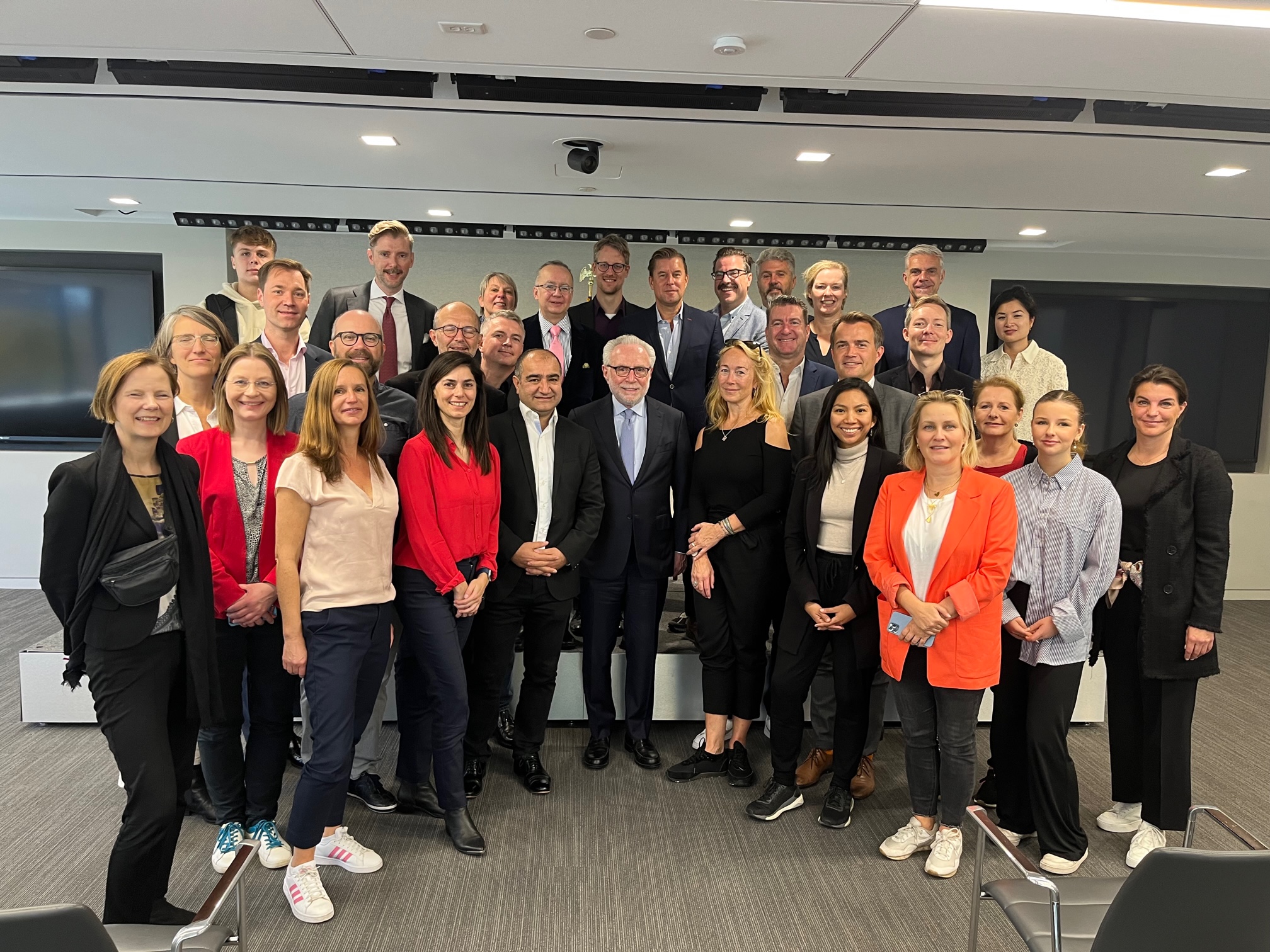 journalists from alumni chapters across Germany got the chance to learn more in depth about the issues in the election that will shape U.S. policies and politics for at least the next two years. It was the second alumni program for German journalists to the USA after a one-week alumni program to New York in 2021 while American alumni groups have had large programs of about 30 journalists t
journalists from alumni chapters across Germany got the chance to learn more in depth about the issues in the election that will shape U.S. policies and politics for at least the next two years. It was the second alumni program for German journalists to the USA after a one-week alumni program to New York in 2021 while American alumni groups have had large programs of about 30 journalists t 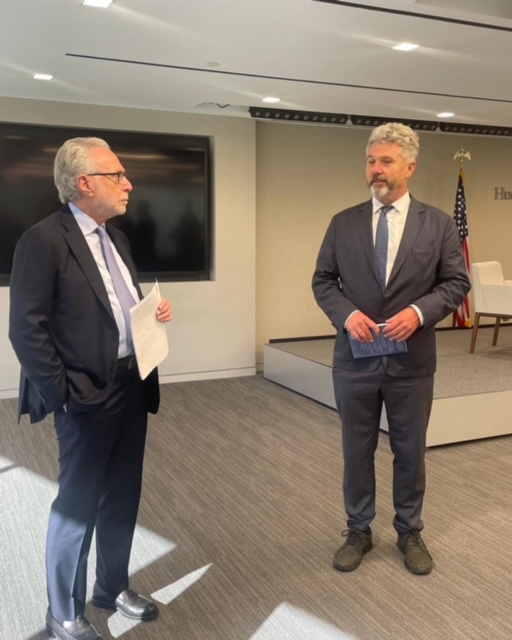 Berlin in 2019 that coincided with the 30th anniversary of the fall of the Berlin Wall and in 2021 to follow the German parliamentary elections. There are 1,900 journalists in the USA and Germany who have take part in regular two- or three-week programs over the last 30 years and the alumni programs are shorter one-week programs designed help keep the spirit of RIAS alive and encourage participants to remain active members of the RIAS alumni network
Berlin in 2019 that coincided with the 30th anniversary of the fall of the Berlin Wall and in 2021 to follow the German parliamentary elections. There are 1,900 journalists in the USA and Germany who have take part in regular two- or three-week programs over the last 30 years and the alumni programs are shorter one-week programs designed help keep the spirit of RIAS alive and encourage participants to remain active members of the RIAS alumni network
The alumni program to the USA got off to a flying start with talks at Pew Research showing what a large impact that religion plays on politics in the USA, a visit to WAMU radio and talk with morning host and RIAS alumni Esther Ciammachilli, an in-depth talk about the US midterms with Julius van de Laar, a talk at Deutsche Welle TV with Ines Pohl and her team, and a talk with Reuters White House correspondent Jeff Mason
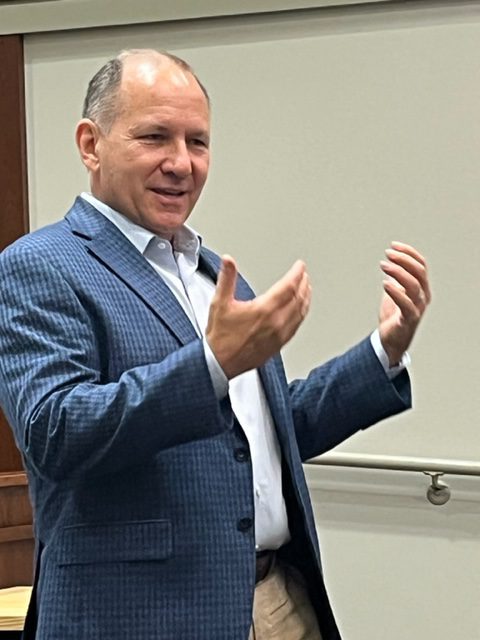
On Tuesday the 42 German journalists travelled three hours north to southern Pennsylvania for an hour-long talk with Republican Congressman Lloyd Smucker, who explained why the second amendment and gun ownership is so important to voters in his district and how his district has shifted over the last 20 years from leaning Democrat to safely Republican in part because the union workers in the area have shifted in the same direction. The Germans also had the chance to learn more about the Amish settlers in the region thanks to talks with Don Kraybill, Steve M. Nolt and Ben Riehl. The excursion to Pennsylvania was planned and organized by RIAS alumni Tyler Speicher.
On Wednesday the group met Brookings expert on Congress Molly Reynolds, Der Spiegel correspondent Roland Nelles, and Hudson Institute senior fellow Peter Rough. They also got the chance to take part in a university journalism class led by Brandon Benavides, an NBC producer.
On Thursday, guest speakers included Emily Gold and Sarah Blackwell of NBC News and Meet the Press, Gudrun Engel of ARD and Elmar Thevessen of ZDF television. The Germans also had two highlights — a talk by CNN anchor Wolf Blitzer about his film on the Holocaust memorial in Germany “Never Again” and a visit to the White House press room and watching President Joe Biden’s helicopter departure. Biden also stopped by briefly to talk to a few journalists covering his departure who were standing just in front of the RIAS journalists.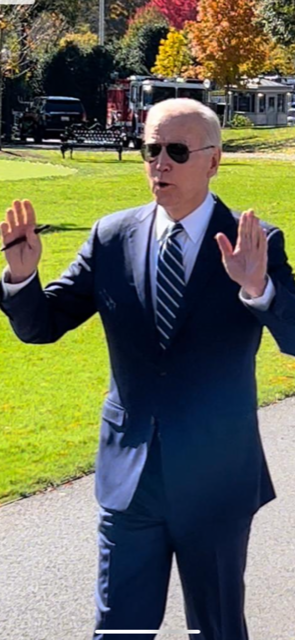
Friday’s highlights include a visit to the German embassy, a talk at NPR with Scott Neuman and Domnico Montanaro, a talk with WNBC news anchor Michael Gargiulo and a talk on immigration with Diego Sanchez, director of policy and strategy at the president’s alliance on higher education and immigration.
Here is a list of the participants: Charlotte Maihoff, Thielko Griess, Martin Richter, Nadine Gries, Gesine Dornblüth, Daniel Pokraka, Bartosz Dudek, Zlatin Nikov, Björn Heckmann, Michael Kolz, Pia Bierschbach, Iris Ollech, Sven Trösch, Susan Kalmbach, Charlotte Voss, Nina Lammers, Wiebke Keuneke, Andreas Franz, Annette Yang, Dilek Üsük, Kristian Wiegand, Arndt Brorsen, Janelle Dumalaon, Jutta Mueller, Sylvia Warnke, Mirja Fiedler, Julius van de Laar, Gabriele von Moltke, Petra Gute, Gesa Eberl, Catherine Martens, Nadja Kriewald, Isabelle Koerner, Dominik Lauck, Gabriel Fröhlke, Philipp Jahn, Özcan Mutlu, Vladimir Balzer, Gregor Schmalzried.
October 22, 2022
Journalists from Germany get glimpse of USA on RIAS fellowship
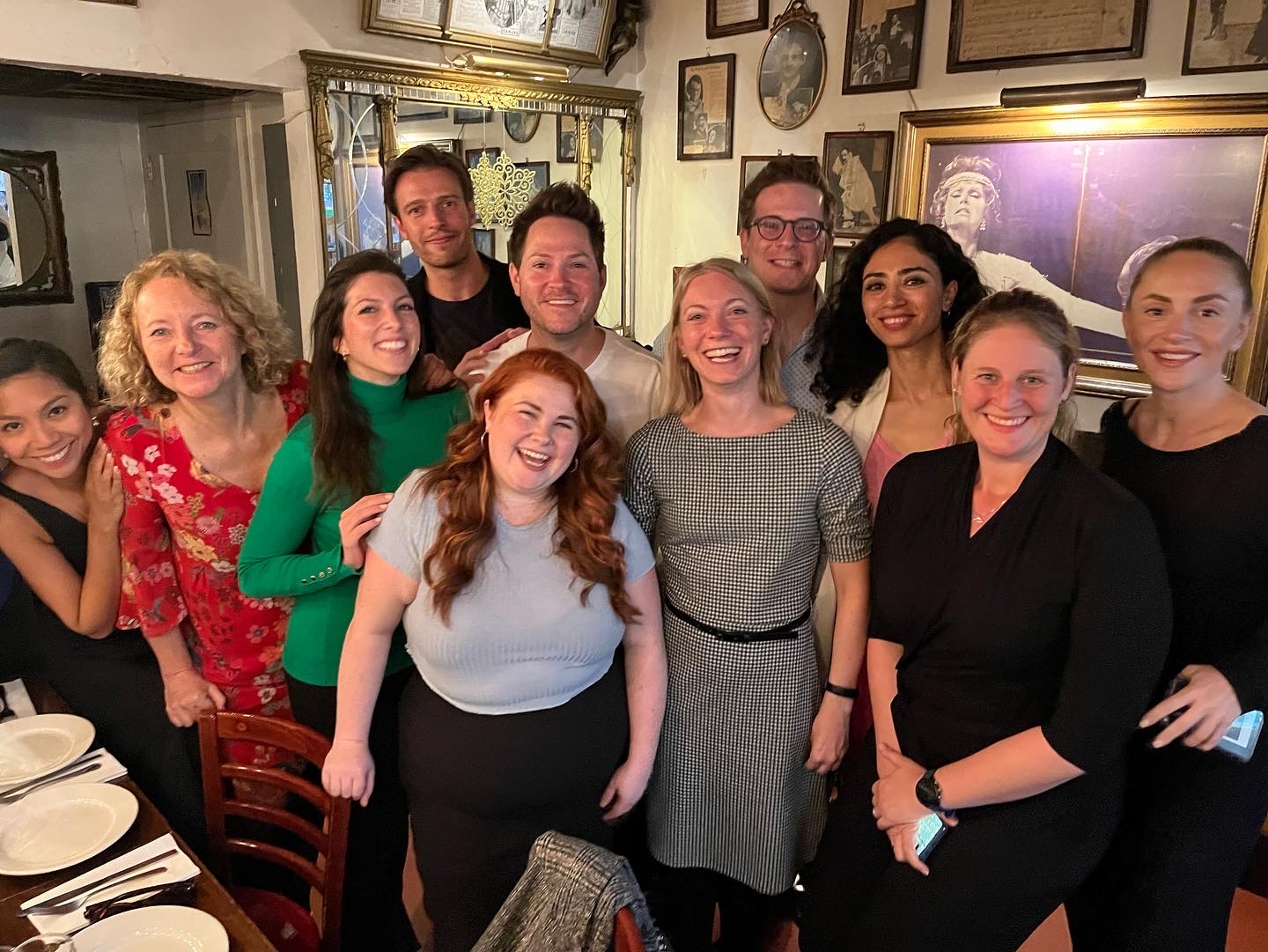
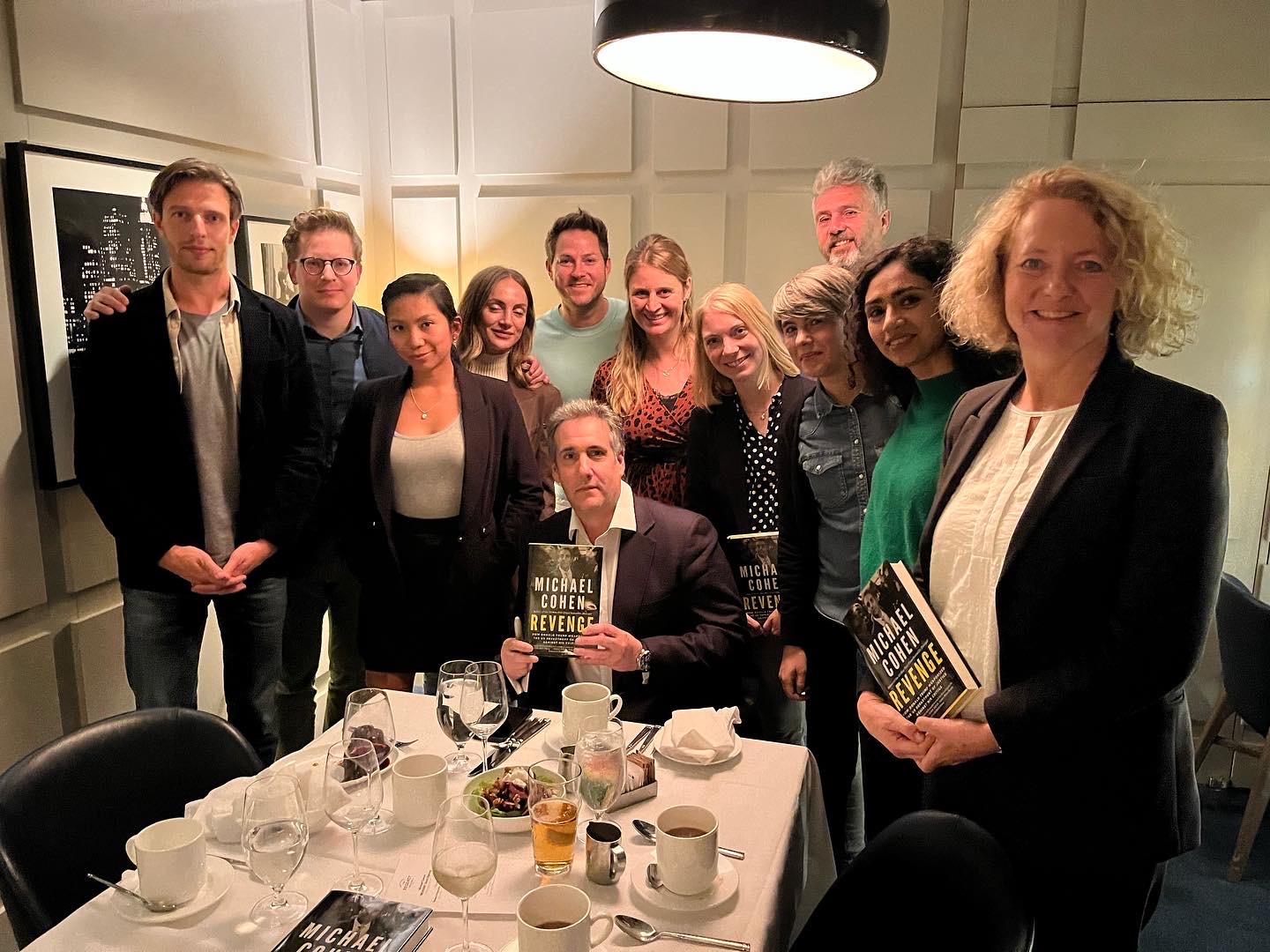
From Washington DC to New York as a group and then on individual journeys to 10 smaller TV and radio markets across the Midwest, South, and far West — a group of 11 mid-career journalists from Germany spent three weeks learning more about politics, media, business, culture and life in the United States in October. The journalists from public and commercial TV and radio stations across Germany and from six different ethnic backgrounds had the chance to take a deep dive into the United States with up to five meetings per day with journalists, politicians, think tank policy experts, Jewish community leaders, Broadway musical stars, a 9/11 survivor and first rescuer and even Donald Trump’s former personal attorney Michael Cohen.
They had an eye-opening experience learning more about the polarized state of politics in the United States, meeting with voices from both conservative and progressive sides of the spectrum in Washington and New York. They also had the chance to get a birds-eye perspective during their third and final week at “station weeks” across the United States — Milwaukee, Detroit, Chicago, San Antonio, Atlanta, Boston, Sioux Falls South Dakota, Salt Lake City, Tyler Texas, Bend Oregon.
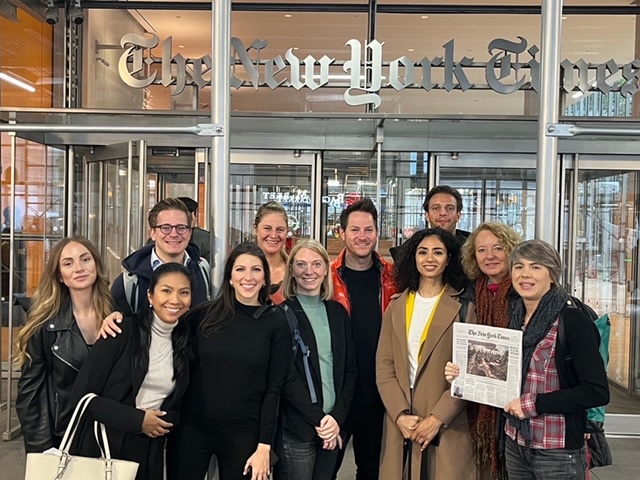
There at their stations the Germans met local politicians, local journalists, local farmers and local people to learn more about the issues and problems facing Americans far away from the East Coast. They had the chance to learn more about how American journalists do their jobs by watching over their shoulders during their shifts or going out on assignments with their American hosts. Some had the chance to go on air on their local radio and TV stations to talk about issues in Germany for the American audiences. Some also got a chance to drive to the US-Mexico border and south of the border with their US hosts to learn more about the migration issue that is becoming more and more of a political hot potato in the United States.
The RIAS Berlin Commission runs two such programs to the United States each year with about 10 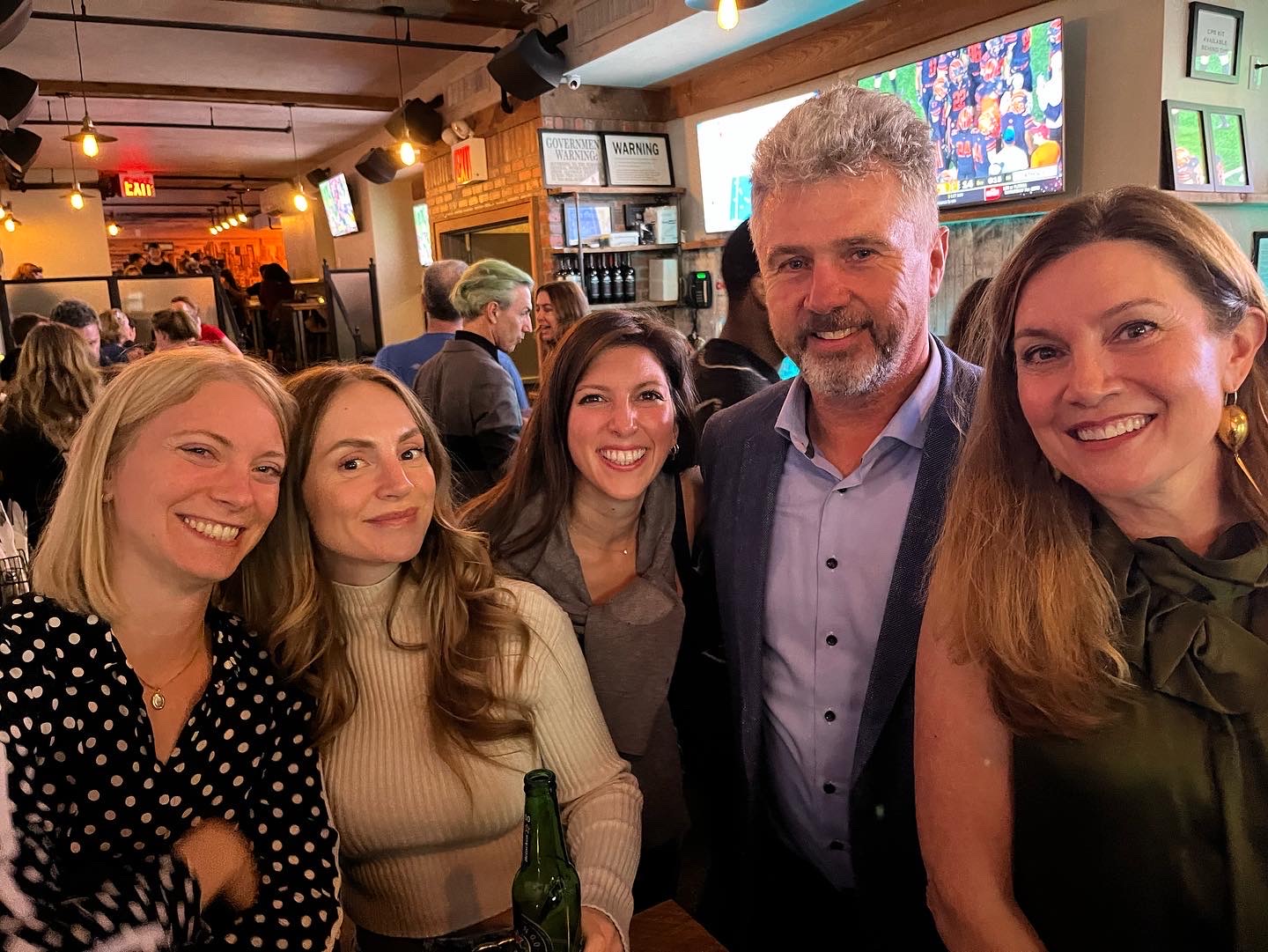 German journalists and two similar programs to Germany and Brussels each year with about 10 American journalists. Beyond that, there is one program each March for 15 German students to the USA and one program each June for 15 American students to Germany. Also, RIAS operates two alumni programs each year for up to 30 RIAS alumni in each other’s respective countries. Please write to info@riasberlin.org for more information.
German journalists and two similar programs to Germany and Brussels each year with about 10 American journalists. Beyond that, there is one program each March for 15 German students to the USA and one program each June for 15 American students to Germany. Also, RIAS operates two alumni programs each year for up to 30 RIAS alumni in each other’s respective countries. Please write to info@riasberlin.org for more information.
October 11, 2022
RIAS journalists from Germany meet American counterparts
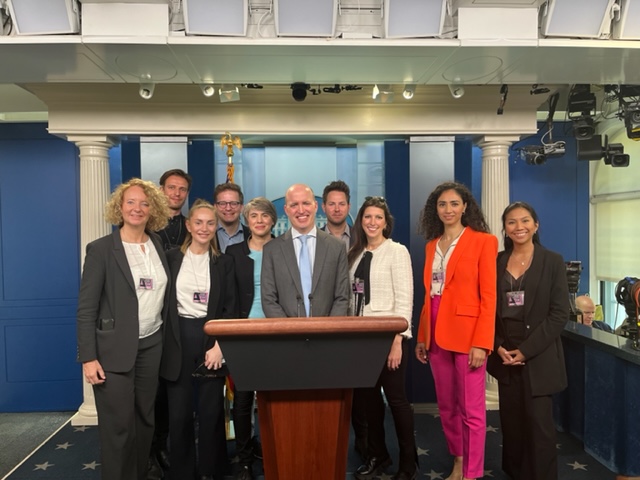
German journalists on a three-week fellowship to the United States had the chance to meet many of their American counterparts in Washington DC as well as some German foreign correspondents based in the United States during the first five days of their journey to the the USA.
The 11 German radio and TV reporters from across the country talk with Reuters correspondent Jeff Mason at the White House and be part of the press corps for about half an hour that watched President Joe Biden jog over to the Marine One helicopter waiting on the South Lawn before it lifted off. They also learned a lot about the upcoming Midterm elections on November 8 in talks with former Republican Congressman Charlie Dent (R-Penn) and Hudson Institute senior fellow Peter Rough.
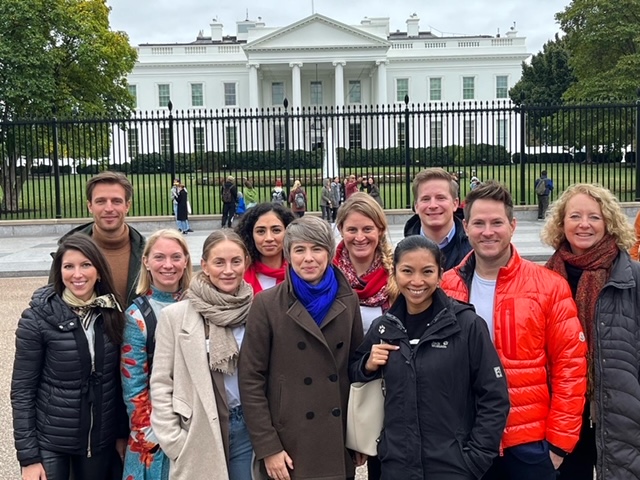 During their busy Washington program with four to five appointments each day, the Germans also learned more about the larger role that religion plays on politics in the United States at Pew Research, about the success of video journalism at the Washington Post during a talk with executive editor for original video David Bruns, and about American TV journalism in talks with WUSA9 anchor Larry Miller and reporter Matt Gregory as well as a visit to NPR headquarters.
During their busy Washington program with four to five appointments each day, the Germans also learned more about the larger role that religion plays on politics in the United States at Pew Research, about the success of video journalism at the Washington Post during a talk with executive editor for original video David Bruns, and about American TV journalism in talks with WUSA9 anchor Larry Miller and reporter Matt Gregory as well as a visit to NPR headquarters.
The German reporters also got to learn about how German journalists report on the USA in talks with ZDF bureau chief Elmar Thevessen, ARD chief 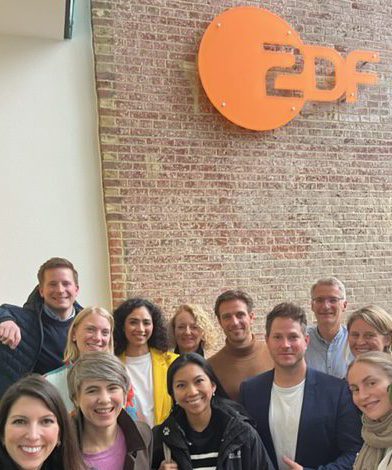 correspondent Gudrun Engel, Deutsche Welle journalists Ines Pohl, Carolina Chimoy and Mikaela Kuefner, Der Spiegel correspondents Roland Nelles and Rene Pfizer as well as Christopher Wittich from NTV/RTL. They has met a dozen American RIAS alumni at a lively get-together at the Admiral restaurant.
correspondent Gudrun Engel, Deutsche Welle journalists Ines Pohl, Carolina Chimoy and Mikaela Kuefner, Der Spiegel correspondents Roland Nelles and Rene Pfizer as well as Christopher Wittich from NTV/RTL. They has met a dozen American RIAS alumni at a lively get-together at the Admiral restaurant.
The Germans then traveled to New York for the second of three weeks before fanning out across the country for the final week to take part in individual station week stops in Detroit, Chicago, Atlanta, Milwaukee, San Antonio, Salt Lake City, Bend OR, Tyler TX and Sioux Falls SD.
October 3, 2022
11 German journalists start three-week RIAS fall program fellowship to the USA
A group of 11 broadcast journalists from Germany started their three-week RIAS Berlin Commission fellowship to the United States on October 3 in Washington DC. After week in the capital city meeting American and German journalists, American politicians, analysts at leading think tanks and research institutes, the group will travel to New York City for another week of meetings there.
They will spend the third week on their own 10 different stations across the United States, looking over the shoulder of American RIAS alumni in Chicago, Detroit, Milwaukee, San Antonio, Atlanta, Salt Lake City, Boston, Bend OR, Sioux Falls SD and Tyler TX. The Germans will also meet with American alumni at mixers in Washington DC on October 7 as well as in New York on October 12 and October 14. Here is more information on the German participants:
Damla Hekimoglu, ARD Tagesschau 24, Hamburg
Damla Hekimoglu is an anchorwoman for Germany’s leading news program Tagesschau and tagesschau24 at German public broadcaster ARD. With 22,000 employees, ARD is one of the world’s largest broadcast organizations and Germany’s market leader in news. She also working as an investigative reporter for the WDR network in Cologne. A native of the Rhineland, she has also worked for PHOENIX and BBC World News. She will be doing her station week at WGN TV in Chicago, Illinois.
Etienne Bell, NTV, Cologne
Etienne Bell has been an anchor and reporter for the all-news commercialNTV news network since 2014. A native Rhinelander, Bell also anchors NTV’s “Startup Magazin”. He has anchored a weekly business podcast “Brichta&Bell – Business Simple and Fast” since 2019. Bell also anchors for various multi-platform offers by NTV, such as the Alexa Skill for Amazon Echo. Bell studied “Media Communication and Journalism”. He has been working in journalism since 2006 and also has experience working for commercial and public radio broadcasting.
Nadja Bobrova, ARD Morgenmagazin, Cologne
Nadja Bobrova is a senior editor for the German public broadcaster ARD. She works for the daily morning show, called “ARD MorgenMagazin”. Bobrova has Russian roots as she was born in Moscow and speaks three languages fluently: Russian, German and English. She has been focusing especially on assisting ARD’s coverage of the war in Ukraine and the situation in Russia. She has also worked in the past for German newspapers, such as the Westfälische Rundschau, as well as for commercial networks NTV and RTL. Bobrova also studied abroad in St. Petersburg, Russia in 2013/14. She will be doing her station week at WBUR radio in Boston, Massachusetts.
Janelle Dumalaon, Deutsche Welle, Berlin
Janelle Dumalaon is an anchor, producer and reporter for Deutsche Welle, Germany’s international broadcasting company. She was born in Manila and came to Berlin in 2009. As the creator and lead producer of DW News’ explainer series “Business Beyond”, Dumalaon is especially interested in the events that shape the global economy. She can be found tweeting under @janelledumalaon on business, geopolitics, Germany, and the Philippines. She will be doing her station week at KFSY TV in Sioux Falls, South Dakota.
 Najima El Moussaoui, freelance journalist, Cologne
Najima El Moussaoui, freelance journalist, Cologne
Najima El Moussaoui is a TV journalist and a freelance anchor. She has also worked as an editor for the news at NTV commercial all-news network, Deutsche Welle (DW) and has been working most recently for the WDR network in Cologne. She was born in Morocco and came to West Germany as a child. She speaks German, English, Spanish, French and Berber. As an author and director, she worked on the documentary film “Islam goes to school” (WDR/ARD). She is a former board member of Germany’s biggest association of media professionals with foreign roots. She will be doing her station week at KABB in San Antonio, Texas.
Tom Garus, RBB, Berlin
Tom Garus is a reporter for the German public broadcaster ARD. He also anchors a TV show (about consumer topics) on RBB, which is the Berlin-Brandenburg local station in the ARD network. Born in east Berlin, Garus is interested in social policy, digitalization and history. Garus will be doing his station week at KLTV in Tyler, Texas
 Kristin Becker, ARD, Berlin
Kristin Becker, ARD, Berlin
Kristin Becker covers political news for the ARD network’s capital city offices in Berlin and reports reports for Germany’s leading news program, Tagesschau. She is also the anchor of the award-winning Tagesschau- Zukunftspodcast “mal angenommen” (“just assuming”) that discusses scenarios and consequences of political ideas in the future – like what happens if there were only electric cars on the road or if the EU had its own armed forces. In the past, she has worked abroad for the foreign and was a member of foreign desk and was a member of the fact-checking team at Tagesschau. She will be doing her station week at KSL in Salt Lake City, Utah.
Jutta Krug, WDR, Cologne
Krug started her journalism career as part of the founding team of the German-French Cultural Channel ARTE, based in Strasbourg. During her studies at Munich University and the German Journalism School, she was able to get an internship working on Capitol Hill in the offices of Congressman John Lewis. She works as a senior editor at WDR now and commissions documentary projects for the public broadcasting network. Some of the titles she has commissioned include “THE CLEANERS” on social media, “THE FORTH ESTATE” on Trump versus the NY Times and “WE ARE ALL DETROIT”. She is looking forward to her station week at WXYZ TV in Detroit.
 Mareike Makosch, Radio Regenbogen, Mannheim
Mareike Makosch, Radio Regenbogen, Mannheim
Mareike Makosch is the head of news division at German commercial radio stations Radio Regenbogen and Regenbogen 2 in Mannheim. She is the morning show news anchor for Radio Regenbogen. Makosch, who tries to incorporate as much news about the United States as possible into her broadcasts, holds a master’s degree in psychology and specializes in national and international politics. She will be doing her station week at KTVZ TV in Bend, Oregon.
Marcel Wagner, NTV, Cologne
Marcel Wagner is a news anchor at NTV, the all-news channel of RTL News, Germany’s largest commercial network. He also works as a radio and TV anchor for ARD. As a helicopter pilot, Wagner is an expert in aviation, and also covers sports and business topics. He will be doing his station week at CNN in Atlanta, Georgia.
 Annika Witzel, WDR, Deutschlandfunk radio, Cologne
Annika Witzel, WDR, Deutschlandfunk radio, Cologne
Annika Witzel is a freelance radio reporter and editor based in Cologne. She mainly works for the German public broadcasting companies WDR and Deutschlandfunk. Annika works for several WDR radio stations, especially for daily news programs, including 1LIVE, a station focused on young audiences. She also works for the WDR science programs “Quarks”, where she takes on scientific topics and breaks them down into easy-to- understand content. At Deutschlandfunk she is part of the team in charge of the prime time morning show. Annika is especially interested in international relations, pop culture and Social Media Trends and in breaking down all the information in snackable pieces for radio stations and online accounts. She will be doing her station week at PBS in Milwaukee, Wisconsin.
September 17, 2022
RIAS fall program to Europe concludes after 12 days
Ten American journalists completed a 12-day whirlwind trip of four cities in Germany and Brussels on September 17 with two days of meetings in Brussels. The journalists had a total of 41 meetings in Berlin, Hamburg, Cologne and Brussels, learning more about politics, media, culture and life in Germany and in the European capital. They had the chance to talk with German and American foreign correspondents working in Germany and Brussels as well as visit important news organizations such as Deutsche Welle, ARD television, WDR television, WeltTV, Deutschlandfunk radio, Deutschlandradio, NTV, RTL and Der Spiegel.
The Americans also had the chance to meet with American diplomats in Berlin, Hamburg and Brussels as well as talk to senior NATO and EU officials in Brussels. They also had the chance to get a taste of cultural aspects of Germany in meetings with artist Kani Alavi at the East Side Gallery in Berlin and band leader Andrej Hermlin and his American swing dance band.
For several members of the group on their first trip abroad, it was an especially eye-opening experience to learn more about Germany’s history, its efforts to come to terms with its history, and its work as a force for good in Europe and beyond. The members of the group included: Ayan Mittra, The Texas Tribune, Austin, Texas; Anjuli Sastry Krbechek, NPR, Los Angeles; Brittany Silverstein, ABC7, Los Angeles; Deon Osborne, The Black Wall Street Times, Tulsa, Oklahoma; Thomas Demane, CNN International, Atlanta, Georgia; Suzie Herman, KSDK, St. Louis, Missouri; Erika Angulo, NBC News, New York; Ward Colin, Kennesaw State University, Kennesaw, Georgia; Katherine Watkins, Houston Public Media, Houston, Texas; Steph Whiteside, WSIU, Carbondale, Illinois.
September 16, 2022
RTDNA chair-elect Worsley visits RIAS stand at RTDNA convention
Sheryl Worsley, who is running as chair-elect of the RTNDA board, stopped by the RIAS Berlin Commission stand on Friday at the RTNDA convention in Indianapolis. Worsley (left), who is also a RIAS alumni from June 2022, met with RIAS board member Michael Gargiulo (right) and US coordinator Pam Ortega (center) at the convention to talk about the German-American exchange program and her election campaign.

Gargiulo and Ortega have been meeting broadcast journalists and journalism students attending the annual convention and talking about upcoming RIAS programs in 2023 and beyond. RIAS is tentatively planning eight programs in 2023 – four in Germany for American journalists and students and four in the United Stats for German journalists and students.
Please keep our 2023 Alumni Program in mind and on your calendar. It will be in late September 2023 with 4 days in a Munich and 3 in Cologne. RIAS pays hotel costs and several lunches/dinners while up to 30 American alumni are welcome to attend and only need to pay for their own air travel costs.
September 14, 2022
RIAS alumni Worsley running for RTNDA Chair-Elect
Sheryl Worsley is running for the position of Chair-Elect of the Radio Television Digital News Association (RTDNA board), which calls itself the world’s largest professional organization for broadcast and digital journalism. It is also RIAS’s partner (www.rtdna.org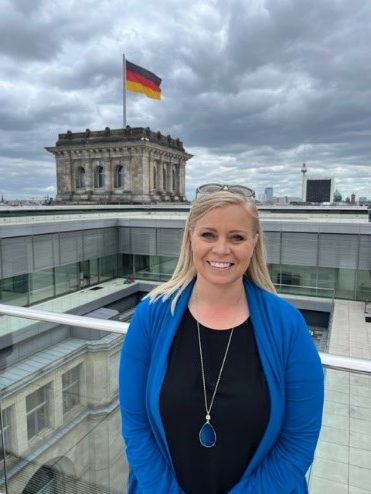 ) in the United States and has been an important avenue for American fellows to take part in RIAS programs to Europe over the years.
) in the United States and has been an important avenue for American fellows to take part in RIAS programs to Europe over the years.
Worsley, Vice President of Podcasting at KSL in Utah, was the News Director at KSL Newsradio for 15 years before moving to an all digital role as Director of Audience development in 2018. She has been a board member of RTNDA for the last 12 years.
The RTDNA elections run to September 16. Here is more information about the candidates. The RIAS Berlin Commission caught up with Worsley to ask her about her candidacy and the role that RIAS plays in RTNDA:
Why do you want to become the RTDNA chair-elect?
RTDNA does so much for journalists and for the news reporting industry. An opportunity to serve as chair is one I will not pass up. I have served on the RTDNA board for 12 years, and the organization has come to my aid fighting open records battles and attacks on the First Amendment in my state and region many times. This is my opportunity to volunteer and give back.
What does the RTDNA chair do?
The chair works in cooperation with the full board and RTDNA staff to ensure journalism is strong. The three pillars of what we do is to First, provide training- a great opportunity for learning and networking is happening this week at our convention, RTDNA22 in Indianapolis. Secondly, RTDNA recognizes, supports and honors excellence in responsible journalism. The National Edward R. Murrow awards are a meaningful and sought-after honor by journalists and take place next month in New York. Lastly, RTDNA protects against erosion of the First Amendment and fights for open records and government transparency. This is done on the local and national levels.
What are the challenges facing RTDNA?
Reporters and photojournalists face the crucial challenge of broadcasting and publishing truth in a growing sea of misinformation. We’re doing it while politicians and a segment of our viewers, listeners and readers attack our credibility. Many reporters and staffers put their job first, even when the safety risks increase while covering protests, counter-protests or covering the economic ravages and physical devastation of war and a post-COVID reality. Our constitutionally protected duty to inform the public and documenting truth in our communities has never mattered more. I’d like to be a part of keeping journalism strong.
What do you bring to the table? What do you think you could do better or to improve it?
I bring a willingness to innovate and look at challenges with a critical and problem-solving eye. RTDNA is a great organization and we respond quickly, but I think there are ways for the organization to be more nimble and change in ways that help newsrooms which have also changed with the audience and market demands of our time. One of the things I love about RTDNA is the networking and support I get from my association with news leaders and journalists all over the country. I’d like to see more of these opportunities.
You have been the Region 3 director on the RTDNA board for 12 years. Where exactly is Region 3? What have you learned from that experience?
Region 3 encompasses 5 states in the intermountain west in the U.S.- Arizona, Colorado, Wyoming, Utah and New Mexico. In the twelve years of serving this region I have learned that if we want journalism protected, we must we willing to invest personally in the fight. I worked with the Utah courts and the state media coalition to make sure cameras were allowed in courtrooms. I have testified personally multiple times before our state legislature in support of proposed laws friendly to open records and the first amendment and against those which are not. I have asked RTDNA to enter similar battles in other states in our region and RTDNA has answered the call every time.
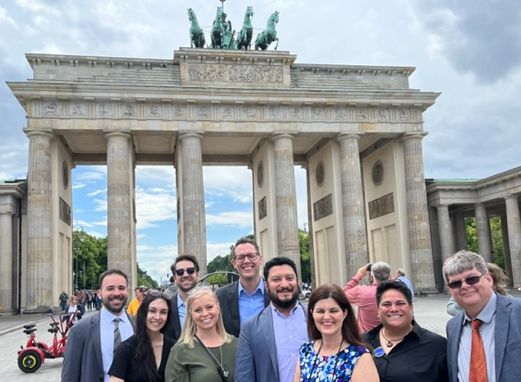 As someone (fourth from left) who has been on the RIAS program, how important is the RIAS fellowship for RTDNA?
As someone (fourth from left) who has been on the RIAS program, how important is the RIAS fellowship for RTDNA?
The RIAS fellowship is a wonderful opportunity for journalists in both America and Germany to widen their horizons and learn. I personally enjoyed seeing the EU, NATO and learning more about the geo-political forces operating in Europe. These are things that you can learn by scholarship and study, but not in as concrete a way as seeing things first-hand. I am grateful RIAS operated in post WWII, allowing for the free-flow of information to a repressed population. In that spirit, journalists in both the U.S. and Germany are publishing to their audiences with the goal of access to good information for as wide an audience as possible.
I also enjoyed the association with German reporters and the U.S journalists on my trip will carry these wonderful new relationships the rest of my life.
Do you think International exchanges like this are beneficial to US journalists?
Absolutely. Fellowships like RIAS are a way for journalists to not only learn from the ideas of wonderful hosts like the German journalists, but it’s a rare opportunity to self-reflect about their own work. A chance for the journalist to examine what they are doing and what they may be missing or could add. The exchange of ideas and possibilities is invaluable.
You have been working as a journalist for about 20 years. Has that experience helped prepare you for the chair-elect?
I was a news director for 15+ years in a radio newsroom. The leadership opportunities and lessons learned while doing that work I believe have prepared me for this opportunity, should the membership elect me. I’ve also learned some incredible life-lessons and worked with some amazing people. It’s a great thing to watch as people sacrifice their time, skill and talent in the service of informing their community.
September 10, 2022
RIAS fellows spend busy week in Berlin on fall exchange program
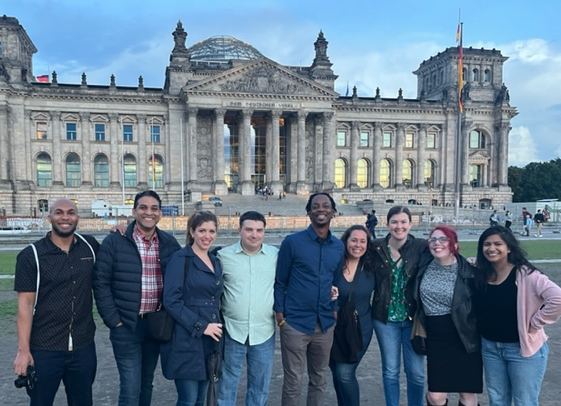
On an exchange program to learn more about Germany, the European Union and NATO, a group of 10 American journalists from across the United States spent a whirlwind week in Berlin during the first half of their two-week RIAS Berlin Commission fellowship. The journalists from TV and radio stations as well as academia from across the United States but especially from outlets in the Midwest and South had up to five meetings per day with German journalists, politicians, political analysts, artists, think tank experts, Ukrainian refugees and immigrants to Western Europe’s largest country.
They had the chance to ride along the Berlin Wall bike trail through the heart of the city that was divided by the Cold War, talked to NPR Berlin correspondent Rob Schmitz and tour the Reichstag parliament building as well as watched its spectacular multimedia light show beamed on parliament buildings across the Spree River.
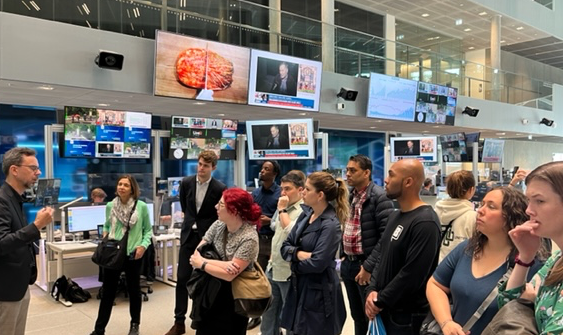 They also met German journalists Jan Philipp Burgard, Vladimir Balzer, Marcus Pindur, Erkan Arikan, Michael Kolz and Deutsche Welle Director General Peter Limbourg along with Canadian anchor Terry Martin. The Americans, many of whom were one their first trip outside the United States, also had the chance to visit the US Embassy near the Brandeburg Gate for illuminating high-level meetings and the Stasi memorial prison in east Berlin where political prisoners were kept during the dark days of the Cold War.
They also met German journalists Jan Philipp Burgard, Vladimir Balzer, Marcus Pindur, Erkan Arikan, Michael Kolz and Deutsche Welle Director General Peter Limbourg along with Canadian anchor Terry Martin. The Americans, many of whom were one their first trip outside the United States, also had the chance to visit the US Embassy near the Brandeburg Gate for illuminating high-level meetings and the Stasi memorial prison in east Berlin where political prisoners were kept during the dark days of the Cold War.
Also talking with the Americans were German-Iranian artist Kani Alavi, who talked about the history of the East Side Gallery open air art exhibit along a mile-long stretch of the Berlin Wall.
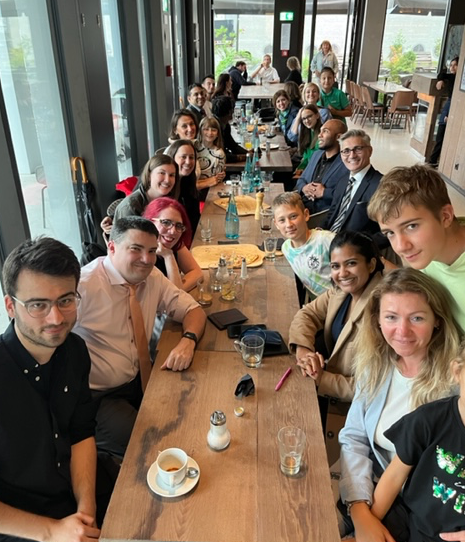 They also visited Potsdam in formerly Communist East Germany as well as the Sachsenhausen concentration camp before listening to a American Swing Dance band led by Andrej Hermlin. The group will be traveling to Hamburg on Sunday for more meetings with German journalists, to Cologne on Tuesday and finishing their journey with three days in Brussels and meetings with EU and NATO officials on Thursday and Friday.
They also visited Potsdam in formerly Communist East Germany as well as the Sachsenhausen concentration camp before listening to a American Swing Dance band led by Andrej Hermlin. The group will be traveling to Hamburg on Sunday for more meetings with German journalists, to Cologne on Tuesday and finishing their journey with three days in Brussels and meetings with EU and NATO officials on Thursday and Friday.
August 24, 2022
10 American journalists headed to Europe for two-week RIAS fellowship
A group of 10 American journalists from across the United States will take part in the September 4-17 RIAS Berlin Commission fellowship. The mid-career American journalists will spend the two weeks in four cities — Berlin, Hamburg, Cologne and Brussels — and learn more about journalism, politics, security and cultural issues in Germany and the European Union during the fast-faced fellowship.
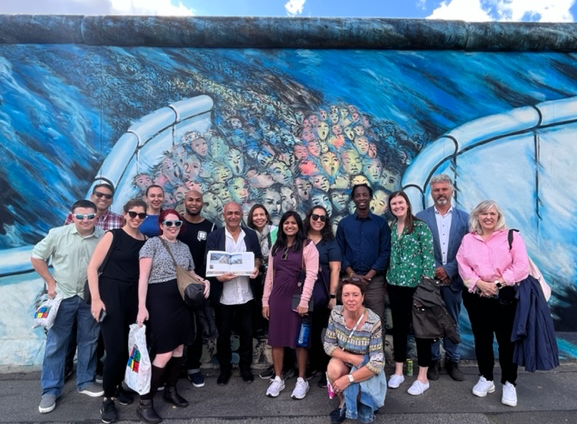 In Berlin they will meet leading German journalists, American correspondents working in Germany, news organization managers, diplomats, politicians, political activists, artists, musicians as well as refugees and immigrants from Ukraine and Palestine. In Hamburg, the Americans will meet diplomats, journalists and learn more about the city’s famous harbor and Reeperbahn district where the Beatles got their start in the early 1960s. In Cologne, the Americans will meet German broadcast journalists in the country’s most important TV capital city and in Brussels they will meet NATO officials, European Union officials as well as American correspondents working in the EU capital city.
In Berlin they will meet leading German journalists, American correspondents working in Germany, news organization managers, diplomats, politicians, political activists, artists, musicians as well as refugees and immigrants from Ukraine and Palestine. In Hamburg, the Americans will meet diplomats, journalists and learn more about the city’s famous harbor and Reeperbahn district where the Beatles got their start in the early 1960s. In Cologne, the Americans will meet German broadcast journalists in the country’s most important TV capital city and in Brussels they will meet NATO officials, European Union officials as well as American correspondents working in the EU capital city.
The RIAS Berlin Commission was created in 1992 to keep alive the spirit of the legendary Cold War-era broadcasting company known as “Radio in American Sector” that beamed news, information and music into Communist East Germany as well as to listeners in West Berlin. From 1988 to 1992 RIAS was also a popular TV station. After RIAS went off the air in 1992, the United States and German governments created a binational organization called RIAS Berlin Commission to promote exchanges in broadcast journalism between the two countries.
Here is a list of the participants in the September fellowship:
Ayan Mittra is senior managing editor at The Texas Tribune, where he has worked for 10 years. He helps oversee the Tribune’s enterprise coverage and many Tribune projects. He oversees the newsroom’s expansion into various parts of the state. He is a leader in the newsroom’s collaborations with business colleagues and media partners. Before joining the Tribune, Mittra worked more than 10 years at The Dallas Morning News.
Anjuli Sastry Krbechek, NPR, Los Angeles
Anjuli Sastry Krbechek is an award-winning podcast and radio producer. She is a senior producer at LAist Studios, the podcasting arm of NPR member station KPCC in Los Angeles, California. She is the creator, producer and host behind Where We Come From, an audio and video series telling stories by and for immigrant communities of color, which she created while on a Nieman Journalism Foundation Fellowship through Harvard University.
.
Brittany Silverstein, ABC7, Los Angeles
Brittany Silverstein is an Emmy award-winning journalist based in California. She works as a producer at ABC7 Los Angeles and has more than a decade of experience working in local TV newsrooms across the United States. Silverstein hopes to gain a broader perspective on Germany and Europe on the RIAS Berlin Commission program so she can bring that knowledge back to her newsroom.
Deon Osborne, The Black Wall Street Times, Tulsa, Oklahoma
Thomas Demane, CNN International, Atlanta, Georgia
Thomas Demane is a newscast producer for CNN International, based at CNN World Headquarters
in Atlanta, Georgia. He manages and produces a number of international and domestic newscasts for CNN. Demane is a specialist in global news events, news producing, news gathering and oversees a team of news writers and editors.
Suzie Herman, KSDK, St. Louis, Missouri
Suzie Herman is a senior producer at KSDK in St. Louis, MO.
Erika Angulo, NBC News, New York
Erika Angulo is a journalist and a coordinating producer for NBC News. She oversees logistics and editorial content in the field. She spent three months recently covering the war in Ukraine. She reported on survivors and the determination of soldiers fighting Russian troops across Ukraine. She has won national awards, including an Edward R. Murrow for breaking news coverage of the Ft. Lauderdale mass shooting in 2017 and two Emmys for her investigative
stories on cartel drug trafficking at the U.S.-Mexico border.
Ward Colin, Kennesaw State University, Kennesaw, Georgia
Ward Colin is an Adjunct Professor and Coordinator of Student Media at Kennesaw State University. He has a Bachelor’s in Mass Communication from Dillard University and a Master’s of Mass Communication from Louisiana State University. Previously he worked at radio and television stations in Louisiana. Colin enjoys mentoring journalism students and looks forward to helping diversify the journalism field.
Katherine Watkins, Houston Public Media, Houston, Texas
Katie Watkins is the environmental reporter for Houston Public Media, the NPR member station in
Houston, Texas. Her work on environmental and energy issues in Texas has appeared on NPR, Marketplace, & Here & Now. She also produced the award-winning podcast Fire Triangle, which looked at chemical disasters in the state. She has a decade of experience working in multimedia newsrooms in Chile, the US, and London.
Steph Whiteside, WSIU, Carbondale, Illinois
Steph Whiteside is a reporter with WSIU public radio and Side Effects Public Media. Previously, she worked for Al Jazeera. Her areas of interest include health, politics, and social issues.
July 13, 2022
Impressions of American Journalism Students on ERP Program
The RIAS Berlin Commission’s ERP Transatlantic program was created thanks a grant from the German Economy Ministry. It connects American journalism students with their peers in Germany. The program is supported by the Transatlantic Program of the Federal Republic of German andfunded by the European Recovery Program (ERP) of the Federal Economy and Energy (BMWi) Ministry. The American students came from universities across the Midwest, South and Southwest — Oklahoma, Arizona, New Mexico, Texas, Montana, Florida, Ohio, Wisconsin, Minnesota and Pennsylvania.
Here are some of the impressions from the 14 participants from the program.
Jesse Christopher Smith, University of Oklahoma (The Oklahoman): Spending three immersive weeks in Germany was a life-changing experience for which I will always be grateful. For someone like me who has never been able to afford to travel internationally, RIAS provided a once-in-a-lifetime opportunity to visit a unique place that will forever ripple with the aftershocks of history. Walking through spots along remnants of the Berlin Wall, the Hohenschönhausen Stasi prison and the Sachsenhausen concentration camp — morbid symbols and spaces of cruelty I’d only read about beforehand — suddenly made the harsh realities very real to me. Such painful history can be difficult to reckon with and move beyond, but Germany is trying to come to terms with the past. I noticed this tension between the past and present perhaps most acutely while listening to the personal stories of Syrian, Palestinian and Ukrainian refugees, whose lives have been upended by modern-day war but who have found in Germany a new place to call home. This is not the stereotypical Germany so many outsiders might only be familiar with through decades-old newsreels — it is a living, breathing, multi-faceted nation with vibrant cultures and proud peoples, not unlike the U.S. There is still progress to be made, but the effort is there, and it actually gives me hope that a similar effort for truth and reconciliation in America is still possible. I would like to play a part in that, in whatever ways I can as a journalist, and I would have RIAS and Berlin to thank for instilling this renewed confidence. Danke schön!
Mikaela Deleon, University of Oklahoma: Attending the RIAS Berlin Commission summer ERP program proved to be a once-in-a-lifetime opportunity. The program allowed me to submerge myself in the fractured yet robust history of the city of Berlin and Germany itself. Seeing the Berlin Wall, the Stasi prison in Berlin-Hohenschönhausen, and the Tempelhof Airport were borderline surreal experiences after reading and studying about these historical places for so long. Visiting these locations in person while hearing from contemporary witnesses created such a rich and educational environment and allowed me to feel genuinely connected to the past. RIAS helped me to ground myself in history with an experience that can likely never be replicated by myself. Learning about German media has also affected me deeply. The importance of our role as journalists has been reaffirmed for me yet again as I learned about RIAS’ role during the Cold War. Furthermore, seeing the difference between our media systems was also incredibly poignant for me. The part that public broadcasting plays in Germany was eye-opening, and something that I believe could be incredibly beneficial for the United States. One of my biggest hopes, when I embarked on this program, was that I would get to see beyond the American silo and that I would develop a deeper understanding of another culture. I think that hope was fully realized as we engaged with leaders in German politics, journalism, culture and arts. Peering at America from the outside and getting to understand the image of the United States from a different perspective was a necessary experience and one that I am deeply appreciative of. It has been a privilege to participate in this transatlantic exchange, and I hope to use my new cultural understanding to benefit myself and others as I continue to write as a journalist.
Oreoluwa Ojewuyi, University of Southern Illinois: As a recent graduate  from Southern Illinois University with a bachelors degree in political science and journalism, the RIAS program was perfectly curated to my professional interests. I jumped at the opportunity to have a cultural professional exchange that would build my repertoire as a journalist and diversify my worldview. The past two weeks in Germany forced me to contest with my own preconceived notions. The two weeks I spent in the RIAS program taught me the importance of globalization, historical recognition, empathy, and uplifted journalism as a key pillar of democracy. It was so interesting to see the key role RIAS played in German history from a German perspective. RIAS’ combination of history, politics media literacy challenged us to engage with viewpoints we were unfamiliar with. We were highly educated on American and German relations throughout history and the roles they played in the individual growth of both countries. Germany embraces all parts of its past regardless of how fraught it might be in order to work towards a better tomorrow. We spent time with people who lived through the Cold War, spoke with politicians who talked about the racism that still exists within German society, and met with Ukrainian refugees who shared their personal stories as they watch their country rage with war. Germany confronts its past head on. Its people uplift the stories of the past to work towards a better tomorrow. This kind of objectivity and acceptance of the truth is at the core of journalistic storytelling. Storytelling is a key component to connecting people around the world. Through every meeting with journalists, politicians and Ukrainian refugees we connected not only on a professional level but on a human level. No subject was off limits. RIAS has opened me up to an endless network and through this program I was able to leave Germany with a wealth of knowledge I did not previously arrive with.
from Southern Illinois University with a bachelors degree in political science and journalism, the RIAS program was perfectly curated to my professional interests. I jumped at the opportunity to have a cultural professional exchange that would build my repertoire as a journalist and diversify my worldview. The past two weeks in Germany forced me to contest with my own preconceived notions. The two weeks I spent in the RIAS program taught me the importance of globalization, historical recognition, empathy, and uplifted journalism as a key pillar of democracy. It was so interesting to see the key role RIAS played in German history from a German perspective. RIAS’ combination of history, politics media literacy challenged us to engage with viewpoints we were unfamiliar with. We were highly educated on American and German relations throughout history and the roles they played in the individual growth of both countries. Germany embraces all parts of its past regardless of how fraught it might be in order to work towards a better tomorrow. We spent time with people who lived through the Cold War, spoke with politicians who talked about the racism that still exists within German society, and met with Ukrainian refugees who shared their personal stories as they watch their country rage with war. Germany confronts its past head on. Its people uplift the stories of the past to work towards a better tomorrow. This kind of objectivity and acceptance of the truth is at the core of journalistic storytelling. Storytelling is a key component to connecting people around the world. Through every meeting with journalists, politicians and Ukrainian refugees we connected not only on a professional level but on a human level. No subject was off limits. RIAS has opened me up to an endless network and through this program I was able to leave Germany with a wealth of knowledge I did not previously arrive with.
Jason Stahl, University of Montana: The 2022 Student RIAS experience immersed me in the history and ambiance of Germany’s Cold War era and subsequent reunification. Among the books I read to prepare myself was Andrei Cherny’s “The Candy Bombers: The Untold Story of the Berlin Airlift and
 America’s Finest Hour”. I had a visceral reaction seeing this history come alive on the very first day of our program with the tour of Tempelhof Airport. I had a similar response when touching remnants of the Berlin Wall and standing where Peter Fechter was shot and left to bleed to death. Discovering how Bruce Springsteen fed the East German yearning for freedom was yet another resonant moment for me; I too know what it is like to be a youth in a closed society desiring freedom of movement and expression. After the RIAS experience, I am not the same person who came to Berlin three weeks ago. I have been informed by different perspectives of how to approach journalism, own our history, and democracy. What I cherish the most about this time in Germany is the opportunity to see America through the eyes of Germans, particularly at a time when I sorely needed to be reminded that America can be a force for good and stability. I will carry these new stories with me in my heart and future work.
America’s Finest Hour”. I had a visceral reaction seeing this history come alive on the very first day of our program with the tour of Tempelhof Airport. I had a similar response when touching remnants of the Berlin Wall and standing where Peter Fechter was shot and left to bleed to death. Discovering how Bruce Springsteen fed the East German yearning for freedom was yet another resonant moment for me; I too know what it is like to be a youth in a closed society desiring freedom of movement and expression. After the RIAS experience, I am not the same person who came to Berlin three weeks ago. I have been informed by different perspectives of how to approach journalism, own our history, and democracy. What I cherish the most about this time in Germany is the opportunity to see America through the eyes of Germans, particularly at a time when I sorely needed to be reminded that America can be a force for good and stability. I will carry these new stories with me in my heart and future work.Marien Lopez-Medina, University of Oklahoma: Participating in the RIAS student exchange program was an eye-opening experience in my professional and personal life. I joined the program as an international student at the  University of Oklahoma bringing a foreign mindset to the table and a thirst for knowledge about the other side of the world. Once in Germany, learning about the causes and consequences of the Cold War expanded my perspective on the effects of political ideologies on the people, the relationship between journalism from the United States and Germany and the power of the media back then and now. Beyond politics, my favorite way to learn about the Cold War was through the experiences of people who were categorized as East or West Germans and those who became allies on both sides. While reviewing the past, we also took a view to the present: the Russian invasion of Ukraine and how it is impacting European countries. As someone who comes from a conflict zone, listening to the history of Germany gave me hope — hope that I was starting to lose. RIAS has inspired me to use my career in journalism to continue building bridges around the world.
University of Oklahoma bringing a foreign mindset to the table and a thirst for knowledge about the other side of the world. Once in Germany, learning about the causes and consequences of the Cold War expanded my perspective on the effects of political ideologies on the people, the relationship between journalism from the United States and Germany and the power of the media back then and now. Beyond politics, my favorite way to learn about the Cold War was through the experiences of people who were categorized as East or West Germans and those who became allies on both sides. While reviewing the past, we also took a view to the present: the Russian invasion of Ukraine and how it is impacting European countries. As someone who comes from a conflict zone, listening to the history of Germany gave me hope — hope that I was starting to lose. RIAS has inspired me to use my career in journalism to continue building bridges around the world.
Jenna Calderón, Miami University: Before coming to Berlin, I really had no
expectations for what our three weeks would look like and could have never guessed the impact the program would have on me. Not only have I gained general life experience from navigating public transportation on my own, picking up a bit of German and taking a walk through the country’s history, I’ve also received invaluable insight into the field of journalism through a whole new perspective. Whether through formal meetings with political figures or chats over coffee with professional journalists, I always left our events feeling inspired. Thank you RIAS for the opportunity of a lifetime!
Noah Mack, University of Oklahoma: I have learned so much during my journey in Germany, and it is hard to condense it all down to a few sentences. In short, I have learned that human connection penetrates cultural and linguistic
boundaries, and spreading those connections to others is at the heart of my job. I met so many remarkable people on this program, all with their own story; all stories on the broader timeline of Germany’s history. I knew the history before, but after these 3 weeks, I vicariously lived it through these people. East Side Gallery artist Kani Alavi did not speak English, but his smile and enthusiasm for art spoke to me more than anything he could have said. Emotions are what connect people, and storytelling is a mechanism to spread those emotions around the world. Meeting with the Ukrainian refugees on our last day was the most meaningful experience of the trip. Not only did I get to listen to their harrowing stories, but I got to have lunch with them, laugh with them, and become friends with them. Before I left the lunch, a wonderful woman named Nadin told me when I get back to the United States, to “talk about this war” and tell their story. I have never been more sure about my career than in that moment.
Sasha Hartzell, University of Arizona: The innumerable experiences I had in Germany through RIAS’ student program are still sinking in. Learning Germany’s history through the lens of media and journalism, and how that history has
shaped the country’s present, was not only fascinating but incredibly relevant for the U.S. Every day was packed with appointments, and each meeting consistently exceeded expectations. We learned from journalists, producers, anchors, politicians, historians, activists, and artists, and always from each other. The three weeks flew by; the knowledge, perspective, and inspiration gained will last a lifetime.
Dayana Villanueva, New Mexico State University: The ERP program was an opportunity to immerse myself entirely in Germany’s history, media, cultural and political aspects. The adventure started from getting lost in the Berlin metro system to running from one meeting to another like ordinary Berliners, to having
the opportunity to talk — without filters — to amazing people like refugees, politicians, experts, and reporters from Germany. One of the most remarkable and privileged moments for me was visiting the Bundespressekonferenz, a forum created by journalists who report exclusively about the government for German and foreign media. I was inspired by the reporters’ aim to invite federal government representatives to press conferences three times each week and interview them. Going there represented a change in my perspective on how journalism can be respected and valued in my home country. The most joyful and insightful conversations happened while walking around cultural and historic neighborhoods, such as diving into the Neukölln neighborhood with Firas Zahri, a Syrian refugee. With a map in hand, Firas narrated his journey to get into Germany in 2015 by land, air, and water. He led us at the end of the tour to the best chicken shawarma in town, Aldimashqi restaurant, which was created by Syrian refugees. It was enriching to have deep conversations about important topics such as refugees and enjoy their culture. The biggest takeaway from this program can be summarized by what Director-General Deutsche Welle Peter Limbourg said in the last meeting “Look for new solutions coming here and imitate others that make you feel yourself.” I look forward to returning to the United States and implementing learnings from these experiences.
Brandon Leis, University of Wisconsin – Madison: I really don’t know where to begin. The program was certainly ambitious, yet worth every minute. Even though I studied English literature and not journalism, I was very excited and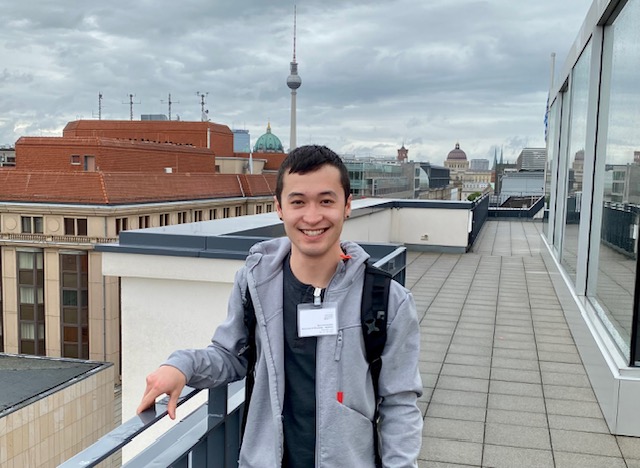 grateful to have the opportunity to learn more about journalism as well as German-American relations. Between meeting Fabrizio Micallizzi, Germany’s Chief of Staff to the Coordinator of Transatlantic Cooperation, to better understand Germany’s involvement in the European Union. Or having the opportunity to visit the headquarters of Der Spiegel in Hamburg and learning first hand the rigorous process of fact checking. As well as having the chance to better understand America’s role in helping reunify East and West Germany into one nation by visiting various museums. These are just a few of the things that made the program a once and a lifetime opportunity. Someone once told me that being able to travel outside your home country is not only a great source of pleasure but is also an education in itself. After the last 3 weeks I can confirm that this sentiment is true. I came in with the goal to learn more about the profession of journalism as well as what life is like in Germany and I walked away with just that. But not only did I have a chance to learn more about journalism and Germany, I was also given a renewed appreciation for my home country. A showcase of American leadership; becoming a part of the ‘Radio In the American Sector’ legacy has made me proud of where I am from while also motivating me to continue to stand up for any and all necessary change in the U.S. I will carry these things with me for a very long time, as my participation in this program truly was an eye opening.
grateful to have the opportunity to learn more about journalism as well as German-American relations. Between meeting Fabrizio Micallizzi, Germany’s Chief of Staff to the Coordinator of Transatlantic Cooperation, to better understand Germany’s involvement in the European Union. Or having the opportunity to visit the headquarters of Der Spiegel in Hamburg and learning first hand the rigorous process of fact checking. As well as having the chance to better understand America’s role in helping reunify East and West Germany into one nation by visiting various museums. These are just a few of the things that made the program a once and a lifetime opportunity. Someone once told me that being able to travel outside your home country is not only a great source of pleasure but is also an education in itself. After the last 3 weeks I can confirm that this sentiment is true. I came in with the goal to learn more about the profession of journalism as well as what life is like in Germany and I walked away with just that. But not only did I have a chance to learn more about journalism and Germany, I was also given a renewed appreciation for my home country. A showcase of American leadership; becoming a part of the ‘Radio In the American Sector’ legacy has made me proud of where I am from while also motivating me to continue to stand up for any and all necessary change in the U.S. I will carry these things with me for a very long time, as my participation in this program truly was an eye opening.
Madison Rae Karas, Temple University: After having our original RIAS fellowship postponed due to the COVID-19 pandemic in 2020 and 2021, this year’s program was well worth the two-year wait. During the action-packed
schedule in Berlin, Leipzig, Hamburg, and Cologne, I gained a more complex understanding of transatlantic relations and German and American identities than I had previously. Learning how our two countries supported and depended on each other in the past, and how they are uniquely dealing with their dichotomies and polarization in the present, gave me a more nuanced outlook on current issues. Our program’s blend of activities and speakers in news, media, history, and politics also allowed us to question pertinent topics, like energy and inflation, from various perspectives. In addition, it was an invaluable experience to meet and hear the stories of people who experienced some of Europe’s most historic events in many of our meetings and tours. I look forward to bringing my knowledge back to the U.S., visiting Germany again soon, and becoming a part of the RIAS Alumni Network.
Marlowe Starling, University of Florida: Berlin, a city bursting with energy, was the perfect place to witness how history and modernity have together laid the foundation for a fascinating and vital free press here in Germany. As we hurried between appointments with the biggest names in broadcast at ARD, RTL and WeltTV, some of my favorite moments were ordering ice cream in rudimentary German and discovering the magic of Berlin’s duality. “There’s still the wall in our minds,” one tour guide told us on the border of the old east and west. Someone else said there was a wall in her heart. Hearing these words, I realized it’s not just in Berlin that people hold on to the remains of a vicious divide; it exists in the US, too, where the wall in the mind is perhaps even stronger despite never having a wall in the first place. This experience with RIAS has brought not only great knowledge and opportunities to explore the “true Berlin,” but also the chance to reflect on our own “American identity” — an identity equally in crisis, and one with no single definition. As an environmental reporter, I also had the great opportunity to learn about Germany as a leader in renewable energy—even amid the impending energy crisis from the cut-off of Russian oil supply. As an aspiring international journalist, this program has given me a taste of what it means to report abroad and the value of bringing an outside perspective to reporting in another country. I am hopeful that the United States can, like Germany, learn to acknowledge its history for a better-informed future.
Carlee Pascual, University of Oklahoma: RIAS provided me an experience I will never get the opportunity to relive. I loved the sights, but nothing will ever compare to the people I had the privilege of encountering. My program mates will be my friends for years to come. They each added something new to my l ife. The German people I met on my trip have helped me see things from a completely new lens. I look forward to taking their perspectives into the next years of my life. More than anything, I have a renewed faith in the power of universal human rights and kindness. The United States can change and I look forward to helping it happen. I look forward to seeing RIAS become more than it is today. I look forward to seeing the RIAS network grow. I am honored to join its ranks. Thank you RIAS! Thank you Germany!
ife. The German people I met on my trip have helped me see things from a completely new lens. I look forward to taking their perspectives into the next years of my life. More than anything, I have a renewed faith in the power of universal human rights and kindness. The United States can change and I look forward to helping it happen. I look forward to seeing RIAS become more than it is today. I look forward to seeing the RIAS network grow. I am honored to join its ranks. Thank you RIAS! Thank you Germany!
Evette Giron, University of Central Oklahoma: The RIAS student program  was a life changing experience for me. I honestly did not know what to expect from our three weeks. I appreciate the Germany government investing in students like me. I learned so much about Germans politics and German media, topics I otherwise would not have studied in the U.S. I really enjoyed meeting with local politicians who are committed to making a difference in their country is a once in a lifetime opportunity. My favorite experience during the program was meeting Ukrainian mothers who fled the war. It was truly emotional and I have heard similar stories from Afghan refugees in the U.S. This experience solidified my desire to work on protecting human rights. I do hope that RIAS keeps helping and inspiring young journalists like me to continue our pursuit.
was a life changing experience for me. I honestly did not know what to expect from our three weeks. I appreciate the Germany government investing in students like me. I learned so much about Germans politics and German media, topics I otherwise would not have studied in the U.S. I really enjoyed meeting with local politicians who are committed to making a difference in their country is a once in a lifetime opportunity. My favorite experience during the program was meeting Ukrainian mothers who fled the war. It was truly emotional and I have heard similar stories from Afghan refugees in the U.S. This experience solidified my desire to work on protecting human rights. I do hope that RIAS keeps helping and inspiring young journalists like me to continue our pursuit.
Erik Kirschbaum, Executive Director RIAS Berlin Commission: It has been a tremendously rewarding experience to spend three weeks zipping around Berlin
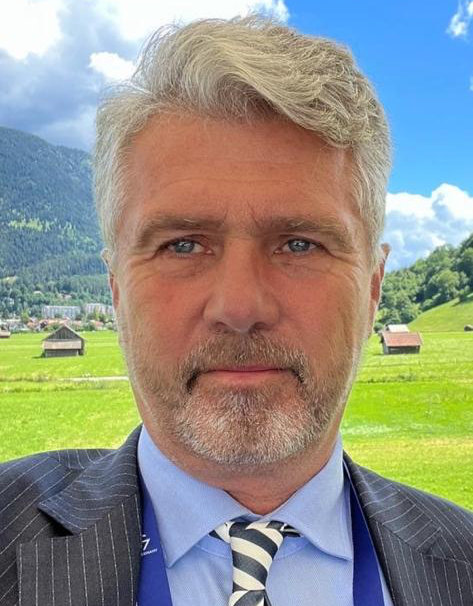 and across Germany to meet journalists and newsmakers in Leipzig, Hamburg, Cologne and Berlin with a delightful group of 14 smart, savvy, young American journalists and journalism students — many traveling outside the Midwest, South or Southwest for the first time. Their hunger to learn more about Germany, their insatiable curiosity, their great questions and their impressive pre-program preparations for this fast-paced adventure with as many as five meetings a day knocked my socks off. As one experienced German journalist later told me after being inundated with their questions told me: “After meeting your group, I’m no longer worried about the future of journalism.” I couldn’t have said it better myself.
and across Germany to meet journalists and newsmakers in Leipzig, Hamburg, Cologne and Berlin with a delightful group of 14 smart, savvy, young American journalists and journalism students — many traveling outside the Midwest, South or Southwest for the first time. Their hunger to learn more about Germany, their insatiable curiosity, their great questions and their impressive pre-program preparations for this fast-paced adventure with as many as five meetings a day knocked my socks off. As one experienced German journalist later told me after being inundated with their questions told me: “After meeting your group, I’m no longer worried about the future of journalism.” I couldn’t have said it better myself.
July 9, 2022
RIAS ERP Transatlantic student program connects Germany, USA
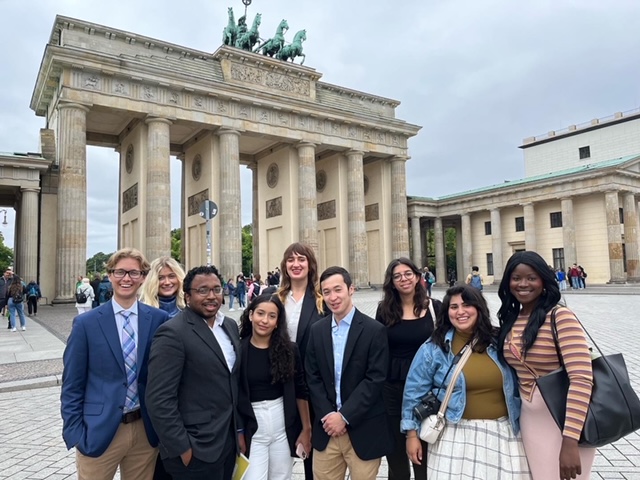
A group of young American journalists and journalism students spent three riveting weeks learning more about the role of broadcasting media during the Cold War and in the process a lot more than they had expected about the history of the United States and Germany.
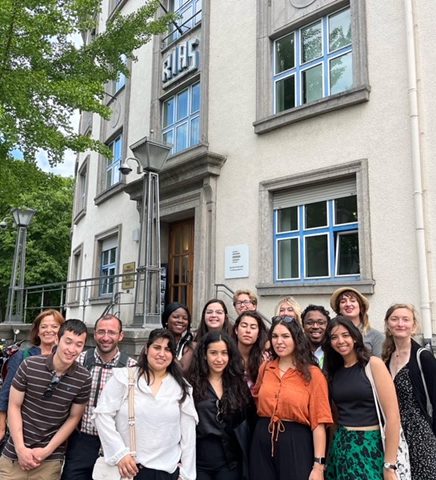
In the process of meeting with journalists, historians, activists, political leaders, refugees, artists, musicians and ordinary Germans during a busy 21-day program, the Americans discovered what an important and historical role their country played in defending freedom in West Germany and Western Europe throughout the post-war Cold War era.
Although they came to Germany to learn more about broadcasting journalism past and present, many of the young Americans seemed surprised to learn about what a force for good the United States had been in supporting West Berlin and West Germany during the Soviet blockade, the Airlift and after the Berlin Wall was built. They also learned about how the United States is still looked upon as a beacon of democracy and values despite the domestic political divisions that have roiled the country in recent decades.
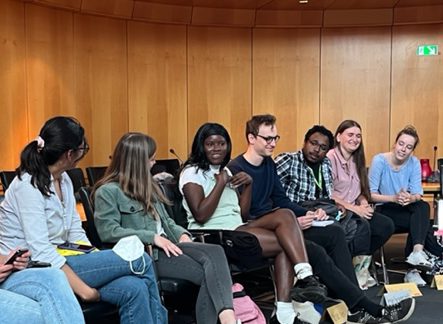
After visits to Leipzig and Hamburg in the first two weeks, their third and final week began in Berlin with a visit to the legendary RIAS building in Berlin’s Schöneberg district for a tour that included one of the historic RIAS broadcasting studios that has been preserved in its original form for posterity. Deutschlandradio talk show host Vladimir Balzer gave the American journalists a riveting talk about his career and work at the national public broadcaster.
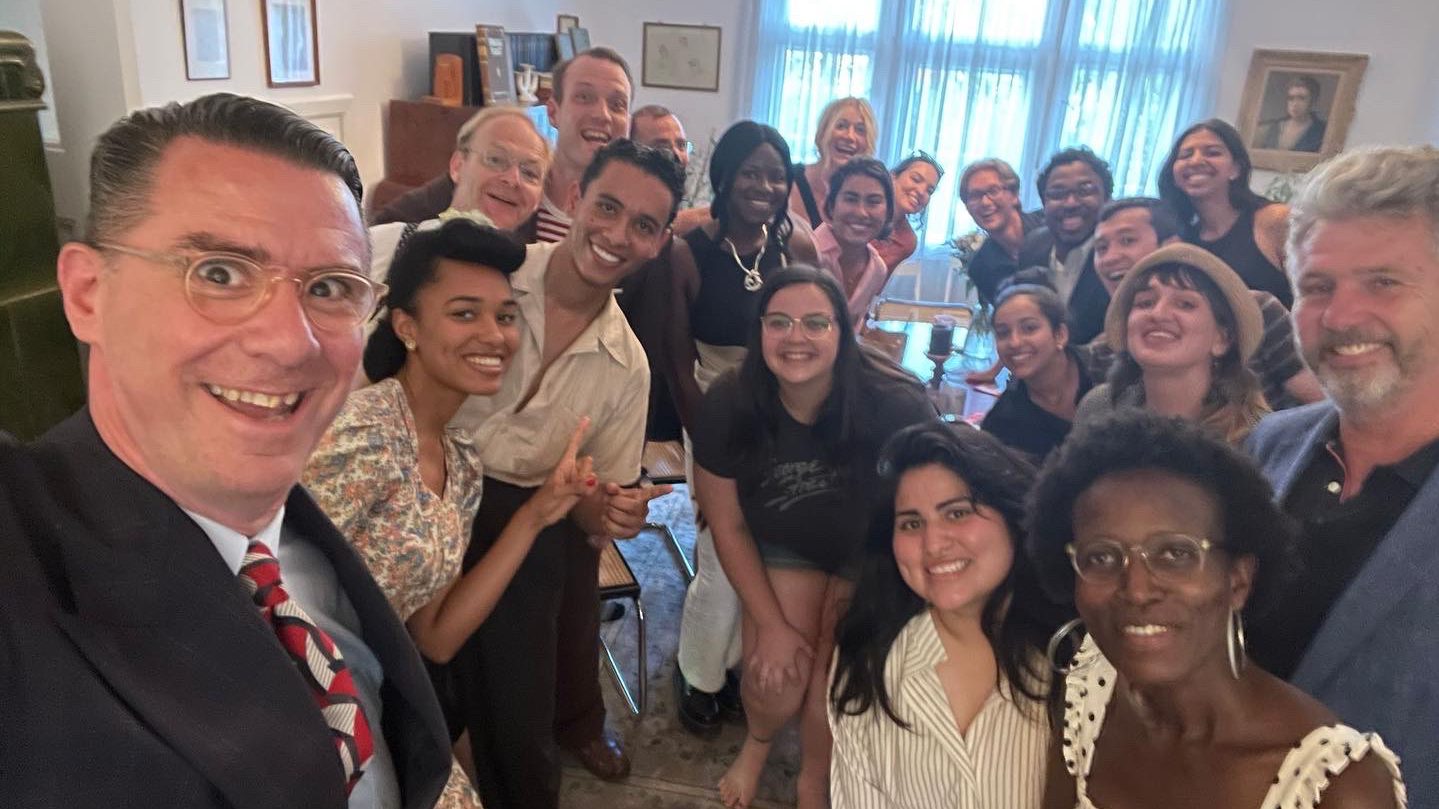
The goal of the ERP program, which was created with support from a grant from the Economy Ministry, is to expand horizons, help connect young American journalism students with their peers in Germany and help aspiring journalists in both countries learn more about journalism training in each others’ countries. The ERP program is supported by the Transatlantic Program of the Federal Republic of Germany. It is funded by the European Recovery Program (ERP) of the Federal Economy and Energy (BMWi) Ministry.
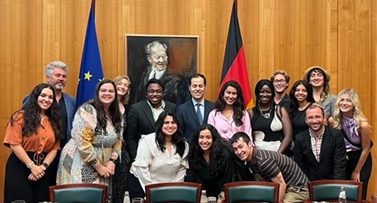
They also went into the Foreign Ministry to meet Fabrizio Micalizzi, chief of staff for Transatlantic Coordinator Michael Link for an engaging discussion about Germany’s relations with the United States, and visited Andrej Hermlin for a talk about culture in Germany and watch his Swingin’ Hermlins performance their on their regular broadcast from his living room.
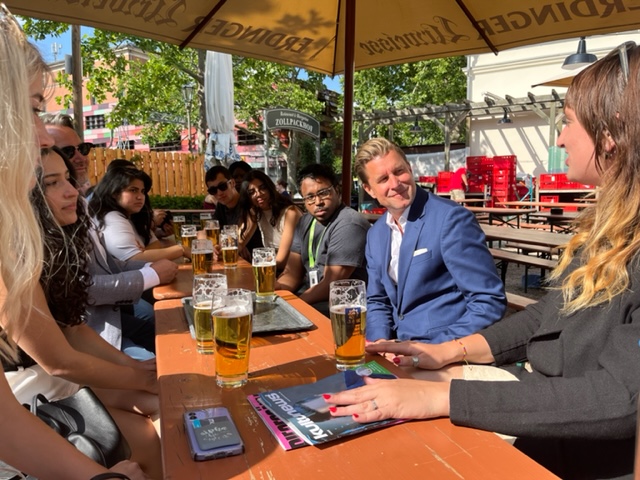
They also met former anchor and Warner executive Michael Kolz at a Berlin beer garden and watched a spectacular multi-media light show about the history of the Reichstag and democracy in Germany that was beamed after sunset onto the walls of parliamentary office buildings.
Two busy days in Cologne including fascinating talks with young journalists from the youth-orientated RTL2 news program and its executive producer Mira Klose as well as a meeting with WDR’s head of TV Ellen Ehni, who offered candid insights into the challenges facing women and executives.
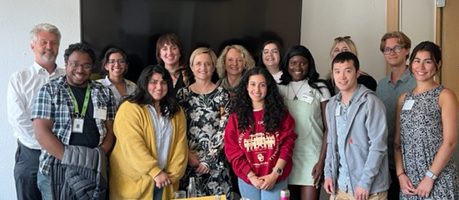
The Americans also had the chance to meet a group of a dozen WDR apprentices to learn more about the differences in Germany about on-the-job-training opportunities for young Germans starting out in the business before meeting a dozen RIAS alumni at a chapter meeting at a Cologne beer garden.
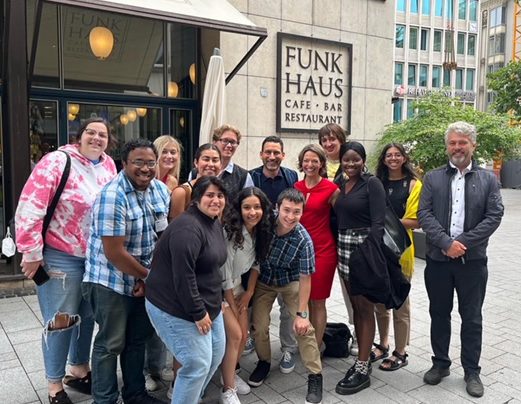
ARD Morgenmagazin anchors Anna Planken and Til Nassif spent more than an hour and a half candidly answering questions from the young Americans about their careers, waking up in the very early morning hours every day for work, and the challenges of morning news programs. The Americans also got insights into the world of the all-news NTV network with a talk from veteran correspondent Carsten Lueb before exploring the center of Cologne, including its famous Cathedral.
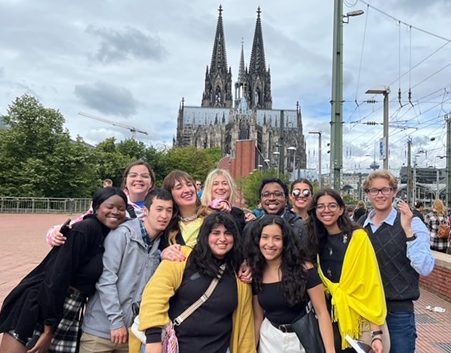
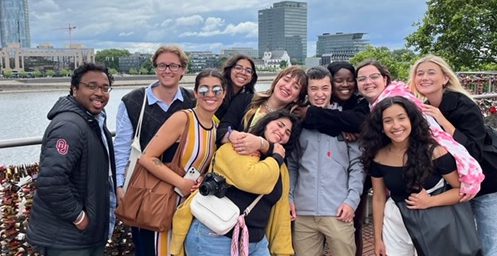
The Americans also had the chance to visit the US Embassy in the heart of Berlin for illuminating talks about the role of the United States in Germany and they had an at-times emotional, at-times joyful meeting with several Ukrainian women and their children who have been sheltering in Berlin since the Russian invasion of Ukraine in February. The women and their children told about the generosity of the Germans in providing them with shelter and support but also of the harrows of the war in Ukraine and the difficult phone calls they have daily with their family and loved ones back at home in Ukraine. Some of the Americans called the meeting with the Ukrainians one of the most moving and powerful of the whole three-week program.
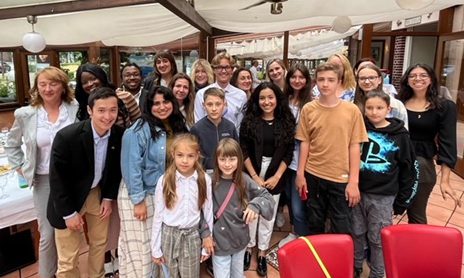
July 3, 2022
American journalism students on 3-week fellowship to Germany
The third annual RIAS Berlin ERP fellowship for American students in Germany got off to a busy start with dozens of meetings with German journalists, editors, directors, politicians, community leaders, experts and political analysts. The Americans will spend a total of three weeks in Germany, learning more about the role that broadcast journalism, including from the legendary Radio in American Sector Radio and TV broadcaster (RIAS), played in the peaceful conclusion to the Cold War.

The students came to Germany on June 19 from universities across the Midwest, South and Southwest — such as Oklahoma, Arizona, New Mexico, Texas, Montana, Florida, Ohio, Wisconsin, Minnesota and Pennsylvania. For many of the American students it was their first trip outside the United States and for some the first journey outside their home region.
German government deputy spokesman Wolfgang Büchner also met the group.

The goal of the ERP program, which was created with support from a grant from the Economy Ministry, is to expand horizons, help connect young American journalism students with their peers in Germany and help aspiring journalists in both countries learn more about journalism training in each others’ countries.

The ERP program is supported by the Transatlantic Program of the Federal Republic of Germany. It is funded by the European Recovery Program (ERP) of the Federal Economy and Energy (BMWi) Ministry.

Although most of the three-week program takes place in Berlin, the students have also made excursions to Leipzig and Hamburg. They will also be spending two days in Cologne in their third and final week before flying home to the United States on July 9.

In Berlin, some of the highlights included watching NTV’s early morning “Frühstart” news interview program with SPD party chair Lars Klingbeil being interviewed by RIAS alumni Daniel Heyd. Klingbeil also answered questions from the young Americans and admitted he and his family enjoy taking their vacations in Kentucky. He also explained a big difference between the United States, where the party leaders are not as important or powerful, and Germany or other European countries, where party leaders are often the leader of the government as well.

After quickly mastering Berlin’s public transportation network and especially the ubiquitous U-Bahn (subway) network, the Americans had a tour of the Reichstag building, a bike tour along a 25-km segment of the Berlin Wall Bike Path, Tempelhof Airport where the Airlift was centered, met NTV journalists Christian Wilp, Nina Lamers and anchor Jan Hofer. They also learned more about public radio in Germany from Deutschlandfunk correspondents Katharina Hamberger and Marcus Pindur — who was duly impressed that the students knew the history of Sudentendeutschland regions of Czechoslovakia that was annexed by Nazi Germany shorted before World War II started.

In Leizpig student alumni Sarah-Maria Köpf gave the students a walking tour of the center of the historic city, pointing to the square where the famous Montagsdemos took place, before Andreas Franz of MDR TV gave a detailed tour of the MDR studios in Leipzig and Lars Beger gave a fascinating talk at student radio Radio Mephisto — a student-run station that he explained was created and based on American student-operated radio stations. Bastian Wierzioch, a journalist who covers far-right extremists, warned of the perils expecially in eastern German from the far-right.

Back in Berlin, the students took a boat cruise of the government quarter together with Reuters White House correspondent Jeff Mason and also visited the Stasi prison in Hohenschönhausen. They also had the chance to spend several hours at the Bernauerstrasse Berlin Wall memorial sight with tour guide Peter Keup. The students spent two days in Hamburg, meeting top journalists at Der Spiegel and at ARD TV such as Helge Fuhst, Damla Hekimoglu and Michail Paweletz as well as US consul general Darion Akins. They also took a walking tour of the famous Reeperbahn red-light district and learned more about the two years that the Beatles spent learning their trade with a punishing performance schedule.

In Berlin the Americans learned more about how young German journalists learn their trade on a visit to the Freetech Academy at the Axel Springer publishing company from Kristin Schulze, head of academic affairs. They also visited WeltTV’s studios and had a talk with editor-in-chief Jan Philipp Burgard as well as fellow alumni Nadine Jantz, Andreas Büttner and Leonie von Randow. The Americans met a group of German alumni for a talk about China from RIAS alumni and RBB radio correspondent in Beijing Benjamin Eyssel.

They also visited the Allied museum, had a talk with leading SPD politician Sawsan Cheblin and had walking tours of the Kreuzberg ethnic neighbor with Greens politician Özcan Mutlu and the Neukoelln neighborhood for Arabic-speaking immigrants with a Syrian refugee Firas Zahri — that ended with diner in the famous Aldimashqi restaurant that was created by Syrian refugees in 2015.
During their third and final week, the students will visit Cologne, the Foreign Ministry and the USA embassy.
June 30, 2022
American journalism students on 3-week fellowship to Germany
A total of 14 American students of journalism and related fields are spending three weeks in Germany to learn more about the role of broadcasting media during the Cold War, in particular the impact that Radio in American Sector (RIAS) had in overcoming the decades-long post-war tensions in Europe.
Here is a list of the participating students:
Marlowe Starling, University of Florida
Jason Stahl, University of Montana
Jason Stahl completes his bachelor’s degree in May 2022 from the University of Montana. His undergraduate studies in history and journalism prepared him to
seek out narrative voices and prevent historical erasure, which he will continue to explore in graduate school. Stahl was born and lived most of his life in a Hutterite colony before coming to university. He is a lifelong Montanan, voracious reader, forever student, journalist, and food enthusiast. Stahl has a special interest in bringing history alive and preserving cultural knowledge through publicity and pilgrimage.
Sasha Hartzell, University of Arizona
Sasha Hartzell is a graduate student at the University of Arizona studying
Documentary Media and Human Rights. She holds a bachelor’s degree in Journalism with a minor in Geography, and has interned with multiple news outlets including Arizona Public Media and the Arizona Daily Star. Hartzell currently works as a Client Services Director and Media Specialist for a North Carolina law firm, producing educational pieces on business topics, and as a freelance journalist.
Jessie Christopher Smith, University of Oklahoma
Jessie Christopher Smith is the breaking news and trending reporter at The Oklahoman, his state’s largest daily newspaper, where he has worked since 2021. Smith earned a bachelor’s degree in Journalism at The University of Oklahoma, with minor concentrations in Religious Studies and English, Literary and Cultural Studies. He previously worked for Gaylord News, OU Daily, and Rap Chronicle.
Oreoluwa Ojewuyi, Southern Illinois University
Oreluwa Ojewuyi, recently received her Bachelors of Arts in political science and bachelors of science in journalism
and a French minor. She was the Editor-in-Chief of the Daily Egyptian newspaper from 2021-2022. She is currently a grant writer for the non-profit organization Chicago Votes and will be pursuing her master’s degree in public affairs reporting at the University Illinois Springfield in the fall.
Dayana Villanueva, New Mexico State University
Dayana Villanueva is a senior studying economics at New Mexico State University
after completing a degree in multimedia journalism in 2021. She has worked as a reporter and anchor for Spanish-language student-run newscasts at NMSU. Born in El Paso, Texas, and raised in Ciudad Juarez, Mexico, Villanueva has reported on cultural, social justice, protest, and immigration issues. She is also a staff writer and multimedia specialist at The Round Up, an independent online newspaper at NMSU. She aims to become an investigative reporter in broadcasting.
Marien López-Medina, University of Oklahoma
Marien López-Medina is a rising senior in Journalism at the University of Oklahoma. Originally from Managua, Nicaragua, she left her country in 2017 to earn her international baccalaureate diploma at Lester B. Pearson College of the Pacific in Victoria, B.C., Canada and arrived at OU in fall of 2019. She worked as a news reporter, assistant news editor and summer news managing editor at The OU Daily, where she discovered her focus in journalism: conflict zones, immigration, minority groups, diversity and human rights. López-Medina wants to pursue a career in investigative journalism in the United States, Latin America or Europe.
Jenna Calderon, Miami University, Ohio
Jenna Calderón is a recent graduate from Miami University in Ohio, with degrees
in journalism, Spanish, and global & intercultural studies. She has bylines in Men’s Health magazine, Cincinnati magazine, Dayton Business Journal and more. Calderón is particularly interested in rural communities in Central and South America and hopes to spend some time teaching English in these areas before starting a full-time career in journalism
Noah Mack, University of Oklahoma
Noah Mack is a sophomore at the University of Oklahoma studying journalism and political science. Noah produces his college’s student-led newscast, OU Nightly. He was associate producer of a show that won best video newscast from the Oklahoma Broadcast Education Association. Mack is interning with an HBO documentary looking back at 1995 Oklahoma City bombing. He enjoys reporting and producing, and is interested in politics, history and international affairs.
Madison Karas, Temple University, Philadelphia
Madison Karas is a journalist based in Philadelphia, Pennsylvania. She recently
graduated summa cum laude from Temple University’s journalism and economics undergraduate programs. Madison has interned for the Minneapolis Star Tribune and is currently a fellow at Resolve Philly and an editorial fellow at News Catalyst, where she supports the Tiny News Collective. Madison is interested in working at the intersection of editorial, engagement and product in newsrooms.
Mikaela DeLeon, University of Oklahoma
Mikaela DeLeon is a junior journalism student at the University of Oklahoma. She holds minors in political science and history and reported for the OU Daily. DeLeon has worked as a DC Correspondent with Gaylord News and is interested in media law and international relations.
Evette Giron, University of Central Oklahoma
Evette Giron is a recent graduate of the University of Central Oklahoma where
she studied education and photojournalism. Most recently she’s been teaching English to newly arrived Afghan refugees in Oklahoma City. Giron is looking forward to using her photography skills to report on the refugee crisis in Europe.
Brandon Leis, University of Wisconsin – Madison
Brandon Leis is a recent graduate of the University of Wisconsin – Madison with a Bachelors in English and Communication Arts. A Wisconsin native, he aims to learn more about journalism in Germany and foreign news coverage. Leis has ambitions to work in Germany.
Carlee Pascual, University of Oklahoma
Carlee Pascual is a rising senior Public Relations major at the University of
Oklahoma. She is minoring in History and Political Science and plans to attend law school after graduating. She has a huge passion for learning about the Cold War and her favorite US President is John F. Kennedy. Pascual is excited to travel to Europe for the first time.
June 23, 2022
American journalists offer personal insight into their “RIAS experience”
It was an honor and a privledge for the RIAS Berlin Kommission to recently welcome ten amazing American journalists to our 2-week program for professionals. This is what they have to say about their personal “RIAS experience”.
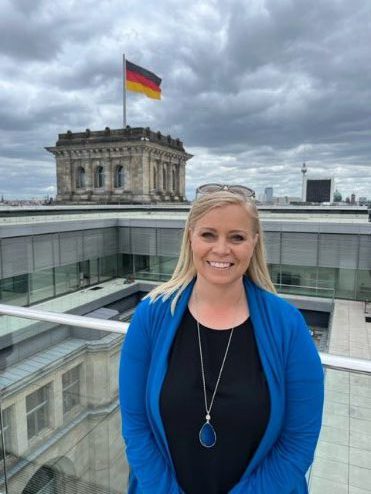 Sheryl Worsley, VP of Podcasting, KSL, Salt Lake City
Sheryl Worsley, VP of Podcasting, KSL, Salt Lake City
I am amazed at how much I learned on the RIAS Berlin journalism exchange to Brussels and German cities of Cologne and Berlin. We were given incredible access to wonderful people inside NATO and the European Commission where we learned about the way this part of the globe interacts with member partners and those countries nearby. The geo-politics were fascinating. Although exhausted from a whirlwind of activity (this schedule is action packed!), I found all the discussions compelling and valuable. It was wonderful to learn from and about journalists in Germany and I made contacts I hope to keep. Most interesting were the visits with a Syrian refugee who escaped the war in Aleppo, the Ukrainian journalist who fled the war in her homeland waged by Russia and the Turkish politician who still fights for the rights of minority populations in Berlin. I have a better understanding and appreciation for the people, culture and history of Germany. Most of all, I am grateful for the people with whom I travelled. Erik was an incredible leader, an excellent teacher and expanded my understanding. Lastly, the connections I made with the nine journalists in our group I would not trade. We will be friends for life. I highly recommend this program.
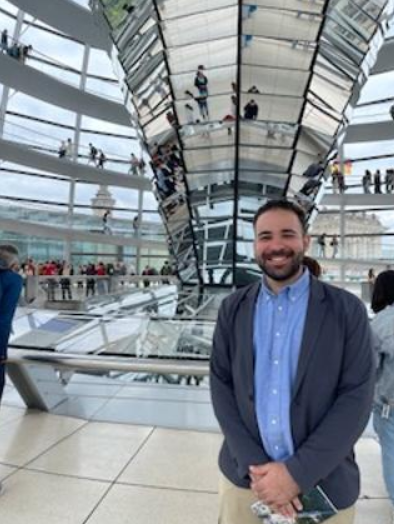 Omar Atia, WNBC New York, NY
Omar Atia, WNBC New York, NY
Eye-opening, life changing, unforgettable. Insert all of your travel clichés and they all ring true of RIAS Berlin. Russia’s war in Ukraine dominated our discussions throughout two whirlwind weeks in Brussels and Berlin.
Each day was packed with a who’s-who of politicians, journalists, deal makers and diplomats. Our level of access was second to none. We had candid discussions with top officials from NATO and the EU. Their message was optimistic: Europe was more united than ever, thanks to Putin’s war. We heard heart-breaking stories directly from the people impacted most: a group of Ukrainian mothers and their children, who recently arrived to Germany. They wanted their stories to be heard and told, afraid their plight might blur into background noise.
We saw the success story of a Syrian refugee, a narrative that is largely left untold. Seven years ago, he risked his life swimming across the Mediterranean to escape war. Today, he is an IT manager who has built a new life for his family in Berlin. Through it all, I was constantly impressed by how committed Germany is to publicly funding news outlets. A business model that prioritized people – not profit – and substance – not flash. We learned in real terms why a well-informed public is a key ingredient to a healthy Democracy. Maybe that’s something the U.S. can learn from Germany.
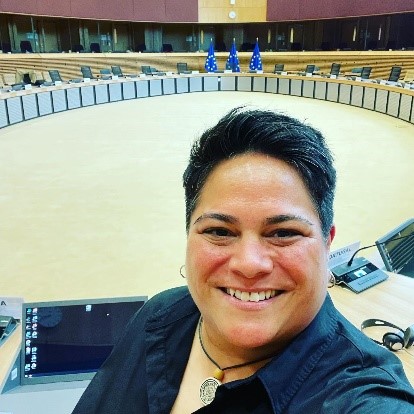 Esther Ciammachilli, WAMU, Washington, D.C.
Esther Ciammachilli, WAMU, Washington, D.C.
Journalists often say that we got into this business because we like to talk to people and learn about new cultures. The RIAS Berlin program and the people I have met on this whirlwind journey encompass all the reasons why I chose journalism as a career.
The Squad: I do not think I could have asked for a better group of people to run all over Belgium and Germany with at times like the Amazing Race. We all brought a different strength and perspective to the group dynamic – Omar the navigator, Katherine the archaeologist – to name a couple. All of you left an imprint on my soul. Friends. For. Life. Without the RIAS program I never would have met so many amazing new German friends and colleagues, all of whom showed me the true meaning of warm hospitality, humanity, empathy, and international cooperation.
Last but certainly not least is the unprecedented access to institutions and officials most journalists would never have access to. Each new day brought a new extraordinary opportunity that was more meaningful than the day before. Visiting NATO (no photos!) and the EU were surreal for me. I’m still processing.
My favourite part of the trip was Cologne and talking to journalists Jörg Schönenborn, Charlotte Maihoff, and Karolina Ashion – some very big deals in Germany. They graciously set aside time in their busy days to talk with us about how Germans view the current political climate in the United States (Shönenborn), their harrowing reporting experiences as a Black woman in Russia (Maihoff), and how they maintain composure and self-care while also reporting on the atrocities in their home country of Ukraine, which they fled at the beginning of the war (Ashion). This day was really a gift to me.
The RIAS experience is invaluable. I came back to Washington D.C. a proud ambassador of the program and I will be thrilled to share my experience with other journalists and encourage them to apply.
I want to send a very special thank you to Erik Kirschbaum for leading us on this amazing trip and connecting us with so many important Europeans. And also for forcing us to mingle with RIAS alumni in Germany. Seriously, the best forced interaction I have ever experienced. Also thank you to Melissa and Christina for herding ALL the cats on this trip and every other. You two are magicians!
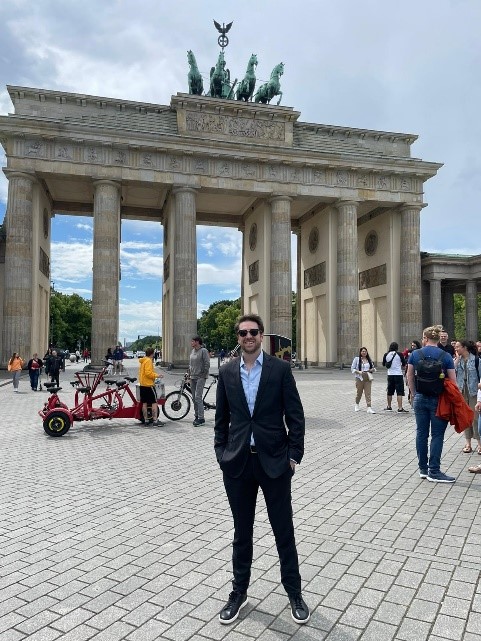 Matthew Gregory, WUSA9, Washington, D.C.
Matthew Gregory, WUSA9, Washington, D.C.
After two years of false starts and several waves of COVID, the RIAS 2022 June Fellowship was worth the wait. We found ourselves thrown into the middle of a historic time as European allies grappled with the war in Ukraine. The situation had turned politics on its head. The halls of NATO and EU buzzed with activity and old alliances began to wake to face the Russian threat in the East. A large number of German politicians-Greens in particular-called for a military build up, the likes of which Germany hasn’t seen in its post-World War II existence. While German leadership waffled on how to handle the defense of Europe. There we were, in the middle of it all. I don’t know if past RIAS groups got to experience the level of access and activity we did. While it felt unprecedented, it also matched an unprecedented time. The ‘background briefings’ at NATO and the EU gave insight into which direction the old alliances are moving in order to deal with Russian aggression. RIAS peppered in talks with journalists who cover these institutions to give color to the information we were given.
In Germany we saw how our European counterparts have approached this new paradigm of ‘Europe At War.’ In all RIAS Fellowships there is the interesting novelty in how German journalists do their jobs, but this was something different. We were watching them do their work as the ground shifted beneath them. Journalists from the public and private newsrooms talked about the rising challenges of covering Germany, as politicians try to find some even-ground for the war in Europe. At the same time, it was obvious the country and its journalists are still working towards a true ‘German identity.’
Around 30 years after unification, the country is still forging the new Germany. Questions of ethnicity, race, and representation continue to hum in the background. We sat down with activists and politicians who were born and raised in Germany, but still felt that a section of Germany does not accept them because of how they look. Their stories of overcoming adversity and optics were inspiring, but also disheartening. Germany, in a similar fashion to the United States, has a long way to go to forge an identity that includes all of its citizens. When I look back at RIAS June 2022, I can’t help but think we caught lightning in a bottle. We attended during a pivotal time in European and German history. We sat down with some of the most intelligent and cerebral journalists covering the new Europe. We spoke to refugees who have made their home in Germany. We did it as a highly functioning team. The group selected by the RIAS board worked like a newsroom. We leaned on each other for help and pushed each other for success. We hit our deadlines for every event-usually we showed up 5-10 minutes early.
However, unlike most newsrooms, we all got along. Each one of us fit something the group needed to succeed. The last day felt-to all of us- like the last day of camp. We came in as strangers, but we left a mark on each other. We marched across Brussels, Cologne, and Berlin in a small herd. All the while led by Erik Kirschbaum as he peppered in stories and context to the sites and stories we saw. I am terrible at networking, but I look forward to staying in touch with my RIAS 2022 Fellows because we worked on something monumental together.
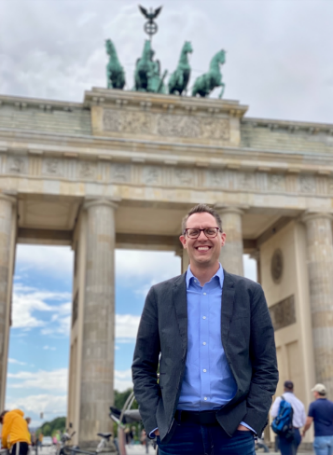 Kevin King, Dakota News Now, Sioux Falls, SD
Kevin King, Dakota News Now, Sioux Falls, SD
What an amazing two weeks! I don’t know if there is a better way for American journalists to learn more about the historic relationship between Germany and the United States. As a journalist, the program opened my eyes to German and European politics. The access we received during our program was amazing. From visits with high level officials at the European Union, NATO and the U.S. Embassy in Berlin, tours of some of the biggest media organizations in Germany, to meeting local journalists, this was trip unlike any other. I’m looking forward to going back to my newsroom and sharing what I’ve learned. Anyone who is able should apply for this amazing fellowship. It will not disappoint.
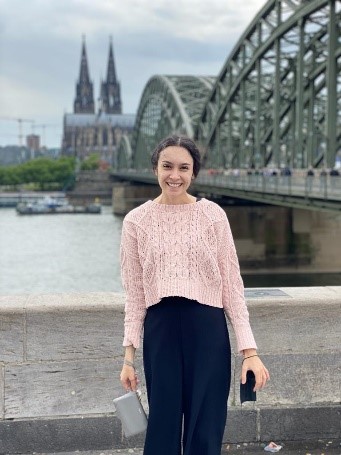 Pam Ortega, Freelance Radio/TV Journalist, Oklahoma City, OK
Pam Ortega, Freelance Radio/TV Journalist, Oklahoma City, OK
Back in 2018, RIAS was my introduction to Europe and Germany. Four years later, the program exceeded my expectations. I spent two weeks with 9 of the most dynamic, intelligent and versatile journalists in the industry, that I now call friends. As an immigration journalist and researcher, my favorite part of the program was the incorporation of refugees and migration issues, including the tour of Syrian and Turkish neighborhoods, and talks by politicians of migrant backgrounds. From visiting the EU, to speaking with various politicians to knocking it out of the ballpark at karaoke, these 9 are truly the best the industry has to offer and I’m grateful for them and the work they do to uphold journalistic values.
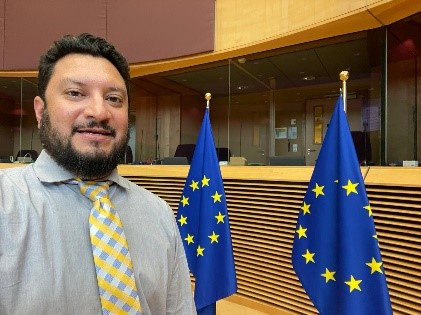 Brandon Benavides, NBC4, Washington, D.C.
Brandon Benavides, NBC4, Washington, D.C.
My first trip to Europe was more amazing than I imagined. I learned first hand information from officials at NATO Headquarters and the European Union in Brussels. That knowledge will help shape my future stories. From visiting the German Parliament to tv studios in Cologne and Berlin, I saw how journalists covered the news and used their resources. I recommend the RIAS Berlin Commission to anyone looking to expand their worldview. There is more in this world, than your hometown.
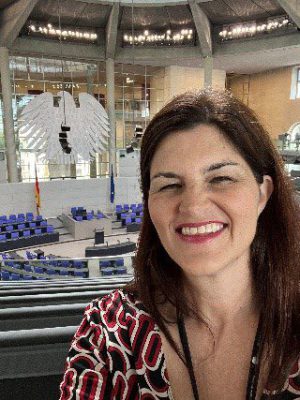 Katherine Bennett, CNN International, Atlanta, GA
Katherine Bennett, CNN International, Atlanta, GA
I am thankful I was able to participate in the RIAS Berlin Commission transatlantic exchange program in June 2022. Our group’s visit to the European Union headquarters and NATO was my favorite experience during the program. I also enjoyed spending time meeting so many incredible and accomplished people along this journey, including my fellow American journalists, who became my friends. I would recommend RIAS to any journalist seeking a rigorous (and fun) professional development experience.
Scott Neuman, NPR, Washington, D.C.
It would be difficult to imagine a better journalistic introduction to German and European politics and foreign policy than the RIAS Berlin program. As a group, we enjoyed unique access to high-level diplomats and politicians. Highlights included briefings at the headquarters of NATO and the European Union in Brussels that came at a pivotal time in history. Having the opportunity to discuss these momentous events with fellow journalists was equally valuable. RIAS was an incredible and unforgettable experience!
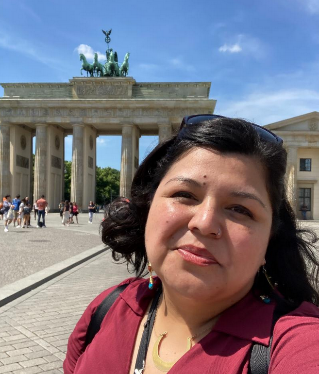 Andrea Gutierrez, NPR, Los Angeles, CA
Andrea Gutierrez, NPR, Los Angeles, CA
Since studying in Germany in college, I have been looking forward to returning in a professional capacity. RIAS gave me the chance to learn and grow as a journalist not only through meetings with government and agency officials, but also with journalists in Belgium and Germany, as well as within our mighty crew of US-based journalists. I am glad to join the ranks of RIAS alums in the US and Germany.
And a few words from our Executive Director about this particular program:
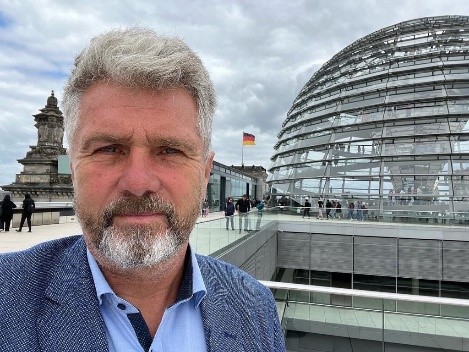 Despite the newfound challenges of trying to schedule meetings with NATO, EU and German newsmakers and policymakers short after a war in Europe broke out and the Covid-19 pandemic continues to mess up the best of plans, the first RIAS Berlin Commission exchange program for professional American broadcast journalists to Europe since 2019 turned out to be a tremendous success. All of a sudden, just shortly before the program began, the skies opened up and guest speakers began lining up to talk to our talented collection of senior American broadcast journalists from across the United States – Utah, South Dakota, Oklahoma, Georgia, New York, Washington DC and Los Angeles. It was one of the most ambitious RIAS programs in Germany in many years with nearly 40 appointments in 12 days but also one of the most enlightening ever.
Despite the newfound challenges of trying to schedule meetings with NATO, EU and German newsmakers and policymakers short after a war in Europe broke out and the Covid-19 pandemic continues to mess up the best of plans, the first RIAS Berlin Commission exchange program for professional American broadcast journalists to Europe since 2019 turned out to be a tremendous success. All of a sudden, just shortly before the program began, the skies opened up and guest speakers began lining up to talk to our talented collection of senior American broadcast journalists from across the United States – Utah, South Dakota, Oklahoma, Georgia, New York, Washington DC and Los Angeles. It was one of the most ambitious RIAS programs in Germany in many years with nearly 40 appointments in 12 days but also one of the most enlightening ever.
-Erik Kirschbaum, Executive Director RIAS Berlin Commission, Berlin
June 18, 2022
American journalists visit Brussels, Cologne & Berlin on fellowship
 Ten American broadcast journalists from Atlanta to Salt Lake City and from Oklahoma City to New York City spent two weeks on a whirlwind RIAS Berlin Commission fellowship, learning a lot about Germany, NATO and the European Union at a time of crisis over Russia’s invasion of Ukraine. The Americans were able to talk to senior policymakers, leading journalists, activists, refugees, immigrants and political experts in all three cities during the first standard RIAS exchange program to Europe since before the pandemic in 2019.
Ten American broadcast journalists from Atlanta to Salt Lake City and from Oklahoma City to New York City spent two weeks on a whirlwind RIAS Berlin Commission fellowship, learning a lot about Germany, NATO and the European Union at a time of crisis over Russia’s invasion of Ukraine. The Americans were able to talk to senior policymakers, leading journalists, activists, refugees, immigrants and political experts in all three cities during the first standard RIAS exchange program to Europe since before the pandemic in 2019.
The fast-paced and exhaustive program began in Brussels on June 6 with 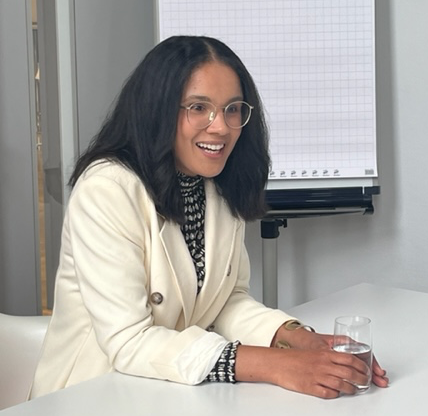 meetings with such luminaries as journalist Teri Schultz (NPR, Deutsche Welle), senior NATO policymakers from the United States, the UK, Slovakia, and Croatia who talked about the crisis in Ukraine as well as the bids to join NATO from Finland and Sweden. They also met European Commission figures such as Haydn Schofield, Frederic d’Hondt, Stefan de Keersmaecher, and Peter Stango, the foreign affairs policy spokesman on EU support for Ukraine.
meetings with such luminaries as journalist Teri Schultz (NPR, Deutsche Welle), senior NATO policymakers from the United States, the UK, Slovakia, and Croatia who talked about the crisis in Ukraine as well as the bids to join NATO from Finland and Sweden. They also met European Commission figures such as Haydn Schofield, Frederic d’Hondt, Stefan de Keersmaecher, and Peter Stango, the foreign affairs policy spokesman on EU support for Ukraine.
In Cologne the Americans were treated to a riveting talk with WDR program director and leading journalist Jörg Schönenborn, RTL anchor Charlotte Maihoff and a Ukranian journalist, Karolina Ashion, who is now doing a daily news broadcast in Ukrainian on the NTV network’s social media channels. The Americans also met about 20 members of the Cologne alumni chapter at the Brauhaus Deutz before taking an early-morning train to Berlin — where they met a leading member of the SPD, Sawsan Chebli, and Politico’s Chief European Correspondent Matt Karnitschnig. They also met with about a dozen members of the Berlin alumni chapter.
Americans also met about 20 members of the Cologne alumni chapter at the Brauhaus Deutz before taking an early-morning train to Berlin — where they met a leading member of the SPD, Sawsan Chebli, and Politico’s Chief European Correspondent Matt Karnitschnig. They also met with about a dozen members of the Berlin alumni chapter.
After an illuminating Saturday morning stroll together with Syrian refugee Firas Zahkri of the Neukoelln neighborhoods that are overwhelmingly population by immigrants and the famous Sonnenallee avenue that is better known locally as 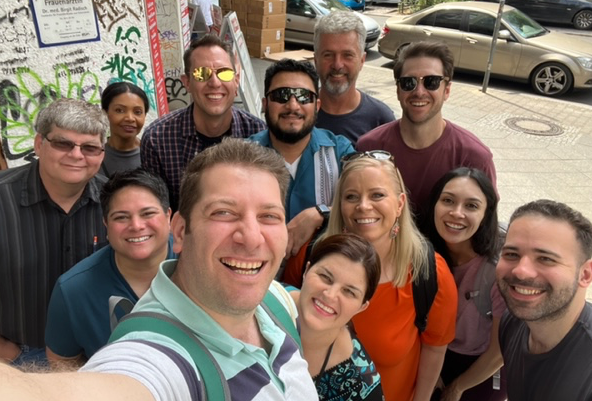 Arabic Avenue and lunch at a famous Syrian restaurant, Aldimashqi, the Americans had an eye-opening visit to the Stasi prison in Hohenschönhausen where political prisoners were held in Communist East Germany.
Arabic Avenue and lunch at a famous Syrian restaurant, Aldimashqi, the Americans had an eye-opening visit to the Stasi prison in Hohenschönhausen where political prisoners were held in Communist East Germany.
ZDF anchor Mitri Sirin and RBB reporter Petra Gute enlightened the group about the differences between TV and radio journalism in Germany compared to the 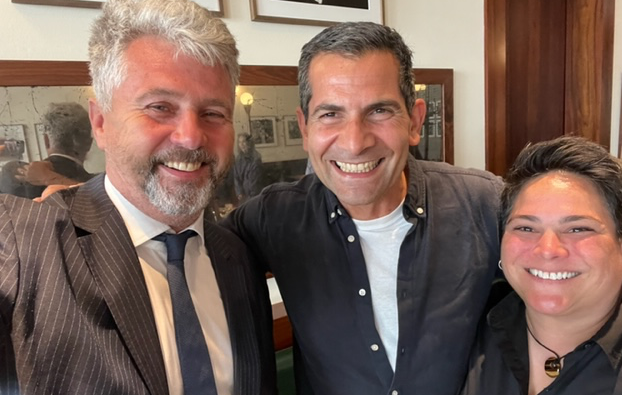 United States while political consultant Julius van de Laar, Rob Schmitz, the NPR correspondent in Berlin, and musician Andrej Hermlin were able to expand the horizons of the journalists with talks about life in Germany during a series of food-filled meetings at the famous Cafe Einstein. The Americans were able to visit the US Embassy in Berlin in the afternoon along with the Holocaust memorial before listening to a speech from Defense Minister Christina Lambrecht, who tried to defend Germany’s assistance to Ukraine despite criticism from Ukraine and the German media that it should be doing more.
United States while political consultant Julius van de Laar, Rob Schmitz, the NPR correspondent in Berlin, and musician Andrej Hermlin were able to expand the horizons of the journalists with talks about life in Germany during a series of food-filled meetings at the famous Cafe Einstein. The Americans were able to visit the US Embassy in Berlin in the afternoon along with the Holocaust memorial before listening to a speech from Defense Minister Christina Lambrecht, who tried to defend Germany’s assistance to Ukraine despite criticism from Ukraine and the German media that it should be doing more.
The Americans got a lively tour of the Reichstag parliament building, its spectacular glass rooftop dome and its fascinating history — complete with Russian profanities scribbled on walls inside the parliament building by invading Soviet troops at the end of World War Two. They also had the chance to talk with Deutsche Welle’s director general Peter Limbourg and news director Max Hoffmann at DW headquarters in Wedding.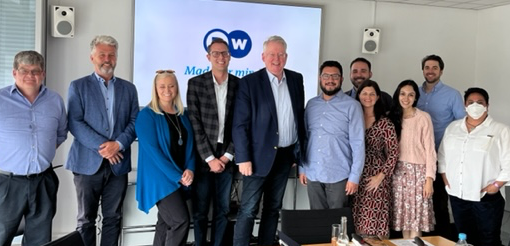
The Americans also enjoyed a spectacular evening with the famed German radio and TV personality Joerg Thadeusz and Anna Engelke, a journalist who has spent the last several years working as the spokeswoman for President Frank-Walter Steinmeier before returning to journalism this year.
After hearing so much about the opposition Alternative for Germany (AfD), an extreme right-wing party in Germany that all other parties have shunned, the Americans met with a senior member of the AfD in parliament — Beatrix von Storch. That was followed by a meeting with Tagesspiegel newspaper journalist Elisabeth Binder at the famous Berlin newspaper offices and a meeting at the Federal Press Office with deputy government spokesman, Wolfgang Büchner — 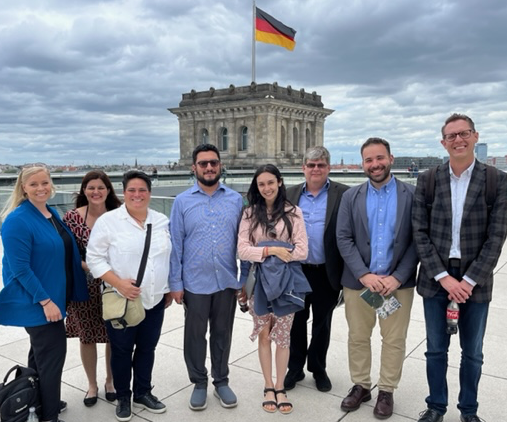 the former editor of Der Spiegel news magazine.
the former editor of Der Spiegel news magazine.
The creator of the famous East Side Gallery open-air art exhibit on the East Side of the Berlin Wall, Kani Alavi, explained how the 1.3-km long project happened in early 1990 and how he has successfully fended off developers who would rather tear down one of the last remnants of the Berlin Wall to build apartments.
Deutschlandfunk correspondents Katharina Hamberger and Markus Pindur were able to shed light on their work at Germany’s most influential news radio station from the offices of the Bundespressekonferenz – a uniquely German room for news conferences where spokesmen and spokeswomen from all the ministries are invited to answer questions from the assembled capital press corps three times each week on Mondays, Wednesdays and Fridays.
The journalists also visited WeltTV, where editor-in-chief Jan Philipp Burgard talked about the all-news station and his time as a correspondent in the USA for the ARD network while joined by RIAS alumni Lena Mosel and Leonie von Randow.
Özcan Mutlu, a leading figure in the Greens party and leading voice in Germany’s increasingly influential Turkish community, gave the Americans a tour of the ethnic neighborhoods in Kreuzberg just south and west of where the Berlin Wall stood during the Cold War that have in the meantime turned in the new and vibrant heart of Berlin.
In Berlin, journalist Anna Noryskiewicz talked about her work as a journalist for CBS News before the Americans had the chance to savor an eye-opening and at-times emotional lunch with a group of 20 Ukrainian women and their children.
June 6, 2022
RIAS Germany Standard Program starts in Brussels – June 6 -17, 2022
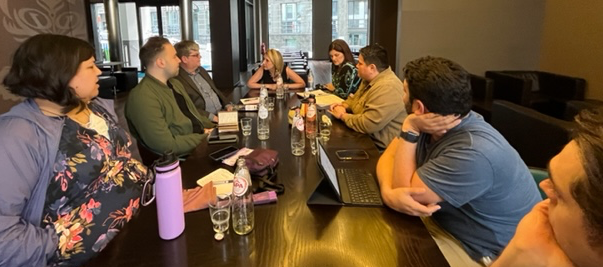
Ten American broadcast journalists arrived in Brussels on Monday for the start of a two-week RIAS Berlin Commission fellowship in Belgium and Germany. The radio and TV journalists from Oklahoma, South Dakota, Georgia, Utah, California, New York and Washington DC will be learning more about NATO and the European Union in meetings with NATO officials, defense policy experts and the EU until taking a two-hour train ride to Cologne on Thursday for meetings with senior German broadcasting journalists at WDR TV, RTL TV and NTV all-news network before meeting with the Cologne alumni chapter on Thursday evening.
After that they will take a four-hour train ride across the country to Berlin early on Friday for a full week’s worth of meetings with political leaders, leading German and American journalists in Berlin, think tanks, political scientists, Turkish community leaders, refugees from Syria and Ukraine who have settled in Berlin, take a tour of the Reichstag parliament building and US embassy officials.
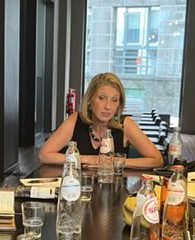
In Brussels, they got an introduction to NATO and life as a freelance foreign correspondent for NPR and Deutsche Welle from Teri Schultz, a RIAS alumni originally from New Mexico.
Schultz took part in a RIAS program in the late 1990s from New Mexico State University and ended up working in Finland for CNN. She later moved to Brussels and has carved out a niche as one of the most authoritative journalists covering NATO for Deutsche Welle and NPR.
The American journalists on the two-week RIAS Berlin Commission fellowship are:
Sheryl Worsley, News Director, KSL, Salt Lake City is Vice President of
Podcasting at Bonneville and KSL Podcasts in Salt Lake City, Utah. Worsley spent ”20 years in radio as a news director before concentrating full-time on podcasts. She manages the production of 25 original podcasts, including the investigative true crime hit COLD. Worsley serves on the Radio Television Digital News Association (RTDNA) board of directors.
Omar Atia, WNBC New York, NY is is the 5 p.m. producer for WNBC-TV in
New York City. A native New Yorker who still resides in Brooklyn, he started his career at NY1, a local TV news outlet in NYC, and has earned several prestigious honors, including a 2017 NY Press Club award and the 2021 duPont-Columbia University award for WNBC’s COVID-19 pandemic coverage.
Esther Ciammachilli, WAMU, Washington, D.C. is the local host of Morning
Edition on WAMU 88.5. Ciammachilli presents local news updates from the WAMU and D.C. news team, along with feature stories and conversations with newsmakers from around the Washington, D.C. region. She is a fan of sports and has won several regional Edward R. Murrow Awards for her coverage of sports-related stories.
Kevin King, Dakota News Now, Sioux Falls, SD is the News Director at Dakota News Now (KSFY/KDLT) in Sioux Falls, South Dakota. Before moving to
South Dakota, he was a newscast producer at KWCH in Wichita, Kansas, KSDK in St. Louis, and KTVT in Dallas/Fort Worth. He is a past president of the Midwest Broadcast Journalists Association. He currently serves as a regional vice president for the Upper Midwest Chapter of the National Academy of Television Arts & Sciences.
Brandon Benavides, NBC4, Washington, D.C. works as a content producer at NBC4 in Washington, D.C. He has field produced Emmy Award-winning broadcasts and teaches journalism at Georgetown University and the University of Maryland. His interest in supporting diversity in media led him to serve as
president of the National Association of Hispanic Journalists (2016-2018), and he is on the board ofSAG-AFTRA Washington – Mid-Atlantic Local. He graduated from American University with a Master of Arts in Communication: Journalism and Affairs, and earned his Bachelor of Arts from St. Edward’s University in Austin, Texas.
Matthew Gregory, WUSA9, Washington, D.C. is a Washington, D.C.-based reporter for WUSA9-the CBS affiliate. His career began as a sports producer in Baltimore for WBAL. His news-reporting career began at WTHI-TV in Terre Haute, Indiana, and then moved back across the country to report at WAVY-TV in Norfolk, Virginia. He has a special interest in crime & justice reporting, as well as tech and finance. He runs his own finance podcast called “Funance.
Andrea Gutierrez, NPR, Los Angeles, CA is a radio producer in Los Angeles and on the NPR podcast “It’s Been a Minute“. She has also worked on “Planet Money”. Her work has also appeared on “Code Switch”, “Alt.Latino”, “All Things Considered” and “Up First”. Her work has received awards and honors from the Podcast Academy, LA Press Club, NLGJA: The Association of LGBTQ Journalists, National Association of Hispanic Journalists, and the International Women’s Media Foundation. Gutierrez has a bachelor’s degree in German at Scripps College and MFA in creative nonfiction at the University of California, Riverside.
Scott Neuman, NPR, Washington, D.C. is a writer and editor for NPR, based in Washington, D.C. He focuses mainly on digital platforms, writing breaking
news and features. Previously, he worked as a Hong Kong-based editor and correspondent for The Wall Street Journal and as an editor at the Asia Desk of the Associated Press in Bangkok. He also worked in South Asia for United Press International.
Katherine Bennett, CNN International, Atlanta, GA is a news writer for CNN International and is based in Atlanta. She has worked for CNN since 2000
with career highlights there including an Emmy Award for 9/11 coverage, duPont-Columbia University Award for news coverage of Tsunami Disaster in South Asia, Peabody Award for news coverage of Hurricane Katrina and its aftermath. She shares all of these awards with the CNN Newsgroup.
Pam Ortega, Freelance Radio/TV Journalist, Oklahoma City, OK is a freelance journalist in Oklahoma City and a researcher for the Center for
Comparative Immigration Studies with UC-San Diego. She holds a master’s degree in Latin American Studies from UC-San Diego and bachelor’s degrees in journalism from the University of Oklahoma. She has worked with CNN, POLITICO, Bloomberg and ProPublica. Ortega has a special interest in immigration and spent time researching asylum in Southern California and in rural Georgia.
June 6, 2022
Good time had by all at annual RIAS Berlin Commission alumni party
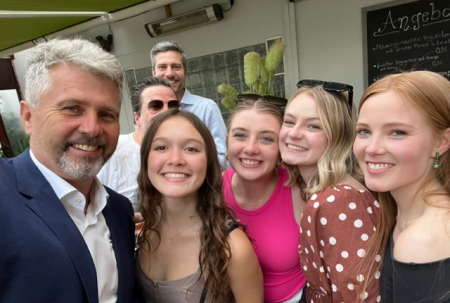 Schoeneberg quarter.
Schoeneberg quarter.
 After the hour-long panel discussion, the group migrated across the street from the historic RIAS building that is now the home of Deutschlandradio to the venerable Pusteblume restaurant/beer Garten for another rousing alumni reunion that didn’t want to end. A good time was had by all.
After the hour-long panel discussion, the group migrated across the street from the historic RIAS building that is now the home of Deutschlandradio to the venerable Pusteblume restaurant/beer Garten for another rousing alumni reunion that didn’t want to end. A good time was had by all.
June 6, 2022
Impressions from the RIAS Media Prize Awards ceremony
******
******
******
******
June 5, 2022
Claudia Roth speech at the RIAS Media Prize Awards ceremony
Germany’s Culture Minister Claudia Roth, who is the honorary co-chairwoman of the RIAS Berlin Commission along with Ambassador Amy Gutmann of the United States, gave a riveting speech on June 2 at the RIAS Media Prize Awards Ceremony. Roth, a member of parliament in the Greens party, paid tribute to the history of the RIAS radio and TV (Radio in American Sector) — as well as the American-style swing dance band playing, the Swingin’ Hermlins. The RIAS Berlin Commission was created 30 years ago by the German and United States’ governments as a non-profit binational organization to keep alive the spirit of the Cold War-era broadcasting company. RIAS went off the air after the peaceful conclusion of the East-West confrontation during the Cold War and some 
historians said RIAS played a role in helping to overcome those divisions.
“I am glad to be here tonight, even if only as a fleeting guest. But I certainly did not want to miss the moment to congratulate the award winners, to thank you for your work, which is so important for democracy, and to introduce myself to the Commission, of which I am now the honorary chair – together with you, dear Amy, which I am particularly looking forward to.
If something has grown, it is because it has taken root. This is also true for institutions from time to time. They grow together with the task and the people for whom they were made. They become indispensable. RIAS, the radio station in the American sector, was such an institution, more than a medium in the Cold War and more than a radio station. RIAS was, no, RIAS is a Berliner.
For a Berliner whom the Berliners themselves have chosen to be a Berliner is immortal. For that there are – Ernst Reuter, Marlene Dietrich, Willy Brandt, David Bowie – not many, but some role models!
So today we are not only celebrating the winners of the RIAS Media Prize. We are celebrating the idea that has remained: “A free voice of the free world”. This is what the RIAS-Berlin Commission was founded for 30 years ago. It has worked for this in three decades, with exchange programs and fellowships, with encounters, discussions and friendships.
We have reason to celebrate this idea. We should celebrate it, in the great 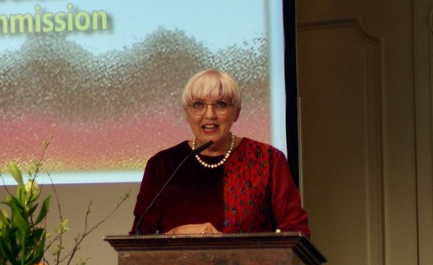 contributions of the laureates! We should celebrate it, because a free voice in a free world is the condition for our democratic culture.
contributions of the laureates! We should celebrate it, because a free voice in a free world is the condition for our democratic culture.
And for this very reason we should defend it where it is threatened – there is also reason to do so. Because thinking about the freedom of the word at all is a challenge at this time. The word itself is free; it gives everyone who uses it the freedom to use it as he pleases. Lying, too, is not subject to any fundamental prohibition.
That is why, I think, it has rarely been more important than today to understand how propaganda works. I deliberately do not say how it “functions,” because it works in very different ways, it is nimble, it works with the means of its time. It is a tactician. And if it works with supposedly clumsy means, that doesn’t mean that the technique it uses is also clumsy.
In our post-postmodern world, which is so confusing and complex, in which for so long one crisis follows another, one catastrophe follows another, it is not a matter of putting a lie into the world and then reproducing it again and again.
The propaganda we are confronted with today works with countless half-truths, with different versions of one and the same story. And this cacophony has only one goal: to make us believe that we cannot know anything, that no source can be trusted. We are supposed to distrust each other.
That’s why the work of journalists, is your work so important, indeed so absolutely indispensable. It is you who inquire, who question, who use your knowledge and experience to tell us what is happening and to classify what is difficult to understand.
Journalists are fallible too, yes. But to declare them lemmings in the mainstream follows exactly the intention I just described. The intention of fomenting distrust. Because without trustworthy reporting and commentary, we remain disoriented in a globalized world with so many crises. Without trust, there can be no democracy.
RIAS was also distrusted. I quote: “But you were an American-funded program. Was there freedom of speech?” Egon Bahr, editor-in-chief of RIAS in 1953, was asked by Deutschlandfunk Kultur in 2006. Or was the “free” word dictated to the station in the end?
Bahr replied that his colleagues at German stations envied him. I quote, “You can say whatever you want at RIAS; we have to be considerate of our supervisory bodies.” The only restriction, Bahr said, was that “we were not allowed to say that the American president is an idiot.”
In the time of its existence, RIAS had no occasion to do so.
We hear lies and half-truths in many languages, Russian, Chinese, even German and American English. But the idiom is the same: an inhuman and democracy-despising “Putinesisch” and “Trumpistisch”!
We have the duty to defend free voices for a free world.
And we want to do it. We want to do it directly and unbureaucratically by facilitating the entry and stay in Germany of persecuted and fled journalists, cultural workers and scientists from Russia and Belarus together and in coordination with the Foreign Ministry and the Ministry of the Interior. It is these voices that we hope for. And it is these free voices that we can hope for.
And we want to do that. We want to do it directly and unbureaucratically by making it easier for persecuted and fugitive journalists, cultural workers and scientists from Russia and Belarus to enter and stay in Germany, together and in coordination with the Foreign Ministry and the Ministry of the Interior. It is these voices that we hope for. And it is these free voices that we can hope for.
That’s why I want to put this topic on the agenda of the G7 Conference of Media Ministers in Bonn. We have to agree on it, because the propaganda war, like the real, cruel and brutal war against Ukraine, threatens democracies as forms of state and society – not only where there is already shooting. It threatens the free world.
In conclusion, I want to pick out just one of the many historical moments that RIAS not only reported on, but in which it itself made history. And I want to use it to remind ourselves of our duty not to abandon people who are being forced to give up their freedom and independence.
We ourselves, this city, were once in such a situation. The fate of 2.2 million Berliners depended on the help of the Americans, on their willingness not to give up the free part of Berlin. RIAS broadcast from the beginning of the blockade until its end, to which it contributed.
Today we have the duty to stand by the people of Ukraine.
Thank you all very much!
June 3, 2022
Successful restart for RIAS Media Prize Awards ceremony in Berlin
After a two-year absence due to the Covid-19 pandemic, the RIAS Media Prize Awards ceremony returned to the big stage in Berlin on Thursday with 17 prize winners from 2020, 2021 and 2022 being honored at a gala celebration moderated by Petra Gute in central Berlin. Below is a collection of pictures from the ceremony with keynote speakers Ambassador Amy Gutmann and Culture Minister Claudia Roth along with journalists and friends of RIAS who attended the anniversary event at the Französicher Dom in the heart of Berlin.
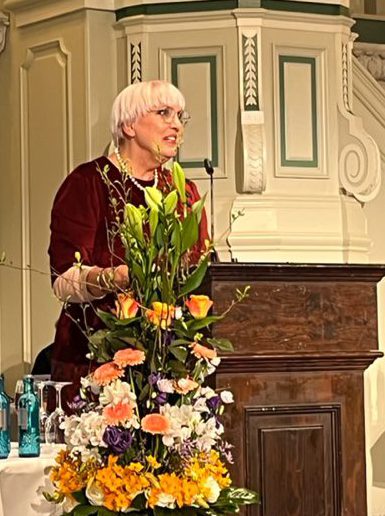
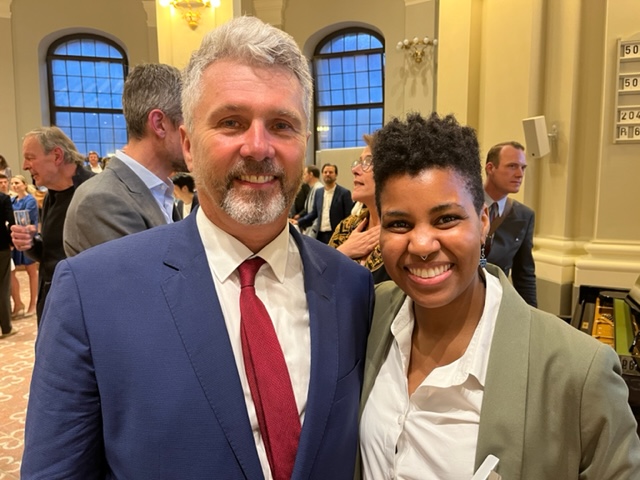
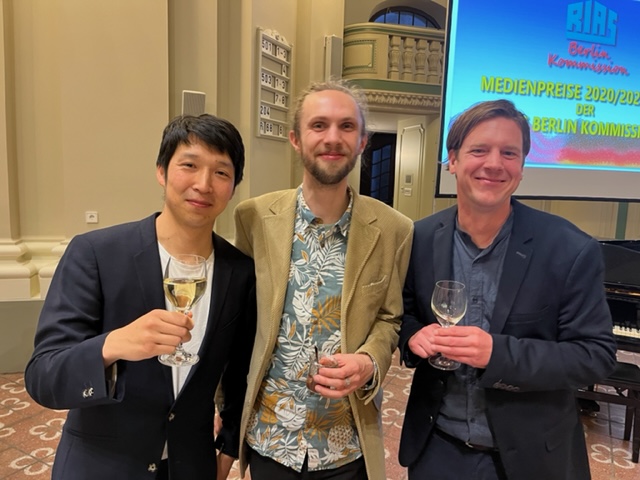
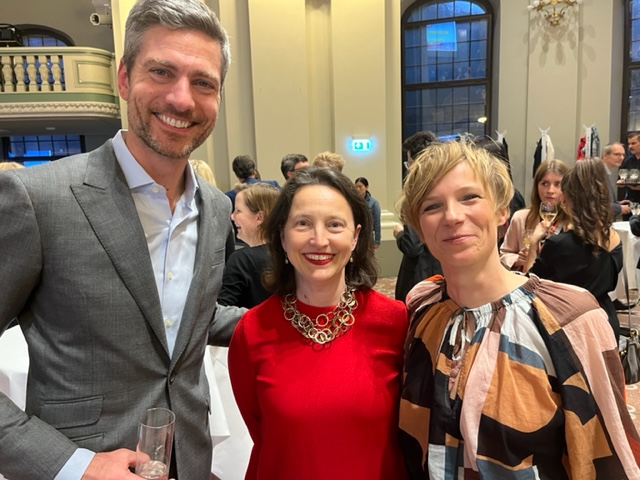
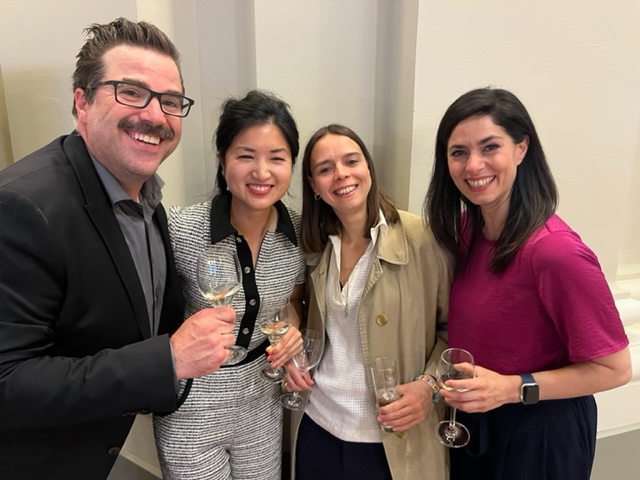
June 3, 2022
Gutmann, Roth pay tribute to RIAS at Media Prize ceremony
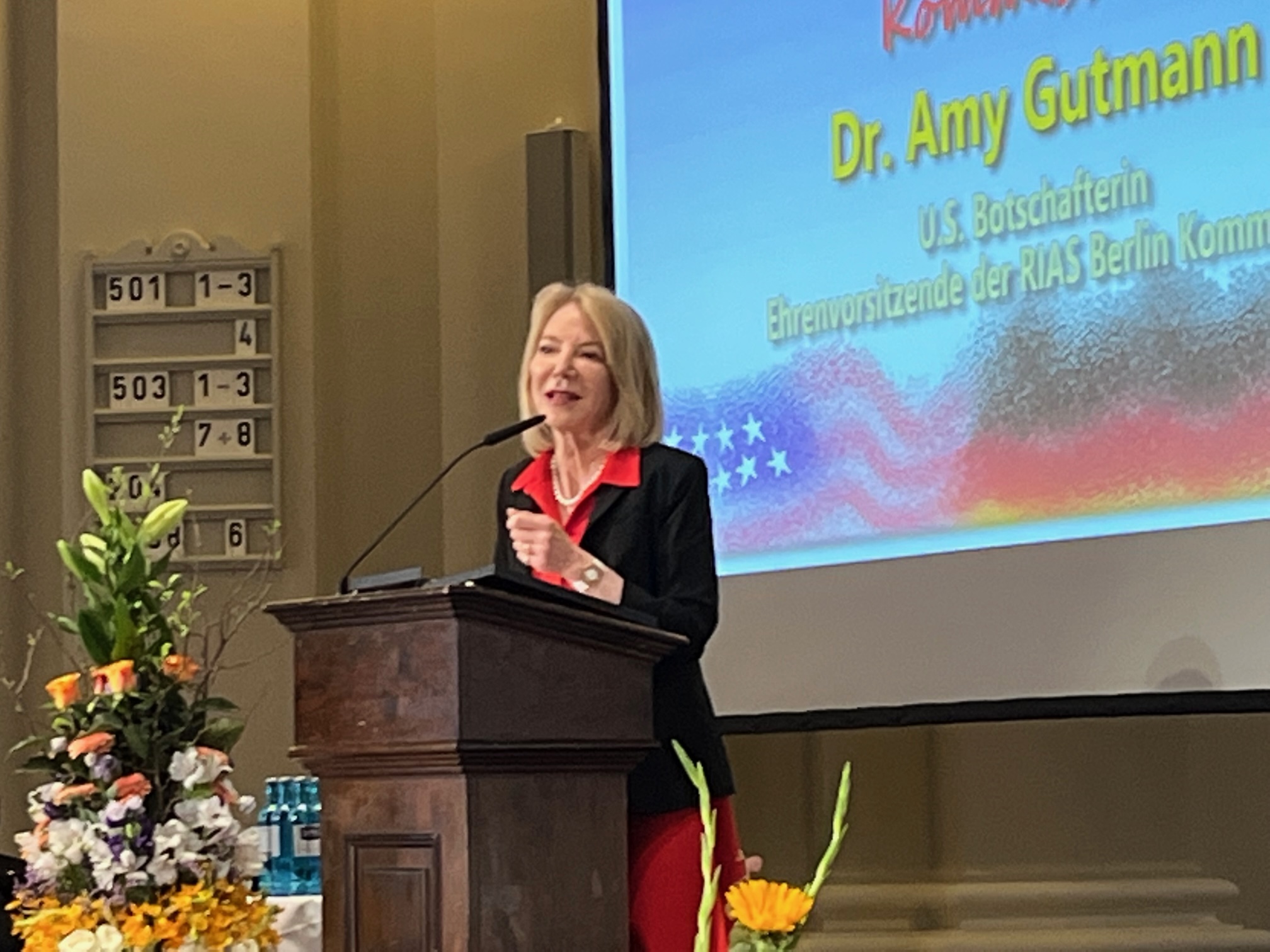
American Ambassador Amy Gutmann and German Culture Minister Claudia Roth paid tribute to the history of the RIAS (Radio in American Sector) radio and tv broadcast network based in West Berlin as a beacon of democracy and the “voice of the free world” that millions of Germans in Communist East Germany and West Berlin listened to during the Cold War-era — in speeches at a gala RIAS Media Commission awards ceremony moderated by Petra Gute in Berlin on Thursday evening in front of an audience of 200.
The two honorary chairwomen of the German-American RIAS Berlin Commission, which was founded 30 years ago to keep alive the spirit of the famous radio and TV station, both drew parallels between the war in Ukraine and its suppression of free speech and a free press to the decades-long work of RIAS in helping to overcome the Cold War divisions of Europe from the late 1940s through the end of the era with the fall of the Berlin Wall on November 9, 1989 — which precipitated the reunification of Germany less than a year later and the winding down of RIAS in 1993.
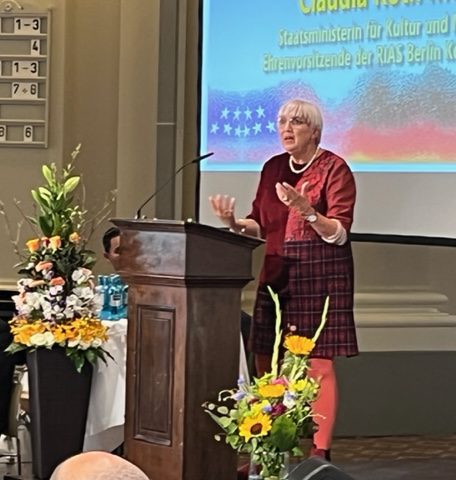
“As history shows, even in the most closed-down societies, ultimately one of the most difficult things for a tyrant to suppress is freedom of speech and the truth — it will get out,” Gutmann said in her address to the gathering of journalists, award-winners, board members and other dignitaries at the in the Französicher Dom in central Berlin.
“That the truth will get out is documented by the story of RIAS. Throughout the Cold War, RIAS was a thorn in the side of the government of the GDR (German Democratic Republic) and of the Soviet Union. Why? Because it was a source of honest news. It was also a source of great jazz, as you heard today, and great popular music. And some people tuned in for the music but they also heard the honest news. Millions of listeners in the east and west tuned in, yes for jazz and rock ‘n roll and entertainment and that also is important, but also for the truth. There was a crack in the wall. The journalists at RIAS helped to make history. They were always there, reporting live for all to hear. Let me tell you that is not only history, but that certainly is part of my personal history. Were it not for RIAS, were it not for the cracks in the wall, I would not be here to be standing here today.
Gutmann, whose father fled from his German hometown of Feuchtwangen at the the start of the Nazi-era as a 17-year-old 85 years ago, also paid tribute to the 17 RIAS Berlin Commission prize winners, who were selected by an independent German-American jury from competitions in 2020, 2021 and 2022. The gala ceremony had been postponed in 2020 and 2021 due to the Covid-19 pandemic.
Gutmann also said she was pleased to tell her German counterpart as honorary chairwoman of RIAS Berlin Commission, Claudia Roth, that the United States is doing all it can to restore and improve relations with Germany. She said it was important for the two countries to remain close allies. Gutmann also returned to the theme of journalism, saying a free press and free speech were vital for democracy. She called journalists “champions of democracy” who should never lose sight that responsible journalism help to build civilian and free societies.
“It is a great honor for me to be here…and so it is a great honor to join Claudia and be part of this wonderful profession, reporting on issues that matter for people on both sides of the Atlantic, and to say to you all, as President Biden has said: America is back. We are back with our German allies. And we are really honored and proud and I am personally honored ad proud to be here so thank you for that.”
June 2, 2022
Media Prize ceremony features on “Abendschau” local news broadcast
 The 2022 RIAS Media Prize awards ceremony on June 2 was featured in the RBB Abendschau news program on Thursday evening. Brief excerpts of keynote speeches from Ambassador Amy Gutmann of the United States and State Secretary Claudia Roth of the German government were included in the 35-second news segment of Berlin’s leading news show on Thursday evening that was aired before the ceremony even finished.
The 2022 RIAS Media Prize awards ceremony on June 2 was featured in the RBB Abendschau news program on Thursday evening. Brief excerpts of keynote speeches from Ambassador Amy Gutmann of the United States and State Secretary Claudia Roth of the German government were included in the 35-second news segment of Berlin’s leading news show on Thursday evening that was aired before the ceremony even finished.
You can see the news clip on this website. The story on the RIAS awards ceremony moderated by Petra Gute begins at the 29-second mark and runs to the 1:05-minute mark., https://www.rbb-online.de/abendschau/videos/20220602_1930/nachrichten_zwei.html
RIAS Berlin Commission celebrated its 30-year-anniversary with the first media prize awards ceremony since 2019 on Thursday. Both Gutmann and Roth are honorary chairwomen of the RIAS Berlin Commission, a German-American 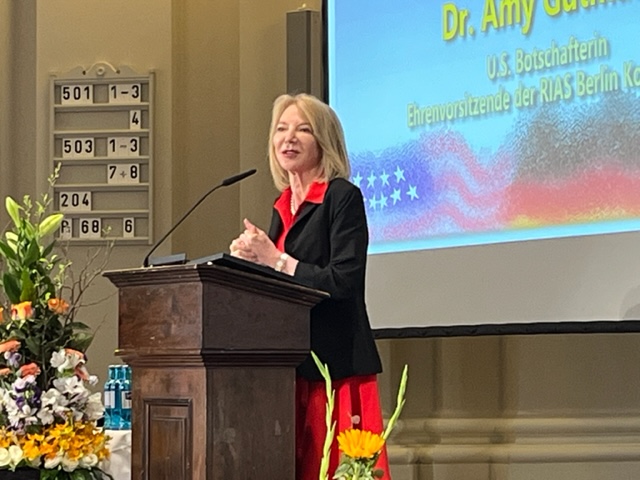 exchange program for broadcast journalists created 30 years ago with the goal of keeping alive the spirit of the RIAS Radio and TV broadcaster after they went off the air following the end of the Cold War.
exchange program for broadcast journalists created 30 years ago with the goal of keeping alive the spirit of the RIAS Radio and TV broadcaster after they went off the air following the end of the Cold War.
The Berlin newspaper Der Tagesspiegel published a story last week about the 30th anniversary of the RIAS Berlin Commission as well — noting that RIAS Berlin Commission was one of several institutions created in Berlin in the early 1990s after the end of the Cold War amid hopes in the once-divided German capital of cementing an American presence even after some 10,000 Allied troops who defended West Berlin’s freedom during the Cold War departed in 1992.
Here is a link to the story in Der Tagesspiegel: https://www.tagesspiegel.de/berlin/30-jaehriges-bestehen-der-rias-medienpreisverleihung-journalisten-in-berlin-fuer-beitrag-zur-deutsch-amerikanischen-verstaendigung-geehrt/28377662.html
June 1, 2022
Gutmann, Roth to speak at RIAS Media Prize awards ceremony
 Ambassador Amy Gutmann of the United States and State Secretary Claudia Roth of the German government will be the featured speakers at the 30th anniversary celebration of the Berlin RIAS Commission moderated by Petra Gute on Thursday evening in Berlin. Both are honorary chairwomen of the RIAS Berlin Commission, a German-American exchange program for broadcast journalists created 30 years ago with the goal of keeping alive the spirit of the RIAS Radio and TV broadcaster after they went off the air following the end of the Cold War.
Ambassador Amy Gutmann of the United States and State Secretary Claudia Roth of the German government will be the featured speakers at the 30th anniversary celebration of the Berlin RIAS Commission moderated by Petra Gute on Thursday evening in Berlin. Both are honorary chairwomen of the RIAS Berlin Commission, a German-American exchange program for broadcast journalists created 30 years ago with the goal of keeping alive the spirit of the RIAS Radio and TV broadcaster after they went off the air following the end of the Cold War.

The RIAS Media Prizes are awarded each year for outstanding broadcast stories aired in the United States or Germany that touch on transatlantic issues. The ceremony was last held in 2019 before the Covid-19 pandemic but juries continued to pick winners in 2020, 2021 and 2022 — all of whom will be honored on Thursday evening at a ceremony at the Französischer Dom in central Berlin. All of the winning entries from those three years have been reposted here on the www.riasberlin.org website.
About 180 guests are expected for the ceremony that will also pay tribute to 30 years of RIAS Berlin Commission exchange programs. Nearly 1,800 journalists have taken part in the one- to three-week long fellowship in each other’s countries — 900 Americans and 900 Germans. Many of the top broadcast journalists in both Germany and the United States have taken part in RIAS fellowships or have won the RIAS Media Prize — including Bill Whitaker, Claus Kleber, Peter Kloeppel, Tom Buhrow, Ingo Zamperoni and Jan-Phillipp Burgard.
The first 60 minutes of Thursday’s ceremony will be livestreamed on the Facebook page of the American Swing Dance Band that will be playing music for the first 30 minutes and then throughout the evening. Please see Andrej Hermlin’s Facebook page starting at 6 pm CET (1200 EST) to follow the introductory music and speeches from Amy Gutmann and Claudia Roth.

For more information about the RIAS Berlin Commission or the fellowship, please write info@riasberlin.org
June 1, 2022
Faltin wins RIAS TV prize for story on GIs in post-war West Germany
Sigrid Faltin won the RIAS Media Prize Best TV award in 2022 for her report on the history of the lives of African American soldiers stationed in West Germany in the early decades after World War II who were living alongside and with West Germans called “Ein Hauch von Amerika – die Doku“ or “A Touch of America — the documentary film”. It was a documentary film that was broadcast at the end of a fictionalized four part-series about a small West Germany town near a major US military base after the war and during the early years of the Cold War. It aired on December 21, 2021. The documentary explored the racism that American GIs sometimes experienced in the small West German towns.
This is what the jury had to say about her story: Just when it seemed that just about everything was already known about the post-war history of American GIs in West Germany, Sigrid Faltin and her colleagues have delivered a stirring, fascinating and at times even disturbing look into little-known aspects about life in small West German towns after the United States armed forces arrived — first as occupation forces and then as allies during the Cold War. The documentary uses archival footage and interviews with women who fell in love with and had children with American soldiers to explore their special hardships.
Here is a link to her story: https://www.ardmediathek.de/video/ein-hauch-von-amerika/ein-hauch-von-amerika-dokumentation-s01-e07/das-erste/Y3JpZDovL2Rhc2Vyc3RlLmRlL2Vpbi1oYXVjaC12b24tYW1lcmlrYTEvOTdmNjE5MzctZDk1Zi00MzA0LWJlZmEtYzhmNzUzNGJhOTY5
The binational RIAS Berlin Commission jury was made up of five distinguished journalists from the United States and Germany: Co-chair Michael Gargiulo (WNBC TV, New York, USA), Co-chair Anja Heyde (ZDF/MDR, Berlin/Magdeburg, Germany), Helge Fuhst (ARD, Hamburg, Germany), Yami Virgin (Fox 29, San Antonio, Texas, USA), Christian Wilp (NTV/RTL, Berlin, Germany), Melissa Eddy (The New York Times, Berlin, USA)
The RIAS Berlin Commission is celebrating its 30th anniversary this year. The RIAS Media Prize ceremony will be held for the first time since in 2019. The Covid-19 pandemic forced the cancellation of the annual awards ceremony in 2020 and 2021. An independent jury of journalists continued to pick winners in the television, radio and digital categories for German-American exchange program.
May 31, 2022
Moving Balzer story on NY emerging from pandemic wins Fellow Prize
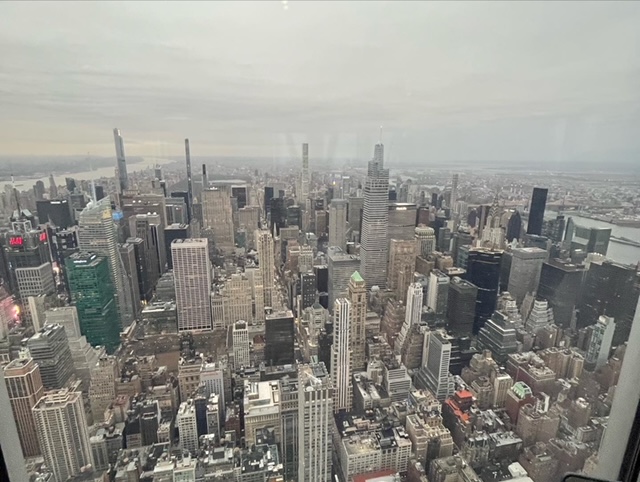 Vladimir Balzer, a radio journalist at Deutschlandradio and RIAS alumni, won the RIAS Media Prize for best fellow award in 2022 for his story on New York City’s emergence from the difficult times in the Covid-19 pandemic called: “New York is züruck — eine Stadt befreit sich aus der Pandemic” (New York is back – a city liberates itself from the pandemic).
Vladimir Balzer, a radio journalist at Deutschlandradio and RIAS alumni, won the RIAS Media Prize for best fellow award in 2022 for his story on New York City’s emergence from the difficult times in the Covid-19 pandemic called: “New York is züruck — eine Stadt befreit sich aus der Pandemic” (New York is back – a city liberates itself from the pandemic).
Balzer, who is one of the alumni chapter leaders in Berlin, worked on the story during a RIAS Berlin Commission short-program for alumni in October 2021 with about 30 other alumni from Germany on a special one-week program. It aired on November 8, 2021 on Deutschlandfunk’s prime-time morning news show listened to by millions of Germans every morning.
This is what the jury had to say about his story: In his riveting story about New York City gradually coming back to life after the devastation of the Covid-19 pandemic, Vladimir Balzer takes Deutschlandfunk listeners on a heart-warming tour of the city that is so hungry for a return to normalcy in the fall of 2021 just before the United States reopened its gates for visitors from the European Union. Important voices through illuminating interviews with idled Broadway actors, American journalists stuck working only from home, badly ailing 9/11 heroes, and lonely Germans stranded in Manhattan are included in this short-but-sweet journalistic masterpiece put together during a RIAS fellowship program.
https://www.deutschlandfunkkultur.de/usa-lockert-einreisebeschraenkungen-new-york-ist-zurueck-100.html
The RIAS Berlin Commission is celebrating its 30th anniversary this year. The RIAS Media Prize ceremony will be held for the first time since in 2019. The Covid-19 pandemic forced the cancellation of the annual awards ceremony in 2020 and 2021. An independent jury of journalists continued to pick winners in the television, radio and digital categories for German-American exchange program.
May 31, 2022
Deutschlandfunk story on NY in pandemic times wins Radio Prize
Thomas Reintjes and Matthias Röckl won the RIAS Media Prize for best radio story award in 2022 for their story on New York City’s struggles to cope with the impact of the Covid-19 pandemic called: “Fear of Losing New York – Auf der Suche nach einer verschwundenen Stadt“ that was aired on Deutschlandfunk and SWR on March 16, 2021.
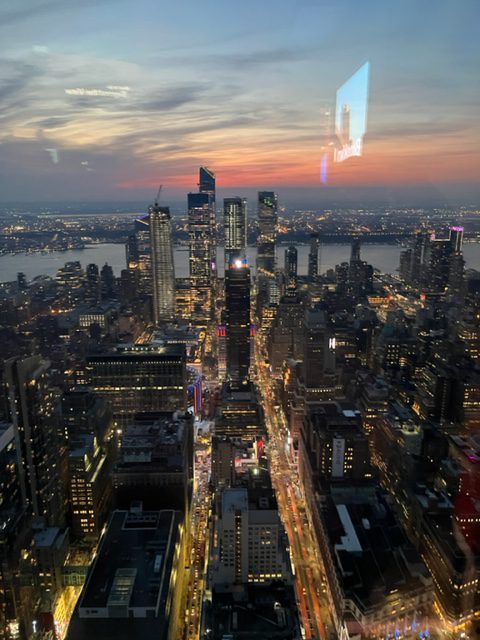 Here is what the jury said about their story: After Covid-19 shut down the city that never sleeps, left its normally vibrant Broadway theaters dark, forced the myriad of small shops and its famously rich variety of restaurants into a fight for survival, journalists Thomas Reintjes and Matthias Röckl went out with a recording device to explore and describe New York in a touching, moving and memorable way. Their story “Fear of Losing New York” is a remarkable piece of radio journalism that uses creative techniques and informal spontaneous discussions to paint a picture of a city that is reeling.
Here is what the jury said about their story: After Covid-19 shut down the city that never sleeps, left its normally vibrant Broadway theaters dark, forced the myriad of small shops and its famously rich variety of restaurants into a fight for survival, journalists Thomas Reintjes and Matthias Röckl went out with a recording device to explore and describe New York in a touching, moving and memorable way. Their story “Fear of Losing New York” is a remarkable piece of radio journalism that uses creative techniques and informal spontaneous discussions to paint a picture of a city that is reeling.
Here is a link to their story: https://www.hoerspielundfeature.de/auf-der-suche-nach-einer-verschwundenen-stadt-fear-of-100.html
The RIAS Berlin Commission is celebrating its 30th anniversary this year. The RIAS Media Prize ceremony will be held for the first time since in 2019. The Covid-19 pandemic forced the cancellation of the annual awards ceremony in 2020 and 2021. An independent jury of journalists continued to pick winners in the television, radio and digital categories for German-American exchange program.
May 30, 2022
The Daily from NYT wins RIAS Prize for series on far right in Germany
Katrin Bennhold, Clare Toeniskoetter and a team of journalists at The Daily, a podcast at The New York Times, won the RIAS Media Prize for best digital award in 2022 for their five-part series “Day X” on far-right infiltration in the German military that was aired between May 28 and June 24, 2021. The jury was impressed with the series and praised The Daily team for the “powerful series” of podcasts that also became the basis for a series of articles in The New York Times. Bennhold was the host, while Toeniskoetter was the senior producer along with her fellow senior producers Lynsea Garrison and Kaitlin Roberts. The series was edited by Larissa Anderson and Mike Benoist.
Here’s what the jury said about the series: Making the most of its cutting-edge style of podcast journalism and its profound investigative prowess, The Daily has put together a powerful series of stories that sheds light on a secretive nationwide network of far-right extremists who were operating under the radar inside Germany’s military and police forces. The series of stories that also served as the basis of newspaper articles in The New York Times is a sterling example of outstanding investigative journalism.
The RIAS Berlin Commission is celebrating its 30th anniversary this year. The RIAS Media Prize ceremony will be held for the first time since in 2019. The Covid-19 pandemic forced the cancellation of the annual awards ceremony in 2020 and 2021. An independent jury of journalists continued to pick winners in the television, radio and digital categories for German-American exchange program.
1, Shadow Army?: https://www.nytimes.com/2021/05/28/podcasts/the-daily/day-x-part-1-shadow-army.html
2, In the Stomach: https://www.nytimes.com/2021/06/03/podcasts/day-x-franco-a-german-extremism.html
3, Blind Spot 2.0: https://www.nytimes.com/2021/06/10/podcasts/day-x-germany-neo-nazi-franco-a.html
4, Franco A: https://www.nytimes.com/2021/06/16/podcasts/franco-a-trial-germany-terrorism.html
5, Defensive Democracy: https://www.nytimes.com/2021/06/24/podcasts/franco-a-trial-afd-germany.html
May 29, 2022
Deutsche Welle wins RIAS Digital Prize for hard look at US sports
Deutsche Welle’s Janek Speight won the 2021 RIAS Media Prize award for best digital story for his thought-provoking comparison of US professional leagues vs European professional soccer, and puts forward an interesting argument: “Why US sports are more socialist than European football.”
The jury praised Speight: “He has succeeded in creating an unusual, attention-grabbing look at the routines of professional sports on both sides of the Atlantic. A cheeky inversion of clichés, a social media-friendly and brilliant comparison of the incomparable. He discovers almost “socialist” aspects in American sports – with its revenue sharing, salary caps and draft system – and he contrasts those with a rather brutal selfishness of big money in Europe. His YouTube contribution for Deutsche Welle combines tongue-in-cheek levity with serious analysis. A triumphant piece of transatlantic journalism.”
The RIAS Berlin Commission is celebrating its 30th anniversary this year. The RIAS Media Prize ceremony will be held for the first time since in 2019. The Covid-19 pandemic forced the cancellation of the annual awards ceremony in 2020 and 2021. An independent jury of journalists continued to pick winners in the television, radio and digital categories for German-American exchange program.
May 27, 2022
Burgard wins inaugural RIAS Media “Grand Prize” in 2022
Jan Phillip Burgard, the editor-in-chief of WeltTV and a prolific German author of books about the United States, won the 2022 “Grand Prize” of the RIAS Berlin Commission for his moving story of a German family whose son was killed in the 9/11 attacks on the World Trade Center and their connection with their son’s now-20-year-old son — who never met his father. The story also chronicles the family’s fight to have a memorial in Germany for the numerous German victims of the 9/11 attacks — a tireless effort that ultimately leads to the installation of a piece of the World Trade Center steel being displayed as a memorial for the German victims in the courtyard of the US Embassy in Berlin. Burgard was a Washington, DC correspondent for the ARD news network from 2016 to 2021.
The RIAS Berlin Commission is celebrating its 30th anniversary this year. The RIAS Media Prize ceremony will be held for the first time since in 2019. The Covid-19 pandemic forced the cancellation of the annual awards ceremony in 2020 and 2021. An independent jury of journalists continued to pick winners in the television, radio and digital categories for German-American exchange program.
May 23, 2022
RIAS Media Prize – Michael Groth from Deutschlandradio
In 2021, the RIAS Media Prize Jury honored Michael Groth for his series of outstanding in-depth features on music in the United States for more than 15 years at Deutschlandradio/Deutschlandfunkkultur. His entry in the 2021 competition “Songs of Love and Protest – the return of political songs in the USA” was a splendid long-form story that epitomized Groth’s work spanning more than a decade to inform Germans about trends in American music. Here is his report “Songs of Love and Protest – Wiederkehr des politischen Liedes in den USA“ that aired on October 30: https://www.deutschlandfunkkultur.de/die-wiederkehr-des-politischen-liedes-in-den-usa-songs-of.3780.de.html?dram:article_id=486565
The RIAS Media Prize ceremony will be held for the first time since in 2019. The Covid-19 pandemic forced the cancellation of the annual awards ceremony in 2020 and 2021. An independent jury of journalists continued to pick winners in the television, radio and digital categories for German-American exchange program.
May 22, 2022
RIAS Media Prize “Next Generation Prize” in 2021
The RIAS Media Prize Jury created a special new category for the 2021 Media Prize Competition — The “Next Generation Prize”. It was awarded to Anna Ellmann and Maximilian Osenstätter of Bayerischer Rundfunk for their “News WG” – series of Instagram stories about political issues for BR (Bayerischer Rundfunk) https://www.instagram.com/news_wg/channel/?hl=de
The RIAS Media Prize ceremony will be held for the first time since in 2019. The Covid-19 pandemic forced the cancellation of the annual awards ceremony in 2020 and 2021. An independent jury of journalists continued to pick winners in the television, radio and digital categories for German-American exchange program.
May 21, 2022
RIAS Media Prize best radio story 2020 – Wiebke Keuneke
Wiebke Keuneke won the RIAS Media Prize for best radio in 2020 for her story “Jenseits des American Dream – deutsche Sozialarbeiter unterwegs in den USA“ that was aired on the SWR network. In this radio report she accompanied 12 Berlin social workers on their journey to Chicago and Detroit. She recorded the critical, often skeptical and sometimes shocked impressions that the encounters with the reality of American social work led to.
The RIAS Media Prize ceremony will be held in Berlin in early June for the first time since in 2019. The Covid-19 pandemic forced the cancellation of the annual awards ceremony in 2020 and 2021. An independent jury of journalists continued to pick winners in the television, radio and digital categories for German-American exchange program. A total of 17 winners from all three years 2020, 2021 and 2022 will be honored at the ceremony.
May 20, 2022
RIAS Media Prize Winners — Best Digital Video 2020 to NDR in Germany
David Diwiak and Han Park of youth-oriented NDR online-channel STRG_F won a RIAS Media Prize award in 2020 for the best Digital Video for their story that explored the growing market for and appeal of meat replacements, both natural and man-made. From its very first moments, the video report “Fleischersatz: Veggie vs. Labor?” captivated the independent jury with its energy and attitude.
Eating their way through many mouthfuls in the process, the team manages to shed light on the science, business, and ethics of cultured meat, as well as the differing views in Germany and the US when it comes to genetically modified foods. What starts as a humorous taste test quickly evolves into a well-thought out exploration of the current meat alternative offerings, and those soon to come via technological innovations. Interviews, animation, a deep dive into the Californian fake meat start-up scene, and other research are all used with excellent effect, leaving the jury hungry for more from this clever duo of young journalists.
The RIAS Media Prize Ceremony will be held in Berlin in early June for the first time since in 2019. The Covid-19 pandemic forced the cancellation of the annual awards ceremony in 2020 and 2021. An independent jury of journalists continued to pick winners in the television, radio and digital categories for German-American exchange program. A total of 17 winners from all three years 2020, 2021 and 2022 will be honored at the ceremony.
RIAS Media Prize Winners — Best Digital Video 2020 goes to NDR in Germany
May 19, 2022
RIAS Media Prize Winners: Whitaker and “60 Minutes” on prison reform
CBS News’ “60 Minutes” and correspondent Bill Whitaker won the RIAS Media Prize once again in 2020 for their stirring report about prison reforms being enacted in Connecticut and how those reforms were inspired in part by looking across the Atlantic at Germany, the country’s treatment of prisoners and the emphasis placed on rehabilitation.
Below is a segment from the story aired in 2019 that the RIAS Media Prize Germany picked in 2020 as the Best TV story of the year. It was Whitaker’s second RIAS Media Prize in three years after a related story he did looking at German prisons won the 2017 RIAS Media Prize.
The RIAS Media Prize ceremony will be held in Berlin in early June for the first time since in 2019. The Covid-19 pandemic forced the cancellation of the annual awards ceremony in 2020 and 2021. An independent jury of journalists continued to pick winners in the television, radio and digital categories for German-American exchange program. A total of 17 winners from all three years 2020, 2021 and 2022 will be honored at the ceremony.
May 19, 2022
RIAS Media Prize Winners 2020-2022 — links to honored stories
The RIAS Media Prize Ceremony will be held in Berlin in early June for the first time since in 2019. The Covid-19 pandemic forced the cancellation of the annual awards ceremony in 2020 and 2021. Nevertheless, an independent jury of journalists continued to pick winners in the television, radio and digital categories for German-American journalism. A total of 17 winners from all three years 2020, 2021 and 2022 will be honored at the ceremony.
Here is the first in the series of winners that RIAS will be posting here on the www.riasberlin.org website. The 2019 report for several TV networks in Texas was done by Monica Quintero and David Wagner during their RIAS Berlin Commission fellowship, including interviews with far-right leaders such as Beatrix von Storch from the AfD party, Syrian refugee Faris Zakri, Deutsche Welle correspondent Frank Hoffmann, and New York Times correspondent Melissa Eddy. Their story won the “Best Fellow Award” in 2020.
May 3, 2022
Washington DC alumni chapter meets Goethe Institut
The Washington DC alumni chapter of the RIAS Berlin Commission had a get-together with the Goethe Institut in Washington recently at which American journalists and some of the staff of the Goethe Institut had the chance to talk about a variety of issues.
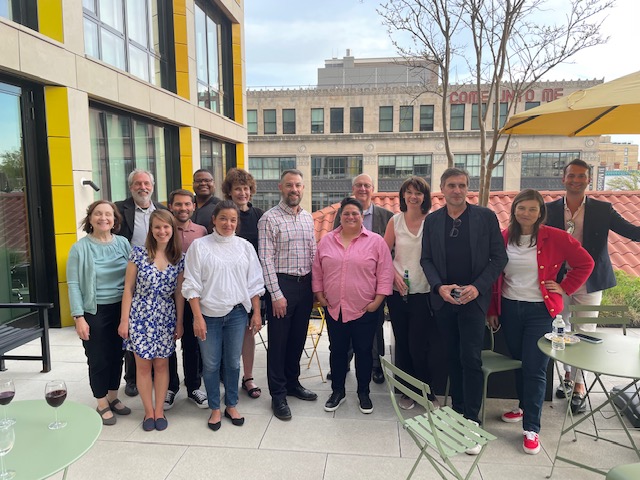
The group was welcomed for the rooftop gathering by Goethe Institut Director Andreas Ströhl and WUSA9 reporter/anchor Larry Miller — the RIAS Berlin Commission chapter leader in Washington DC.
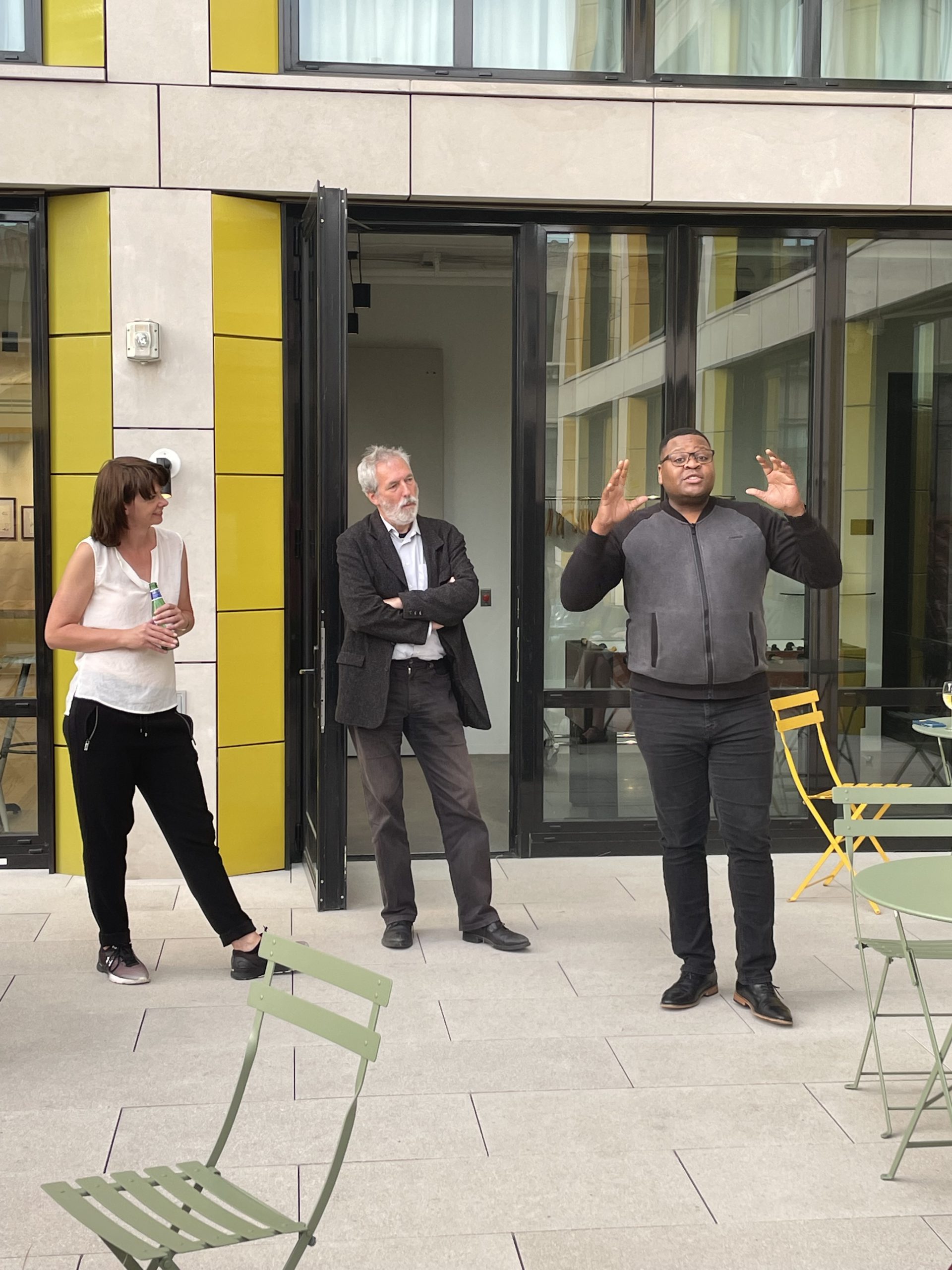 Verena Hütter, Director of Information Services North America Goethe-Institut Washington, helped host the event with the RIAS alumni and said the event included a “Learn German in 15 minutes class” with Goethe’s German teacher Paul Perterer — the lesson was a special treat for the American journalists.
Verena Hütter, Director of Information Services North America Goethe-Institut Washington, helped host the event with the RIAS alumni and said the event included a “Learn German in 15 minutes class” with Goethe’s German teacher Paul Perterer — the lesson was a special treat for the American journalists.
“We had the very best time ever with our RIAS friends – amazing people and journalists who’ve been to Germany with RIAS or who will head to Germany with RIAS this year,” Hütter said. “Our dear RIAS friends are always welcome to join us on our rooftop terrace at the Goethe-Institut in Washington. After this unforgettable Happy Hour, my heart was full from all of the wonderful conversations with these extraordinary people who keep the German-American friendship strong.”
The Goethe Institut and the RIAS Berlin Commission have been working together in recent years on the Big Ponder series. RIAS alumni have been among the contributors to the award-winning podcast series. Please write to: info@riasberlin.org for more information on the Big Ponder.
April 15, 2022
Impressions from German Students on ERP Program to the United States
A group of 15 journalism students and young journalists took part in a newly created three-week fellowship to the United States in March and April. The students, 10 of whom were on their first trip to the United States, spent a week together in New York meeting with American journalists, local and state political leaders such as New Jersey Gov. Phil Murphy, political activists such as Black Lives Matter leader Chivone Newsome, newsmakers like best-selling author and former Donald Trump lawyer Michael Cohen, community leaders, sports figures such as Jürgen Klinsmann and organizations such as the Anti-Defamation League and its director Scott Richman that works to stop hate crimes.
The German journalists also visited the NBC, Bloomberg and Vice newsrooms, the Abyssinian Baptist Church in Harlem and the Hasidic Jewish section of Williamsburg, Brooklyn. The German students, nine of whom are based in eastern Germany states, then visited eight different universities in the Midwest and Southwest for two weeks to learn more about journalism training and campus life in the heartland states of the United States: University of Oklahoma, Texas A&M, New Mexico State University, Arizona State University, Indiana University, Southern Illinois University, University of Wisconsin-Oshkosh and University of Minnesota.
The ERP program was created with support from the Transatlantic Program of the Federal Republic of Germany and was funded by the European Recovery Program (ERP) of the Federal Economy and Energy (BMWi) Ministry. Here are the impressions of the three-week program from the students:
Lara Jäkel, Free University Berlin (Texas A&M)
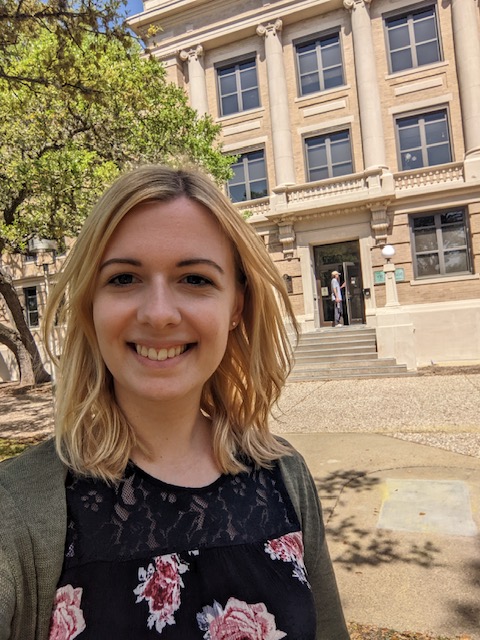 If I had to name one take-away from the countless impressions of the RIAS program, it would be the enormous diversity of the United States. During our meetings and conversations in New York, we learned about the different perspectives and ideas that each of the guest speakers like Black Lives Matter NYC founder Chivona Newsome or former Trump lawyer Michael Cohen brought to the table. Along the way, we explored many parts of the city – from Harlem to the Hasidic Jewish quarter in Brooklyn – getting a sense of their very own history and characteristics. These experiences alone would have been enough to talk about for weeks – but the program had only just started. Leaving the hustle and bustle of the Big Apple behind, a nine-hour trip took me to College Station, Texas. Compared to New York, things couldn’t have been more different: Not to reinforce clichés, but the first thing I heard at the airport was actually “Howdy”, spoken by a man wearing a cowboy hat. There is not a single building that is higher than three stories in College Station, and don’t hold your breath waiting for public transport… What fascinated me most about the town, though, was the sense of community emanating from this place and its residents. From celebrating their (very successful) sports teams to gene-modifying carrots to make them maroon (Texas A&M’s signature color) instead of orange, the “Aggies” are definitely serious about their school spirit. And even in this seemingly small and homogenous place, the opinions I heard ranged from die-hard conservatism to liberal and progressive views. Considering that I have only been to two of the 50 + 1 states, this at least gives a hint at how much diversity can be found in the United States.
If I had to name one take-away from the countless impressions of the RIAS program, it would be the enormous diversity of the United States. During our meetings and conversations in New York, we learned about the different perspectives and ideas that each of the guest speakers like Black Lives Matter NYC founder Chivona Newsome or former Trump lawyer Michael Cohen brought to the table. Along the way, we explored many parts of the city – from Harlem to the Hasidic Jewish quarter in Brooklyn – getting a sense of their very own history and characteristics. These experiences alone would have been enough to talk about for weeks – but the program had only just started. Leaving the hustle and bustle of the Big Apple behind, a nine-hour trip took me to College Station, Texas. Compared to New York, things couldn’t have been more different: Not to reinforce clichés, but the first thing I heard at the airport was actually “Howdy”, spoken by a man wearing a cowboy hat. There is not a single building that is higher than three stories in College Station, and don’t hold your breath waiting for public transport… What fascinated me most about the town, though, was the sense of community emanating from this place and its residents. From celebrating their (very successful) sports teams to gene-modifying carrots to make them maroon (Texas A&M’s signature color) instead of orange, the “Aggies” are definitely serious about their school spirit. And even in this seemingly small and homogenous place, the opinions I heard ranged from die-hard conservatism to liberal and progressive views. Considering that I have only been to two of the 50 + 1 states, this at least gives a hint at how much diversity can be found in the United States.
Daniel Heyd, ntv/RTL Journalism School (University of Oklahoma) It was an indescribably eventful time. Three weeks full of impressions and one highlight followed the next every day. When I think back, it is unbelievable what was on the program, how many interesting spots and people were visited and how many exciting conversations were held. Sometimes it was lunch with Michael Cohen, then visits to the editorial offices of ARD from Bloomberg and Vice. The first five days in New York already provided a very detailed insight into the media landscape of the USA and the mentality of the people. Then it was off to Oklahoma and the impressions overflowed. Seminars at the University of Oklahoma in Norman, trips to the Cherokee Nation in Tahlequah, an afternoon with the homicide squad in Tulsa, a meeting with the mayor of Oklahoma City, a visit to a regional high school and various meetings with local journalists at their TV stations. Oklahoma impressed me not only because of its indescribable hospitality, but also because of its diversity. The people, the history, the landscape and the culture were brought closer to me from day to day. A detailed insight into the Midwest that I would never have gotten either as a tourist or as a journalist. It was in all an indescribable time. Every day I spent in the U.S., whether on the East Coast or in the Midwest, brought me closer to the local people, broadened my horizons tremendously, and helped me learn about and better understand the country. I will forever be grateful to RIAS for this opportunity and becoming part of the RIAS network through it. The program and the contacts made will have a great impact on my personal and professional life – if they haven’t already.
followed the next every day. When I think back, it is unbelievable what was on the program, how many interesting spots and people were visited and how many exciting conversations were held. Sometimes it was lunch with Michael Cohen, then visits to the editorial offices of ARD from Bloomberg and Vice. The first five days in New York already provided a very detailed insight into the media landscape of the USA and the mentality of the people. Then it was off to Oklahoma and the impressions overflowed. Seminars at the University of Oklahoma in Norman, trips to the Cherokee Nation in Tahlequah, an afternoon with the homicide squad in Tulsa, a meeting with the mayor of Oklahoma City, a visit to a regional high school and various meetings with local journalists at their TV stations. Oklahoma impressed me not only because of its indescribable hospitality, but also because of its diversity. The people, the history, the landscape and the culture were brought closer to me from day to day. A detailed insight into the Midwest that I would never have gotten either as a tourist or as a journalist. It was in all an indescribable time. Every day I spent in the U.S., whether on the East Coast or in the Midwest, brought me closer to the local people, broadened my horizons tremendously, and helped me learn about and better understand the country. I will forever be grateful to RIAS for this opportunity and becoming part of the RIAS network through it. The program and the contacts made will have a great impact on my personal and professional life – if they haven’t already.
Emma Matthea Lübbert, University of Leipzig (University Wisconsin-Oshkosh)


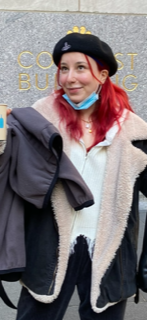 The first thing I did after arriving back in Germany was look up flights to New York City. Although the RIAS experience left me speechless, all I could think about was going back. From the VIP tour of the Empire State Building to visits at VICE, CBS, Bloomberg and ARD – our time in New York was even better than I imagined in the last two years. Every day was a new learning experience, mixed with fun in local bars and restaurants in the evenings. Even though getting up at 7 in the morning felt wrong on some days, every minute of the program was worth it and a once in a lifetime experience. We were blessed with amazing speakers all over the political spectrum and got a real insight in how journalism and politics work in the USA. Even though I was sad to leave the big apple, my time in Oshkosh, Wisconsin, was just as enjoyable. Thanks to our amazing and lovely hosts – Joel Waldinger and Barb Benish – our experience in Wisconsin was a delightful experience. I will never forget my time in the states with RIAS.
The first thing I did after arriving back in Germany was look up flights to New York City. Although the RIAS experience left me speechless, all I could think about was going back. From the VIP tour of the Empire State Building to visits at VICE, CBS, Bloomberg and ARD – our time in New York was even better than I imagined in the last two years. Every day was a new learning experience, mixed with fun in local bars and restaurants in the evenings. Even though getting up at 7 in the morning felt wrong on some days, every minute of the program was worth it and a once in a lifetime experience. We were blessed with amazing speakers all over the political spectrum and got a real insight in how journalism and politics work in the USA. Even though I was sad to leave the big apple, my time in Oshkosh, Wisconsin, was just as enjoyable. Thanks to our amazing and lovely hosts – Joel Waldinger and Barb Benish – our experience in Wisconsin was a delightful experience. I will never forget my time in the states with RIAS.
Rieke Smit, University of Applied Sciences Magdeburg-Stendal (New Mexico State University)
I’ve gained so much experience in a short amount of time that I’m still processing it. 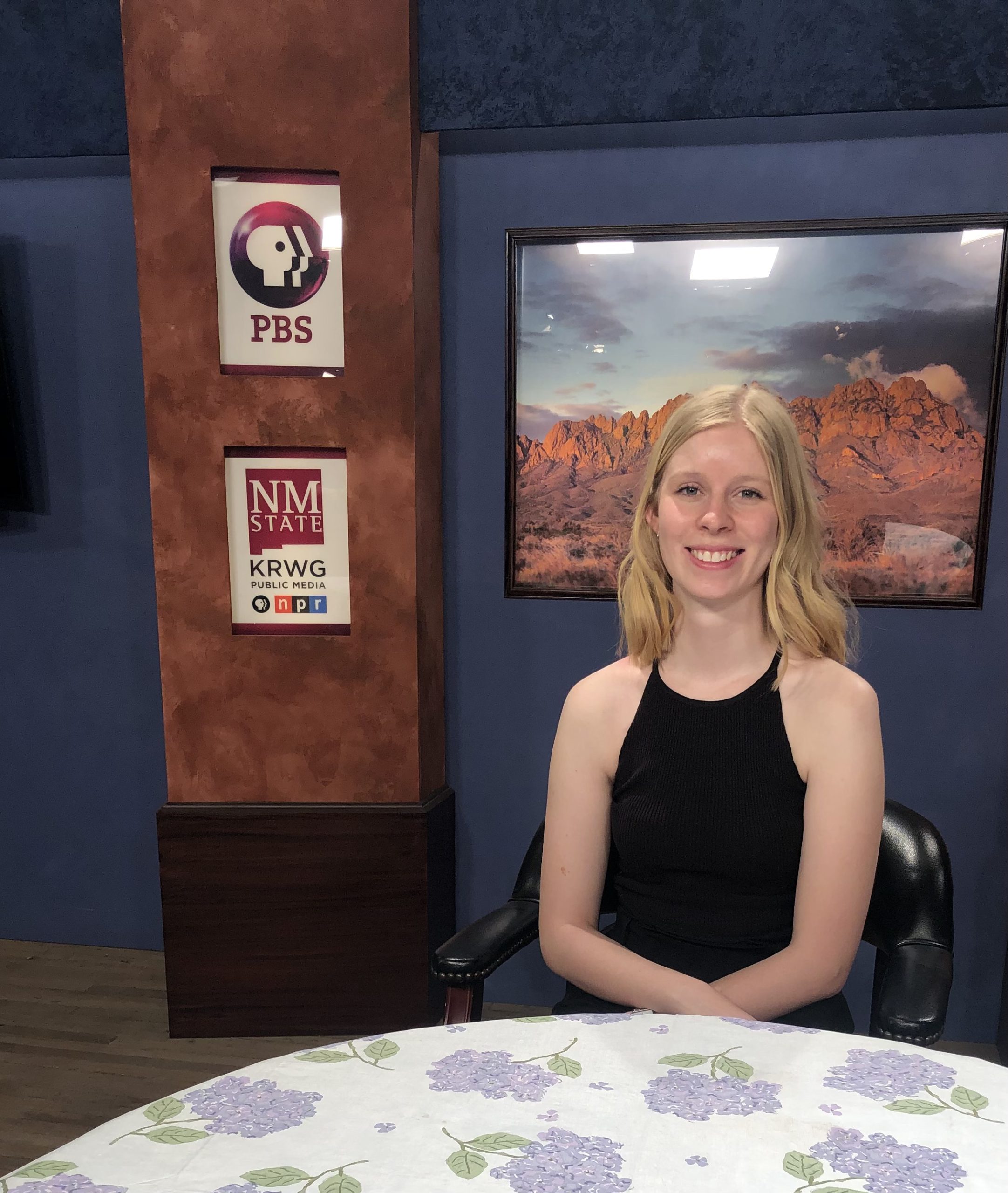 Talking about the past few weeks really makes you realize the insights we’ve had both in New York and at Station Week. After all, who can claim to have had breakfast with Michael Cohen for 2.5 hours, in the service of the Abyssinian Church personally welcomed by Reverend Dr. Butts, or speaking to “the voice of the subway” Charlie Pellett at Bloomberg.
Talking about the past few weeks really makes you realize the insights we’ve had both in New York and at Station Week. After all, who can claim to have had breakfast with Michael Cohen for 2.5 hours, in the service of the Abyssinian Church personally welcomed by Reverend Dr. Butts, or speaking to “the voice of the subway” Charlie Pellett at Bloomberg.
The Station Week in particular has significantly broadened my view of the USA, which I visited for the first time with this program. Spending time in New Mexico, in a region that is shaped by the border with Mexico, showed me the everyday reality of a situation that the German media often only shows when there are problems. I also got to know a university course that produces live news shows that are as professional as some newsrooms in Germany. But what impressed me the most was the openness and friendliness with which we were greeted everywhere. We were able to ask any questions and always found a way to discuss things on an equal footing with our counterparts. The word exchange will be capitalized in what is expected to be a challenging program and being part of the RIAS network already feels like part of a global journalistic family. It was an impressive 22 days.
Adrian Liehr, University of Leipzig (Indiana University)
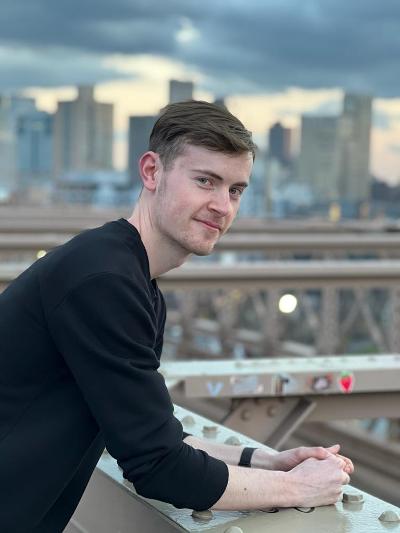 After two years of hoping that the RIAS program could still take place after the corona-related cancellation in 2020, the time had finally come – for three weeks we were able to experience the USA from very different perspectives. In the first nine days, we got to know New York on a journalistic and political, but also on a social and cultural level. I count the conversations with Phil Murphy and Michael Cohen, the visit to the Broadway musical “Come from Away”, the evening harbor cruise and the visit to the church service in Harlem among my absolute highlights. Due to the abundance of appointments, I could go on with this list. I have become a fan of New York and would like to return there soon. The second part of the trip took me to Indiana University in Bloomington. There I had the opportunity to accompany the reporters of the local TV and radio station in their work and at the same time get a feel for life in the Midwest and the lifestyle there. This is very different from the omnipresent hustle and bustle of Manhattan. All the people I met were open and interested in me. The American hospitality and the sincere interest in my personal background and life in Germany were particularly noteworthy. This resulted in great conversations that I will remember for a long time. All in all, the time in the USA was an incredible experience that will leave a lasting impression on me. On the one hand, the three weeks felt far too short, but on the other hand, due to the many program points, I sometimes had the feeling that I had already been in the country for three months. The entire group also contributed to this, and this experience will be forever associated with them.A big thank you goes to the RIAS team and especially Erik Kirschbaum for organizing and making this special trip possible!
After two years of hoping that the RIAS program could still take place after the corona-related cancellation in 2020, the time had finally come – for three weeks we were able to experience the USA from very different perspectives. In the first nine days, we got to know New York on a journalistic and political, but also on a social and cultural level. I count the conversations with Phil Murphy and Michael Cohen, the visit to the Broadway musical “Come from Away”, the evening harbor cruise and the visit to the church service in Harlem among my absolute highlights. Due to the abundance of appointments, I could go on with this list. I have become a fan of New York and would like to return there soon. The second part of the trip took me to Indiana University in Bloomington. There I had the opportunity to accompany the reporters of the local TV and radio station in their work and at the same time get a feel for life in the Midwest and the lifestyle there. This is very different from the omnipresent hustle and bustle of Manhattan. All the people I met were open and interested in me. The American hospitality and the sincere interest in my personal background and life in Germany were particularly noteworthy. This resulted in great conversations that I will remember for a long time. All in all, the time in the USA was an incredible experience that will leave a lasting impression on me. On the one hand, the three weeks felt far too short, but on the other hand, due to the many program points, I sometimes had the feeling that I had already been in the country for three months. The entire group also contributed to this, and this experience will be forever associated with them.A big thank you goes to the RIAS team and especially Erik Kirschbaum for organizing and making this special trip possible!
Marita Wehlus, Deutsche Journalismus Schule Münich (Indiana University)
The encounters with politicians, media professionals, activists and students that make up the RIAS program gave me a glimpse into the American reality that I will likely draw on for a long time. I got to see, in that one week in New York and the following two in Bloomington, Indiana, a country that is torn and traumatized and hopeful and relentlessly open. Hearing from Chivona Newsome (BLM New York) why, for her, the police will 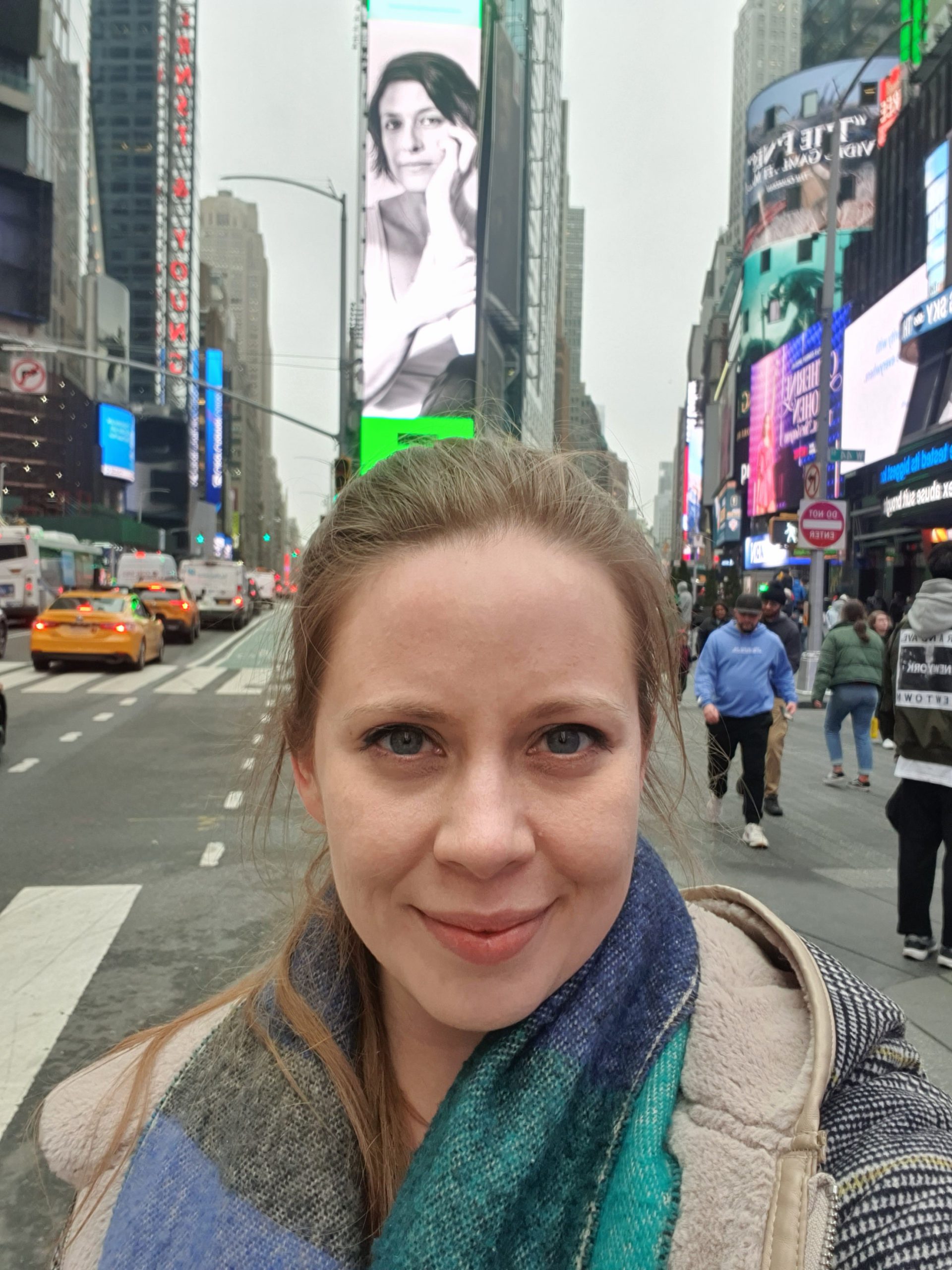 always be a racist institution gave me food for thought, as did Phil Murphy (Gov. of New Jersey), who made me feel for the first time how professionalized the demeanor of politicians in the U.S. is. There were so many moments in this program that showed me new perspectives. Seeing the life of a small, Democratic pinpoint of a town in Indiana, in the middle of a very red-voting state, was probably one of the most interesting. I saw students applaud Ann Coulter (right-wing author) while she described the “bloody, godless” French Revolution as the origin of liberalism. I sat across from a Democratic state senator who, despite being in the absolute minority, is trying to influence legislatures and asked me if I could explain to her how Trump happened in 2016. And I had the opportunity to speak with Dan Coats (Republican, retired senator), who spoke to students about how bipartisan collaboration no longer seems possible, how everything has become a war. Despite all this tension, there were also the magnificently talented journalists from WTIU/WFIU, who not only produce award-winning documentaries (I think in part because there are no longer police scanners in their newsroom to cover every blue light story), but are also a prime example of cross-media producing. The new generation of journalism students is no less impressive. And finally, it was an unforgettable experience above all because in almost every encounter I and we encountered critical reflection, but also a desire for debate and so much interest in our perspective.
always be a racist institution gave me food for thought, as did Phil Murphy (Gov. of New Jersey), who made me feel for the first time how professionalized the demeanor of politicians in the U.S. is. There were so many moments in this program that showed me new perspectives. Seeing the life of a small, Democratic pinpoint of a town in Indiana, in the middle of a very red-voting state, was probably one of the most interesting. I saw students applaud Ann Coulter (right-wing author) while she described the “bloody, godless” French Revolution as the origin of liberalism. I sat across from a Democratic state senator who, despite being in the absolute minority, is trying to influence legislatures and asked me if I could explain to her how Trump happened in 2016. And I had the opportunity to speak with Dan Coats (Republican, retired senator), who spoke to students about how bipartisan collaboration no longer seems possible, how everything has become a war. Despite all this tension, there were also the magnificently talented journalists from WTIU/WFIU, who not only produce award-winning documentaries (I think in part because there are no longer police scanners in their newsroom to cover every blue light story), but are also a prime example of cross-media producing. The new generation of journalism students is no less impressive. And finally, it was an unforgettable experience above all because in almost every encounter I and we encountered critical reflection, but also a desire for debate and so much interest in our perspective.
Sarah-Maria Köpf, Martin-Luther University Halle-Wittenberg (Texas A&M)
Three weeks in the U.S. – one in New York, two in Texas – gave me an insight into the country and its media landscape that I would never have experienced without RIAS. After all, how often do you get the chance to meet the governor of New Jersey or talk to Donald Trump’s former lawyer Michael Cohen? I was particularly pleased that it was 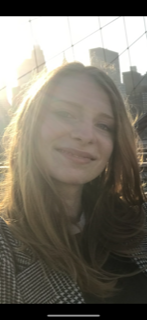 possible to visit the news rooms again after the tough restrictions imposed by the
possible to visit the news rooms again after the tough restrictions imposed by the  pandemic and that we were thus able to get an even closer picture of the work of journalists – starting with NBC and Bloomberg in Manhattan and ending with Vice in hip Williamsburg. But my absolute highlight was having lunch with Black Lives Matters NYC co-founder Chivona Newsome, where we talked about activism and everyday racism. Even after our trip, the day will remain in my memory for a long time to come
pandemic and that we were thus able to get an even closer picture of the work of journalists – starting with NBC and Bloomberg in Manhattan and ending with Vice in hip Williamsburg. But my absolute highlight was having lunch with Black Lives Matters NYC co-founder Chivona Newsome, where we talked about activism and everyday racism. Even after our trip, the day will remain in my memory for a long time to come
In College Station, I was able to take exciting journalism seminars at Texas A&M University and was pleasantly surprised by how practical and career-preparatory the courses were. In several seminars, I had the opportunity to talk with students and share more about the German media system and my own journalistic work. In the process, we discovered that the demands on young journalists and our own expectations and motivations are not very different from one country to the next. I was also impressed by the college newspaper “The Battalion,” which produces a new print edition every week with fewer than 20 students, as well as writing additional online and social media articles. I was also impressed with the local ESPN TV sports station, which is a very professional and well-structured media outlet at the university. College sports in general are writ large at Texas A&M. I was able to experience how much the students here cheer on the “Aggies” live at a baseball game, which was truly a unique experience. I will definitely need a few more weeks to process this exciting trip with RIAS. One thing is for sure though, it has changed my view of the USA and I have gained a better understanding of past and current events in the country.
Tom Wagner, Humboldt University Berlin (Southern Illinois University)
Due to a very early flight and my inability to sleep sitting up, I arrived in New York extremely tired. Every day I promised myself in the morning to go to sleep early that day. Nevertheless, I never arrived at our hotel before midnight, because this city never sleeps  and I now understood that I did not want that here either. All the fascinating personalities and places we visited every day and the extremely interesting conversations we had there, as well as the endless possibilities in the evening were such unique and thrilling experiences that I didn’t want to miss a single second. Being born and raised in Berlin, I am usually glad that people mostly mind their own business. Therefore, I was a little worried about the friendliness and openness of the Americans and especially the New Yorkers as friends had warned me in advance. But very quickly I got used to this open-heartedness and enjoyed talking to strangers and learning from them about the city, the country and the people. Experiencing this country, which you think you know so well from movies and television, in this way was eye-opening and enriching. Looking back, probably no event describes the impressions of this trip as much as the visit to the Abyssinian Baptist Church in Harlem, where deep social conflicts and the indestructible will to look ahead and to make the best of the situation together are so close to each other.These and other experiences will probably take me a while to fully process.
and I now understood that I did not want that here either. All the fascinating personalities and places we visited every day and the extremely interesting conversations we had there, as well as the endless possibilities in the evening were such unique and thrilling experiences that I didn’t want to miss a single second. Being born and raised in Berlin, I am usually glad that people mostly mind their own business. Therefore, I was a little worried about the friendliness and openness of the Americans and especially the New Yorkers as friends had warned me in advance. But very quickly I got used to this open-heartedness and enjoyed talking to strangers and learning from them about the city, the country and the people. Experiencing this country, which you think you know so well from movies and television, in this way was eye-opening and enriching. Looking back, probably no event describes the impressions of this trip as much as the visit to the Abyssinian Baptist Church in Harlem, where deep social conflicts and the indestructible will to look ahead and to make the best of the situation together are so close to each other.These and other experiences will probably take me a while to fully process.
Jessica Schäfer, University of Applied Sciences Magdeburg- Stendal (University of Minnesota)
Two years later than originally planned, the time had finally come: My first trip to the 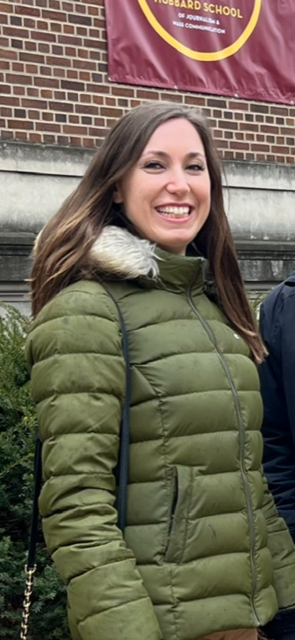 USA started. I didn’t really believe it until I landed at JFK and looked out the window of my hotel room at the Empire State Building. Thanks to RIAS and my great group, I spent ten unforgettable days in New York, where one highlight followed the other! My personal highlights include attending a service at Abyssinian Baptist Church, visiting various U.S. newsrooms – including Bloomberg and Vice -, meeting New Jersey Governor Phil Murphy and ex-Trump attorney Michael Cohen each for an in-depth conversation, and watching an NBA game at Madison Square Garden.
USA started. I didn’t really believe it until I landed at JFK and looked out the window of my hotel room at the Empire State Building. Thanks to RIAS and my great group, I spent ten unforgettable days in New York, where one highlight followed the other! My personal highlights include attending a service at Abyssinian Baptist Church, visiting various U.S. newsrooms – including Bloomberg and Vice -, meeting New Jersey Governor Phil Murphy and ex-Trump attorney Michael Cohen each for an in-depth conversation, and watching an NBA game at Madison Square Garden.
I spent my Station Week in Minneapolis – the city of Prince. There, too, I experienced many things every day. With my host Scott, I visited a wonderfully arranged photo exhibit about the murder of George Floyd, which gave me insight into the residents’ perspective. I gained insight into the educational system of American universities at the Hubbard School of Journalism, participated in seminars such as Newscast Producing, Multimedia Production & Storytelling, and TV/Radio Reporting. I attended the Midwest Journalism Conference, where I discussed journalism, politics, various cultural topics and differences between the U.S. and Germany with American journalists. The two highlights during my stay in Minneapolis were the visits of the radio station MPR and the TV station Kare 11, which belongs to NBC. There I received a detailed explanation of the daily work of the news and sports editors. I was allowed to spend the whole day there following their work flow while asking them lots of questions. All in all, I am incredibly grateful that I was able to take part in this RIAS program and that I gained so many exclusive and inspiring insights into the U.S. media landscape, politics and culture.
Florian Sädler, Axel Springer Academy Berlin, (University of Oklahoma)
As the RIAS program was coming closer, I had tried to not get too excited about it. After all, the whole thing had been scheduled four times before, dating back to our original trip in March 2020. Two years, countless waves of Covid and all these cancelled flights later, it only hit me that this really was about to happen when I left JFK Airport and found myself actually in New York City. Three weeks later and I haven’t really had time to process 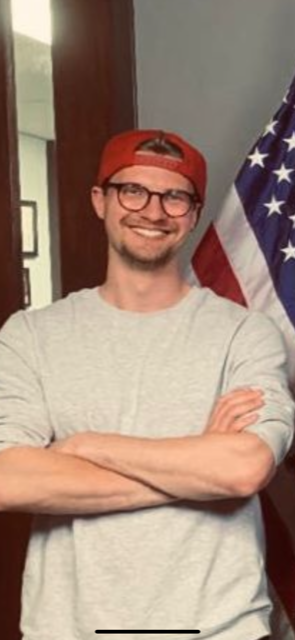 anything of what we experienced in the States. From Day 1 do Day 21, there were hardly any breaks, sometimes not even to grab a proper meal. Most days we didn’t get back to our hotel room or apartment until somewhere between 10 PM and midnight, just enough to catch a bit of sleep to be in somewhat presentable shape to do it all over again the next day. When we ventured out into the city – or, during part two of the program, into the countryside – we did everything from meeting with a Governor, meeting with a host of High School students in a poverty-riddled area of Oklahoma City or with Donald Trump’s former attorney to visiting Afghan refugees, multiple NBA games or a Gospel Church to taking tours through an ultra-orthodox Jewish Quarter in Brooklyn, the Empire State Building or a Streetfood Festival in a Village in Cherokee Nation. There hasn’t been one boring day. We got to talk with so many different people and visit so many different places that, within only a couple of days, it became hard to remember everything that had happened up to this point. Or even yesterday, for that matter (which is quite the luxury problem, I guess). It all just melted into a very enjoyable and memorable blur. I’m somewhat glad I didn’t get my expectations up before I stepped onto the plane. That way, I was even happier for the way it all worked out. Adding to that, the concept of spending one week in New York City and then spreading out across the Midwest worked wonders. Nothing better to get a feel for the contrasts that shape this country than going from Manhattan straight to Norman, Tahlequah or Kingfisher, Oklahoma. The more time I’ve spent in the US, the less I believe anyone can really explain this country. Especially foreigners. Still, through all the different impressions I got through this RIAS journey, I feel like I can understand what makes different Americans tick and why a little bit better than before. Nothing more to ask from a three-week exchange program.
anything of what we experienced in the States. From Day 1 do Day 21, there were hardly any breaks, sometimes not even to grab a proper meal. Most days we didn’t get back to our hotel room or apartment until somewhere between 10 PM and midnight, just enough to catch a bit of sleep to be in somewhat presentable shape to do it all over again the next day. When we ventured out into the city – or, during part two of the program, into the countryside – we did everything from meeting with a Governor, meeting with a host of High School students in a poverty-riddled area of Oklahoma City or with Donald Trump’s former attorney to visiting Afghan refugees, multiple NBA games or a Gospel Church to taking tours through an ultra-orthodox Jewish Quarter in Brooklyn, the Empire State Building or a Streetfood Festival in a Village in Cherokee Nation. There hasn’t been one boring day. We got to talk with so many different people and visit so many different places that, within only a couple of days, it became hard to remember everything that had happened up to this point. Or even yesterday, for that matter (which is quite the luxury problem, I guess). It all just melted into a very enjoyable and memorable blur. I’m somewhat glad I didn’t get my expectations up before I stepped onto the plane. That way, I was even happier for the way it all worked out. Adding to that, the concept of spending one week in New York City and then spreading out across the Midwest worked wonders. Nothing better to get a feel for the contrasts that shape this country than going from Manhattan straight to Norman, Tahlequah or Kingfisher, Oklahoma. The more time I’ve spent in the US, the less I believe anyone can really explain this country. Especially foreigners. Still, through all the different impressions I got through this RIAS journey, I feel like I can understand what makes different Americans tick and why a little bit better than before. Nothing more to ask from a three-week exchange program.
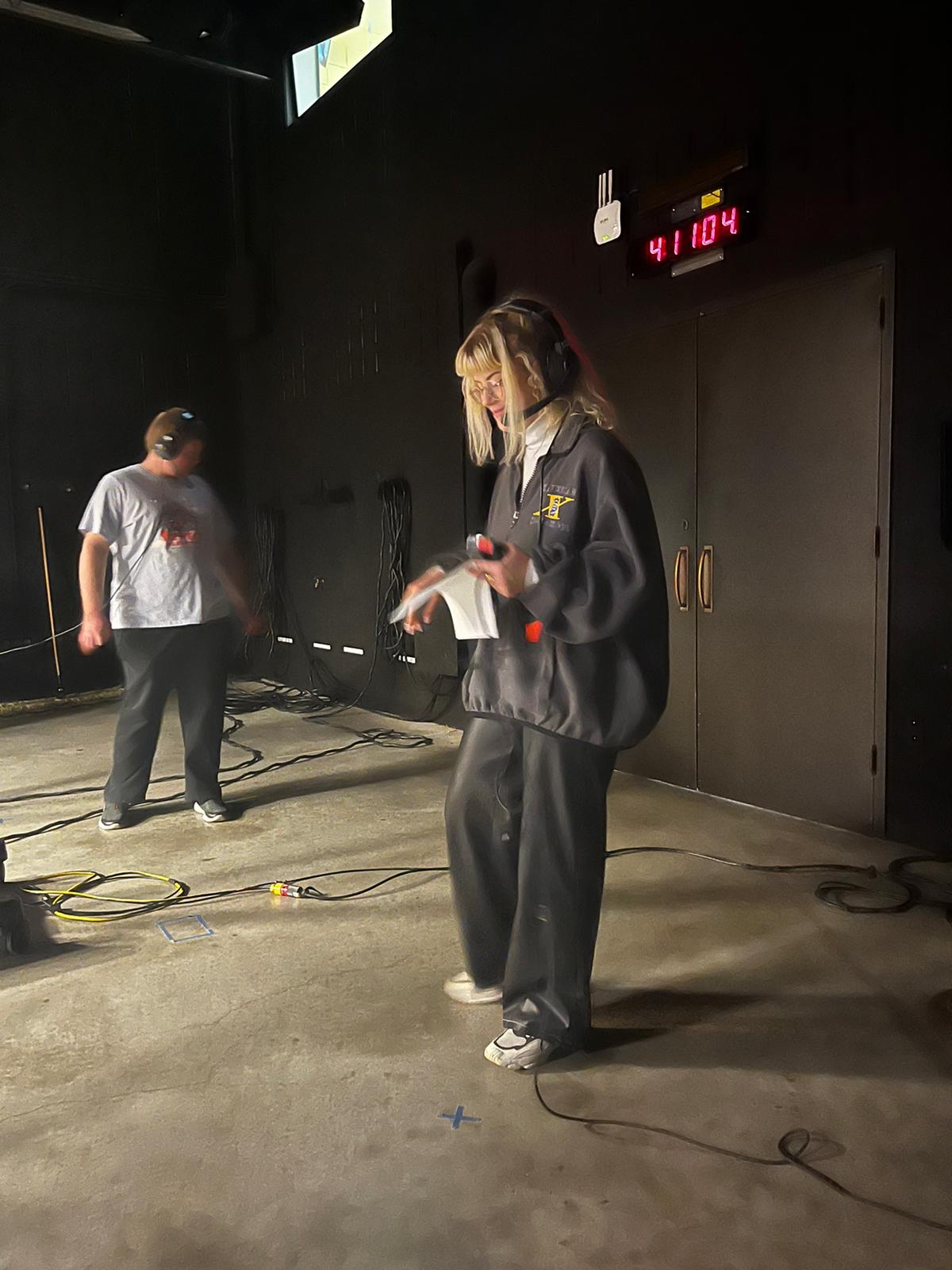
Amy Woyth, Mittweida University of Applied Sciences (Wisconsin-Oshkosh)
After years of waiting and waiting, in March the time had finally come to board my flight to New York City – “I’ll believe it when I’m actually there,” I had said for the past weeks. And it was been everything I had hoped for and more. After a week-long schedule in NY with too many appointments and highlights to count, it was time to embark on a trip to the Midwest. Although I didn’t have particularly high hopes for a small town in Wisconsin, it rounded the trip out perfectly. My host family, whom I can now call my godparents, was the most amazing family I could have wished for, showing me the city and fulfilling my bucket list for the States together with me. Even though I have been to the States multiple times with my own family, Oshkosh, WI really showed me what American life is like. The program was successful in its mission: I have learned so many things about the US, its people and its customs, that I will now need a few months to process everything I was so privileged to have experienced.
Leonie von Randow, Axel Springer Academy, (Southern Illinois University)
Never before have I met so many interesting people and absorbed so much input in such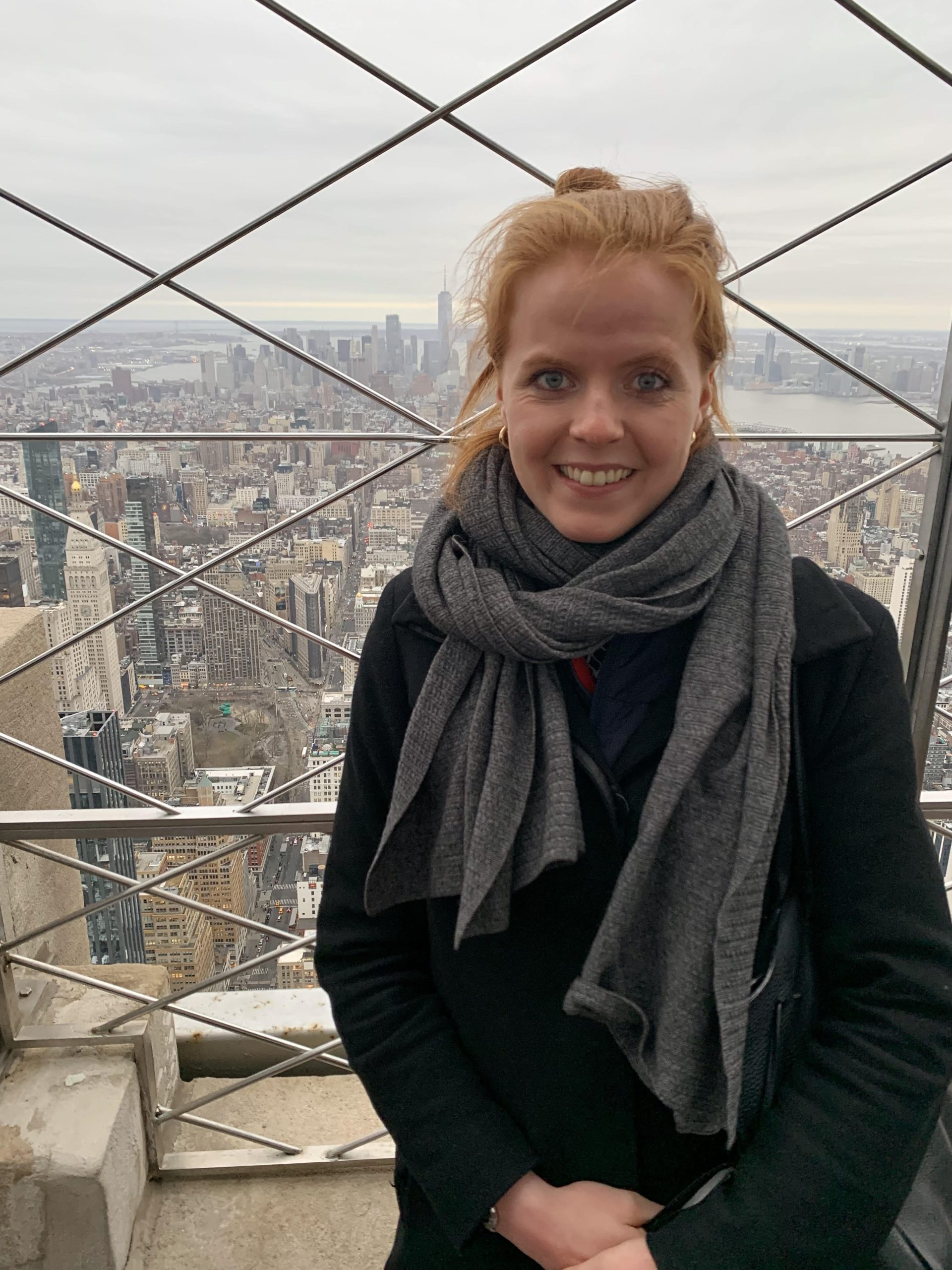 a short time like during the week in New York. Every day was packed with appointments that a journalist can only dream of: We met feisty individuals like Arthur Aidala, radio host and lawyer for Harvey Weinstein, or Michael Cohen, former lawyer and close confidant of Donald Trump. We had lunch with the incredibly impressive and personable Black Lives Matter activist Chivona Newsome and asked Clare Toeniskoetter, editor at the New York Times hit podcast “The Daily,” about her work. On Sunday, we attended a very rousing service at Abyssinian Baptist Church in Harlem and began to better understand religion in America. I am filled with all the unique experiences and wonderful time I got to spend with Erik and the other RIAS fellows – and I look forward to meeting many other RIAS alumni in Berlin or anywhere else in the world.
a short time like during the week in New York. Every day was packed with appointments that a journalist can only dream of: We met feisty individuals like Arthur Aidala, radio host and lawyer for Harvey Weinstein, or Michael Cohen, former lawyer and close confidant of Donald Trump. We had lunch with the incredibly impressive and personable Black Lives Matter activist Chivona Newsome and asked Clare Toeniskoetter, editor at the New York Times hit podcast “The Daily,” about her work. On Sunday, we attended a very rousing service at Abyssinian Baptist Church in Harlem and began to better understand religion in America. I am filled with all the unique experiences and wonderful time I got to spend with Erik and the other RIAS fellows – and I look forward to meeting many other RIAS alumni in Berlin or anywhere else in the world.
Friedrich Steffes-lay, Free Tech Academy, Berlin (Arizona State University)
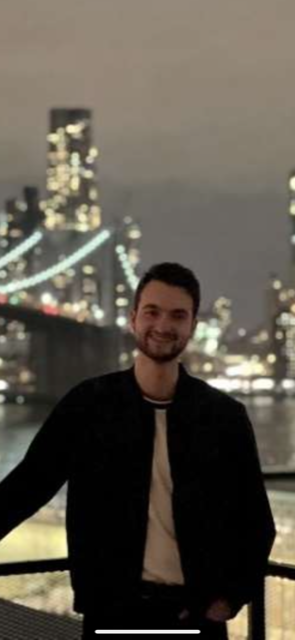 Two years of waiting because of Covid, but every day of patience was worth it! The time in the USA was so intense and informative that I still haven’t processed everything. For me, too, the background discussions with ex-Trump lawyer Michael Cohen and Governor Phil Murphy will be remembered above all, but also the deep insights into US journalism in the newsrooms of Bloomberg, VICE and WNBC. During my university station week, I dove deep into Phoenix local politics and met people with a wide variety of views. I was allowed to learn how professional (investigative) journalism is done on campus – and got active myself with an interview with a German consul general. But my personal highlight is definitely my research on human trafficking in Phoenix, which even took me behind the closed doors of a local rescue center. All of that was initiated by a conversation with a politics professor at Arizona State University. But the program wasn’t just a great experience on the journalism side. In New York and Phoenix, I was able to reunite with several friends I had already made through RIAS three years ago – and I will see some of them again soon in Germany.
Two years of waiting because of Covid, but every day of patience was worth it! The time in the USA was so intense and informative that I still haven’t processed everything. For me, too, the background discussions with ex-Trump lawyer Michael Cohen and Governor Phil Murphy will be remembered above all, but also the deep insights into US journalism in the newsrooms of Bloomberg, VICE and WNBC. During my university station week, I dove deep into Phoenix local politics and met people with a wide variety of views. I was allowed to learn how professional (investigative) journalism is done on campus – and got active myself with an interview with a German consul general. But my personal highlight is definitely my research on human trafficking in Phoenix, which even took me behind the closed doors of a local rescue center. All of that was initiated by a conversation with a politics professor at Arizona State University. But the program wasn’t just a great experience on the journalism side. In New York and Phoenix, I was able to reunite with several friends I had already made through RIAS three years ago – and I will see some of them again soon in Germany.
Jana Glose, German Sport University Cologne (University of Oklahoma)
After Corona prevented me from going to the U.S. in the 2020 election year, my RIAS program started together with other journalism students from all over Germany almost 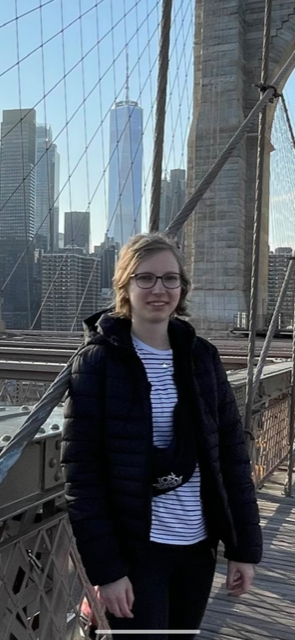 700 days later in New York, the city that never sleeps. And I’ll say this right away: there really wasn’t all that much sleep during the days in the city, but it was more than worth it. I got to know America and especially American journalism from an exciting side. Through the numerous conversations with journalists, activists and politicians, as well as through visits to editorial offices, including Bloomberg, the ARD studio and Vice, I was able to develop an understanding of American life and the American media landscape. The in-depth conversations and discussions showed me ideas, innovations and perspectives, but also fears, concerns and problems within America’s population. My personal highlights in New York were attending a Rangers hockey game, having lunch with Black Live Matters New York founder Chivona Newsome in the Harlem neighborhood, speaking with New Jersey Governor Phil Murphey, and seeing the musical Come from Away. Topped off with interaction with the other participants, the RIAS program in New York was a memorable and highly educational experience.For my University Week I went to the University of Oklahoma. A huge campus with TV studios with daily news and weekly sports shows, a cafeteria like in Harry Potter and a football stadium with room for 90,000 visitors are just a few impressions that remain with me. The university offers students a wide range of opportunities to prepare for a career in journalism. I was particularly impressed by the fact that the professors are strongly committed to helping all students find a job after graduation or, if possible, before. Unfortunately, after two days in Oklahoma, I had to make acquaintance with the American healthcare system and spend the rest of the week in bed. But that was also an experience, even if, unlike the others, I could have easily missed.
700 days later in New York, the city that never sleeps. And I’ll say this right away: there really wasn’t all that much sleep during the days in the city, but it was more than worth it. I got to know America and especially American journalism from an exciting side. Through the numerous conversations with journalists, activists and politicians, as well as through visits to editorial offices, including Bloomberg, the ARD studio and Vice, I was able to develop an understanding of American life and the American media landscape. The in-depth conversations and discussions showed me ideas, innovations and perspectives, but also fears, concerns and problems within America’s population. My personal highlights in New York were attending a Rangers hockey game, having lunch with Black Live Matters New York founder Chivona Newsome in the Harlem neighborhood, speaking with New Jersey Governor Phil Murphey, and seeing the musical Come from Away. Topped off with interaction with the other participants, the RIAS program in New York was a memorable and highly educational experience.For my University Week I went to the University of Oklahoma. A huge campus with TV studios with daily news and weekly sports shows, a cafeteria like in Harry Potter and a football stadium with room for 90,000 visitors are just a few impressions that remain with me. The university offers students a wide range of opportunities to prepare for a career in journalism. I was particularly impressed by the fact that the professors are strongly committed to helping all students find a job after graduation or, if possible, before. Unfortunately, after two days in Oklahoma, I had to make acquaintance with the American healthcare system and spend the rest of the week in bed. But that was also an experience, even if, unlike the others, I could have easily missed.
Simon Lanzerath, University of Cologne (Southern Illinois University)
Before the trip, I was worried about American democracy and transatlantic relations, especially after the storm on the Capitol and four years of Trump. After this trip and the many conversations with political actors, students, but also people on the street, I know: our partnership is strong and so is the will to defend democracy. What it takes is mutual understanding. Through the RIAS program, we were able to improve this understanding – among Germans as well as Americans.
Erik Kirschbaum, Executive Director, RIAS Berlin Commission
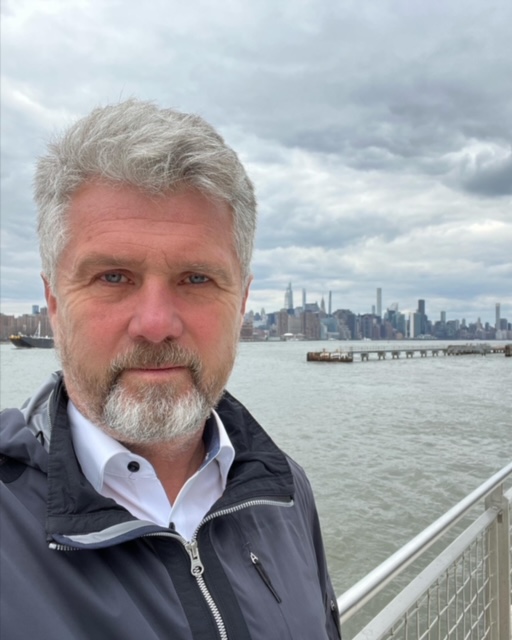 Spending time in the USA with a group of German journalism students on a newly created ERP exchange program with the RIAS Berlin Commission has been a truly delightful experience, perhaps in part because most had never been to the country before and brought unbridled enthusiasm to learn more. They arrived with open minds and left three weeks later with their heads filled with memories, valuable new discoveries about the USA and perhaps about themselves too. And because they came so well-prepared and with so much curiosity, their talks with American journalists, politicians like New Jersey Governor Phil Murphy, African-American leaders like Chivone Newsome, Jewish leaders like Anti-Defamation League NY Director Scott Richman and German-American sports celebrities like Jürgen Klinsmann, the conversations were outstanding.
Spending time in the USA with a group of German journalism students on a newly created ERP exchange program with the RIAS Berlin Commission has been a truly delightful experience, perhaps in part because most had never been to the country before and brought unbridled enthusiasm to learn more. They arrived with open minds and left three weeks later with their heads filled with memories, valuable new discoveries about the USA and perhaps about themselves too. And because they came so well-prepared and with so much curiosity, their talks with American journalists, politicians like New Jersey Governor Phil Murphy, African-American leaders like Chivone Newsome, Jewish leaders like Anti-Defamation League NY Director Scott Richman and German-American sports celebrities like Jürgen Klinsmann, the conversations were outstanding.
The ERP program is supported by the Transatlantic Program of the Federal Republic of Germany. It has been funded by the European Recovery Program (ERP) of the Federal Economy and Energy (BMWi) Ministry.
April 7, 2022
On RIAS trip to USA, German students get involved in college life across country
Fifteen German students were able to learn more about the United States and journalism training at eight leading American universities in the Midwest and Southwest on a newly created RIAS Berlin Commission program. Several of the students were invited on local campus and radio TV shows to talk about their experiences in the United States or compare life in Germany to the United States while others met local groups of students, or local political leaders.
Three students from Germany spent two weeks in Carbondale, Illinois visiting Southern Illinois University and host Fred Martino, who took part in a RIAS program to Germany 20 years earlier. Tom Wagner, Leonie von Wagner and Simon Lanzerath talked for 30 minutes on Martino’s talk show about what they’ve learned in the United States and how pleasantly surprised they are about the openness and friendliness of Americans they have met during the program, which started in mid-March with a first week together as a group in New York. Here is their interview:
 At Arizona State University in Tempe, Friedrich Steffes-lay was invited to talk about working in journalism in Germany on the campus radio station on the “Blaze Radio Show”. He also talked about the cultural differences between the United States and Germany as well as differences in the media in the two countries. Steffes-lay also had the chance to meet local councilwoman Ann O’Brien to talk about local issues as well as why she believes Arizona has become a swing state in U.S. elections and could become even more polarised in the future.
At Arizona State University in Tempe, Friedrich Steffes-lay was invited to talk about working in journalism in Germany on the campus radio station on the “Blaze Radio Show”. He also talked about the cultural differences between the United States and Germany as well as differences in the media in the two countries. Steffes-lay also had the chance to meet local councilwoman Ann O’Brien to talk about local issues as well as why she believes Arizona has become a swing state in U.S. elections and could become even more polarised in the future.
At New Mexico State University in Las Cruces, Rieke Smith was able to take part in classes where former MNSU university students talked about how they got their start in journalism in the United States after graduating and talking about their experiences on the job. She also joined a student news team covering an event where homeless people were getting free haircuts for the local campus news station.
At the University of Oklahoma, Daniel Heyd and Florian Sädler had the chance to listen to a speech from former President Donald Trump’s National Security Adviser Robert O’Brien. They also had the chance to visit the Tulsa police department and have a meeting with its police chief and press officer as well as meeting the department’s homicide department.
At Indiana University, Marita Wehlus and Andrian Liehr attended a speech by President Trump’s former head of intelligence Dan Coats, who had also been the U.S. ambassador to Germany during George W. Bush’s presidency. They also met Paul Helmke, the former leader of the Brady Campaign to tighten gun control laws in the United States.
At the University of Minnesota, Jessica Schäfer attended courses on radio journalism from Scott Libin, a RIAS alumni and the former chairman of the RTDNA in the United States. She also spend a day at KARE 11 TV station in Minneapolis, learning how their evening news show is produced. She worked in the sports department at the station as well as in the control room. Schäfer also had the chance to spend a day at MPR radio.
 At Texas A&M, Sarah-Maria Köpf and Lara Jäkel had the chance to see the local TAMU newscast being put together. They also visited the local ESPN TV sports channel station where the baseball game they watched was being covered on television.
At Texas A&M, Sarah-Maria Köpf and Lara Jäkel had the chance to see the local TAMU newscast being put together. They also visited the local ESPN TV sports channel station where the baseball game they watched was being covered on television.
The ERP program is supported by the Transatlantic Program of the Federal Republic of Germany. It has been funded by the European Recovery Program (ERP) of the Federal Economy and Energy (BMWi) Ministry. There is a reciprocal program to Germany for American students studying journalism or a related field that focuses on the role of broadcast journalism and the role it played during the Cold War, especially in Berlin.
April 2, 2022
German students learn more about U.S. journalism in Midwest, Southwest
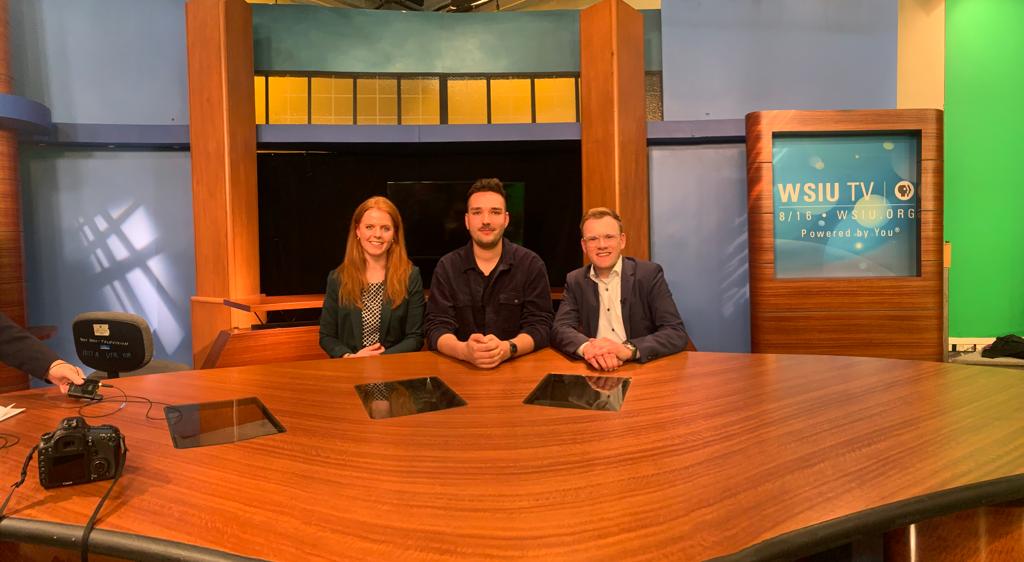
Eight groups of German journalism students and young journalists are spending two weeks visiting leading American universities and journalism programs in the Midwest and Southwest on a RIAS Berlin Commission program that was launched thanks to a grant from the European Recovery Program (ERP) of the Economy Ministry. In groups ranging from one to three, the German students are visiting the University of Oklahoma, Texas A&M, Southern Illinois University, New Mexico State University, Arizona State University, Indiana University, University of Minnesota and the University of Wisconsin-Oshkosh to learn more about how young Americans learn the tools of their journalism trade.
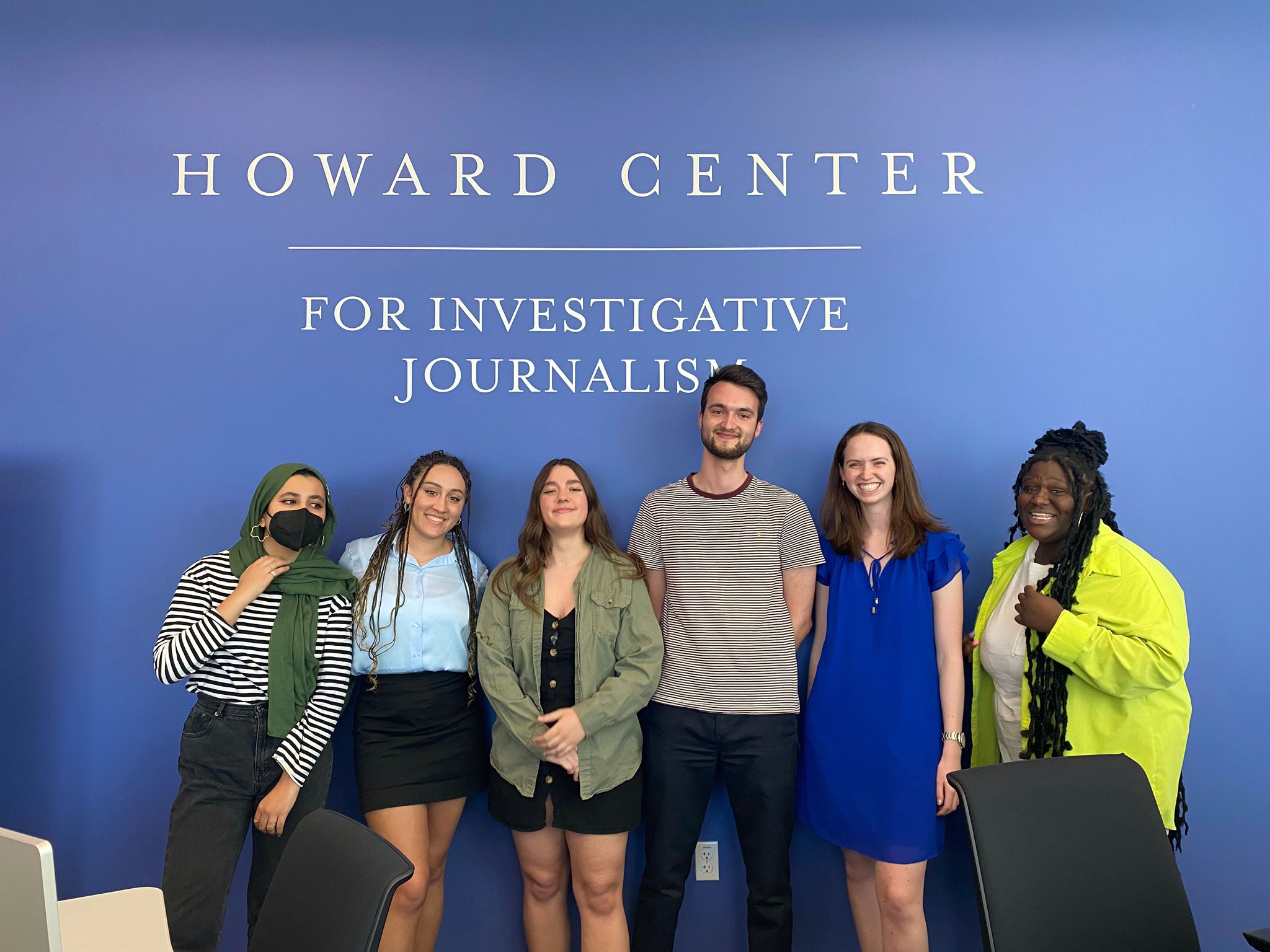
The Germans — 10 of whom are making their first trip to the United States — have learned that most large American universities have their own campus TV station, radio station and newspaper. The student broadcasting stations are often part of the public broadcasting system in the United States and their work is sometimes fed into the national news broadcasts on PBS TV or National Public Radio (NPR). It has been an eye-opening experience for the German students, who have got to see first-hand how American journalism students get lots of hands-on experience reporting issues on their campuses and in their local communities.
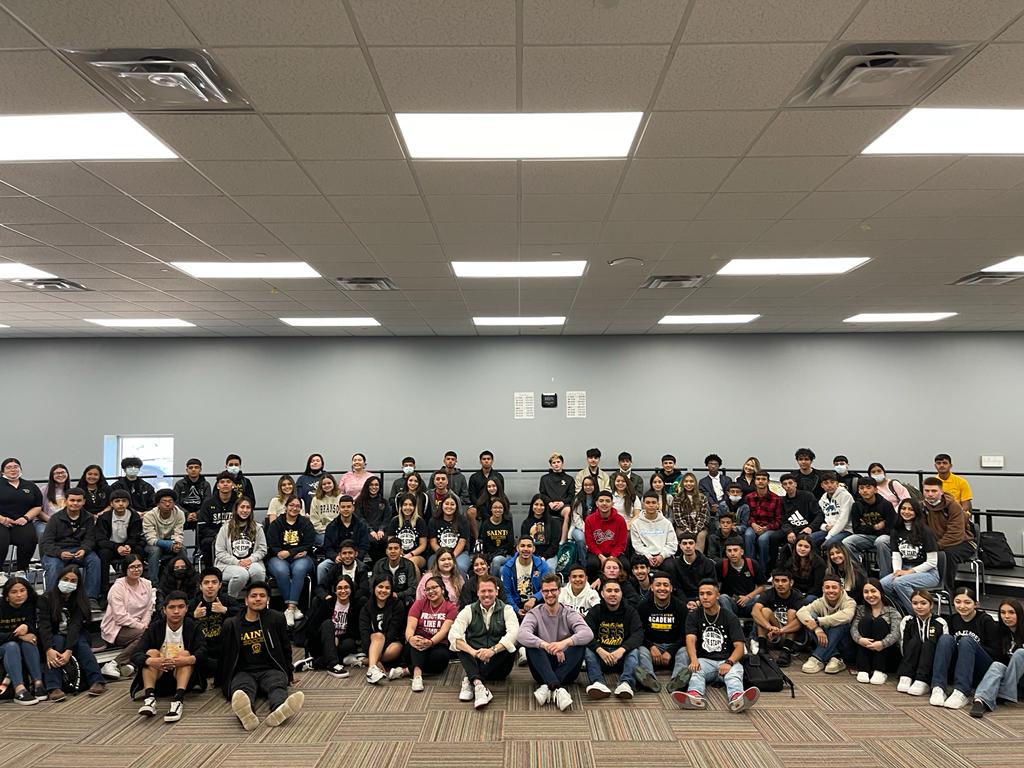
Among the highlights alongside the program was a talk given by Florian Sädler and Daniel Heyd to more than 100 local high school students in Norman, Oklahoma about life and the political situation in Germany.
In Indiana, Marita Wehlus and Adrian Liehr got a chance to meet State Senator Shelli Yoder, a Democrat. Even years after the 2016 Trump win, she is still not sure how it happened, asking the RIAS fellows what their take on it is. She furthermore told the fellows about how some Republican candidates in Indiana are now calling themselves “Conservatives” to show they are even further to the right than the Republican party as a whole. She also explained to the Germans how Democrats were able to stop an attempt to ban Critical Race Theory instruction in schools despite a Republican majority in the state senate.
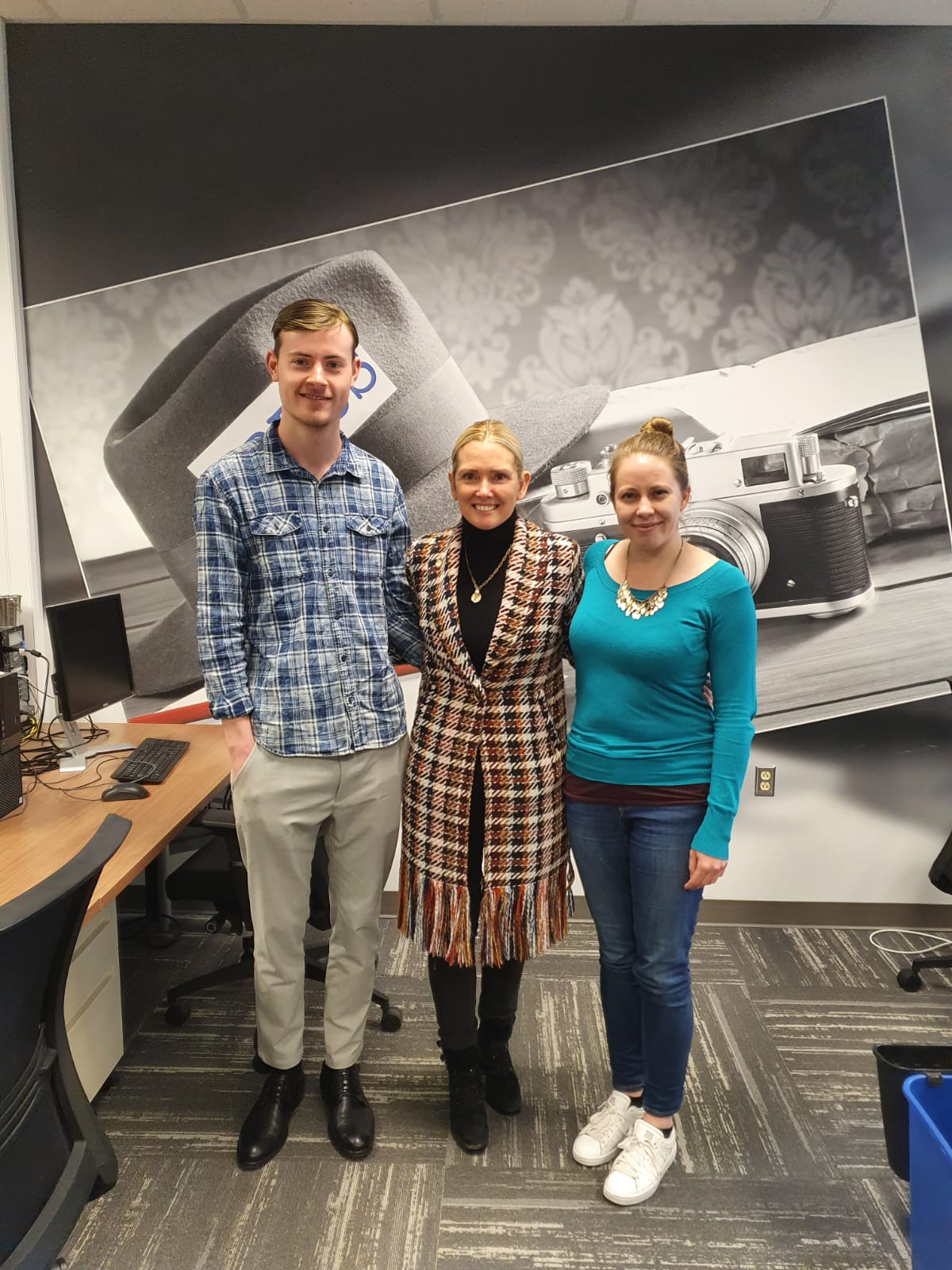
Wehlus and Liehr have also had the chance to visit the Channel 9 newsroom in Cincinnati, Ohio, where their station week host Sara Wittmeyer previously worked. They also visited journalism classes at Northern Kentucky University, talking to the American students about how journalism is taught in Germany and how the media system in Germany is organized compared to the United States.
In Arizona, Friedrich Steffes-lay had the chance to visit the Howard Center at ASU thanks to his host Michelle Ailport, who had taken part in a reciprocal ERP program to Germany in 2019. At the Howard Center at ASU, Steffes-lay learned that students work on investigative journalism projects and sometimes actually publish scoops that are so important that they are later used by major media outlets, such as The New York Times.
At Southern Illinois University, Leonie von Randow, Tom Wagner and Simon Lanzerath took part in a 30-minute interview on the local PBS station with host Fred Martino about a variety of transatlantic issues. They were also interviewed about their highlights of the RIAS Berlin Commission ERP student program as well as their thoughts on the January 6, 2021 siege of the Capitol building in Washington DC. The interview will be aired on PBS stations in May.
At the University of Wisconsin-Oshkosh, Amy Woyth and Emma Lübbert helped work as “honorary staff” members on the latest edition of the student newspaper the “Advance Titan”. Woyth also served as “floor director” at Titan TV news.
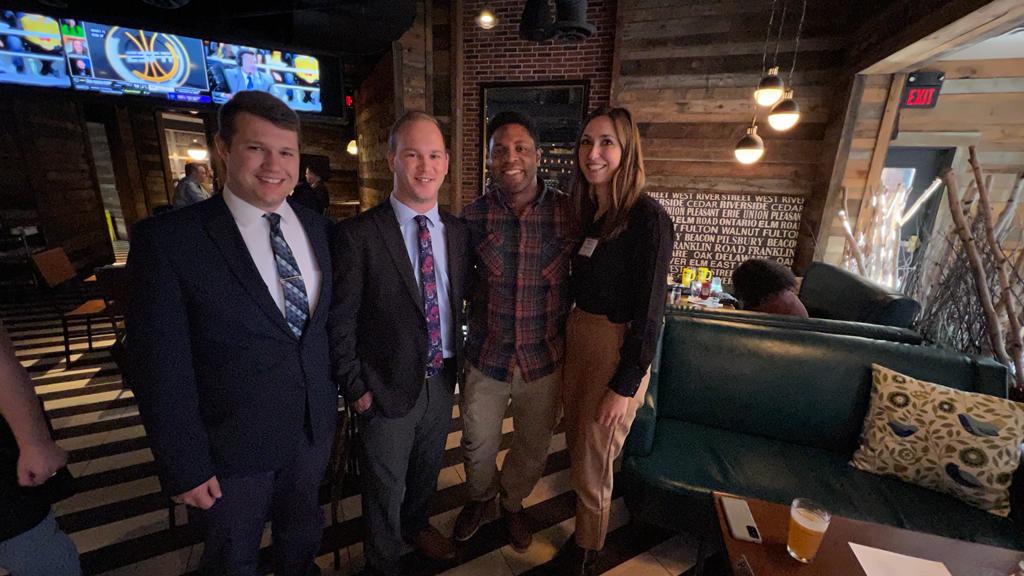
In Minnesota, Jessica Schäfer visited “Newcast producing”, “Advertising Law”, “TV/Radio Reporting” and “Multimedia Production and Storytelling” seminar courses for journalism students at the University of Minnesota. She was also invited to attend the Midwest Journalism Conference, where she met a number of other journalists who have plans to take part in RIAS Berlin Commission programs to Germany and who have hosted German journalists in the past.
At Texas A&M in College Station, Texas, Sarah-Maria Köpf and Lara Jäkel attended media writing courses where students discussed articles that had appeared in the most recent edition of the campus newspaper, the “Battalion”. They have also visited courses in the political and media departments to talk about differences between the German and U.S. media systems as well as the RIAS Berlin Commission exchange programs. They also visited the Bush Presidential Library, the newsroom of the “Battalion” and attended a guest lecture from Pew Research Center.
The ERP program is supported by the Transatlantic Program of the Federal Republic of Germany. It has been funded by the European Recovery Program (ERP) of the Federal Economy and Energy (BMWi) Ministry. There is a reciprocal program to Germany for American students studying journalism or a related field that focuses on the role of broadcast journalism and the role it played during the Cold War, especially in Berlin.
March 31, 2022
German journalists’ impressions of USA after 3-week exchange program
A group off 10 German journalists spent three weeks in the United States in March, learning more about the political, economic, cultural aspects as well as sports. They were in Washington and New York for one week each and then spent a third week visiting small American radio and TV stations across the country. Here are their impressions of their journey:
Nazan Gökdemir, ZDF Arte
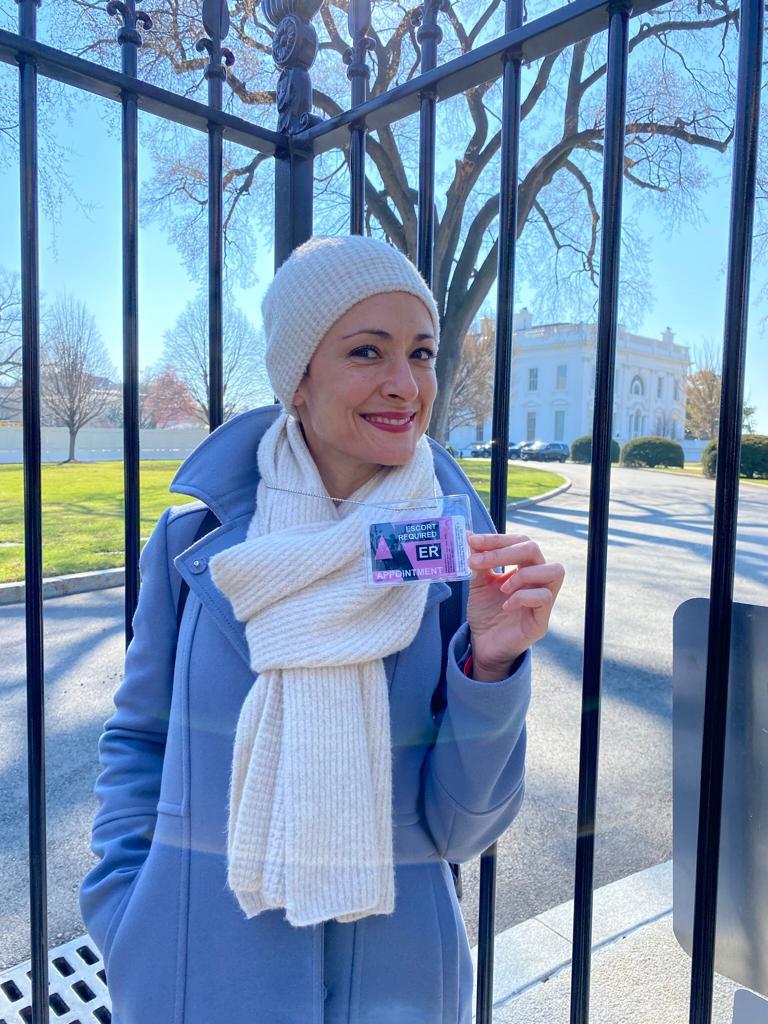 What a fantastic and unforgettable experience! One week in Washington, one week in New York. More than 35 meetings with journalists, politicians, activists, lobbyists, pollsters, a walking tour through the Hasidic Jewish neighborhood of Williamsburg in Brooklyn, a play on Broadway…My personal highlights were the visit to the White House and the Sunday Mass in Harlem. Goosebump moments! From time to time, there were also spontaneous meetings, among others with former Trump lawyer Michael Cohen. Every single encounter, every single item on the packed RIAS agenda was a unique and enriching experience. Sometimes hopeful, sometimes depressing, always impressive!
What a fantastic and unforgettable experience! One week in Washington, one week in New York. More than 35 meetings with journalists, politicians, activists, lobbyists, pollsters, a walking tour through the Hasidic Jewish neighborhood of Williamsburg in Brooklyn, a play on Broadway…My personal highlights were the visit to the White House and the Sunday Mass in Harlem. Goosebump moments! From time to time, there were also spontaneous meetings, among others with former Trump lawyer Michael Cohen. Every single encounter, every single item on the packed RIAS agenda was a unique and enriching experience. Sometimes hopeful, sometimes depressing, always impressive!
Although I have been to the USA several times, thanks to RIAS I got new insights into a torn country full of contradictions. In direct, honest and critical conversations with journalists, I became aware of how rough and tough the competition within the U.S. media landscape is and how much opinion-oriented news broadcasts can corrode trust in facts and truth and thus ultimately also pose a danger to democracy.Our educational trip was overshadowed not by Corona, as I had originally feared, but by the Russian war of aggression in Ukraine. Russia’s President Putin has not only posed new challenges to the transatlantic relationship, but also strengthened it. I think the RIAS exchange program is more important than ever. As a RIAS alumni, I am now happy to be available to our U.S. colleagues as a contact person – and to answer questions about the country, its people and its media with as much openness, enthusiasm and conviction.
——————–

Christian von Rechenberg, ZDF, heute-journal
“It’s all about people” – that was the answer of Bill Whitaker from CBS to my question about what makes his program 60 Minutes the best investigative magazine in the USA. The fact that I was able to put my questions to a top interlocutor again on day 10 of the RIAS trip had long been normal. And once again made the answer all the more valuable: It’s all about people – get to the people. That’s how I would sum up the two weeks with RIAS. We didn’t talk about things, we talked to the people they affected: with a former Republican congressman, for example, we talked about Trump and “the storm.” With the co-founder of Black Lives Matter NYC, we talked about structural racism in the US and the anger within the movement. Eye-to-eye, critical, honest, engaged.
Each of these meetings expanded my knowledge, my understanding, my image of the USA. All of the interlocutors were happy to go far beyond their own horizons with us. We were able to curiously ask ourselves about the polarization of society, unlimited freedom of speech, social peace, the future and the past of the USA.
In addition, there was a very fine accompaniment: I will not forget the church service in Harlem, nor the guided walk through the Hasidic community in Brooklyn. We even climbed the fence of the White House. This program is hard to beat in terms of content. However, it is a pick packed daily schedule that we generally walked off(!). The RIAS program is not a pleasure trip, you have to be aware of that. It is demanding and exhausting, it requires discipline and sometimes patience. If you have both, you will return home with satisfaction and an inner smile. And maybe a catchy tune by Bruce Springsteen (ask Erik for details 😊).
——————–
Katharina Hamberger, Deutschlandfunk
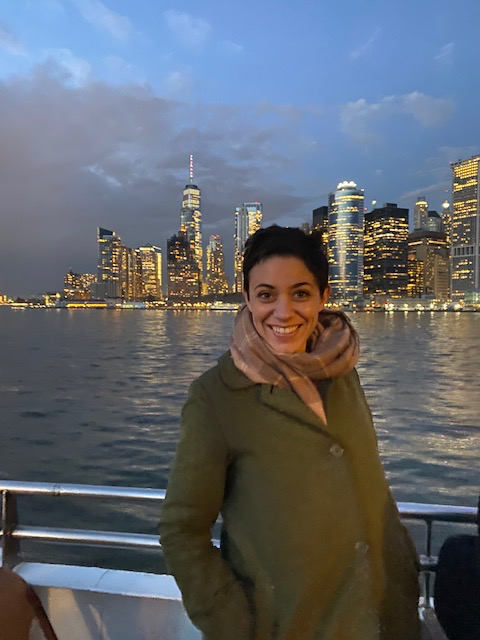 Two weeks, a thousand impressions – which have greatly shaped my image of the USA. Originally, I was supposed to go to the USA with the RIAS Berlin Commission already in March 2020, but then Corona intervened. At that time, the United States was still a country shaped by an incumbent President Trump – now we have seen what traces these four years have left behind, but also why this was possible at all. Our interlocutors, from left to right, from conservative to progressive, gave us many insights into a country that is deeply divided. They painted a picture of a society with deep rifts running through it – and hardly anyone looked to the future with optimism. We also got to know the U.S. as a country in which many of the developments are also related to history: among other things, a two-party system that makes compromises difficult and favors populism, a promise of freedom that at the same time relies so much on the self-responsibility of each individual that many fall by the wayside, an understanding of Freedom of Speech that does not even know a limit in Holocaust denial.
Two weeks, a thousand impressions – which have greatly shaped my image of the USA. Originally, I was supposed to go to the USA with the RIAS Berlin Commission already in March 2020, but then Corona intervened. At that time, the United States was still a country shaped by an incumbent President Trump – now we have seen what traces these four years have left behind, but also why this was possible at all. Our interlocutors, from left to right, from conservative to progressive, gave us many insights into a country that is deeply divided. They painted a picture of a society with deep rifts running through it – and hardly anyone looked to the future with optimism. We also got to know the U.S. as a country in which many of the developments are also related to history: among other things, a two-party system that makes compromises difficult and favors populism, a promise of freedom that at the same time relies so much on the self-responsibility of each individual that many fall by the wayside, an understanding of Freedom of Speech that does not even know a limit in Holocaust denial.
We also got to know a media landscape in which, on the one hand, the agencies – such as Reuters – operate, whose top priority is to be as neutral as possible. On the other hand, we learned that American media are also a mirror of society and that everyone can choose their view of the world. As a public service journalist, I particularly remember the visit to NPR, which showed me how happy we can be about our ÖRR system and not have to constantly collect donations. But we also got to know many open-minded people who were willing to give us insights that you would never get on a vacation; committed journalists who showed us the conditions under which they work, who shared their thoughts with us, who discussed things with us and answered all our questions. We were given insights into the country’s most important think tanks, which were also a challenge to us because they represented a very broad spectrum between conservative and liberal. I was also particularly impressed by the discussions with ADL, AJC and Black Lives Matter.
Of course, Russia’s attack on Ukraine also shaped the two weeks in the US. The events were a topic at almost every meeting. On the one hand, because they show once again the fragility of democracies and the ruthlessness of autocracies, on the other hand, because the EU, Germany and the USA also play a special role in this conflict – and it was exciting to hear the view on it again from another, an American perspective. It was an impressive 14 days.
——————–
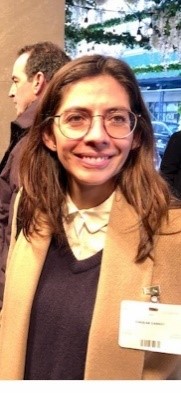
Carolina Chimoy, Deutsche Welle, International Correspondent
This is perhaps one of the most exciting times in transatlantic relations. The war in Ukraine has changed and accelerated many things. The struggle between democracies and autocracies has led to a turning point in transatlantic relations, which were strained by the previous U.S. administration. The United States and Germany are now more united than ever.
Having the opportunity to conduct in-depth background interviews with high-level political actors, experts and civil society representatives in the U.S. during these exciting times is a gift for any journalist. Whether it was the conversation with the president of the American Jewish Committee, who, as the son of Holocaust survivors, interestingly sees Germany as a leading power in Europe right now, or Donald Trump’s longtime lawyer, who recognizes similar traits in Putin as he did in his former client. They have all helped to sharpen the political picture on the international stage and the implications for bilateral relations between Germany and the United States.
In domestic politics, Germany and the United States also face similar challenges: growing inequality and polarization threaten to destabilize democracy from within as well. Being able to discuss these conversations and thoughts among a group of highly qualified journalists made this week unforgettable. I would have loved to have accompanied the group back to Washington. Thank you for a very enriching week in New York.
——————–
Nadine Jantz, Welt TV
 What a three weeks: Meeting with former Congressman Charlie Dent, visiting Bloomberg, lunch at Katz Deli, background talk with EU Ambassador to the United Nations Olof Skoog and coffee with Donald Trump’s ex-lawyer Michael Cohen. And that’s just a small sample. We were able to meet over 35 people from a wide variety of backgrounds during that time – including a visit to Broadway and a boat trip on the Hudson River. My personal highlights: the visit to the White House (see photo), the church service in Harlem and a lunch with the founder of Black Live Matters New York, Chivona Newsome, in the Harlem district of New York.
What a three weeks: Meeting with former Congressman Charlie Dent, visiting Bloomberg, lunch at Katz Deli, background talk with EU Ambassador to the United Nations Olof Skoog and coffee with Donald Trump’s ex-lawyer Michael Cohen. And that’s just a small sample. We were able to meet over 35 people from a wide variety of backgrounds during that time – including a visit to Broadway and a boat trip on the Hudson River. My personal highlights: the visit to the White House (see photo), the church service in Harlem and a lunch with the founder of Black Live Matters New York, Chivona Newsome, in the Harlem district of New York.
Prior to the trip, I had hoped to gain insight into a wide variety of areas and learn more about the American perspective on major contemporary issues. At that time, I did not know that the current topic would be the Ukraine war. A week before the trip began, Putin’s troops invaded Ukraine. And German-American relations suddenly became closer than they had been for a long time. Whether it would stay that way, how the new German government would be received in the U.S., and what could help to stop Putin were all questions we had more than once during the course of the trip.
On the one hand, the many conversations gave hope about the fact that the West is just moving together so cohesively, but also left many question marks about how long that will last. Regardless of the international issues, the many appointments also showed how torn the USA is. There were no answers as to how this can be solved with a two-party system. What remains are many new contacts and an insight into the USA that I would not have had without RIAS.
——————–
Okka Gundel, ARD Tagesthemen
America First? No. First Time America. At least for me. My first time in the USA. At the age of 47. Thanks to the RIAS program, it was a privileged, exclusive, and fabulous first glimpse of this country. Unique! My feeling for this country is similar to the American 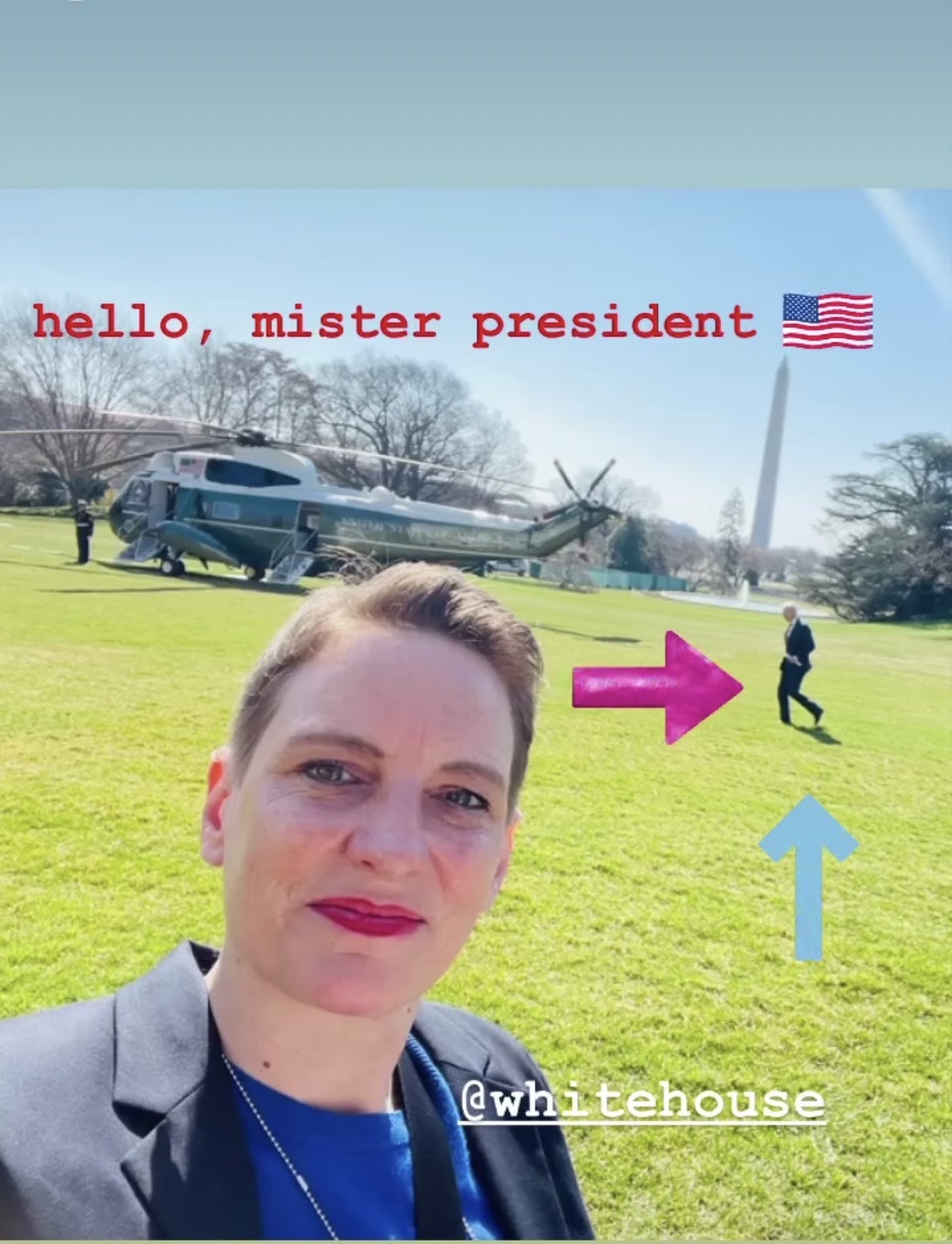 society itself. Divided. Inspiring and disturbing at the same time. United States that is anything but united. A democracy that doesn’t seem to be a real democracy. Beautiful Washington. Dazzling New York. Plain Texas. Many of our influential, impressive interviewees had a pessimistic view of their homeland. By contrast, the grassroots I was privileged to encounter in many Uber rides through the Texas metropolitan area of San Antonio struck me as surprisingly optimistic and content. Upside-down world. A world that is so modern and progressive on the one hand and so backward on the other. While here in Germany we have to fear that the garbage will not be picked up because the wrong item ends up in the wrong garbage can, in the U.S. the throwaway society happily lives on. In the hotel, every single piece of cutlery is shrink-wrapped in plastic, and on the streets SUVs and pickup trucks are used for every little journey. Mother Earth – I am perplexed and worried about you! More than ever. I had also been worried beforehand about whether I would be able to stand two weeks in a group. A class trip with classmates and teachers I didn’t know. Unnecessary. I enjoyed the campfire atmosphere. Very much so. When I suddenly found myself alone in San Antonio after a very intense time in human community, I felt a kind of phantom pain. I missed my group. Thank you RIAS for all the impulses. For the profound ones, the lively ones and the thoughtful ones. Thank you for a very special experience. Content and interpersonal.
society itself. Divided. Inspiring and disturbing at the same time. United States that is anything but united. A democracy that doesn’t seem to be a real democracy. Beautiful Washington. Dazzling New York. Plain Texas. Many of our influential, impressive interviewees had a pessimistic view of their homeland. By contrast, the grassroots I was privileged to encounter in many Uber rides through the Texas metropolitan area of San Antonio struck me as surprisingly optimistic and content. Upside-down world. A world that is so modern and progressive on the one hand and so backward on the other. While here in Germany we have to fear that the garbage will not be picked up because the wrong item ends up in the wrong garbage can, in the U.S. the throwaway society happily lives on. In the hotel, every single piece of cutlery is shrink-wrapped in plastic, and on the streets SUVs and pickup trucks are used for every little journey. Mother Earth – I am perplexed and worried about you! More than ever. I had also been worried beforehand about whether I would be able to stand two weeks in a group. A class trip with classmates and teachers I didn’t know. Unnecessary. I enjoyed the campfire atmosphere. Very much so. When I suddenly found myself alone in San Antonio after a very intense time in human community, I felt a kind of phantom pain. I missed my group. Thank you RIAS for all the impulses. For the profound ones, the lively ones and the thoughtful ones. Thank you for a very special experience. Content and interpersonal.
My station week in San Antonio, Texas. After the fast-paced and exciting time in Washington and New York, everything seemed very slow and unexciting. A bit of a culture shock. My host, Yami Virgin, is a dazzling personality and an excellent investigative TV reporter. One afternoon, Yami sent me via Uber to a baseball stadium on the prairie. There I met her station’s sports reporter. A very pleasant blind date. At first, Chuck tried to explain the rules of baseball to me. But soon we digressed to his life as an American and mine as a European. A profound encounter in the setting of a high school baseball duel. Every night we were out to dinner. Yami and me. And at least one of her friends or colleagues. Somewhere in the middle of nowhere, at unadorned truck stops along the highways, wonderful restaurants hid night after night. It was interesting and gave me a feel for the way of life there. After the “sensory overload” of Washington and New York, Texas was altogether disillusioning. And yet so enriching. Within three weeks I was able to experience a large keyboard of us-American culture. The truth may lie somewhere in between.
——————–
Andreas Büttner, Welt TV

I applied three years ago, but the last two years were cancelled because of Covid, and now it finally worked out: The RIAS USA Journalism Program. Due to the long wait, the anticipation was now even greater and it was also a good thing that we could participate in this program only now. So we spontaneously had the chance to visit the White House and to watch US President Biden taking off with his Marine One. For me the absolute highlight of this trip! Or the church service in Harlem, which was on the official program for the first time and where the gospel choir blew us away just as much as the president’s helicopter.
Every day new appointments with personalities like Michael Cohen, former lawyer of US President Trump. Every day interesting stories, like that of Frieda Vizel, a dropout from the Hasidic Jewish community in Williamsburg. Every day great conversations with correspondents from Spiegel, ZDF and Deutsche Welle. Of course, the best view of the White House was provided by WELT, where the colleagues from the public broadcaster could learn a thing or two (see photo).I would like to thank RIAS for this unforgettable program, the life-changing experiences and the wonderful group full of great people with whom I was able to complete this trip.
Station Week Los Angeles: I had the great honor of completing my Station Week with Frank Mottek, “The Voice of Business News in Los Angeles.” On my first day, I was a guest on his radio show “Mottek On Money” on KABC. There I talked about the German perspective on the Ukraine war, rising gasoline prices and the new Tesla Gigafactory. My first appearance in English, an exciting experience. I also met a TV journalist from KTLA, who was in Ukraine until recently, and the fire department from Berlin, who paid tribute to the late L.A. County mayor and friend of the fire department at a memorial service. On my last day, I was allowed to be a journalist on the red carpet of the Irish Oscar party in Hollywood. There I helped out an American colleague as a cameraman because he had problems with the tripod. German-American understanding in journalism, which would never have been possible without RIAS!
——————–
Sven Christian, Spiegel Video 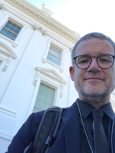
The first time in 15 years I had to wear a tie again. Lost bet. But the occasion was more than appropriate: We were allowed to visit the White House, look behind the scenes and see the president at least from afar. We met hardliners in think tanks, discussed with woken journalists and activists, and were spiritually enchanted by a church service in Harlem.
This trip exceeded all my expectations. In terms of content, one highlight chased the next. But it was often the supposedly less spectacular meetings that moved me the most. The one with the quietly accomplished correspondent Jeff Mason, who ushered us into the White House. With Bill Whitaker, who told us about smart TV journalism. With BLM founder Chivona Newsome, who didn’t become an angry citizen despite systematic oppression. To name just a few. All this gives us courage to continue reporting well, honestly and fairly. We have noticed in many conversations that this is more necessary than ever before.
——————–
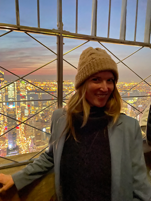 Nadine Bader, ARD
Nadine Bader, ARD
Being overshadowed by Russia’s war in Ukraine, the RIAS program im March 2022 excelled at profound talks about international politics and about the importance of transatlantic relations. Arguing with a fellow from conservative Hudson Institute about whether NATO has underestimated the importance of deterrence is just one example.Meeting with an expert from Brookings Institution gave us more insight into internal policies, Congress and its role in solving staggering policy problems such es economic inequality and structural racism.Numerous talks with US journalists enabled us to gain better understanding of US media markets. These meetings also gave deeper insight into how German politics (for example the long resistance to halt Nord Stream 2) are perceived in the US. Discussions with German correspondents completed this outstanding program. One of the many highlights certainly was the visit to the White House.
Besides all these profound talks in Washington DC and New York, our visit to the Big Apple provided an insight into the diversity of this breathtaking city. Meeting with Chivona Newsome, cofounder of Black Lives Matter Greater New York, is just one example. My highlight by far was our tour with Frieda Vizel in the Satmar Hasidic community in Jewish Brooklyn. The station week in Sioux Falls with Dakota News Now rounded off my RIAS-experience. The editorial team was very welcoming and open-minded. They showed me how they produce several hours of news broadcast per day. For instance, I accompanied a reporter doing a package on the upcoming mayoral elections. On my last day, I even met polarizing South Dakota Governor Kristi Noem at a press conference about cyber security. Unfortunately I didn’t get a chance to ask her, why she wants to ban Critical Race Theory at all schools and universities in the state. Next time! Overall, the RIAS program in Washington DC, New York and Sioux Falls gave me a deep insight into the diverse and partly polarized US society. Thank you!
——————–
Theresa Greim, Bayerischer Rundfunk
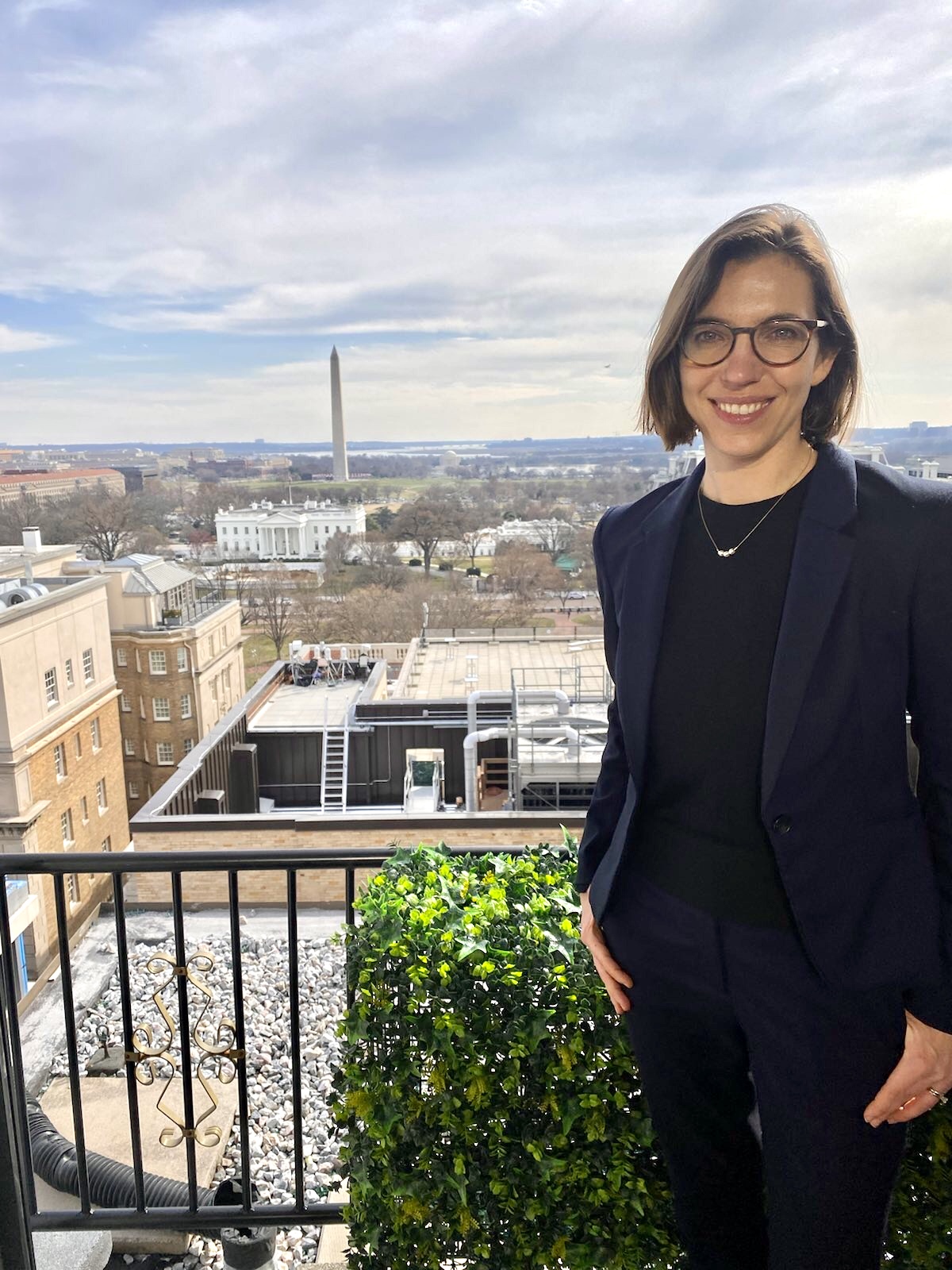 How many high-level, diverse and in-depth background discussions can you manage in nine days? To make a long story short: More than 35. (That’s not counting the many sightseeing highlights.) I wouldn’t have thought it possible to gain so many new and, above all, enriching insights in such a short time. In my journalistic work, I deal with U.S. topics almost every day, but no reportage, no background report or correspondent talk can even come close to what the encounters in these one and a half weeks of RIAS program achieved: To gain a deeper understanding of what moves people in the U.S., how they see themselves, what conflicts, values and visions drive them, and also how the U.S. perceives Germany and Europe. I was particularly surprised by the openness of our interlocutors. Almost all of the conversations were a genuine, open dialogue. I was also impressed by how warmly and enthusiastically the U.S. RIAS alumni looked after us. Whether at the graduation ceremonies in Washington and New York or during my Station Week in Boston – I always felt welcome and look forward to continuing to cultivate these valuable new contacts in the future. Or to put it in the words of Washington DC Alumni Chapter Leader Larry Mill er: You’re family now.
How many high-level, diverse and in-depth background discussions can you manage in nine days? To make a long story short: More than 35. (That’s not counting the many sightseeing highlights.) I wouldn’t have thought it possible to gain so many new and, above all, enriching insights in such a short time. In my journalistic work, I deal with U.S. topics almost every day, but no reportage, no background report or correspondent talk can even come close to what the encounters in these one and a half weeks of RIAS program achieved: To gain a deeper understanding of what moves people in the U.S., how they see themselves, what conflicts, values and visions drive them, and also how the U.S. perceives Germany and Europe. I was particularly surprised by the openness of our interlocutors. Almost all of the conversations were a genuine, open dialogue. I was also impressed by how warmly and enthusiastically the U.S. RIAS alumni looked after us. Whether at the graduation ceremonies in Washington and New York or during my Station Week in Boston – I always felt welcome and look forward to continuing to cultivate these valuable new contacts in the future. Or to put it in the words of Washington DC Alumni Chapter Leader Larry Mill er: You’re family now.
Station Week Boston: My RIAS host in Bo ston, Yasmin Amer, gave me a warm welcome. Although newsroom work continues to be hampered by Corona and most seats at WBUR are orphaned, Yasmin did her best to show me as much as possible. This included the morning 9 a.m. conference, plus the meeting for the Boston radio show; I was then able to watch the results of the issues being implemented live in the studio. I got to be part of the planning and preparation for the nationally broadcast show “Here and Now”, and also got to watch the show live in the studio. Yasmin took me to pitch a new podcast idea. I also got to talk at length with and look over the shoulder of the newsroom and News Anchor, which, being a news anchor myself, I was especially excited about. Yasmin also gave me a tour of Harvard, where she participated in the Nieman Fellowship last year/year before last. We also talked about similarities and differences in our work. Yasmin is very open and gave me many interesting insights into the work of a radio station on the US East Coast. Some colleagues at WBUR have shown great interest in joining the RIAS program in Germany. Yasmin’s response was always, “You really should do it. It’s great.”
——————–
Erik Kirschbaum, Executive Director RIAS Berlin
 Seeing the United States through the eyes of German journalists – some of whom have never been to Washington or New York before – is always a special treat for me as the executive director of the RIAS Berlin Commission. Even after six years, 12 programs and accompanying more than 150 German journalists to the USA, there are always new discoveries and experiences to make. It’s their incurable curiosity, their insatiable appetite to learn more about the country that for good or worse plays such an oversize role in their lives and their healthy skepticism of the American way of life (the ubiquitous ‘disposable plastic’ mentality is a massive culture shock for visitors from Germany every time) that makes it a joy, and honor, to lead groups of 10 to 15 Germans around Washington and New York for two weeks twice each year. The two weeks in Washington and NY are always packed full with meetings before many of them depart for a third week on their own visiting a small American radio or TV station in the Midwest or Southwest to see another side of America. It’s a demanding and exhausting schedule of up to five meetings/dinner talks each day. But who could say no to a last-minute offer to visit the White House press room? Or would anyone want to turn down an opportunity to see a gospel choir perform at a stirring church service in Harlem? Every group is different. Every group presents new challenges. Every group has a different program schedule. Thanks to our American alumni Adam Reiss, Tiffany Zeno and Michael Gargiulo and support from Jeff Mason and Larry Miller in Washington, the March 2022 group had the best and busiest program ever – and I was lucky enough to be along for the ride.
Seeing the United States through the eyes of German journalists – some of whom have never been to Washington or New York before – is always a special treat for me as the executive director of the RIAS Berlin Commission. Even after six years, 12 programs and accompanying more than 150 German journalists to the USA, there are always new discoveries and experiences to make. It’s their incurable curiosity, their insatiable appetite to learn more about the country that for good or worse plays such an oversize role in their lives and their healthy skepticism of the American way of life (the ubiquitous ‘disposable plastic’ mentality is a massive culture shock for visitors from Germany every time) that makes it a joy, and honor, to lead groups of 10 to 15 Germans around Washington and New York for two weeks twice each year. The two weeks in Washington and NY are always packed full with meetings before many of them depart for a third week on their own visiting a small American radio or TV station in the Midwest or Southwest to see another side of America. It’s a demanding and exhausting schedule of up to five meetings/dinner talks each day. But who could say no to a last-minute offer to visit the White House press room? Or would anyone want to turn down an opportunity to see a gospel choir perform at a stirring church service in Harlem? Every group is different. Every group presents new challenges. Every group has a different program schedule. Thanks to our American alumni Adam Reiss, Tiffany Zeno and Michael Gargiulo and support from Jeff Mason and Larry Miller in Washington, the March 2022 group had the best and busiest program ever – and I was lucky enough to be along for the ride.
March 28, 2022
German students explore New York, USA political landscape on ERP program
Fifteen German students on a new German-American exchange program spent a busy nine days in New York and New Jersey learning more about the United States, especially the political, economic and social aspects of the country. The students will spend the next two weeks in smaller groups of one to three visiting American university campuses and their journalism studies departments in Oklahoma, Texas, Indiana, Illinois, Wisconsin, Minnesota, New Mexico and Arizona.
Meeting New Jersey Governor Phil Murphy at his offices in Trenton was a highlight for many of the students — especially when Murphy spent the first 15 minutes of the hour-long meeting introducing himself individually to all 15 students and asking them detailed,
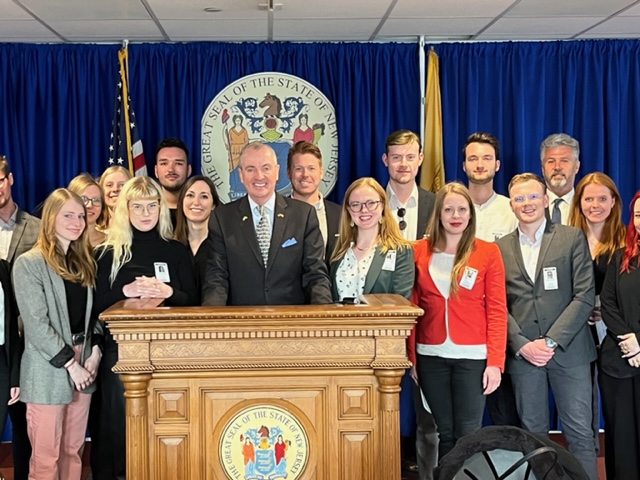
well-informed questions about their home universities in Germany, most of which are in the formerly Communist east. Murphy also explained how he had brought many ideas he picked up in Germany as the U.S. Ambassador in Berlin (2008-12) to his job leading New Jersey — such as the Duales Ausbildungsystem – or “dual training system” for skilled workers in Germany as well as the country’s emphasis on renewable energy and off-shore wind power plants.
The German students — 10 of whom were on their maiden voyage to the United States — 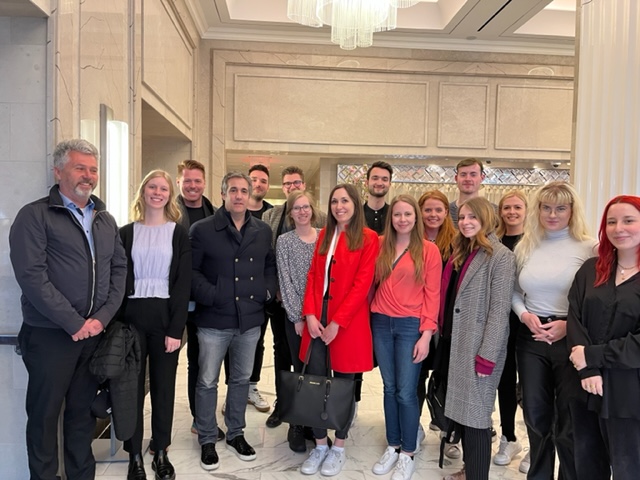 had a total of 22 meetings and appointments in their nine days in New York. Another highlight was the chance to meet best-selling author Michael Cohen, who long served as ex-President Donald Trump’s personal attorney, at a breakfast meeting around the corner from his Park Avenue apartment. The students peppered Cohen with well-informed questions and the meeting lasted far longer than scheduled.
had a total of 22 meetings and appointments in their nine days in New York. Another highlight was the chance to meet best-selling author Michael Cohen, who long served as ex-President Donald Trump’s personal attorney, at a breakfast meeting around the corner from his Park Avenue apartment. The students peppered Cohen with well-informed questions and the meeting lasted far longer than scheduled.
On two unforgettable visits to Harlem, the students learned more about racism and racial inequality in the United States from the co-founder of Black Lives Matter Chivone Newsome during a riveting hours’ long lunch meeting. They also learned secrets about the “Supper Club” at the famous Red Rooster restaurant found downstairs — where Madonna’s hair nearly caught on fire recently before the manager Charlies saved the day and former 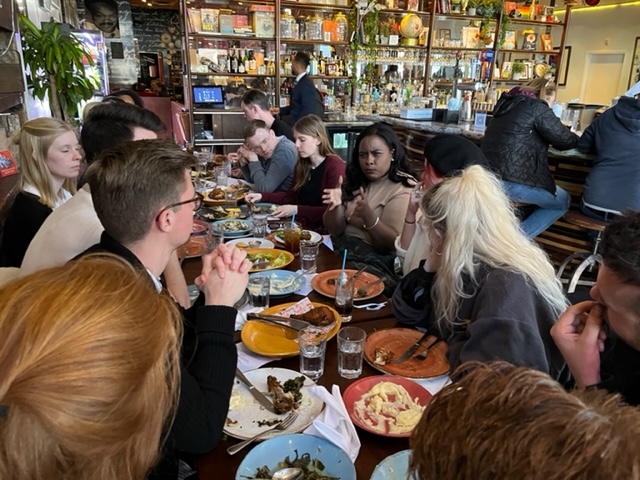 Senator Hillary Clinton had celebrated at a recent private party. Also in Harlem on a Sunday, the students were warmly welcomed guests at a communion service at the world-famous Abyssinian Baptist Church –thanks to an introduction from RIAS alumni Tiffany Zeno of WNBC TV.
Senator Hillary Clinton had celebrated at a recent private party. Also in Harlem on a Sunday, the students were warmly welcomed guests at a communion service at the world-famous Abyssinian Baptist Church –thanks to an introduction from RIAS alumni Tiffany Zeno of WNBC TV.
Other highlights for the students in New York included a walking tour of the Hasidic Jewish section of Williamsburg, Brooklyn guided by Frieda Vizel, a former member of the sect, talks with German Consul General David Gill about the political environment in the United States 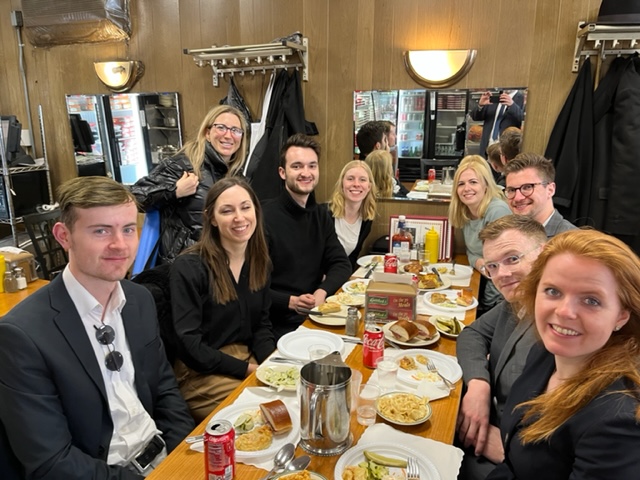 and the image of Germany in the USA, as well as with Broadway actor Michael Fatica. They also met the New York/New Jersey director of the Anti-Defamation League (ADL) Scott Richman to learn more about its battle against hate speech and about German culture in the United States from Goethe Institute New York director Jörg Schumacher.
and the image of Germany in the USA, as well as with Broadway actor Michael Fatica. They also met the New York/New Jersey director of the Anti-Defamation League (ADL) Scott Richman to learn more about its battle against hate speech and about German culture in the United States from Goethe Institute New York director Jörg Schumacher.
Michael Lysak of Bloomberg News took the students on a two-hour tour of Bloomberg News headquarters and explained how the company started just 40 years ago by Michael Bloomberg, who also later became the mayor of New York City, as a start-up a day after he lost his job at an investment bank. Bloomberg, Lysak explained, still has an ordinary desk in the middle of the broadcasting section of the newsroom because radio remains his favorite news source.
The student journalists also had the chance to pick the brains of ARD New York correspondent Christiane Meier and ARD radio network correspondent Peter Mücke, Fox 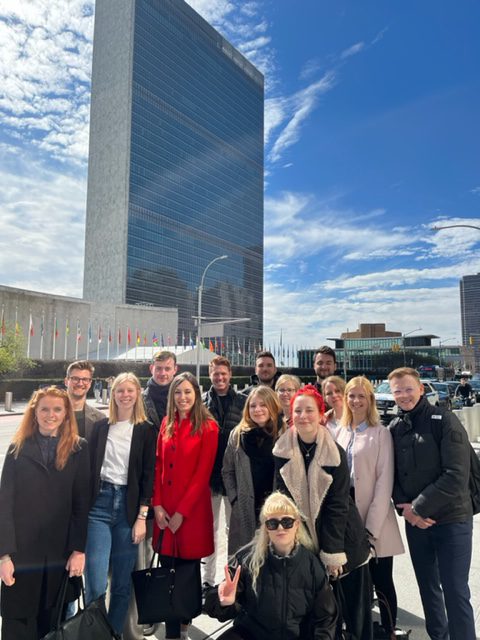 News producer Tyler Speicher, Vice News correspondent Hendrik Hinzel, New York Times The Daily senior producer Clare Toeniskoetter, WNBC TV anchor Michael Gargiulo, talk radio show host Arthur Aidala, WNBC producers Omar Atia and Tiffany Zeno. They also had the chance to watch a popular talk show by Arthur Aidala live that included a long interview with one of the students from Leipzig. The group also saw a New York Knicks basketball game, the Broadway musical “Come From Away” and took a Circle Line cruise to learn about the history of Lower Manhattan, the East River and Ellis Island.
News producer Tyler Speicher, Vice News correspondent Hendrik Hinzel, New York Times The Daily senior producer Clare Toeniskoetter, WNBC TV anchor Michael Gargiulo, talk radio show host Arthur Aidala, WNBC producers Omar Atia and Tiffany Zeno. They also had the chance to watch a popular talk show by Arthur Aidala live that included a long interview with one of the students from Leipzig. The group also saw a New York Knicks basketball game, the Broadway musical “Come From Away” and took a Circle Line cruise to learn about the history of Lower Manhattan, the East River and Ellis Island.
The program is supported by the Transatlantic Program of the Federal Republic of Germany. It has been funded by the European Recovery Program (ERP) of the Federal Economy and Energy (BMWi) Ministry. There is a reciprocal program to Germany for American students studying journalism or a related field that focuses on the role of broadcast journalism and the role it played during the Cold War, especially in Berlin.
March 22, 2022
Students from Germany start three-week exchange program to USA
A group of students from Germany on a newly created German-American exchange program to the United States began their three weeks in the United States with a meeting-filled week in New York. The program, which is supported by the Transatlantic Program of the Federal Republic of Germany, has been funded by the European Recovery Program (ERP) of the Federal Economy and Energy (BMWi) Ministry. The German students, many of whom are from eastern Germany and studying journalism, will spend their final two weeks in the United States visiting journalism studies programs at the University of Oklahoma, Texas A&M, Southern Illinois University, Indiana University, the University of Wisconsin-Oshkosh, University of Minnesota, New Mexico State University and Arizona State University. Here is further information about the students:
Amy Woyth, Mittweida University of Applied Sciences
Emma Matthea Lübbert, University of Leipzig
Emma Matthea Lübbert is working on her Bachelors thesis in Communication and Media
Adrian Liehr, University Leipzig
Adrian Liehr is studying for a Master in Communication Management at the University of
Sarah-Maria Köpf, Martin-Luther University Halle-Wittenberg
Sarah-Maria Köpf will graduate with a master’s degree in digital journalism in
2022 from Martin-Luther-University Halle-Wittenberg. She is also working an
online editor at Mitteldeutscher Rundfunk (MDR). She did her bachelor’s degree
completed one semester at Miguel-Hernández University of Elche (Alicante) in
Spain, studying journalism and audiovisual communication. Sarah has also worked for the local newspaper in Leipzig, the campus radio station Mephisto 97.6 and the online editorial of GRAZIA magazine.
Jessica Schäfer, University of Applied Sciences Magdeburg-Stendal
Jessica Schäfer is a student of Social Health Journalism (M.A.) at UAS Magdeburg- Stendal and will graduate in 2022. She received a bachelor’s degree in Media Literacy: Audiovisual Culture and Communication from the University of Magdeburg. During her studies she has worked for several German media outlets such as the public broadcast service rbb, a local city magazine and GQ Germany. After graduating Jessica wants to work for a magazine preferably in the field of sports, lifestyle or music.
Rieke Smit, University of Applied Sciences Magdeburg-Stendal
Rieke Smit recently received a bachelor’s degree in journalism from the University of
Magdeburg-Stendal and is currently studying for a masters in international humanitarian action. She has also worked for several German media companies, including ZDF public TV and is currently working at the German news agency DPA. Rieke’s goal is to work abroad with a focus on international politics.
Tom Wagner, Humboldt University Berlin
Tom Wagner is studying history and English at Humboldt University Berlin and will graduate in 2022. He is also working on the sports desk of ZDF’s MorgenMagazin in Berlin as a content manager. After graduating, Tom wants to become a history and English teacher or focus on a journalism career. He has also worked in the moderation and community management for Welt.de, a major German online newspaper. He is especially interested in politics and sports.
Florian Sädler, Axel Springer Academy Berlin
Florian Sädler works at “WELT”, one of Germany’s biggest newspapers. After completing an
apprenticeship at a publishing company and working as a freelancer for various newspapers and online media, he swapped studying History/British & American Studies for a chance to join “Axel Springer Akademie”, a top journalism school. His coverage has ranged from the European refugee crisis to the French Foreign Legion to the Ultimate Fighting Championship.
Lara Jäkel, Free University Berlin
Lara Jäkel is a North American studies major at the Freie Universität Berlin and will graduate in 2022. During her studies, she worked for different regional and national media, among others for Welt and Spiegel Online. She is also taking part in a scholarship program of the Konrad-Adenauer-Foundation (JONA) that supports young journalists through seminars and workshops. Her goal is to work for national news media with a focus on politics. She is especially interested in international politics, economics and history.
Simon Lanzerath, University Cologne
Simon Lanzerath graduated at University of Cologne in October 2021 and recently received a master’s degree. He now works at Radio Erft, a German local radio station near Cologne. Besides his studies, Simon has participated in a journalism program of the Konrad-Adenauer-Foundation. Simon’s passion is radio, but he has also experience in TV journalism. He did an internship at public broadcasting network ZDF in 2021. He has also done an internship in the press section of a major company and worked for various radio stations, a local newspaper and a business platform focusing on a young audience.
Friedrich Steffes-lay, Free Tech Academy, Berlin
Friedrich Steffes-lay is an editor at WELT. He works in the social media resort and writes mostly about pop culture and politics. Before joining WELT, he was part of the staff of the music magazines “Musikexpress” and “Rolling Stone” and finished a two-year traineeship at FreeTech Academy, formerly known as Axel Springer Academy.
Marita Wehlus, German School of Journalism Munich
Marita Wehlus is a freelance journalist from Munich who graduated from the GermanSchool of Journalism in 2020. She holds a bachelor’s degree in communications and worked in radio, local reporting and factchecking (with a Facebook media partner). Her reporting focusses on telling stories about people, culture and society. In addition, she works in developing new digital formats for broadcaster Deutsche Welle and teaches Design Thinking for journalists.
Daniel Heyd, n-tv / RTL Journalism School Cologne
Daniel Heyd is a trainee at the 24/7 commercial news network “n-tv,“ with a focus on politics and economics. Prior to his traineeship, he studied Journalism (BA) and Sports Economics (MA) in Cologne as well as worked for various networks and newspapers in Germany. He is especially interested in international politics, and he is a sports enthusiast.
Leonie von Randow, Axel Springer Academy Berlin
Leonie von Randow recently finished a two-year traineeship at FreeTech Academy, formerly
known as Axel Springer Academy in Berlin. She is a reporter/producer at WELT TV, one of Germany’s leading all-news channels. There she creates video reports on a wide range of topics for WELT TV, ProSieben, Sat1 and Kabel Eins. Leonie also is an on-air reporter and has covered topics such as the German federal elections in 2021 or Germany’s COVID vaccination campaign.
Jana Glose, German Sport University Cologne
Jana Glose is studying Sport, Media and Communications (MA) at German Sport University in Cologne and currently taking part in a journalism scholarship program of the Konrad-Adenauer-Foundation (JONA) at SUNY Cortland as an exchange student for one semester. She finished her
Bachelor’s degree in Media Management and Journalism at Jade University of
Applied Sciences Wilhelmshaven in 2020. She has gained experience as a
freelancer for local newspapers, a business portal and through internships in
radio and television. Most recently, Jana worked at ARD “Sportschau.de” and an online portal for women in sports.
March 18, 2022
RIAS group on discovery tours in Washington DC, New York, across USA
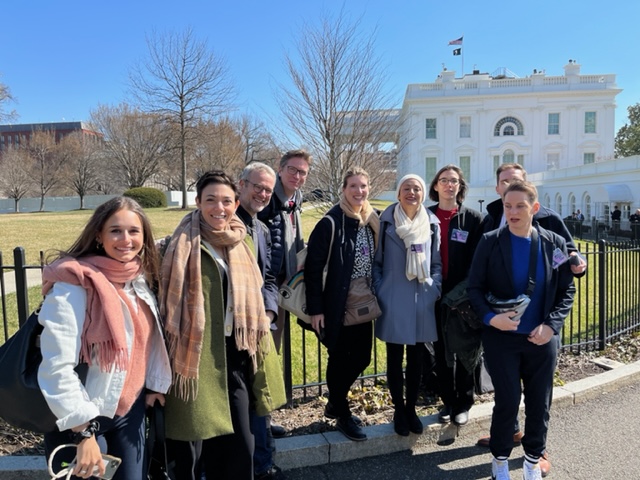
A group of 11 broadcast journalists from Germany are in the midst of a three-week exchange program to the United States. The best and brightest of German broadcasting spent a whirlwind week in Washington DC with visits to the White House, ZDF Television, WAMU public radio, Der Spiegel, Deutsche Welle, Pew Research and the German Embassy among others. Some of the guest speakers included Ken Weinstein (Hudson Institute), Jeff Mason (White House Correspondent Reuters), David Bruns (Washington Post), James  Rosen (Newsmax), Larry Miller (USA9), Esther Ciammachilli (WAMU), Ines Pohl (DW), JJ Green (WTOP) and Scott Neuman (NPR).
Rosen (Newsmax), Larry Miller (USA9), Esther Ciammachilli (WAMU), Ines Pohl (DW), JJ Green (WTOP) and Scott Neuman (NPR).
The group then traveled to New York for another full week of appointments, starting off with a rousing service at the Abyssinian Baptist Church with its famous choir in Harlem, followed by talks with WNBC (Michael Gargiulo), NBC (Adam Reiss), Michael Cohen, Black Lives Matter New York co-founder Chivona Renee Newsome and New Amsterdam News publisher/editor Elinor Tatum. They also visited the Hasidic Jewish section of Wiliamsburg, Brooklyn on a walking tour with Frida Vizel, the Goethe Institute for a talk with Jörg Schumacher, with Bill Whitaker of CBS News’ “60 Minutes” and German Consul General David Gill along with Ambassador Olof Skoog, head of the European Union delegation at the UN.
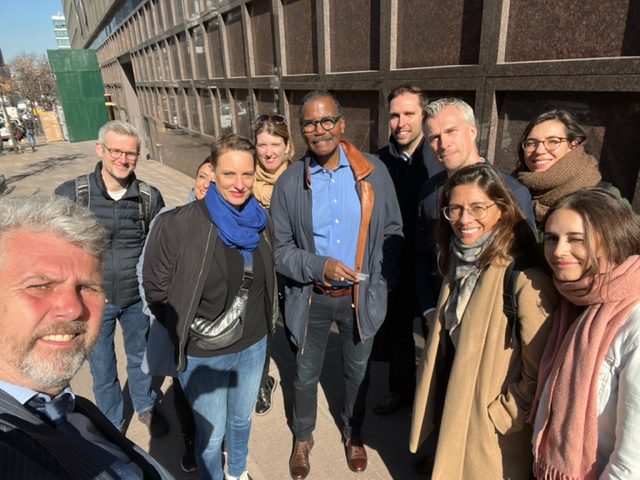
With coronavirus restrictions in New York being gradually lifted, the group was able to get inside Bloomberg News for a talk and tour from Michael Lysak — getting the chance to see former New York Mayor Michael Bloomberg sitting and working at his small desk in the middle of the newsroom like everyone else around him. The German journalists also learned more about efforts to fight and stop hate crime in the United States with Scott Richman of the Anti-Defamation League and learned more about crisis communication from Juda Engelmayer at the famous Katz’s deli. The group also met David Harris of the AJC, Hendrik Hinzel at Vice and Clare Toeniskoetter of the New York Times podcast The Daily.
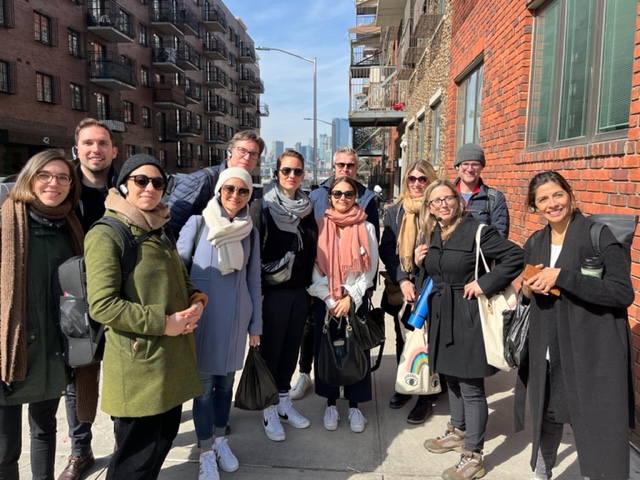
Two journalists, who speak Russian, that were planning to take part in the program were forced to postpone their participation at the last-minute due work demands connected to Russia’s invasion of Ukraine. Six members of the group are heading off for a “station week” visiting RIAS alumni from the United States at smaller stations across the United States — from Texas to South Dakota and Boston to Los Angeles. The next standard three-week RIAS program is planned for October and a one-week special program for alumni and senior editors is planned for late October in Washington DC. Please write info@riasberlin.org for further information.
Here is a list of the March 2022 RIAS group:
Nazan Gökdemir – ZDF/Arte – Mainz/Strasbourg
Katharina Hamberger, Deutschlandfunk radio – Berlin
Theresa Greim, Bayerische Rundfunk radio Munich
Sven Christian, Spiegel TV — Berlin
Andreas Buettner, Welt TV – Berlin
Christian von Rechenberg, ZDF TV – Mainz
Nadine Bader, ARD TV – Berlin
Okka Gundel, ARD TV – Cologne, Hamburg
Nadine Jantz, Welt TV – Berlin
Carolina Chimnoy, Deutsche Welle – Washington
March 8, 2022
Jury commendations for 2022 RIAS Media Prize winners
The RIAS Berlin Commission’s independent jury has picked five winners from the United States and Germany for its 2022 RIAS Media Prize competition and came to the following conclusions below about the winning entries. The 30th annual award is presented by the 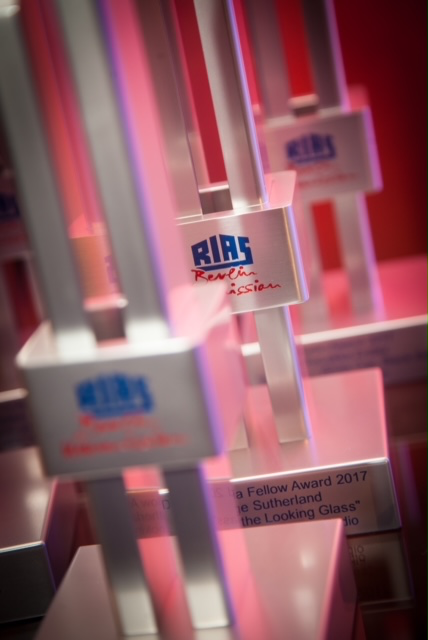 German-American exchange program and celebrates the best of transatlantic broadcast journalism.
German-American exchange program and celebrates the best of transatlantic broadcast journalism.
The jury made up of five distinguished journalists from the United States and Germany selected five winners in TV, Radio and Digital Media categories submitted from across the United States and Germany on March 5, 2022. The German-American jury comprised: Co-chair Michael Gargiulo (WNBC TV, New York), Co-chair Anja Heyde (ZDF/MDR, Berlin/Magdeburg) as well as Helge Fuhst (ARD, Hamburg), Yami Virgin (Fox 29, San Antonio, Texas), Christian Wilp (NTV/RTL, Berlin).
Jury Commendations
Grand Prize – Jan Philipp Burgard, “Leben und Sterben am 11. September – eine Familiengeschichte “(WeltTV), September 4, 2021
“Life and Death on 9/11″ is the moving story of how two German-American families an ocean apart struggle to overcome a terrible loss that binds them while also moving on with their lives with hope in their hearts. A young investment banker from Germany was among those who perished tragically on 9/11. His American fiance was pregnant with their child. Jan Philip Burgard takes viewers on an emotional journey with the banker’s fiance returning to the New York apartment they shared for the first time in 20 years. Their 20-year-old son speaks movingly about growing up without his German father. The banker’s parents in Germany also appear, still deeply pained by the loss. The revealing, yet sensitive portrayal of one family anchored in America and Germany is an outstanding story and poignant reminder that Germans and other foreigners were among those who died on 9/11
Here is a link to Burgard’s story: https://www.youtube.com/watch?v=IYQGRMqMklg
RIAS TV Award – Sigrid Faltin “Ein Hauch von Amerika – die Doku“ (ARD), December 1, 2021
Just when it seemed that just about everything was already known about the post-war history of American Gis in West Germany, Sigrid Faltin and her colleagues have delivered a stirring, fascinating and at times even disturbing look into little-known aspects about life in small West German towns after the United States armed forces arrived — first as occupation forces and then as allies during the Cold War. The documentary uses archival footage and interviews with women who fell in love with and had children with American soldiers to explore their special hardships.
Here is a link to the story: https://www.ardmediathek.de/sendung/ein-hauch-von-amerika/staffel-1/Y3JpZDovL2Rhc2Vyc3RlLmRlL2Vpbi1oYXVjaC12b24tYW1lcmlrYTE/1/
RIAS Radio Award – Thomas Reintjes, Matthias Röckl “Fear of Losing New York – Auf der Suche nach einer verschwundenen Stadt“ (Deutschlandfunk/SWR), March 16, 2021
After Covid-19 shut down the city that never sleeps, left its normally vibrant Broadway theaters dark, forced the myriad of small shops and sent its famously rich variety of restaurants into a fight for survival, journalists Thomas Reintjes and Matthias Röckl went out with a recording device to explore and describe New York in a touching, moving and memorable way. Their story “Fear of Losing New York” is a remarkable piece of radio journalism that uses creative techniques and informal spontaneous discussions to paint a picture of a city that is reeling.
Here is a link to their story: https://www.hoerspielundfeature.de/auf-der-suche-nach-einer-verschwundenen-stadt-fear-of-100.html
RIAS Digital Media Award
Katrin Bennhold, Clare Toeniskoetter, “Day X“ , five-part podcast on The Daily (The New York Times), May 28-June 24, 2021
Making the most its cutting-edge style of podcast journalism and its profound investigative prowess, The Daily has put together a powerful series of stories that shed light on a secretive nationwide network of far-right extremists who were operating under the radar inside Germany’s military and police forces. The series of stories that also served as the basis of newspaper articles in The New York Times is sterling example of outstanding investigative journalism.
1, Shadow Army?: https://www.nytimes.com/2021/05/28/podcasts/the-daily/day-x-part-1-shadow-army.html
2, In the Stomach: https://www.nytimes.com/2021/06/03/podcasts/day-x-franco-a-german-extremism.html
3, Blind Spot 2.0: https://www.nytimes.com/2021/06/10/podcasts/day-x-germany-neo-nazi-franco-a.html
4, Franco A: https://www.nytimes.com/2021/06/16/podcasts/franco-a-trial-germany-terrorism.html
5, Defensive Democracy: https://www.nytimes.com/2021/06/24/podcasts/franco-a-trial-afd-germany.html
RIAS Fellow Award
Vladimir Balzer, “New York ist zurück – eine Stadt befreit sich aus der Pandemie“, Deutschlandfunk, November 8, 2021
In his riveting story about New York City has gradually been coming back to life after the devastation of the Covid-19 pandemic, Vladimir Balzer takes Deutschlandfunk listeners on a heart-warming tour of the city that is so hungry for a return to normalcy in the fall of 2021 just before the United States reopened its gates for visitors from the European Union. Adding important voices with illuminating interviews with idled Broadway actors, American journalists stuck working only from home, badly ailing 9/11 heroes, and lonely Germans stranded in Manhattan are included in this short-but-sweet journalistic masterpiece put together during a RIAS fellowship program.
https://www.deutschlandfunkkultur.de/usa-lockert-einreisebeschraenkungen-new-york-ist-zurueck-100.html
Special Jury Prize
Ines Pohl, Deutsche Welle, special commendation for outstanding transatlantic interview with George W. Bush, Deutsche Welle, July 14, 2021
George W. Bush does not give many interviews anymore and as he explained to Deutsche Welle’s Ines Pohl in a rare meeting with a journalist the former President explained why he stays out of politics now – and likes to focus on hobbies such as painting portraits, including one of Angela Merkel. Offering his candid take on a wide range of important issues affecting Germany and the United States, the interview that was part of DW’s documentary on Merkel made international headlines in July 2021 and is an outstanding illustration of how a one-on-one conversation can shed light on current topics as well as historical subjects. https://www.youtube.com/watch?v=E-QcTTngCeo
Special Jury Prize
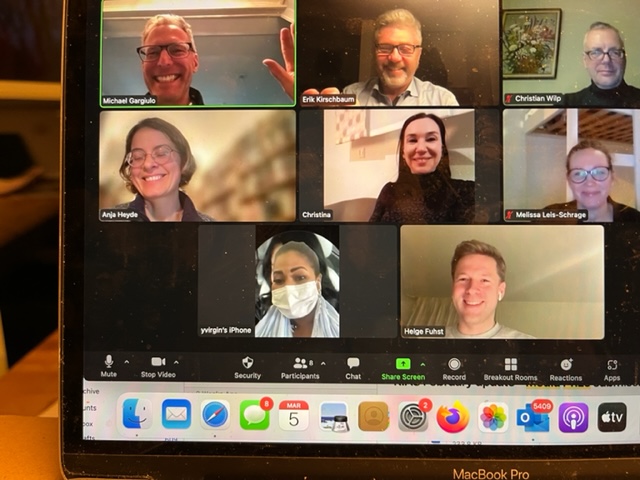
March 7, 2022
Five German, American stories picked as RIAS Media Prize winners in 2022
The RIAS Berlin Commission announced the winners of this year’s RIAS Media Prize Awards on Monday, March 7, 2022. The 30th annual award is presented by the German-American exchange program and celebrates the best of transatlantic broadcast journalism with up to 10,000 EUR in prize-money awarded.
The jury, made up of five distinguished journalists from the United States and Germany, selected five winners from the TV, Radio and Digital Media category entries submitted from across the United States and Germany on March 5, 2022. The German-American jury comprised: Co-chair Michael Gargiulo (WNBC TV, New York), Co-chair Anja Heyde (ZDF/MDR, Berlin/Magdeburg), as well as Helge Fuhst (ARD, Hamburg), Yami Virgin (Fox 29, San Antonio, Texas), Christian Wilp (NTV/RTL, Berlin).
Conditions allowing, RIAS Berlin Commission will host a gala ceremony on June 2, 2022 in Berlin to pay tribute to the winners from the 2022 competition as well as the 2020 and 2021 contests that were postponed due to the Covid-19 pandemic. The RIAS Berlin Commission, created after the legendary Radio in American Sector (RIAS) broadcaster went off the air in 1993, has been operating exchange programs for more than 1,900 German and American broadcast journalists since 1993 with the aim of promoting transatlantic understanding in journalism and keeping alive the spirit of the Cold War-era radio and TV broadcasting network.
This year’s prize winners are:
Grand Prize – Jan Philipp Burgard: “Leben und Sterben am 11. September – eine Familie Geschichte“ (WeltTV), September 4, 2021
RIAS TV Award – Sigrid Faltin & Team: “Ein Hauch von Amerika – Dokumentation“ (ARD), December 1, 2021
RIAS Radio Award – Thomas Reintjes, Matthias Röckl: “Fear of Losing New York – Auf der Suche nach einer verschwundenen Stadt“ (Deutschlandfunk), March 16, 2021
RIAS Digital Media Award – Katrin Bennhold, Clare Toeniskoetter: “Day X“ , five-part podcast series on The Daily (The New York Times), May 28-June 24, 2021
RIAS Fellow Award – Vladimir Balzer: “New York ist zurück – eine Stadt befreit sich aus der Pandemie“, (Deutschlandfunk), November 8, 2021
Special Jury Prize:
Ines Pohl: Deutsche Welle, special commendation for outstanding transatlantic interview with George W. Bush, Deutsche Welle, July 14, 2021
March 2, 2022
RIAS exchange programs resumes in 2022 with three-week U.S. fellowship
Eleven broadcast journalists from Germany will spend three weeks in three U.S. cities on a RIAS Berlin Commission fellowship from March 7th to 25th. The exchange programs were idled for the last two years due to the Covid-19 pandemic before resuming partially in October 2021. The March program for German journalists to the United States is the first of seven RIAS Berlin Commission programs in 2022 as the fellowship returns to its full schedule.
The following journalists will spend one week together in Washington DC, one week together in New York and then several will spend a third week on individual visits to American RIAS journalists at TV and radio stations from San Antonio, Texas, Tyler, Texas, Dallas, Los Angels and Sioux Falls, South Dakota.
Nazan Gökdemir, ZDF (Mainz, Germany)/ARTE (Strasbourg, France)
Gökdemir is a news anchor and journalist. She anchors the “Heute Journal Update” on German public network ZDF. She also anchors the news program „Arte journal“ at German-French TV network ARTE, based in Strasbourg.
Nadine Bader, ARD TV (Berlin)
Katharina Hamberger, Deutschlandfunk Radio (Berlin) Hamberger is a Berlin
correspondent for German national public radio Deutschlandradio and its three stations, Deutschlandfunk, Deutschlandfunk Kultur and Deutschlandfunk Nova. She reports on the German government and the Bundestag. Her primary assignments are the German conservative parties.
Sven Christian, DER SPIEGEL (Berlin)
Christian has worked as TV news editor for SPIEGEL TV. He founded the platform spiegel.tv and switched as Head of Video to SPIEGEL ONLINE. He is now video content manager and developer for DER SPIEGEL. He lives, works and runs mostly in Berlin.
Andreas Büttner, WELT TV (Berlin) Büttner is a duty editor at all-news network WELT TV in Berlin and has worked in senior positions for the commercial network since 2017. He previously worked for the SAT-1 network. He previously worked for the SAT-1 network.
Okka Gundel, ARD-Morgenmagazin/ARD Sportschau (Cologne) Gundel is a sports
anchor and reporter for ARD Morgenmagazin in Cologne and ARD Sportschau in Hamburg. She also writes for newspapers and is an essayist for Der Spiegel. Gundel is also the author of a 2011 book about womens’ soccer “Elf Freundinnen müsst ihr sein”.
Theresa Greim, Bavarian Radio (Munich). Greim is an anchor and writer at Bavarian Radio in Munich, including its all-news BR24 program. She also works as a freelance journalist for the newspaper Süddeutsche Zeitung. Greim has also worked as an actress as well as voice over for films, audio books, computer games and documentary films.
Nadine Jantz, WeltN24 (Berlin). Jantz is a news editor for WELT-Fernsehen and works on stories for ProSieben, Sat.1 and Kabel1 networks. She is also co-host of a start-up podcast “So geht Startup”.
Christian von Rechenberg, ZDF (Mainz).
Von Rechenberg is a reporter and editor for German public broadcaster ZDF. He works for „Heute Journal“ – where he produces TV reports and does live segments transmissions for the national prime time newscast.
February 14, 2022
Why RIAS makes a difference – excerpts from two recent applicant essays
The RIAS Berlin Commission receives more than 100 applications each year for its seven exchange programs to the United States and Germany. Some of the essays are especially memorable, in particular when journalists describe in a personal way why they are interested in being part of the exchange program that was created in 1992 — to keep alive the spirit of the legendary Radio In American Sector (RIAS) long after the important Cold War-era source of news, information and music was for West Berlin and East Germany went off the air.
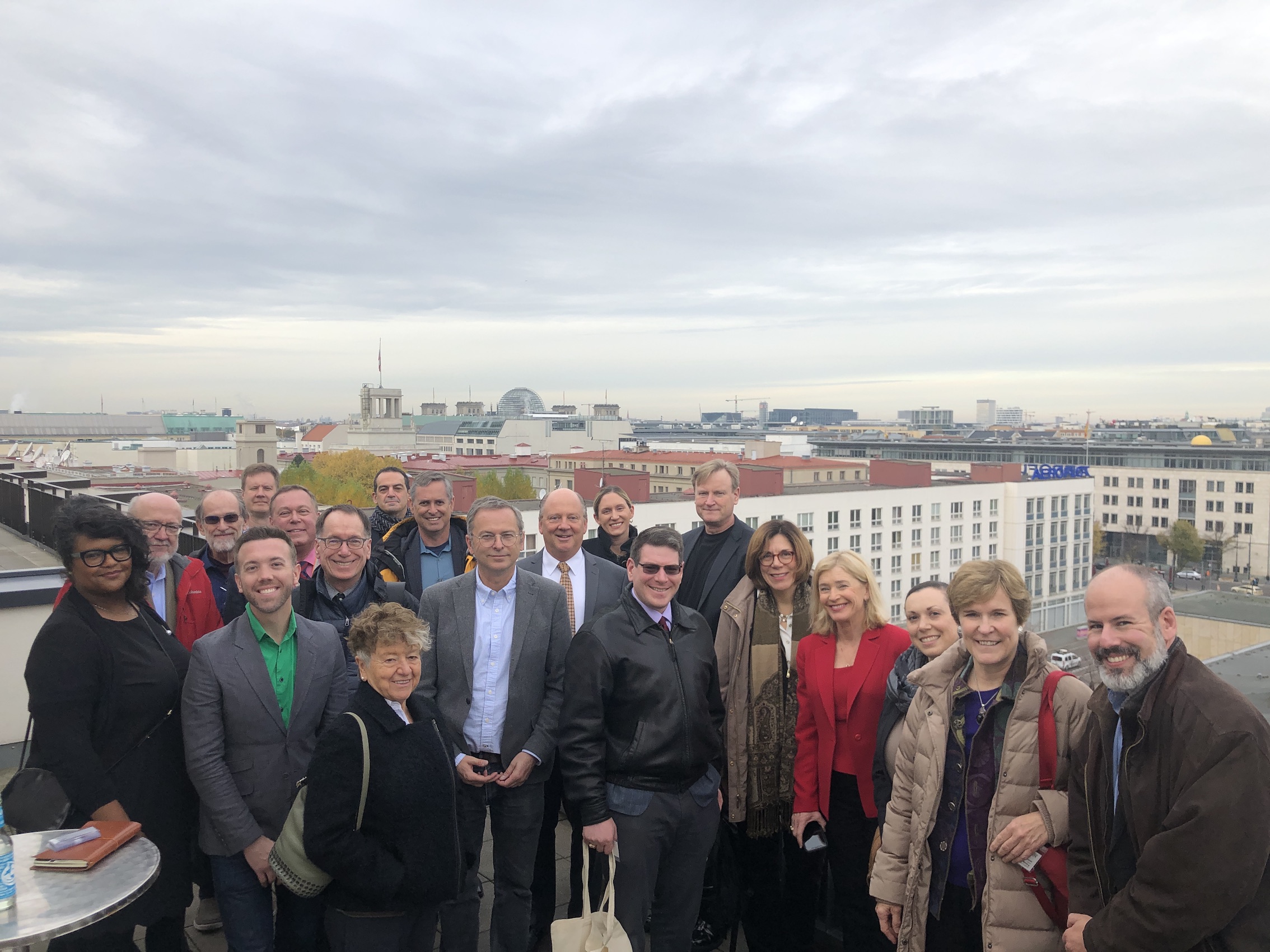 That desire to be part of the RIAS Berlin Commission programs and to become part of the loose network of 1,900 alumni in the United States and Germany was movingly illustrated with these two essays we received recently: the first from an American journalist in Washington DC (who applied for the June program to Germany/Brussels after taking part in a RIAS alumni reunion in Washington last year); and the second from a German journalist from Hamburg (who applied to be on the October program to New York/Washington/a Midwest TV station). Their essays were so moving that we thought we would share excerpts with you:
That desire to be part of the RIAS Berlin Commission programs and to become part of the loose network of 1,900 alumni in the United States and Germany was movingly illustrated with these two essays we received recently: the first from an American journalist in Washington DC (who applied for the June program to Germany/Brussels after taking part in a RIAS alumni reunion in Washington last year); and the second from a German journalist from Hamburg (who applied to be on the October program to New York/Washington/a Midwest TV station). Their essays were so moving that we thought we would share excerpts with you:
“Just before the pandemic I was invited to a ‘RIAS Alumni Happy Hour’ in Washington, D.C. A friend of mine had done the Fellowship that summer and he thought I might be interested. To be honest I had never really cared to look at journalism outside of the U.S. My goal and my focus had been on journalism here. But my view changed drastically that night.
I was introduced to journalists from Hamburg to Leipzig and everywhere in between. For one of the rare times in my life, I didn’t talk too much. I just listened to their stories. While their beats or coverage were completely different from mine, their struggles and successes felt very similar. I was intrigued. What was even more interesting was what they covered.
They were at the heart of the stories that are shaping Europe. They were dealing with class and socioeconomic issues of a very young Germany. One where East and West have been united, but only for a few decades. Needless to say, I was extremely jealous.
I walked away from that night with a burning question in the back of my head: what would it be like to cover international stories? How would I even begin?
As the pandemic wore on the questions didn’t fade, they just grew bolder in my head. I found myself checking in weekly on international stories, watching European News broadcasts, and just about anything to stay on top of what was happening there. The pandemic may have made us socially distant, but it also made us conscious that our world is interconnected and much smaller than we thought.
I told myself, if the opportunity to take part in RIAS happened again, I would try to go. So here I am, asking to take part in your eye-opening and fascinating fellowship. I want to learn how the German news media handles the socio-economic growth of Europe’s largest economy. I want to see the politics coverage up close, as the fault lines of Europe’s political landscape continue to grow. I want to walk away with an idea of how news is done in Germany, and how the country interacts with it. It’s an ambitious goal- and I am sure there is no way to learn it all in one fellowship.
I have had time to think about what is next for me after the pandemic. It occurred to me I may not want to be a US-based journalist for the rest of my career. There are fascinating economic, political, and social stories happening in Europe. I want to be part of that. I don’t expect a RIAS fellowship to prepare me for a career as a European journalist, but I see it as a jumping off point. While I am here, I can research all I want and watch as many stories as possible-but I won’t know if it is something I can truly pursue or look at, until I see it up close with my own eyes. I’d like to be considered for the RIAS fellowship. I see it as a learning opportunity for my career and possible starting point for a new direction in the next decade.”
— An American TV journalist in Washington DC
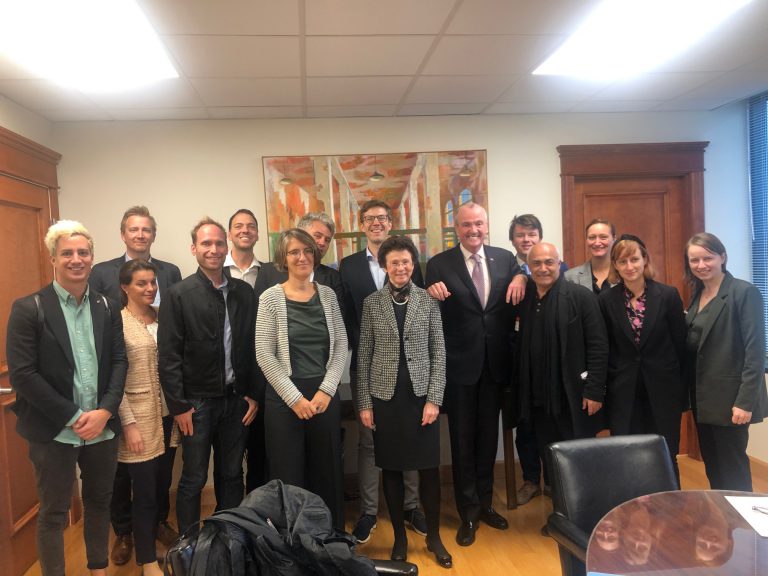
“Please accept this letter as the expression of my enormous interest in the RIAS Berlin Commission Program that I’d like to apply to.
Working as a TV-journalist for more than ten years it has always sounded almost mythical when senior colleagues talked about RIAS. As a former history student, I admire the thoughtful implementation of so many institutions that the allied forces offered Germany after the Second World War, especially in the media sector. “Offered” because it is a gift to a formerly totalitarian society to be given the chance of leaving dictatorship behind, improving itself, reaching democracy. A chance that unfortunately hasn’t been given to the country where my parents came from…that until today is struggling with democratic principles concerning its media, and society as well of course.
As a journalist I’ve been working internationally. And I do not only report but also observe and reflect on our reporting and broadcasting habits in Germany and of the media abroad. I am grateful that our way has been shaped by British and particularly American journalism and not by other principles…with a lack of transparency, or … that is often not comparable to media work according to democratic standards.
As I have never been to the States, all I know about American journalism is formed by the broadcasting available in Germany, newspapers, the Internet (and also movies). I often used The New York Times or Washington Post articles during the two years that I’ve been teaching English to professionals whom I also prepared to work with English speaking partners. But to get to know the different media outlets in the US live and not only from afar seems an extremely promising opportunity to me.
The last six years of my professional life I have been working… as a news anchor…. The outstanding colleagues who had taken part in the RIAS Berlin Commission program always seemed particularly brilliant to me and I always hoped one day to be as accomplished as them to fit the criteria for this important and fruitful exchange program. These colleagues have often reported about the huge steps taken forward in terms of innovation in American newsrooms and so I expect to learn a lot about that during the time spent in the different media outlets. Innovation is often neglected in public broadcasting in Germany and so I will concentrate on collecting tools to help improve the daily tasks of the companies I work for. I believe that social media, audience development and community must be handled in a more professional way than at present in German broadcasting units.
Apart from that I am especially interested in the ways that American outlets treat societal diversity, which is only an upcoming trend in Germany as it is acknowledging its own diversity and the fact that it is an immigration country. I am confident that the American history of ideas, with such important historic issues as the melting pot nowadays rather turning into the concept of the kaleidoscope, can be extremely helpful to my home country that has just decided to commit itself to these concepts. That’s why I am very keen on getting to know such different outlets like those that represent the views of American minorities such as Jewish communities in big cities…
Far from the big city lights, I also take particular interest in media outlets in rather peripheral regions: radio programs or podcasts run by native Americans shed a light on another America than the one perceived in German media day by day. As journalists we always look for the hidden places to be discovered, the untold stories to be told. Germany lacks a lot concerning native American history and I wish to bring back such reports to my editors by the end of the program.
Particularly with this experience, that somehow seems very American, and I hope you’ll forgive me that I didn’t avoid the cliché of “dream big, work hard”, I think that I qualify as a possible fellow to your program. I hope to be part of it this year.”
— A German journalist from Hamburg
February 4, 2022
RIAS planning seven exchange programs in 2022 — 4 to USA, 3 to Germany
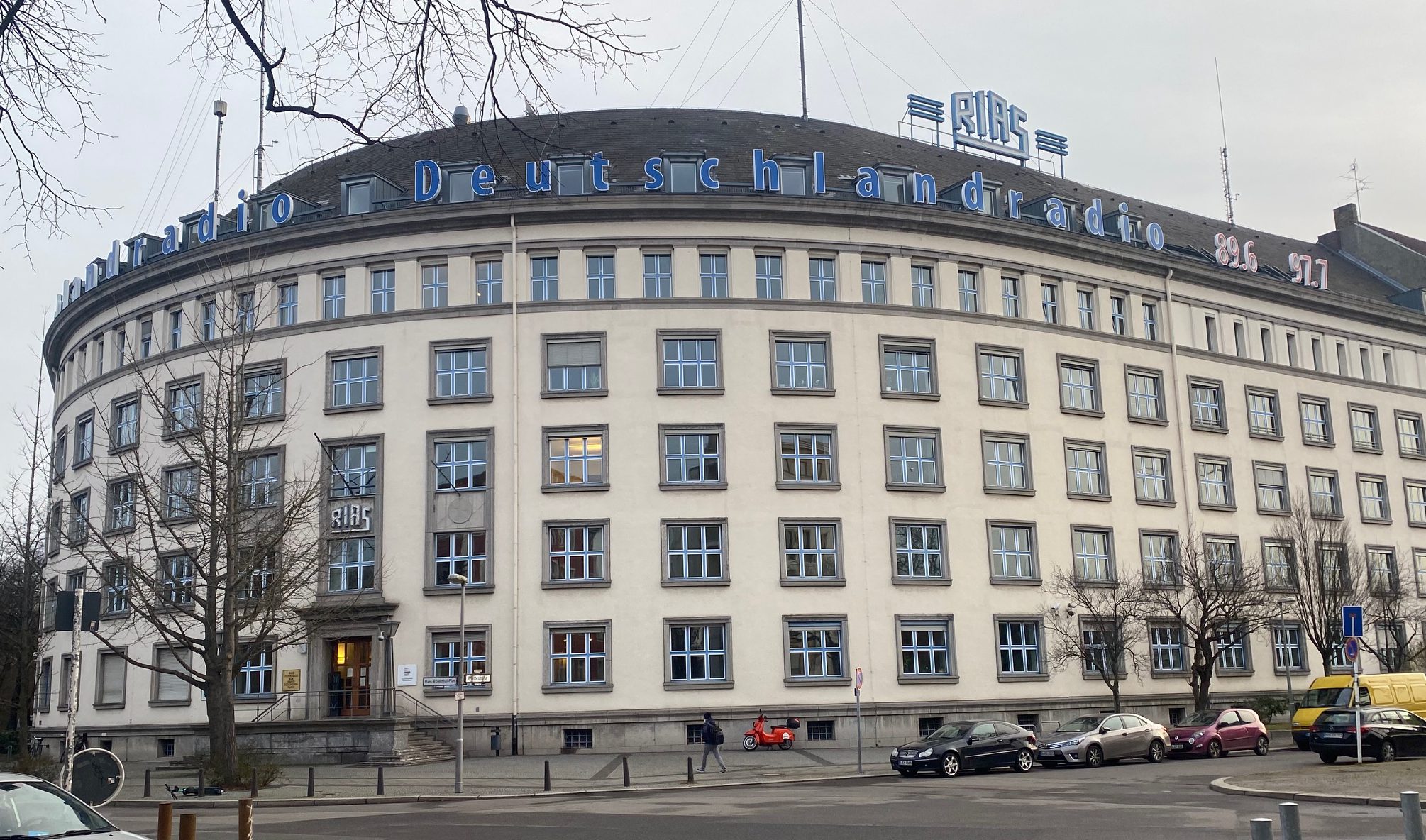
The RIAS Building in Berlin as seen in February 2022. It’s now the home of Deutschlandradio but also the home of the #RIASBerlin Commission since 1992.
More than 1,900 journalists from the United States and Germany have taken part in the one- to three-week fellowships since the exchange program for broadcast journalists in the two countries was created.
The programs began restarting cautiously in the fall of 2021 after a two-year hibernation due to Covid-19 — with three programs in Germany and the United States that more than 50 journalists took part in.
The RIAS Berlin Commission fellowships will be back in full swing in 2022 with a total of seven fellowship exchange programs for about 120 journalists. There will be four exchange fellowships for German broadcast journalists to the USA: in March for 13 professional journalists, in late March/early April for 15 journalism students, in early October for 15 professional journalists and late October just before the mid-term elections for about 32 alumni and friends of RIAS.
There will also be three fellowships to Germany for American journalists: in June for 15 professional American journalists, in late June/early July for 15 American journalism students and in September for 15 professional American journalists. In 2023 RIAS Berlin Commission is planning four fellowships to Germany for Americans and three to the USA for German journalists.
The RIAS Berlin Commission is also planning to hold its 2022 RIAS Media Prize awards ceremony on June 2, provided that prevailing conditions allow. Please check the website www.riasberlin.org or write info@riasberlin.org for more information
January 19, 2022
Deadline nears for entries 2022 RIAS Media Prize
The January 31 deadline for entries for the 2022 RIAS Media Prize is quickly approaching. Journalists who have broadcast or produced radio, TV or digital stories that were aired or published in the United States or Germany with a transatlantic aspect during 2021 are eligible for prizes. There will be a total of up to $12,000 (10,000 EUR) in prize money awarded for the best radio, television and digital stories. That includes a $6,000 (5,000 EUR) grand prize for the single most outstanding entry that was broadcast during 2021. RIAS alumni are especially encouraged  to submit their work as there is a special Fellow Category as well.
to submit their work as there is a special Fellow Category as well.
The winners in 2021 for the year 2020 included Ingo Zamperoni and Birgit Wärnke of ARD Television for their story about Donald Trump’s reelection campaign, the sharp political divisions in the United States, and his American wife’s family, as well as Ryan Delaney of St. Louis Public radio, who won for a series of stories about how Germany kept its schools open during the first stages of the Covid-19 pandemic.
The winners of several different categories including best TV production, best radio production and best fellow production will be invited to attend a gala awards ceremony in Berlin on June 2, 2022.
The RIAS Media Prize is intended to help strengthen the diversity of transatlantic dialogue and to deepen interest in German-American relations. The stories submitted should go beyond daily and routine reporting, should process information and describe social reality in a remarkable way, and promote dialogue on similarities and differences in transatlantic relations.
Contributions ideally should include one or more of the following: stand out thematically, take on new questions in a creative way, critically examine and make the diversity of social reality clear, contain interesting suggestions for transatlantic debate, encourage reflection on problems and solutions, question clichés about Germans and/or Americans, describe trends in everyday life that are of general interest, contribute in a special way to mutual curiosity and understanding, or be suitable to strengthen democratic and societal values.
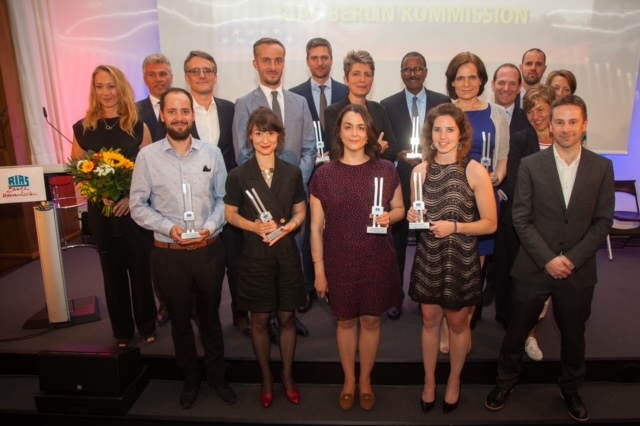
Entries must be received by the RIAS Berlin Commission via Email no later than January 31st, 2022. All work submitted must be the primary effort of the person or persons making the entry. RIAS Berlin Commission reserves the right to create additional categories such as a “Jury Prize” for awards or decline to make an award in a category where only a few entries or those of poor quality are received.
DEADLINE FOR ENTRIES: JANUARY 31, 2022
Entries must include:
– full name, title, business address, phone, e-mail,
– posting date(s) of the story, story running length, word count, – story title and brief description
– a brief description of your role
in the production of the story
Clearly indicate the category for your entry:
Categories are: 1) Television 2) Radio 3) Digital (includes podcasts and online) 4) “RIAS Fellow Prize” (best TV, radioor digital entry by a current RIAS participant or RIAS fellow alumni)
A maximum of two entries per person is allowed. An entry is considered to be one single entry when several shorter pieces relate in form or content to a specific category.
All entries must be submitted electronically via Email:
– with a valid URL that is active until at least March 2022 and can be accessed without proprietary information (password) by the RIAS jury.
ALL ENTRIES SHOULD BE SENT TO:
Email: info@riasberlin.org
The RIAS Berlin Commission is a binational organization for the promotion of German-American understanding in the field of broadcasting.
January 12, 2022
RIAS Alumni Donations Bounce Back in 2021
 Private donations to the RIAS Berlin Commission bounced back strongly in 2021 to a total of more than 8,600 Euros, with contributions coming from more than 60 alumni and friends of RIAS in Germany and the United States. The rise in donations coincided with the resumption of RIAS exchange programs, with three programs in September/October 2021 in which 56 journalists from both countries took part. There were no programs in 2020 due to the Covid-19 pandemic.
Private donations to the RIAS Berlin Commission bounced back strongly in 2021 to a total of more than 8,600 Euros, with contributions coming from more than 60 alumni and friends of RIAS in Germany and the United States. The rise in donations coincided with the resumption of RIAS exchange programs, with three programs in September/October 2021 in which 56 journalists from both countries took part. There were no programs in 2020 due to the Covid-19 pandemic.
Those generous donations in 2021 will help make it possible to expand the exchange programs in 2022. All donations raised from alumni and friends of RIAS are being used directly and entirely for additional spots on the exchange programs for journalists between the United States and Germany. There are seven programs planned for 2022: two three-week standard programs for German journalists to the USA in March and October; two two-week standard programs for American journalists in Germany/Brussels in June and September; one three-week program for German students in the USA in March/April; one three-week program for American students to Germany in June/July; and one one-week alumni program for 30 German alumni in Washington/Pennsylvania in October.
The donations in 2021 included 6,650 Euros from 42 alumni and friends of RIAS in Germany and $2,270 from 16 alumni and friends of RIAS in the United States. There was a wide range from individual donors in 2021, from $50 to $750 in the United States and 30 Euros to 800 Euros in Germany. RIAS Berlin Commission says a big thank you to all donors! Large donors ( of 200 Euros or more): Kristian Wiegand, Mitri Sirin, Erik Kirschbaum, Dilek Üsük, Helge Fuhst, Ingo Zamperoni, Anja Heyde, Martin Richter, Anne Sieger, Daniel Prokraka, Andre Schünke, Vivienne Radermacher and Björn Heckmann. And thanks to all those who made substantial donations (of 100 Euros or more): Susann Kalmbach Falkenstein, Iris Ollech, Maren Hellwege-Beck, Michail Paweletz, Kerstin Ruskowski, Gesine Dornbluth, Frauke Holzmeier, Ben Fajzullin, Andreas Mitzkus, Peter Twiehaus, Christian Walther, Vladimir Balzer, Steffi Clodius, Petra Gute, Michael Kolz, Andreas and Lydia Dimmling. Thanks also to the larger donations (of $200 or more) in the USA from: Michael Gargiulo, Karin Caifa, Sarah Williams. Also thanks to those who also made substantial donations: Lane Luckie, Buzz Conover, Bonnie North, Bryan Weakland, Heather Dolce, Miranda Reed, Tracy Terry, Amy Lotz, Cain Butler and Stephanie Wolf.
 The alumni chapters set up in Hamburg, Berlin, Cologne, Rhine-Main, Brussels, New York, Washington and Los Angeles are helping spread the message on donations. With more than 1,900 alumni over the last quarter century, the RIAS Berlin Commission is hoping to double the amount of donations.
The alumni chapters set up in Hamburg, Berlin, Cologne, Rhine-Main, Brussels, New York, Washington and Los Angeles are helping spread the message on donations. With more than 1,900 alumni over the last quarter century, the RIAS Berlin Commission is hoping to double the amount of donations.
The RIAS Berlin Commission’s annual Media Prize awards ceremony is tentatively planned for June 2, 2022, in Berlin. There will also be a panel discussion and alumni get-together the following evening in Berlin on June 3, 2022. All alumni are cordially welcome to attend both events. In the United States, alumni get-togethers are planned for Washington, DC on March 11 and in New York City on March 18. There will also be a series of alumni events at the RTDNA Excellence in Journalism convention.

